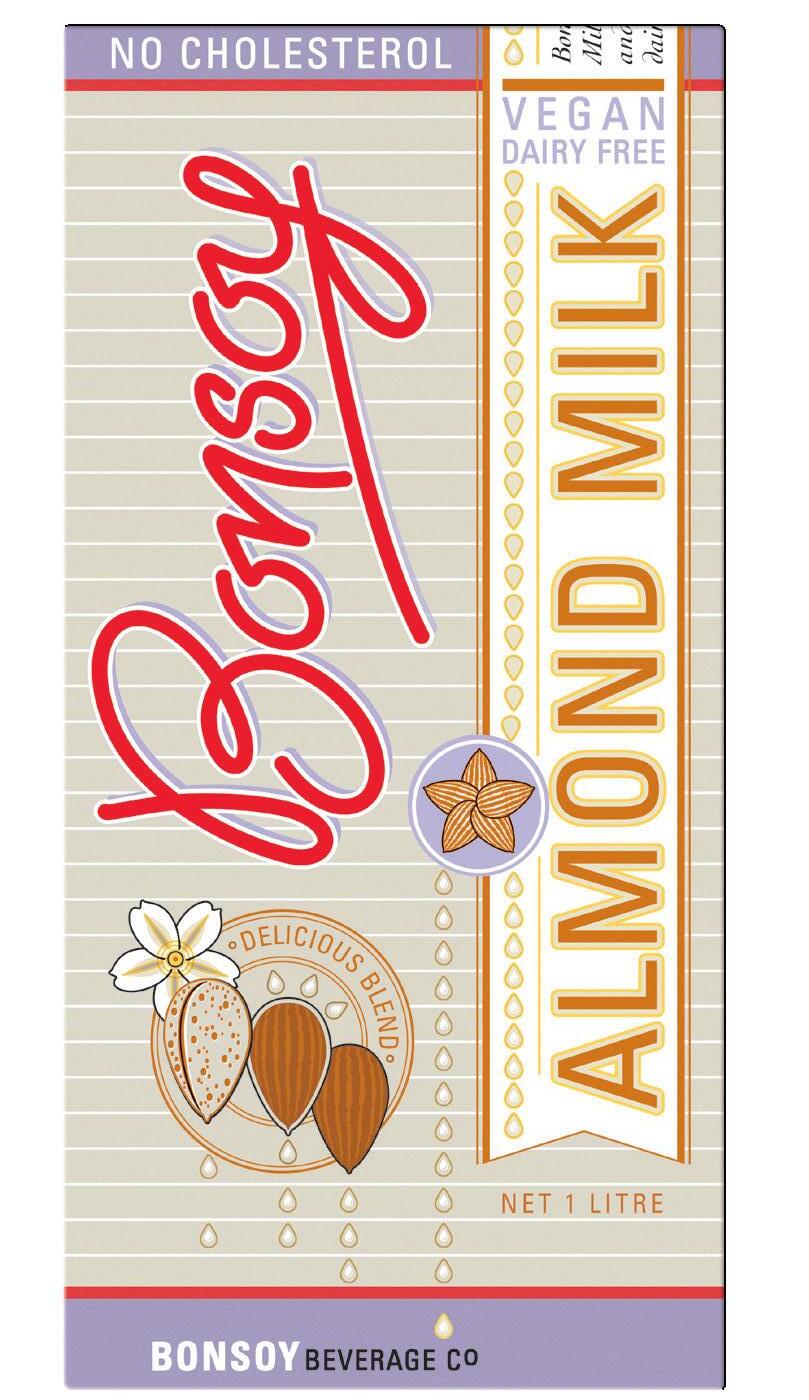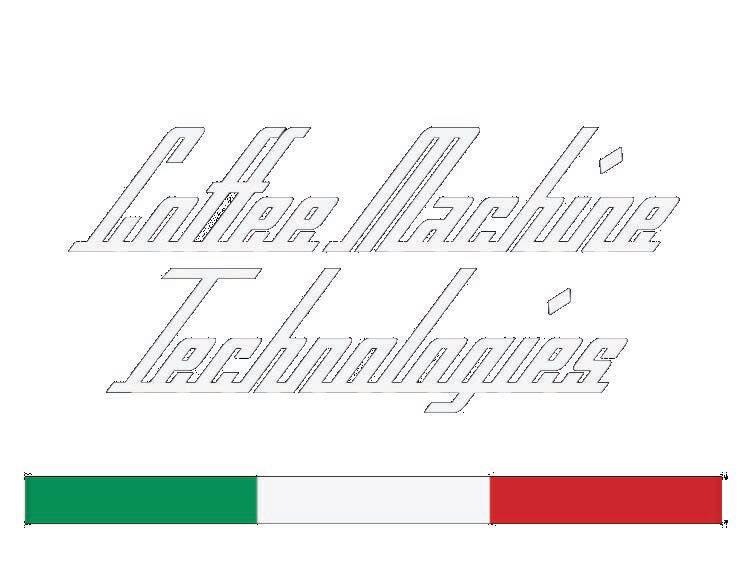






FINALS – SUNDAY 12 MAY, 2PM
The MILKLAB Barista Battle is back – and it’s bigger than ever! Tune in to witness the ultimate latte art smackdown and where we crown the 2024 MILKLAB Barista Battle Champion.

FINALS – MONDAY 13 MAY, 2PM
Come attend the very first MILKLAB Roaster Royale Finals and experience the artistry of Aussie coffee roasters, where mastery meets innovation in presenting the perfect blend that pairs well with plant milks. Featuring IACA as Green Bean Partner.

DAILY WORKSHOPS – 12-14 MAY, 11AM
Each day, we’re bringing on a latte art champion and expert to showcase their signature pours in a live workshop. We then invite all baristas to take them on. The best pour doing the latte expert’s design will win $500!
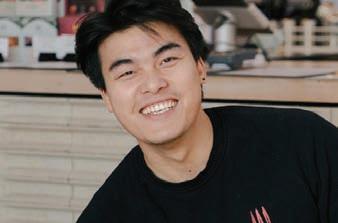
VICTOR VU @victorvuuu –2023 World Latte Art Champion.

$500up for grabs each day!
JUNNIE @junnie.77 –Specialty Coffee Trainer & Content Creator.
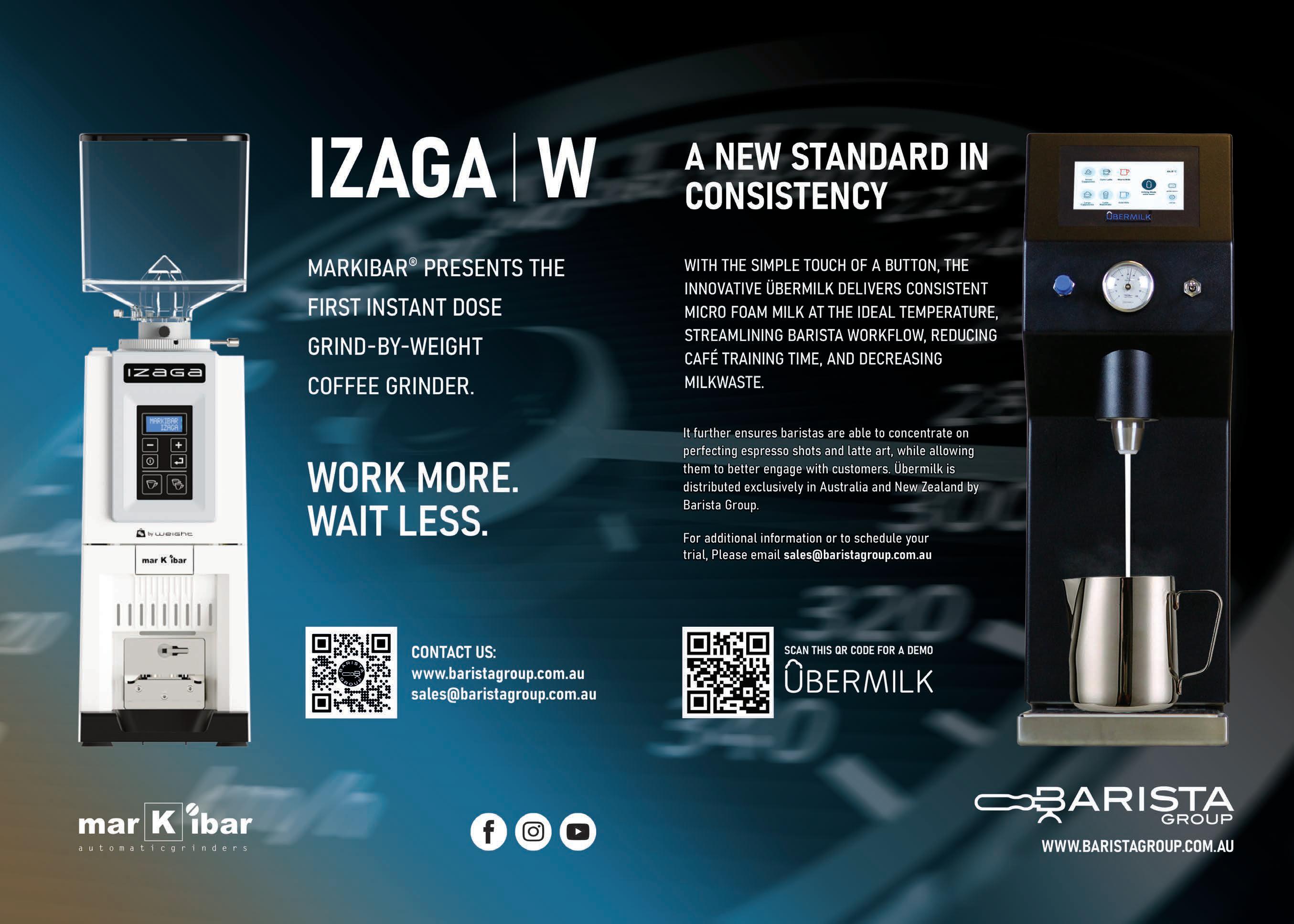

MELBOURNE CONVENTION AND EXHIBITION CENTRE
BOOK YOUR STAND NOW TO TAKE PART IN THE SOUTHERN HEMISPHERE’S LARGEST DEDICATED COFFEE TRADE SHOW.
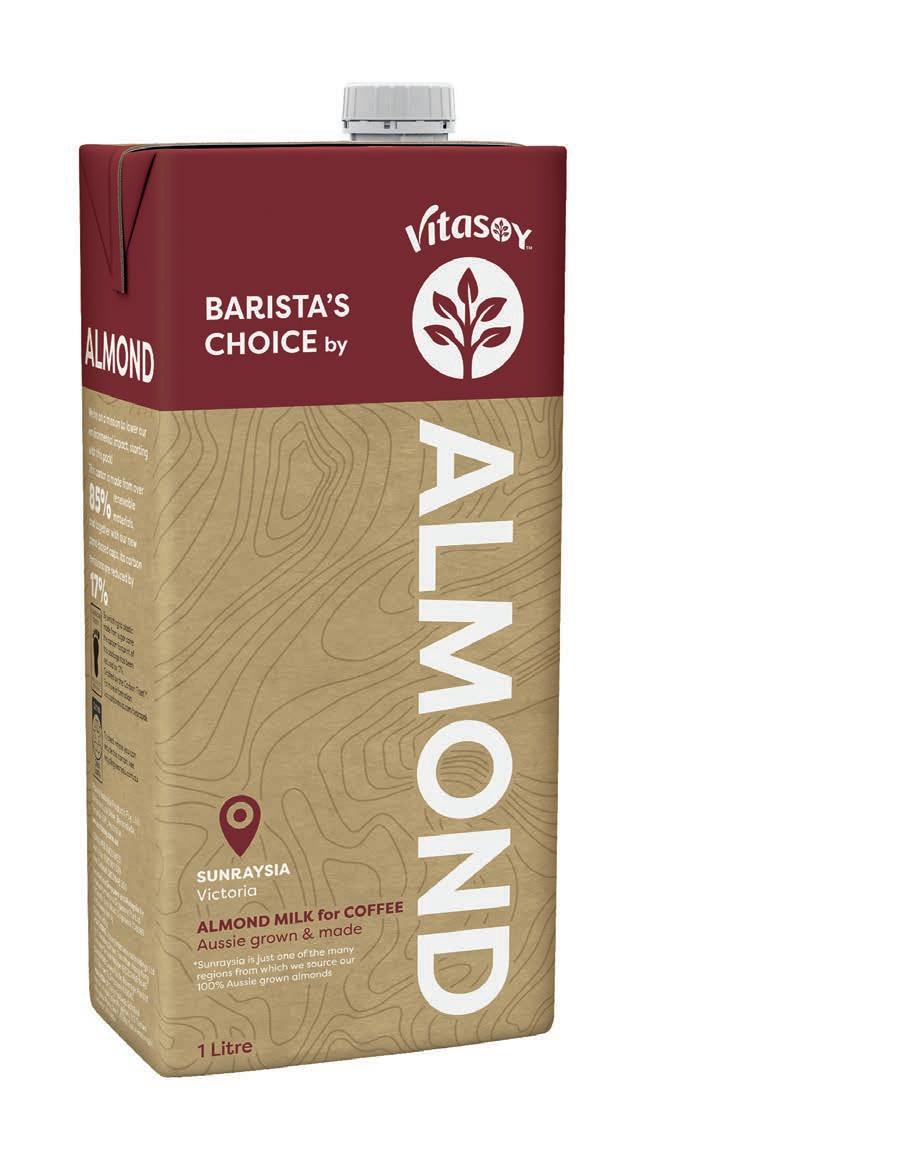
SUNRAYSIA | VIC
Sustainably grown almonds


For barista made coffee
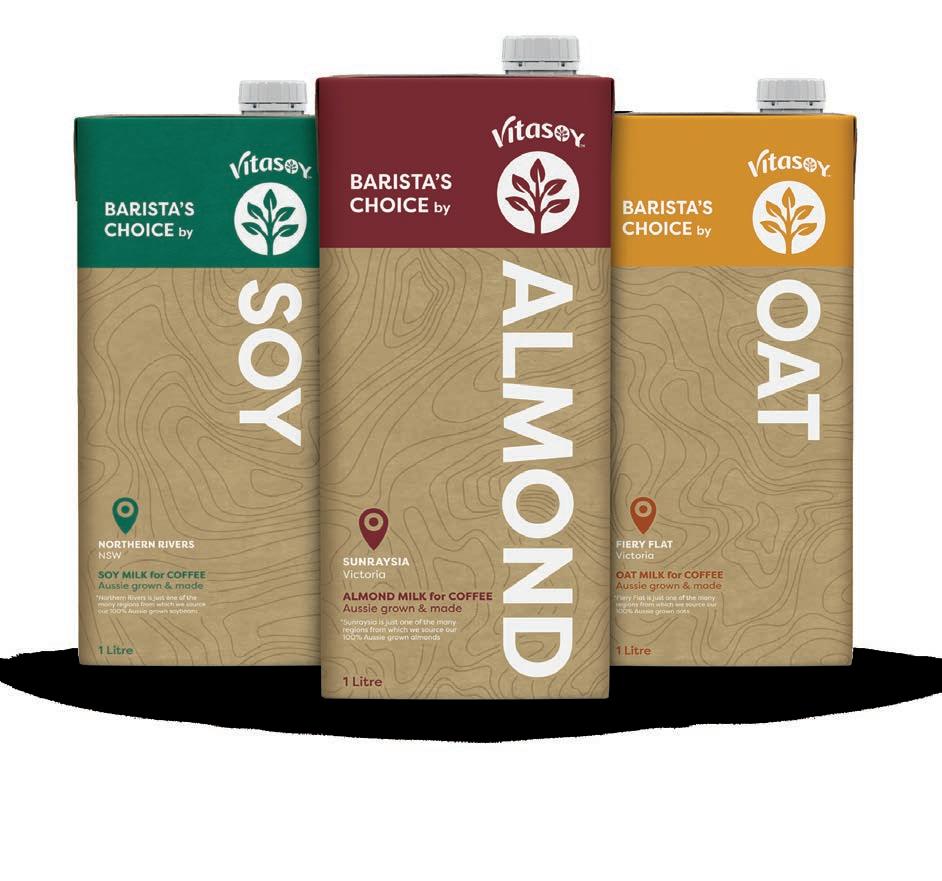
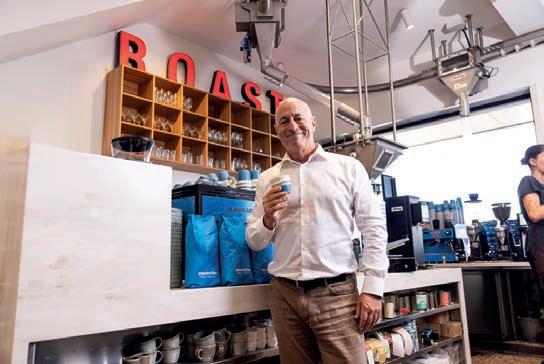
16 NEWS
18 STUFF ON THE SCENE INDUSTRY PROFILES
20 KNOWLEDGE LEADER
Honoka Kawashima reveals her path to the world stage
22 C ELEBRITY CHEF
Louis Tikaram on why the hospitality industry is more than just flavours and ingredients
26 PILLARS OF STRENGTH
Merlo Coffee shares the three core values that have shaped the roaster
33
WHAT’S YOUR SIGNATURE BEVERAGE?
Arkadia shares 10 new seasonal signature drinks recipes
38 ONE TO WATCH
How to get involved in Milklab’s Roaster Royale competition and win $10,000
45 INFINITE INNOVATION
An inside look at MONIN’s innovation hub in Sydney
47 BACK IN BUSINESS
Five Senses reopens its mill in North Sumatra
48 TAKING THE REINS
BrewHub partners with Roastquip to make the transition to in-house roasting
53 LOVE AT FIRST SIP
Kivahan on how a chance encounter led to a fastgrowing business
54 STOCKING UP
How managing wholesale orders via Upstock makes life easier
57 DAIRY FARM OF THE FUTURE
Turning manual milking into a hands-free operation
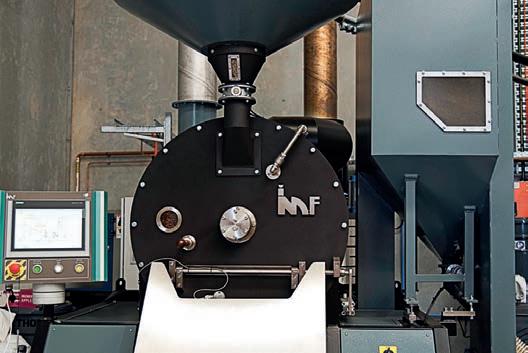
48
58 PIVOT FOR PROFIT
Veneziano on what businesses will need to remain profitable
65 OUTBACK OPPORTUNITY
Campos Coffee on the growth of specialty coffee in regional areas
66 HOMEGROWN TALENT
How Vitasoy is creating opportunities for rural baristas
71 PORTABLE POWER
How Wacaco’s portable innovations craft quality espresso
75 CURATING CREATIVITY
Will & Co helps customers find their creative rhythm
79 E NTERING THE BIG LEAGUE
The Bean Cartel upsizes its roasting operations
80 TOGETHER WE EVOLVE
Brambati S.p.A. and Evolve North join forces for a plant fit-out
83 ON THE GRIND
Why Cafetto’s Grinder Clean is an important part of regular cleaning routines
85 THE EXTRA MILE
Tetra Pak supports customers from concept to commercialisation
87 SIMPLICITY REIMAGINED
Jura introduces the latest version of the GIGA X3 coffee machine
88 MICE MAGIC
Delivering more industry value TECH PROFILES
30 FOR GOOD MEASURE
Barista Group on how the DiFluid Omix Green Bean Analyser standardises quality
34 BREAKING NEW GROUND
How the Fiorenzato AllGround Sense increases dose precision
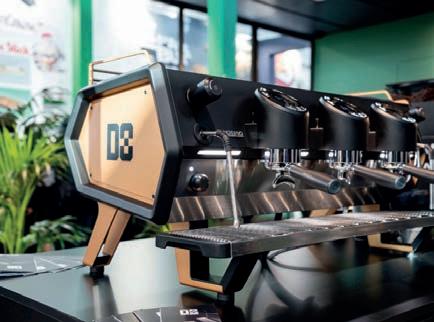
37 ON THE WORLD STAGE
Barista Attitude gets ready to support this year’s WBC in Busan
40 ACCEPTING AUTOMATION
Why Franke Coffee Systems' A Line is suited to all business environments
43 WATCH AND LEARN
Jack Simpson and Pete Licata introduce Mazzer’s Kony Sg and the Philos
69 A WORK OF ART
La Pavoni unveils the upgraded Botticelli domestic range
72 ONE STEP AHEAD
How WMF's coffee machines are designed for all milk varieties
76 A NEW CLASSIC Sanremo’s new D8 redefines single-boiler machines
DAIRY & DAIRY ALTERNATIVES
60 BeanScene and Tetra Pak celebrate a collection of products every coffee shop should consider SKILL BASE
94 ESPRESSO YOURSELF
Amy Zhang demonstrates her nostalgic Tom Cat character in her final latte art column
CAFÉ SCENE
90 CAFÉ SCENE
Venues to visit around Australia and New Zealand
97 BREAKING BARISTA BARRIERS
The NZSCA reintroduces regional competitions
98 GET TO KNOW
Caleb Cha, 2015 World Latte Art Champion and owner of Tone
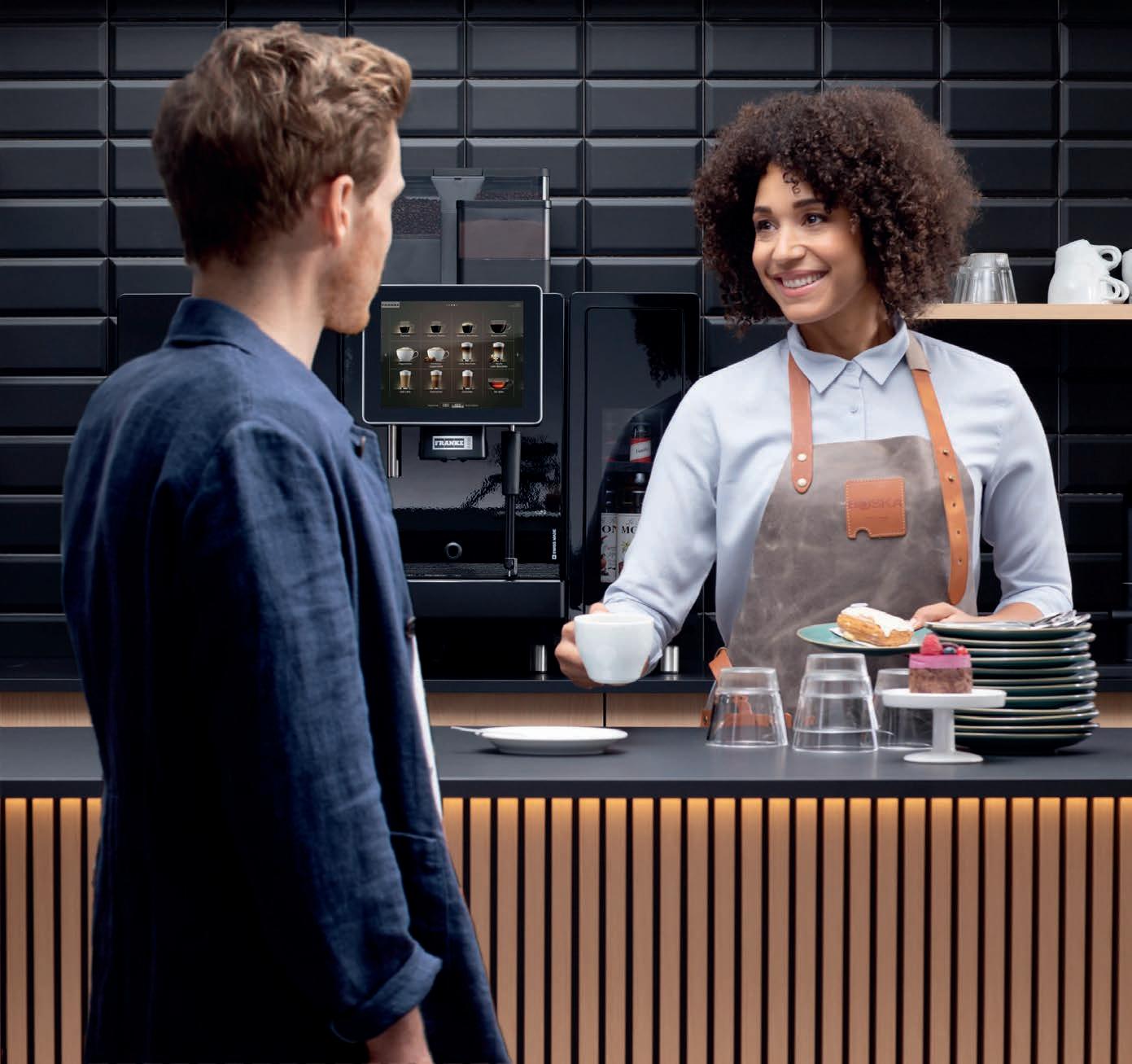
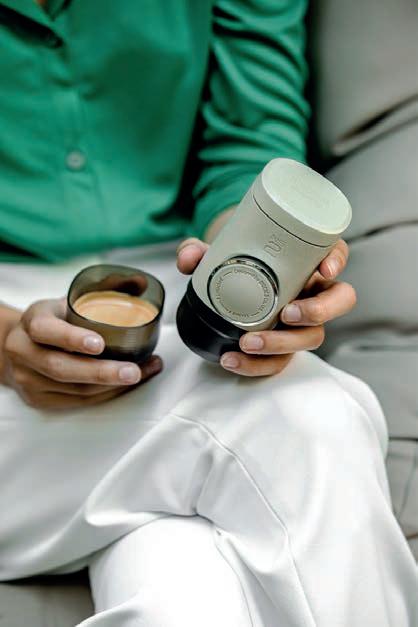

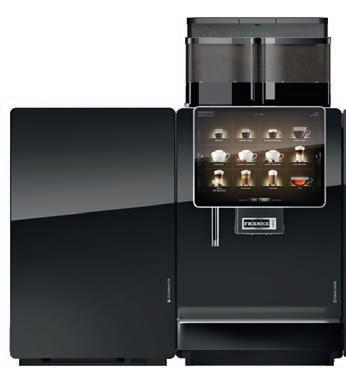

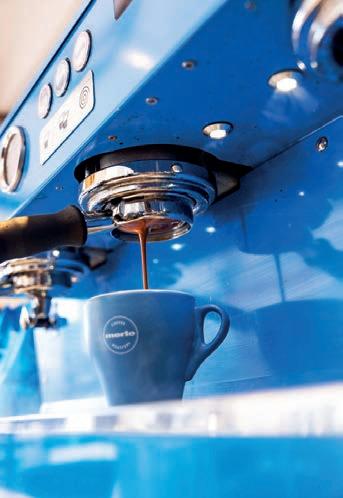
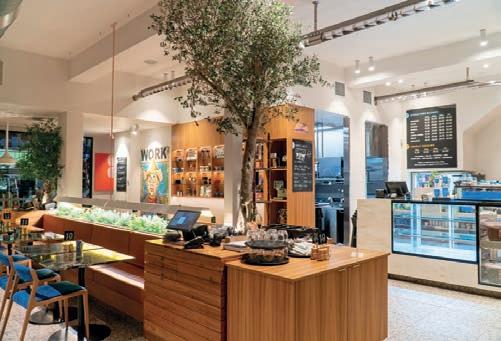
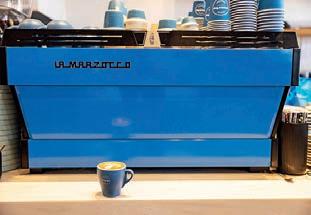
10 Thompson St, Bowen Hills, QLD 4006 merlo.com.au
For the April edition of BeanScene, we travelled up the coast to Brisbane, a cosmopolitan hub of arts, culture, food, and coffee.
Contributing to the vibrant coffee culture from its Bowen Hills café and roastery is Merlo Coffee.
Its freshly refurbished venue was the ideal location for the April covershoot, complete with a front-row seat to the coffee roastery’s operations.
“Merlo Coffee is a leader of the Queensland coffee community and in more ways than one. It has a long history as a quality coffee roaster, but more than that, it is devoted to supporting its local community and those within it (see page 26). It’s for this reason we wanted to honour Merlo’s contribution to the Brisbane coffee community, and its devotion to the Australian coffee community too,” says BeanScene Editor Sarah Baker.
Merlo Coffee Marketing Director Carl Pfeiffer helped coordinate the covershoot, which embraces the journey of the bean to cup and Merlo Coffee’s automated system.
A hopper-fed bean shoot transports roasted Merlo Coffee from the 360-kilogram roaster.
An automated system snakes along the ceiling through the café, carrying beans in a transparent glass tube, entertaining patrons as they dine in the café.
The coffee granules eventually reach the custom painted La Marzocco Linea PB espresso machine, and for the purpose of this shoot, the coffee was extracted via a naked portafilter into a hand crafted and locally sourced ceramic cup.
“The coffee being pulled through the naked portafilter is our Private Blend, which is exclusive to our retail stores,” says Carl. “It is a well-balanced and full flavoured coffee, with a satisfying clean, sweet aftertaste.”
Carl was joined on the day of the shoot by photographer Jeremy Veitch.
“We were working pretty hard, and the feeling was that the next shot would be the right one, but at a certain moment we realised the perfect match was there: the right light, the right angle, and the perfect extraction,” says Jeremy. “Looking at the cover image, you can’t help but want to enjoy a Merlo Coffee, and then another and another.”
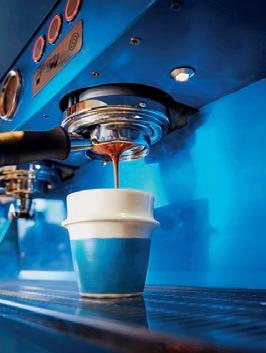
CHIEF OPERATING OFFICER
Christine Clancy
christine.clancy@primecreative.com.au
MANAGING EDITOR
Sarah Baker sarah.baker@primecreative.com.au
EDITOR
Kathryn Lewis
kathryn.lewis@primecreative.com.au
JOURNALISTS
Hayley Ralph hayley.ralph@primecreative.com.au
Dominic Morrell dominic.morrell@primecreative.com.au
ART DIRECTOR/DESIGN
Daz Woolley
HEAD OF DESIGN
Blake Storey
DESIGN PRODUCTION MANAGER
Michelle Weston
BUSINESS DEVELOPMENT MANAGER
Adele Haywood adele.haywood@primecreative.com.au
C LIENT SUCCESS TEAM LEADER
Janine Clements janine.clements@primecreative.com.au
PHOTOGRAPHY
Jeremy Veitch, James Thomas
CONTRIBUTORS
Emma McDougall, Amy Zhang
HEAD OFFICE
Prime Creative Pty Ltd 379 Docklands Drive, Docklands, Victoria 3008 p: 03 9690 8766 f: 03 9682 0044 enquiries@primecreative.com.au www.beanscenemagazine.com.au
SUBSCRIPTIONS
03 9690 8766
subscriptions@primecreative.com.au BeanScene magazine is available by subscription from the publisher.
The rights of refusal are reserved by the publisher.
All articles submitted for publication become the property of the publisher. The Editor reserves the right to adjust any article to conform with the magazine format.
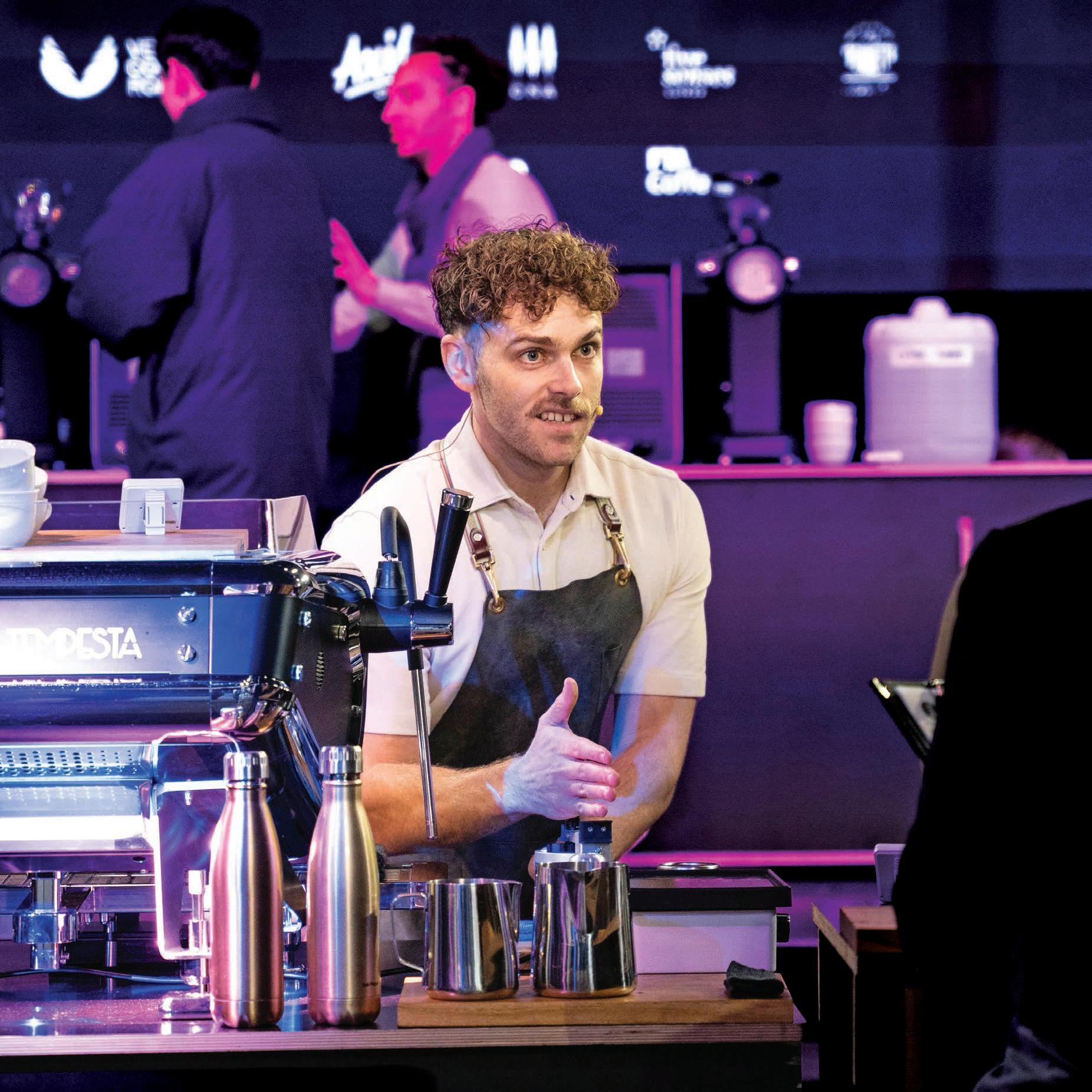

AUSTRALIAN BARISTA CHAMPION 2023 & 2024
WORLD BARISTA CHAMPIONSHIPS 2023 (AXIL COFFEE) (THIRD PLACE)
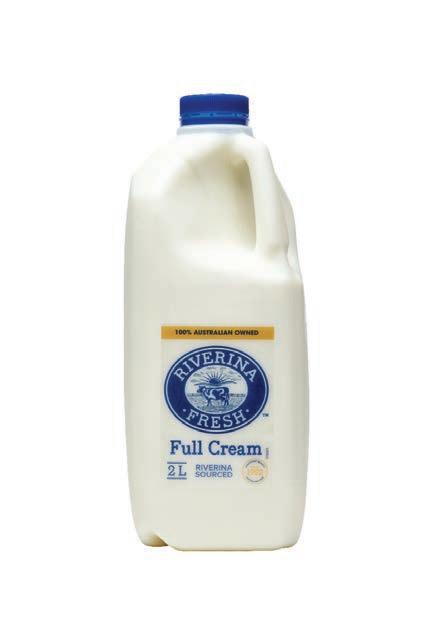
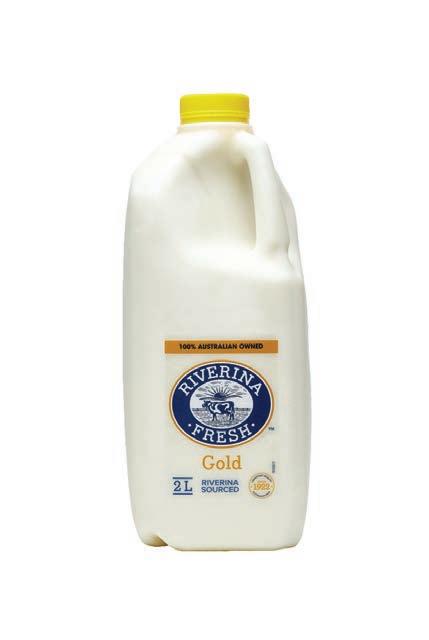
Each issue of BeanScene we profile a few of our talented contributors.

Amy Zhang is the 2022 ASCA Australian Latte Art Champion. Born in China, Amy is a Coffee Quality Institutecertified Q Grader and Barista Trainer, basing many of her latte art patterns off her favourite Disney films. Amy won the 2022 ASCA Northern Region Latte Art Championship, and the 2022 National title. She currently works at The Maillard Project in Brisbane, Queensland.
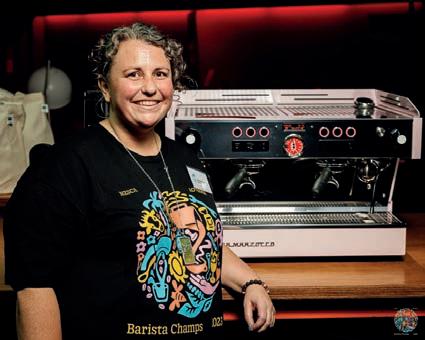
Emma McDougall
the Communication and Administration Coordinator for the NZSCA. After gaining a degree in hospitality management, Emma has worked in Sydney, Dublin, Auckland, London, and most recently, Wellington. She has owned and managed cafés and tech-judged the New Zealand Barista Championship in 2015 and 2016. Now, she gets to help run them. One of the greatest joys she gets from the coffee industry is watching young people progress through their coffee journey.
Follow us on Twitter @BeanSceneEd
‘Like’ us on Facebook @BeanSceneCoffeeMag
Follow us on Instagram @beanscenemag
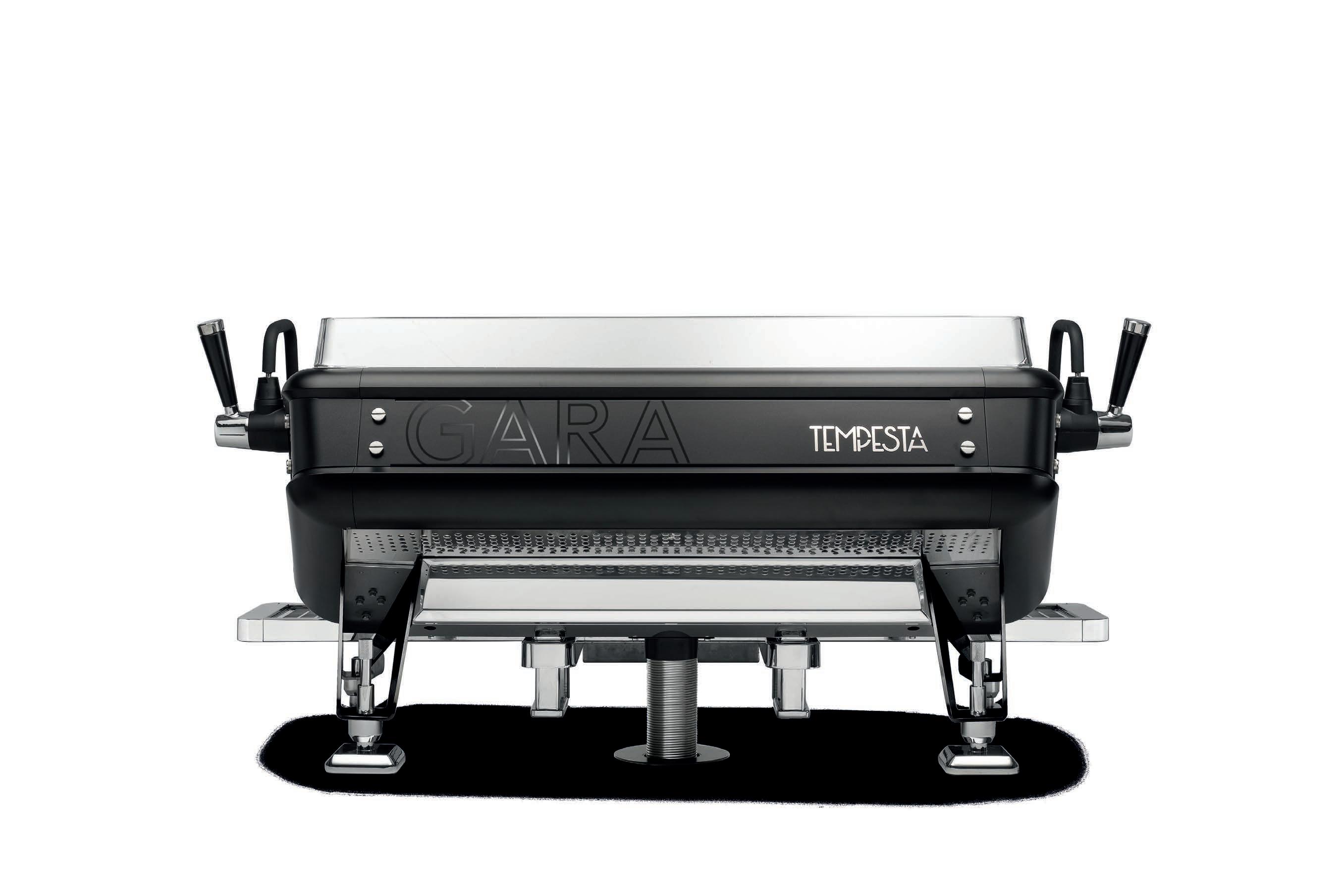
Follow us on LinkedIn @BeanSceneMag
and written thousands of articles. I’ve spoken to CEOs and machine technicians, chefs and café owners. I have watched technology
evolve, automation become commonplace, baristas gain celebrity status, and café culture used as a lexicon of Australia’s identity. But perhaps the most memorable experiences have been with those responsible for the production of the agricultural product this entire industry revolves around – the farmers. It is their voice that resonates most, and one we must advocate for if we are to sustain a future with increasing consumption and dwindling supply.
Over the years, the coffee industry has embraced me. It has believed in the power of narration, and taken me to places I only ever dreamed about. It has shown me warmth and acceptance, and in return, I’ve learned about the power of people, and that coffee truly connects us all. I am indebted to you, the reader, for your support and trust in allowing me to lead this beautiful publication.
As I take on the new position of Publisher of Prime Creative Media, it is time for me to leave you in the capable hands of the next editor, and pass the baton onto a very talented individual. It has been an honour to be Editor of BeanScene, a role I will cherish forever. I will continue to play a supportive role in Prime’s coffee titles and its dedicated coffee expo, MICE, a concept I have watched evolve from a boardroom discussion into one of the industry’s most loved events.
This is not goodbye. You can’t farewell an industry and friendships that have shaped the career and person I have become. Coffee will forever be my past, present, and future. Instead, I simply say “thank you”, and look forward to enjoying a coffee together one day soon.


On 23 February, the Australian Specialty Coffee Association (ASCA) National Coffee Championships 2024 crowned two back-toback champions, one returning champion, and two new titleholders, including one that’s been 11 years in the making.
For the second year running, Jack Simpson of Axil Coffee won the ASCA Australian Barista Championship. Gabrel Tan of Veneziano Coffee Roasters was runner-up, and Hugh Kelly of Ona Coffee placed third.
“I’m stoked. I really wasn’t expecting to win as it was a tough competition this year with a lot of good competitors,” Jack told BeanScene.
Also retaining a title for the second-year running was Thomas Hutchins of Code Black Coffee, who won the ASCA Australian Brewers Cup Championship.
Hany Ezzat of Ona Coffee placed runnerup, and Julijan Marcovic of Zest Coffee placed third in the national event, which took place at The Wool Mill in Brunswick East, Melbourne.
“Winning is a wonderful surprise but my personal goal is to just keep getting better. I had much room for improvement last year, particularly in the compulsory round. Thankfully, the hard work paid off this year,”
“While I’m satisfied with what I said and brewed to the best of my ability, I still think I have room for improvement.”
Victor Vu of Ona Coffee claimed the title of ASCA Australian Latte Art Champion for the second time since his victory in the 2020 competition.
“I have very high standards and put a lot of pressure on myself to perform at my best, so when my name was called as the winner, I was in shock. I put trust in myself and was proud I achieved my goal,” Victor says.
Ming Wan of Ona Coffee placed second and Georgia Ellis of Runyeh Coffee placed third.
One of the most emotional wins of this year’s competition season was Frankie Shi of Infinity Coffee Roasters, who won his first ASCA Australian Cup Tasters Championship 11 years after his first attempt.
Simwu Nam of Take Two Bagels finished second, while Ohkyung Kwon took home third place.
“I feel unbelievable,” Frankie says. “I’ve put in a lot of effort and time into this, and in the end I was able to just do my best.”
Frankie and Simwu correctly guessed all eight sets in the final, with Frankie finishing in the faster time of 4 minutes 29 seconds.
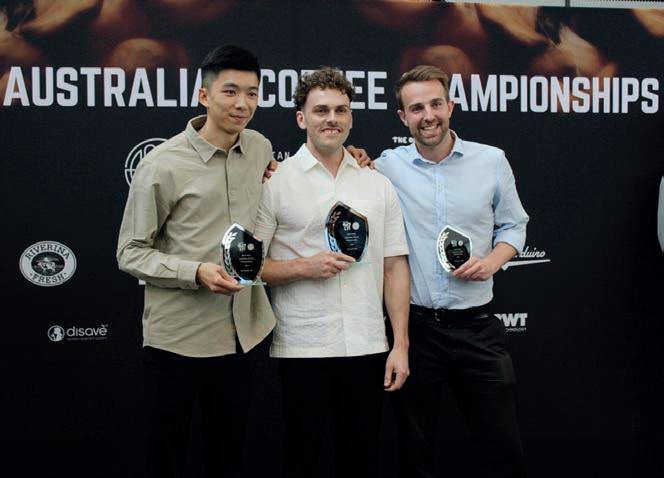
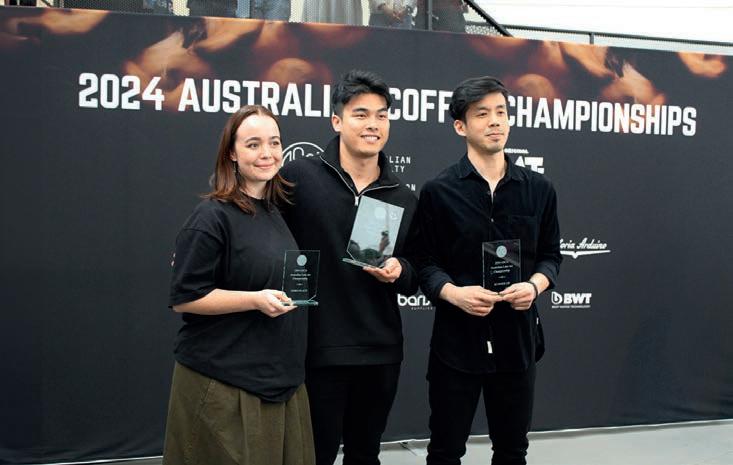
“I thought the final was a lot harder than the semi-finals,” Frankie says. “Sets three and seven had me really worried.”
In the Australian Roasting Championship, Mitchell Lee from Ona Coffee won, with Danny Cao from Toby’s Estate finishing second, and Harry Lin in third place.
“It’s an unbelievable feeling. I still don’t feel like I actually won,” Mitchell says.
Competitors tested their skills over several rounds of coffee grading, cup quality grading, and profile development.
“I spend more time sorting the beans and ensuring uniform size than on roasting,” he says. “This way, I feel like I’m able to produce the best tasting coffee.”
Frankie and Thomas will compete in their respective World Cup Tasters and World Brewers Cup Championship events at the Specialty Coffee Expo in Chicago from 12 to 14 April.
Jack will compete in the 2024 World Barista Championship at World of Coffee in Busan, South Korea, from 1 to 4 May.
Sangchul and Victor will compete for the 2024 World Roasting Championship and World Latte Art Championship title respectively, at World of Coffee Copenhagen, Denmark, from 27 to 29 June.

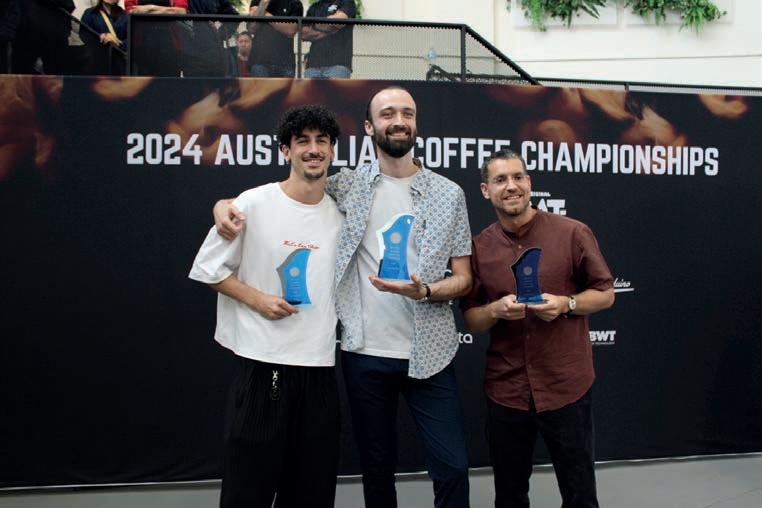
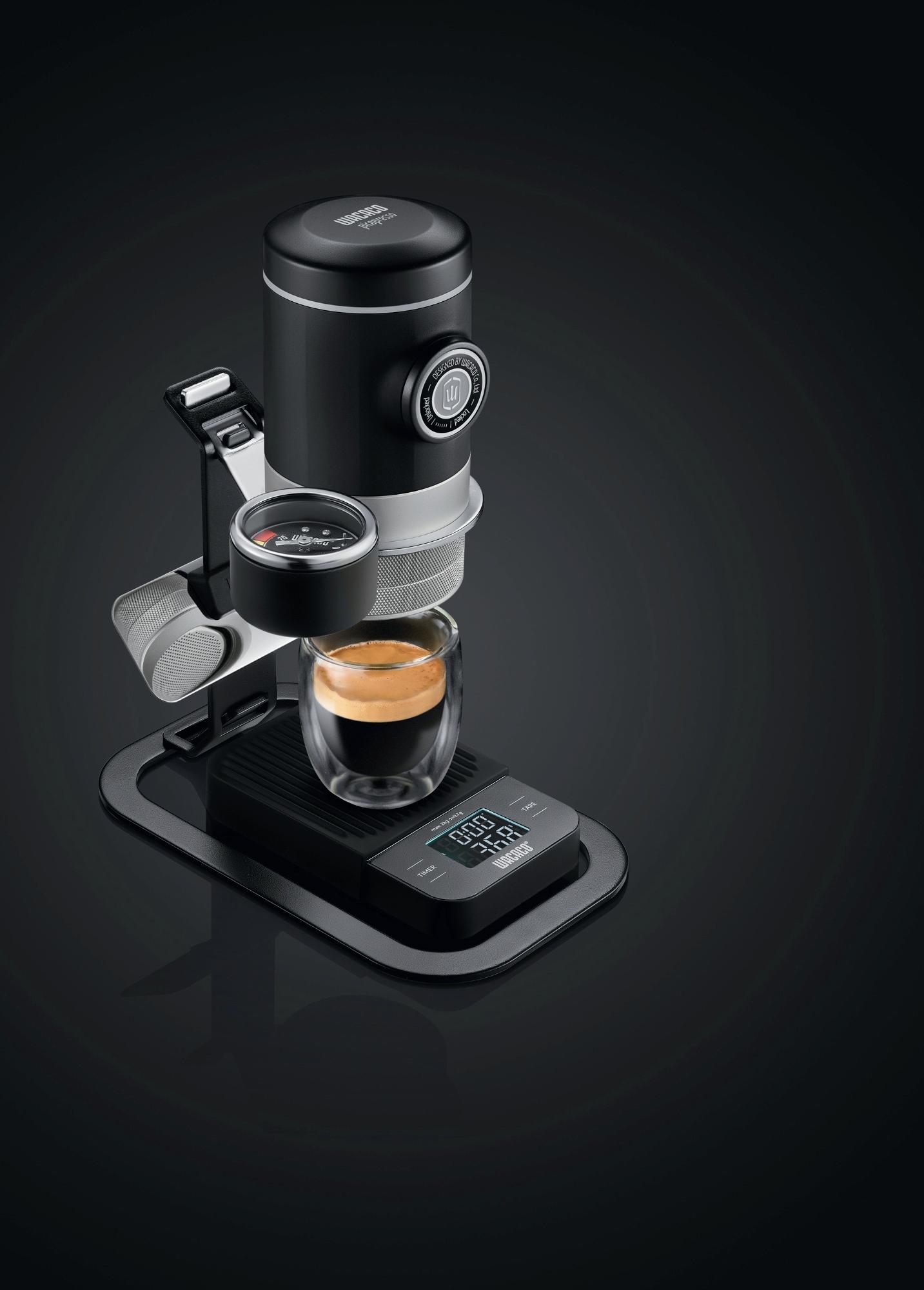

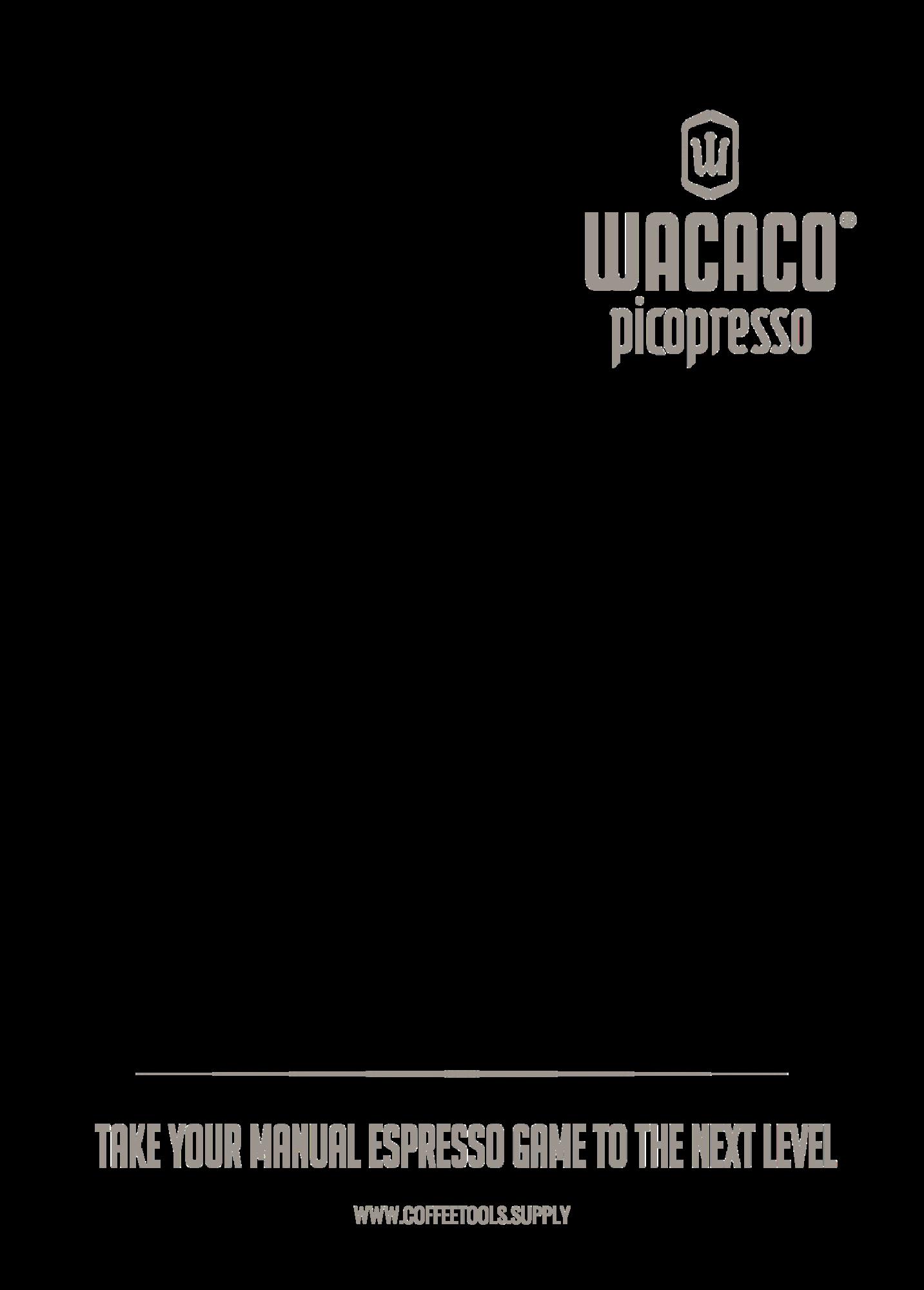

Meet Subminimal’s first special edition NanoFoamer Lithium. The hand-held foamer sports all the features of the original Lithium version, including clip-on screens, stainless steel housing, an on/ off digital switch, and a powerful multi-touch, two-speed option using a rechargeable 3.7v Li-ion battery. This all-white model also comes with a matching wall mount so that the NanoFoamer is always within reach. Effortless to use, quick to clean, and easy to recharge, the NanoFoamer Lithium is a must-have for the home barista wishing to create fine microfoam at home. The Special Edition
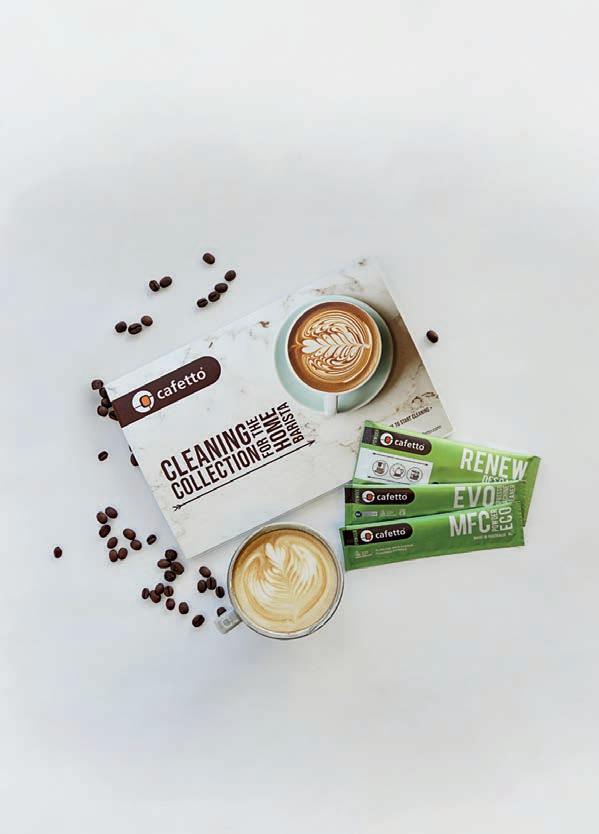
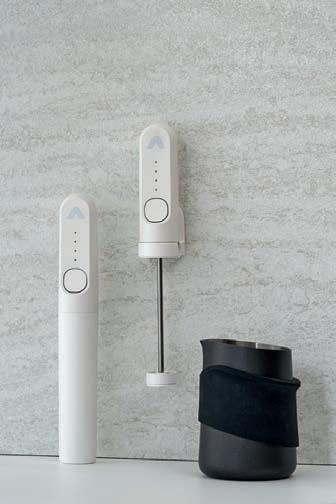
Cafetto is giving baristas the tools to create café-quality coffee at home with its organic-focused Cafetto Cleaning Collection, which looks after the traditional espresso machine from top to bottom.
The four-week pack features Evo Espresso Machine Cleaner for weekly cleaning, MFC Powder Eco for monthly Milk System Cleaning, and Renew Descaler for monthly hard water scale removal. Pre-portioned sachets give users complete dosage control to ensure the machine is working at its peak, while the neat envelop packaging provides minimal storage.
For more information, visit cafetto.com/product/cleaning-collection
The Mazzer Philos grinder is a premium commercial single-dose, flat-burr grinder designed to get the most out of every coffee. Its small footprint, accurate mechanics and state-of-the-art materials make it an ideal choice for baristas looking for consistent quality. The Philos can adjust to all extraction methods, from espresso to batch brew, without wasting time or coffee. The asynchronous motor and precise component machining provide durability over time and high reliability. Weighing only 12.5 kilograms, the Philos is compact enough to fit into any tight space on a barista countertop.
For more information, visit cwe.com.au
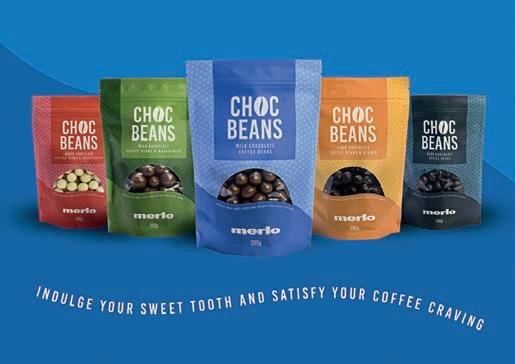
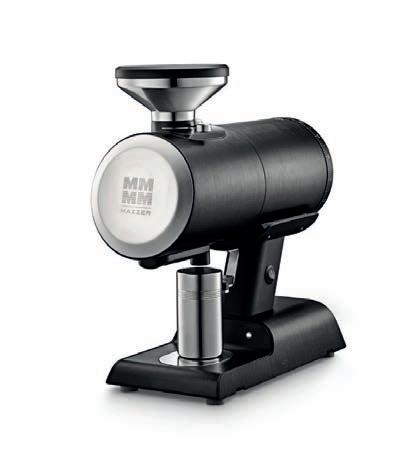
If you want to indulge your sweet tooth and satisfy a coffee craving, look no further than Merlo Coffee’s new range of chocolate-coated coffee beans. Merlo’s freshly roasted specialty coffee bean are smothered in lusciously smooth chocolate from Byron Bay Chocolate Co. Roasted in Brisbane and locally crafted using only the finest ingredients, Merlo Coffee’s Choc Beans range is available in five delicious flavours including milk and dark chocolate, milk chocolate and macadamia, dark chocolate and ginger, and white chocolate and raspberry.
For more information, visit merlo.com.au
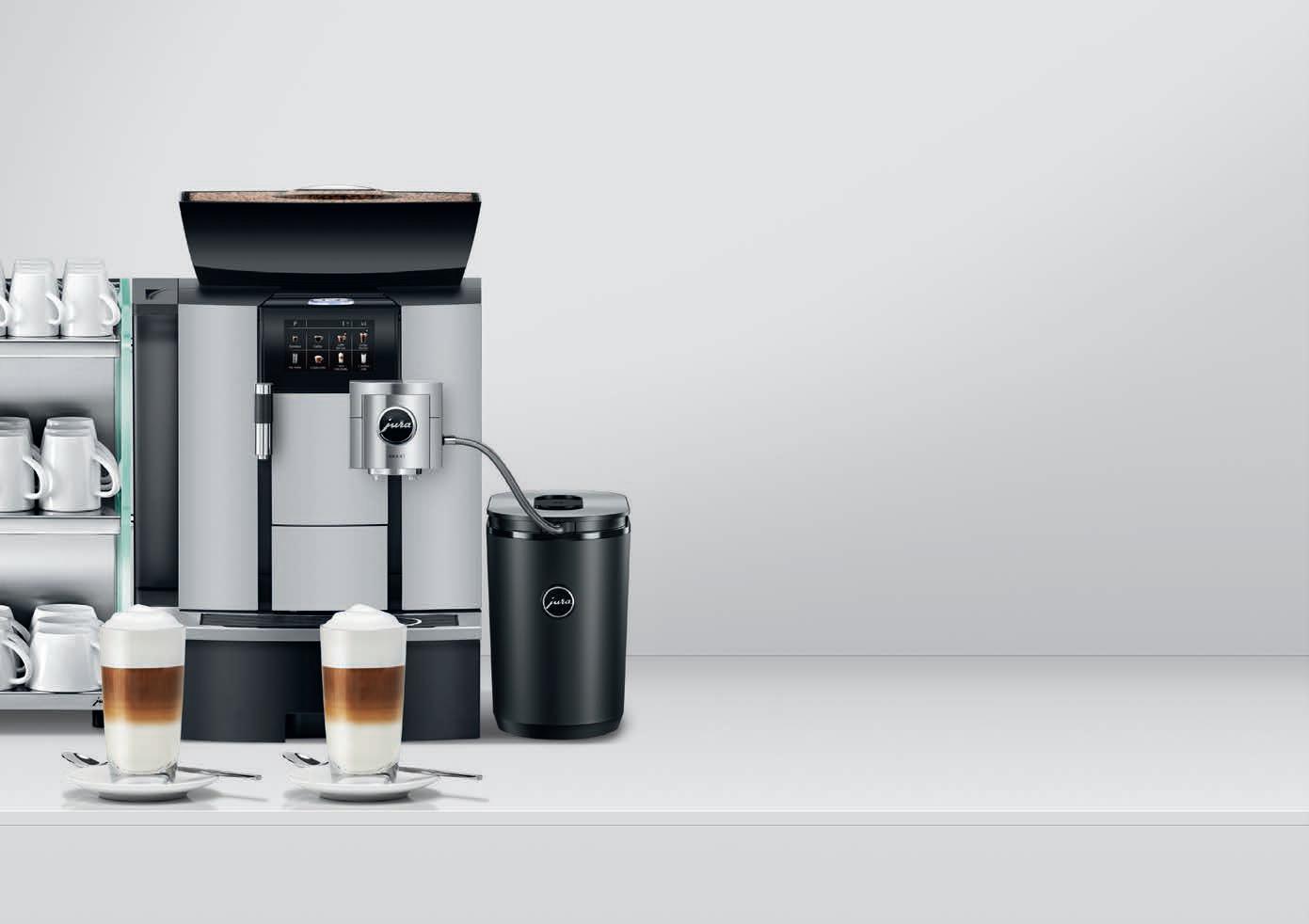 Image: Coffee Tools Distributing.
Image: Cafetto.
Image: CWE.
Image: Coffee Tools Distributing.
Image: Cafetto.
Image: CWE.

Family owned and operated since 1991, SSP Grinding Solutions was one of the early manufacturers of grinding tools in South Korea. Barista Group, its exclusive Australia and New Zealand distributor, marks it as a leader in highquality cutting and specialty tools.
SSP Grinding Solutions offers a complete line of flat coffee burrs suitable for many popular grinders, including the Mahlkonig EK43, Anfim SPII and Scody, Ditting 804, Mythos One, and several Mazzer units.
The burrs are made from several different high-performance materials, and are available in a Tungsten, Red Speed, or Silver Knight coating.
For more information, visit baristagroup.com.au
Vitasoy has teamed up with Tetra Pak to launch its new Barista’s Choice by Vitasoy packaging. The Tetra Pak Craft carton is made from more than 85 per cent renewable materials. Together with the new plant-based caps made from sugarcane, the packaging’s carbon footprint is reduced by 17 per cent.
Vitasoy supports Australian farmers across the country. The brand sources sustainably grown almonds, oats, and soybeans, before expertly blending them into barista-quality alternative milks at its site in Wodonga, Victoria.
For more information, visit soy.com.au/baristas-choice
Image: Barista Group.
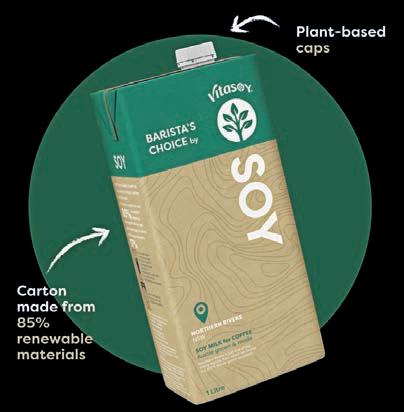
Image: Vitasoy.

Uncompromisingly good coffee in a professional setting. For example with the GIGA X3 for preparing up to 150 cups a day and 32 exclusive speciality coffees. The precision ceramic disc grinder with Automatic Grinder Adjustment delivers perfect results, while the Speed function creates aromatic lungo specialities in record time. The ideal solution for the office floor, seminar and conference venues, breakfast rooms, catering and coffee to go. And the free JURA Pocket Pilot ensures access to a new generation of mobile payment and management solutions.
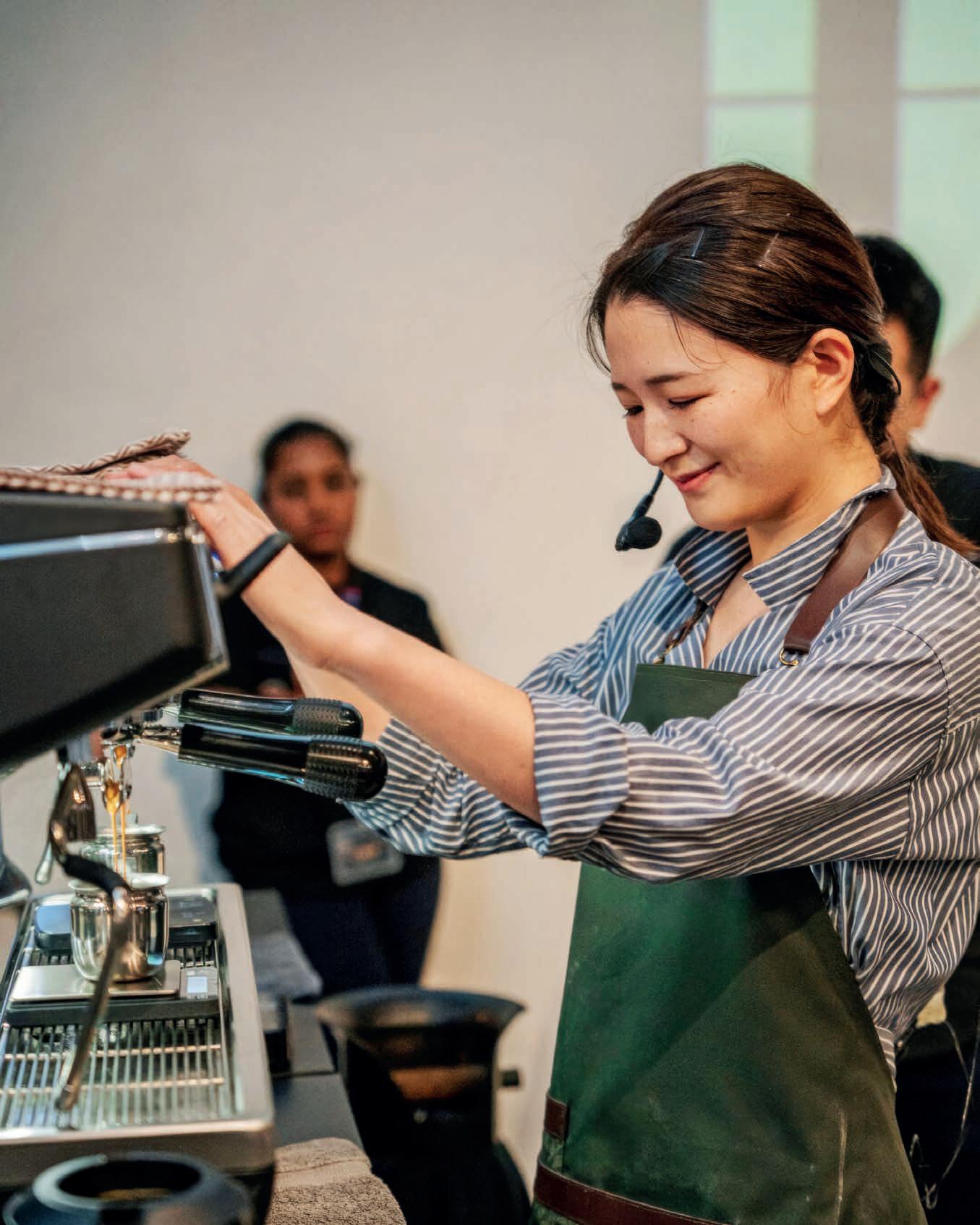
Honoka Kawashima reveals the path that led her to the world stage, and how a New Zealand holiday jumpstarted her coffee career. On the rise
ix years ago, Honoka Kawashima arrived in New Zealand. She had only planned to stay for a short time but was quickly swept up in the country’s vibrant coffee culture.
“I was a hotel receptionist before I decided to travel. On the trip, I used my Working Holiday visa to visit Australia, learn English, and immerse myself in the coffee world,” Honoka says.
“I returned to Japan for a year and continued to learn more about coffee. I
became increasingly passionate about it until I decided to move to New Zealand to take my coffee career seriously.”
Frank Hsu, owner of Frank’s Coffee in Wellington’s CBD, hired Honoka to help her reach her potential.
“I didn’t have much experience in the beginning, and I didn’t speak much English either. But I was very eager to build my skills and show my appreciation to Frank for giving me a chance. I devoted all my time to learning everything I could,” says Honoka.
“I soon realised how complex and interesting coffee is, and that’s when I discovered the world of coffee competitions. It was a new challenge for me and a goal I wanted to aim for.”
Within her first year working at Frank’s, Honoka competed in the 2019 New Zealand Latte Art Championship, which helped her gain confidence and skills to perform under pressure.
“I started to compete in the Latte Art Championship every year, which improved
my barista skills immensely. In my third year I came third which was amazing as my goal was to place in the top three. This achievement boosted my confidence to move on to the New Zealand Barista Championship,” she says.
Six months before the competition, Honoka started increasing the length and frequency of her practice sessions.
Initially, she dedicated three three-hour blocks per week, then increased to daily three-hour blocks — all on top of her normal working hours.
Her competition concept was how to make coffee more approachable for customers, drawing on her experience of studying the art and science of coffee at Frank’s. Her routine consisted of a milkbased coffee, an espresso, and a coffee-based signature drink, which showcased notes of strawberry yogurt, hibiscus, and pink grapefruit, with an orange peel finish.
In each of her serves, Honoka used a lactic washed coffee from Acevedo in Colombia’s Huila region produced by Luis Anibal Calderon.
“Coffee can seem confusing as there is so much complicated information and jargon surrounding it. My aim was to simplify coffee for customers, so I talked about it as if it were a human. I talked about what makes coffee special, its parents, and the environment it grew up in when it was a cherry. I want more people to be involved in the industry and for them to know it’s not scary or complex,” she says.
In her first year competing, Honoka was crowned 2023 Meadow Fresh New Zealand Barista Champion. She also won Best Newcomer and Most Outstanding Milk Beverage, an award given to the barista with the highest scored milk beverage on day one. The award included a NZ$2000 (around AUD$1870) cash prize, and trophy.
“I didn’t expect to win in all three categories, but I had set a goal to rank in the top six. I received a lot of support from different people leading up to the event, so I believe I won thanks to their support. My coach, Logan Collinge of Hammerstone Coffee, was very supportive from the beginning and provided a lot of inspiration. He helped me twice a week, which was incredibly kind,” she says.
Honoka didn’t stop there. She also won the Monin Coffee Creativity Cup Asia-Pacific Finals in November 2023. With the theme ‘enhance your five senses,’ contestants were tasked with creating four signature coffee mocktails that enticed all the senses: sight, smell, sound, taste, and touch. The three-day final was held in Kuala Lumpur, Malaysia.
Honoka competed against 13 other national champions from across the region and swept the floor with her Espresso Lacto-Sour drink, a combination of Monin
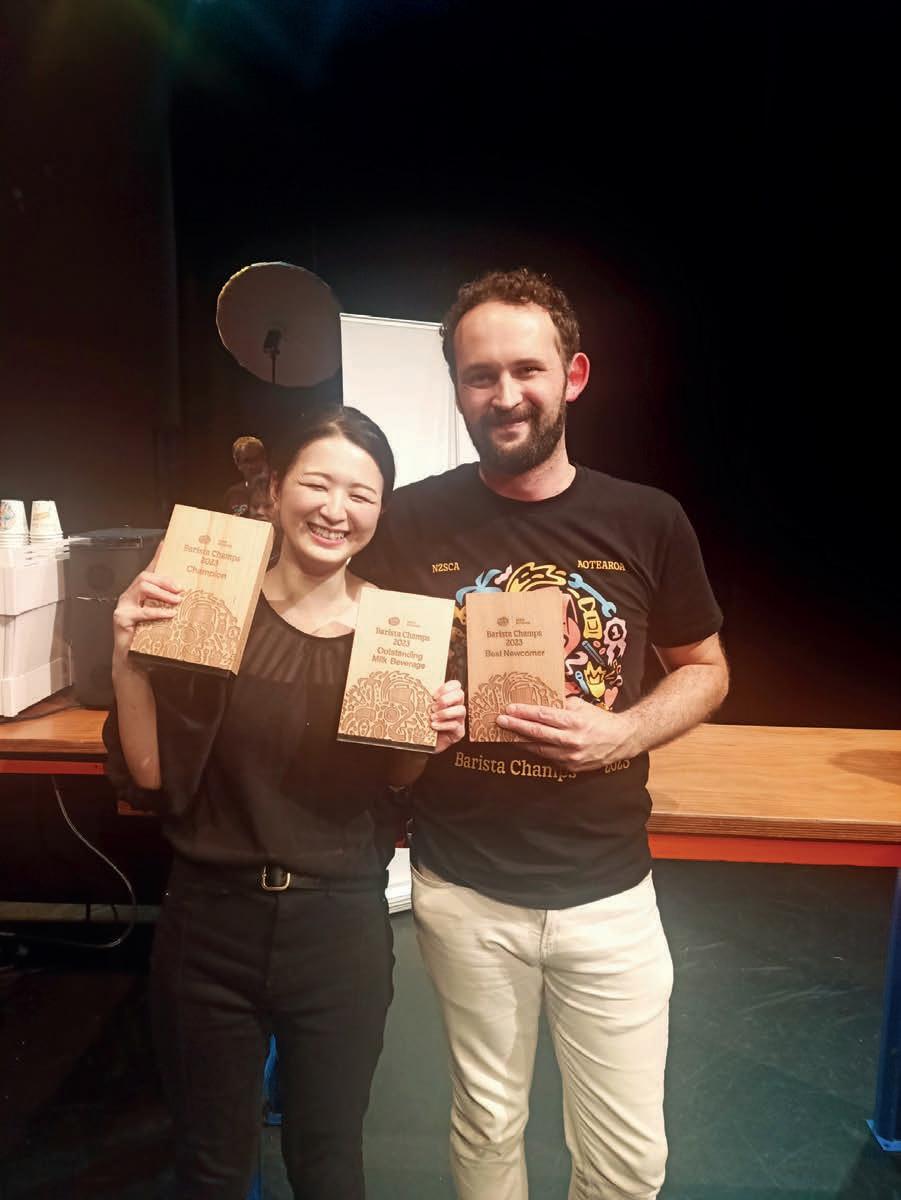
so I leaned on my coffee knowledge — that’s why I decided on the coffee first,” she says.
Her advice for those looking to compete in the future is to not wait for the “right” time to make the leap into coffee competitions.
“I always wanted to compete in a barista championship, but watching the super high-level performances each year scared me. I didn’t have the courage to enter the competition because I didn’t want to embarrass myself. Now I know I should have competed earlier as I have learnt so much about being a barista,” she says. “Luckily, I have a really good team in Wellington. Finding a great team is the most important part because we’re all in this together.”
Honoka now turns her attention to the World Barista Championship in South Korea, which takes place in May 2024. Her mindset ahead of the competition is based on setting her goals with the belief that she deserves to be there.
“I’m not setting low expectations simply because it’s my first time. Instead, I’m putting in a lot of effort. I’m pretty much set on the coffee I will use and I’m constantly practising my routine and presentation. At the moment, I’m choosing which cups to use
and stops me from getting too stressed,” she says.
“He’s coming to support me at the competition and I will return the favour by supporting him at World of Coffee Copenhagen in June, where he’ll compete in the World Latte Art Championship.”
Honoka is proud of what she’s achieved in the industry so far and looks forward to competing on the world stage for the first time.
“Looking back on the past two years, I’m so happy with what I’ve accomplished. From moving to New Zealand to placing in the top three of the New Zealand Latte Art Championship and winning the New Zealand Barista Championship, I’ve achieved all my goals. I’m proud I didn’t give up,” she says.
While she prepares for the World Barista Championship, Honoka is eager to continue developing her skills at Frank’s Coffee and doing what she loves most: engaging with customers.
“The main thing I enjoy about my job is communicating with the people who come into the café. I feel a connection with people through the coffee. We have lots of regulars at Frank’s and we’ve created a real sense of community,” she says.
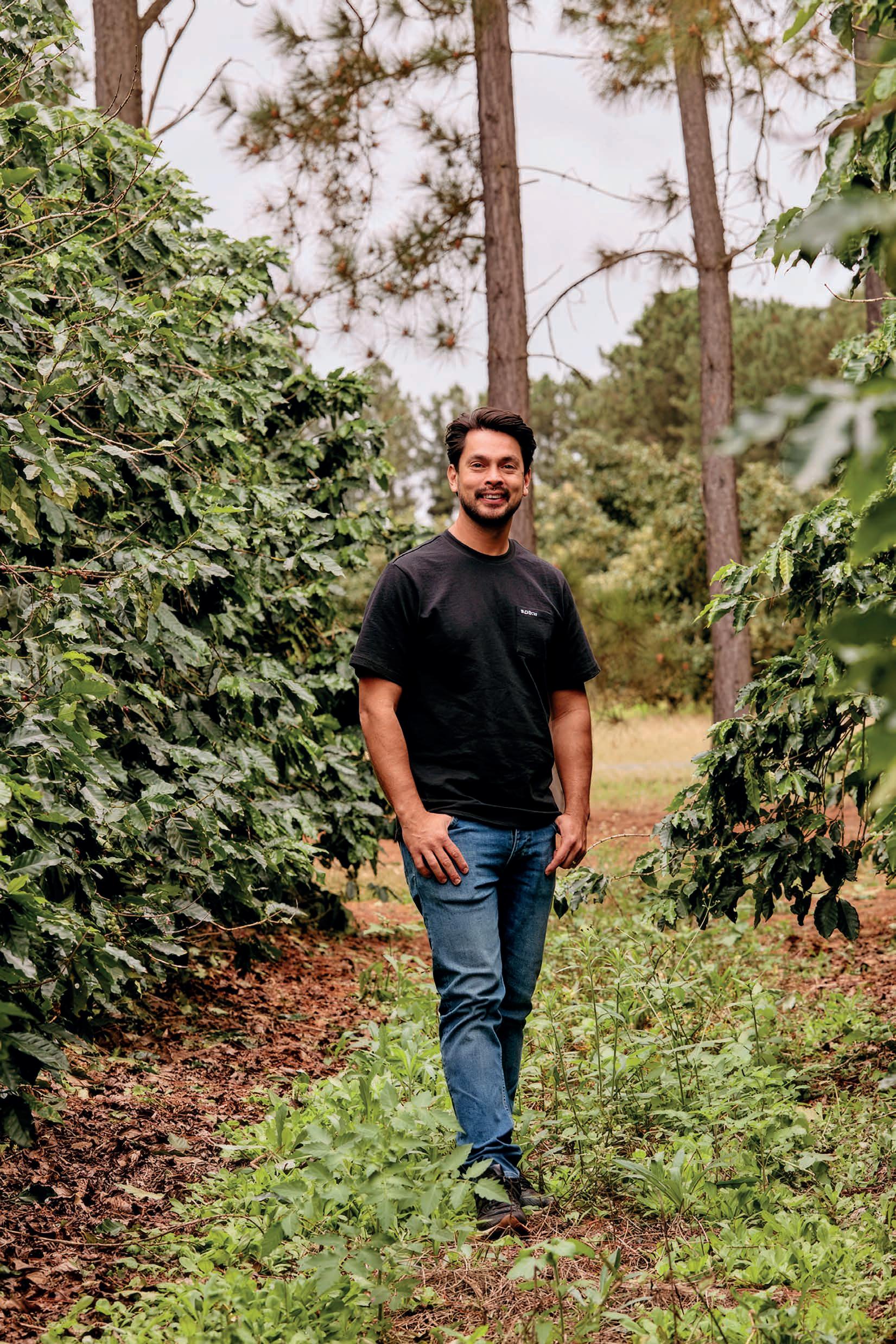
Louis Tikaram brings his passion for the bean into his cooking repertoire. He has created candied coffee beans, coffee praline, coffee ice cream, a coffee crusted venison loin, and of course, tiramisu – but with coffee extracted from a coffee machine. He says: “I think coffee beans are the most amazing and versatile product. I love using them for flavour, their buzz, and texture.”

Chef Louis Tikaram on why Australia’s café service is key to its international status, and why the hospitality industry is more than just food, flavours, and ingredients.By Sarah Baker
ouis Tikaram vividly remembers the day that ignited his senses and sent him on a voyage of coffee discovery. It was 2003 and he was 18 years of age. Louis had just moved to Sydney from the Byron Shire of Mullumbimby to pursue work as a first-year apprentice chef at renowned restaurant Longrain. He was living with fellow apprentice Luke Powell on Commonwealth Street, and one morning the smell of roasting coffee woke him.
“I was fixated on this aroma. In Byron, we had coffee [farms] but we didn’t have any roasters,” Louis says. “Luke and I went down Reservoir Street, and there was the original Single Origin (now Single O) roastery. It was a tiny hole-in-the wall. We went in, and there was a guy standing there with this massive drum roaster, roasting coffee in the middle of everyone sitting on milk crates. I thought, ‘this is heaven’.”
Louis recalls ordering a coffee and getting the jitters. It was his ‘aha moment’, akin to visiting Japan and tasting ramen for the first time.
“We went back every day and would talk to the roaster. He was old school. He would roast without thermometers or gauges, only working by smell, touch, and feel,” Louis says. “He was the real deal. From that day on, I was really interested [in coffee]. I gained big respect for it. I knew coffee wasn’t just a drink. It was an artisan craft.”
That interest has stayed with Louis throughout his culinary career. He lived in America for six years, running the kitchen at E.P. & L.P. in West Hollywood, where he gained an appreciation for drip coffee. He rejoiced the day that Paramount Coffee Project LA opened at the end of his street. The Sydney-based brand quickly became Louis’ regular hang-out, and a friendship formed with Aussie owners Mark Dundon of Seven Seeds and Russell Beard of Reuben Hills.
“At the time, so many brands were following Starbucks’ self-service model, but when Paramount Coffee Project opened, it changed the game. It was a business model
that encouraged table service and made the experience relaxing and easy to enjoy. If you were asked by the waiter if you wanted another coffee, you’d say ‘yes’,” Louis recalls. “I enjoyed taking my American friends there to show them how we do service in Australia.”
That level of service combined with quality coffee and passion for produce is why Louis believes Australia’s café scene is world-class.
“It’s a tough business, but I think we do it really well. Customers really respect and support the coffee culture, which is what keeps it so vibrant and allows you to push things to the next level,” Louis says. “This stems to the food and service in Australian cafés where people compare it to a restaurant experience.”
Back home in Brisbane, Louis enjoys his own coffee routine, using French Press and Bodum brewing devices when he’s not busy working as Head Chef of Stanley on Brisbane River.
“There are different styles of coffee to suit different moods or times in the day,” Louis says. “I like interesting coffee: spiced or fruit notes, or a deeper, rich flavour. The more aromatic and spicier the better. It’s funny because I hate full-flavoured beer. I like a very light beer that tastes like nothing.”
Growing up on a 110-acre farm in Mullumbimby, Louis was surrounded by coffee farms in the neighbouring area of Ballina and Byron Bay. In Fiji, Louis’ grandmother even grew coffee trees in her backyard, and would enjoy eating the “beautiful, sweet flesh” cherry straight from the tree branch. However, Louis had never experienced a coffee harvest until he recently spent a day at Howe Farming Group in northern Queensland with the second-generation family-owned farm while filming for Farm to Fork.
“I enjoy going to farms, meeting the farmers, having a laugh, and understanding what they do. I love learning and being a sponge to information about seasonality, soil, altitude, and the complete life cycle of food,” Louis says. “To fly around Australia
and visit farms [as show co-host] is my ultimate job. I would do that every day of my life if I had the opportunity.”
Louis’ regional upbringing makes him well suited to a TV show devoted to the origins of produce, and how they are grown. He went to school with the kids of dairy, avocado, and banana farmers, and respected their work ethic from a young age.
“When we would sit down at assembly in primary school, the farming kids had already been up four hours helping on the farm,” Louis says. “When you see milk on the supermarket shelves readily available, you don’t really appreciate that it comes from a family farm. I’m passionate about imparting that connection into young chefs, and having them respect all produce, from fish to meat, veggies, fruit, and dairy.”
Louis had the “perfect culinary combination” to lead him on a career path in food. With a Fijian father, a talented cook of a mother, a Fijian/Chinese grandmother and Fijian/Indian grandfather, Louis was heavily influenced by his family’s passion for food. He would watch his grandmother cook Indian-inspired roti, curries, and dahl, in addition to Fijian influences with freshly squeezed coconut cream, seafood, and seaweed.
“That combination of food was a really amazing part of my journey. In Fiji (where Louis lived pre-teenage years), we didn’t have television until 1996. You would go home after school and instead of zoning out in front of the TV, you would sit around the table, eat, and talk,” he says.
When he wasn’t doing that, Louis would wash dishes at a local restaurant. One day, a staff member failed to turn up for their shift, and Louis stepped in to help prepare for service. His understanding of spices was quickly unveiled. The chef invited Louis to spend more time at the restaurant, and before long, he was helping skewer satays, and making curry puffs.
“That was it. I fell in love with Thai flavours as I found them similar to what my grandma would cook with,” he says.
Continuing his run of luck, when Louis
was in his final year of school, he met a chef in Bryon Bay who had just finished working at a restaurant called Finns. He questioned Louis about his love for Thai food, who proudly replied, “I work at the Gecko Thai in Ocean Shores”. The chef encouraged Louis to move to Sydney and work at the highly respected Southeast Asian-inspired restaurant Longrain, so he did.
The decision proved a fateful one under the mentorship of chef Martin Boetz. It helped kickstart Louis’ 19-year culinary career in which he’s worked at Sydney venues Bentley Restaurant + Bar and Tetsuya’s, and restaurants in Vancouver, Barcelona, and Los Angeles.
“I love cooking. I love balancing and creating dishes, but I probably fell in love with camaraderie and friendships the most as a chef. When I first moved to Sydney, Luke Powell (now Chef/Owner of LP’s Quality Meats and Bella Brutta Pizza in Sydney) was one of the only guys that would talk to me in the kitchen. Fast forward 15 years, and he was one of the groomsmen in my wedding. We’ve been friends ever since, like brothers,” Louis says. “[Chefs] Dan Hong, Phil Wood, Daniel Puskas, and Mitch Orr all came up through the industry together. They inspired me a lot. We kept pushing each other and striving for success
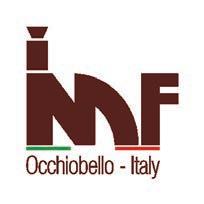
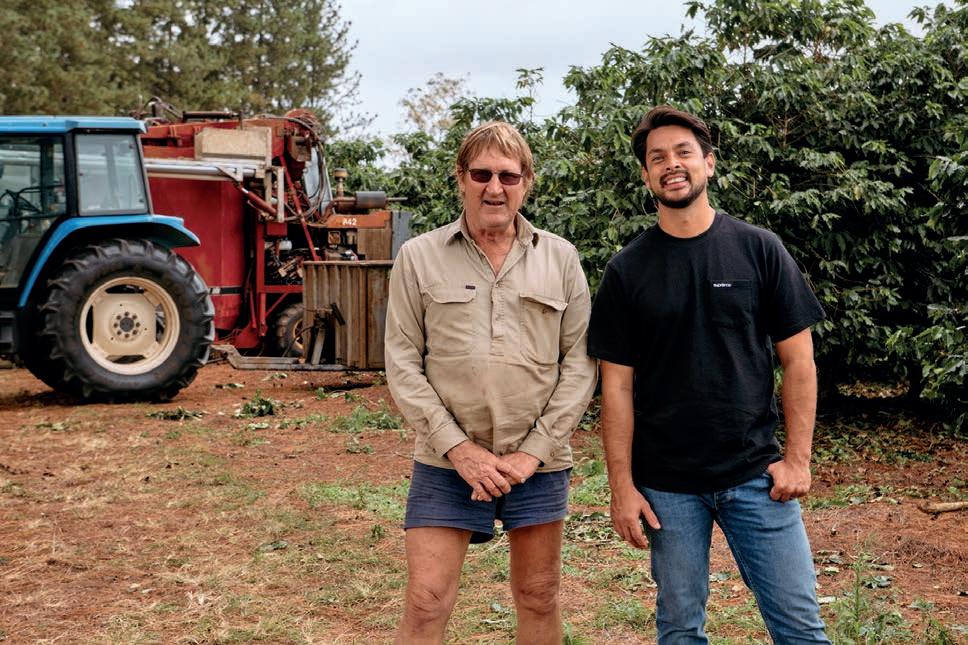
as young kids in the industry.”
Now it’s Louis’ turn to inspire the next generation of chefs. In between his many collaboration projects, which include curating Caper Byron Bay’s 10-day gastronomy festival celebrating Byron Bay and Northern Rivers region’s food culture, and running his own kitchen, mentoring the
next tier of talent is Louis’ main objective.
“If you fall in love with [the chef profession] and take a step back, it’s a pretty amazing [career]. I want to show young chefs that it’s not just a job: it can be a career that can change your life and lead you to any goal you’ve ever wanted. You can really reach it.”
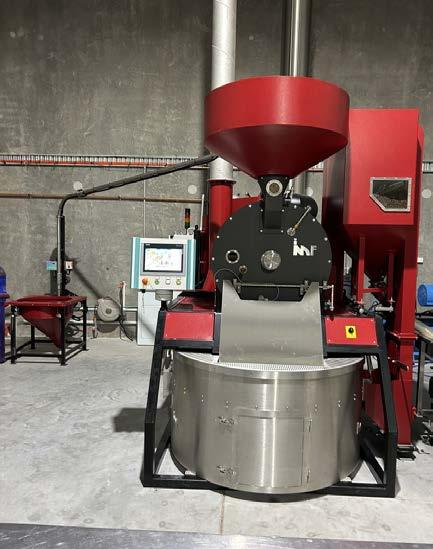
to
• 50 adjustable parameters per profile.
• 1000 profile storage.
• Recirculating heat technology saves up to 47% gas consumption.
• Cropster/Artisan datalog integration.
• Over 80 plants in Australia & NZ since 2012 installed by Roastquip.
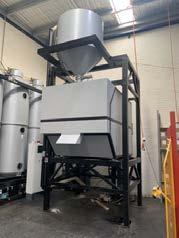
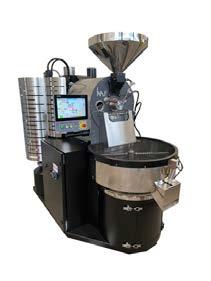
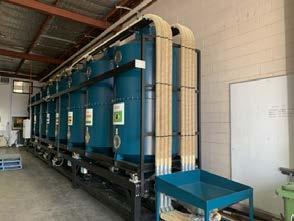

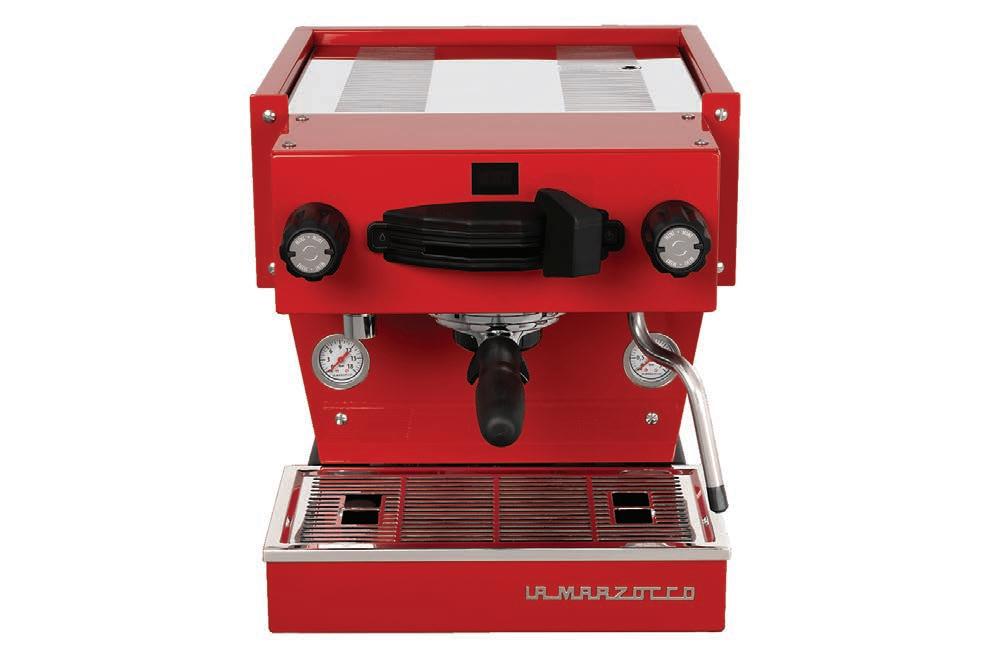

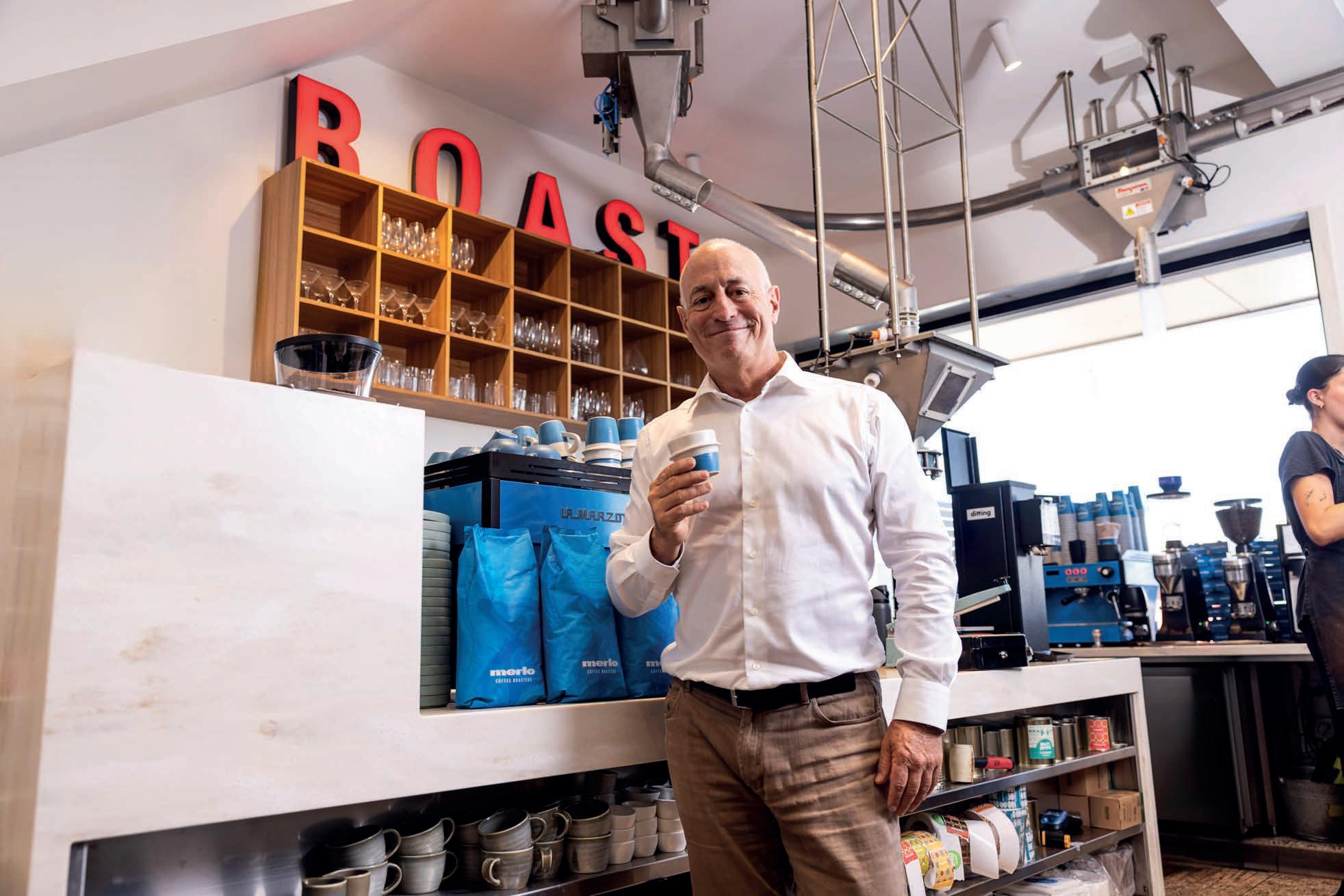
service, and community partnerships.
“We seek excellence in everything we do, never settling for mediocrity. From our dedicated trainers that support our wholesale and retail baristas, to our team of roasters, all Merlo staff share the same passion for coffee excellence,” says Dean.
“We pride ourselves on freshly roasted coffee that maintains a consistent level of
beanscenemag.com.au
full flavoured coffee, with a satisfying clean, sweet aftertaste, which delivers consistently,” he says.
Beans from Costa Rica, Nicaragua, Colombia, and Papa New Guinea make up the blend, and deliver notes of milk chocolate, caramel, and hazelnut.
“Costa Rica is known for its superior coffee beans. Its tropical climate makes
choose from.
“Papua New Guinea has a vast, mountainous landscape with varying altitudes for its many plantations. The result is a mixture of sweet, fruity, and floral aromas and flavours,” Dean says.
“Private Blend has the best coffee beans from some of the most abundant Arabica coffee growing countries.”
Dean says great tasting specialty coffee is just one of the perks of partnering with Merlo Coffee. The roaster upholds the highest quality in its customer service, the second pillar, as well as the provision of premium equipment, accessories, aroundthe-clock support and troubleshooting, barista and machine training, and a support team to assist with any enquiries.
“We’ve got a great reputation for outstanding customer service and the ability to build long and strong relationships. These are built purely on a long history of delivering quality products and services consistently, and treating businesses like our own. Not only that, but our support is also quite extensive, with 24-hour emergency breakdown and delivery services available every day from one of our eight representatives on the road,” Dean says.
For Dean, the third pillar of business is helping those who support Merlo Coffee.
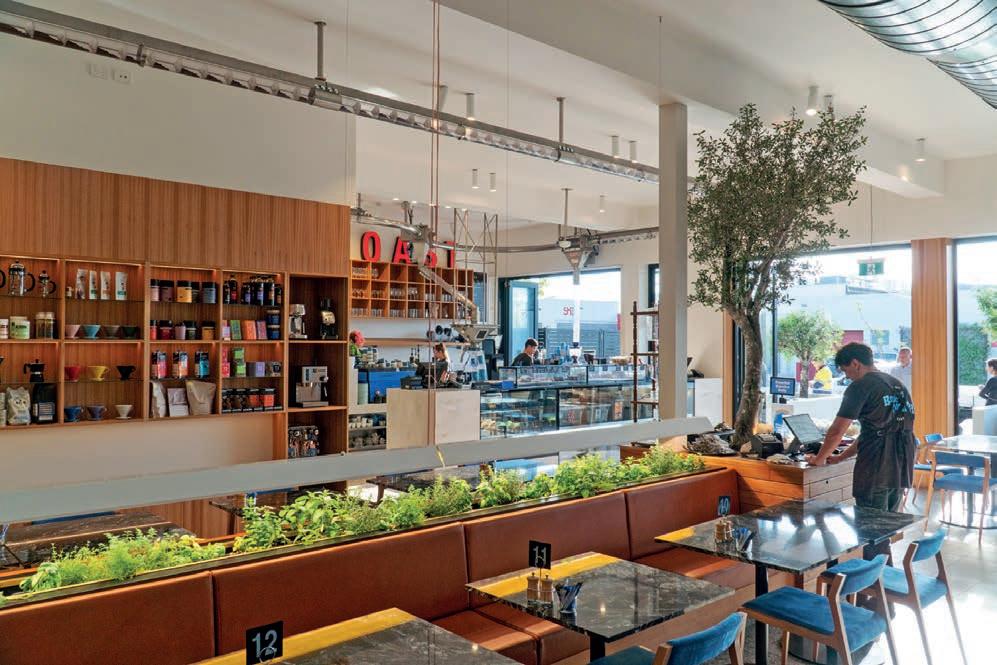
“Assisting local communities, charities, groups, and schools has built the foundation of who we are as an organisation,” Dean says. “For us to be able to give back to the community is rewarding. The Merlo team are proud to be able to get behind events and organisations that make a significant

Merlo Coffee has long-standing relationships with many of its charity partners, such as its 10-year association with the Prince Charles Hospital Foundation. An enterprise of the foundation, The Common Good, sees a team of researchers and volunteers collaborating to find breakthroughs in lifesaving and life-
Dean and the Merlo Coffee team have supported the foundation since 2014 and contributed more than $1 million in monetary and in-kind contributions to help
fund research in dementia, mental health, heart disease, and lung disease.
“This funding makes a significant impact on the direction of these projects. One is the Intensive Care Unit (ICU) of the Future, a world-first project revolutionising ICU for patients and their families,” Dean says.
Merlo Coffee is also involved with several homeless support organisations. This includes 3rd Space in Brisbane’s Fortitude Valley, a drop-in centre where homeless people can find support, and New Farm Neighbourhood Centre, a hub that encourages people to meet and connect with local community education programs.
“3rd Space provides essential support and companionship for homeless individuals, offering them a sense of belonging and respect. New Farm Neighbourhood Centre delivers a wide range of services which assist with physical and mental health, including food relief, computer use, library facilities, tennis sessions, art and yoga classes, playgroups, and much more. It also has kitchen, laundry,
and showers facilities,” Dean says.
Merlo Coffee donates coffee to the New Farm Neighbourhood Centre for its Community Coffee Program, which supports vulnerable people and offers free coffee to those in need.
“The public is able to purchase coffee from the centre and customers are encouraged to buy one and pay it forward, donating a coffee to someone in the community. All sales from the coffee go back to the centre and fund its programs,” says Dean.
To further youth education and inclusivity, Merlo Coffee aids The Sycamore School in Alexandra Hills. The educational facility is dedicated to providing a safe and inclusive environment where students with autism spectrum disorder can achieve academic, social, emotional, and behavioural goals.
“The school aims to give each student a voice and the tools to develop their confidence and self-determination in order to establish a valuable place in the
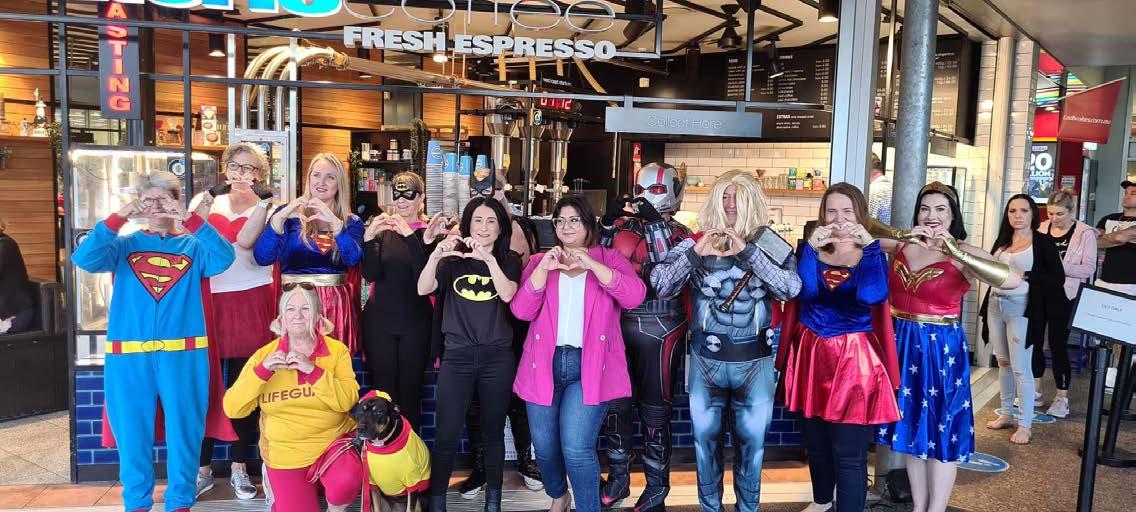
community. Students are supported through the school’s beliefs of being respectful, kind, accepting, brave, creative, and patient,” Dean says.
During Autism Awareness Month in April, Merlo Coffee staff across all stores get involved by dressing up for Superheroes for Sycamore School Day, shining a light on the important work
disasters. In 2022, it helped raise funds for families in Queensland impacted by floods and fires.
“We set up coffee stations during the clean-up of Brisbane’s streets, handing out free coffee to the volunteers who united to help those in need. We also quickly crafted a dedicated Flood Recovery Blend, the proceeds of which helped raise over
amplify our ongoing commitment to diversity, equality, and inclusion through actively supporting the advancement of women,” Dean says.
At a state level, Merlo Coffee is also in discussions regarding a potential partnership with Surf Life Saving Queensland.
“As a Queensland-based organisation,
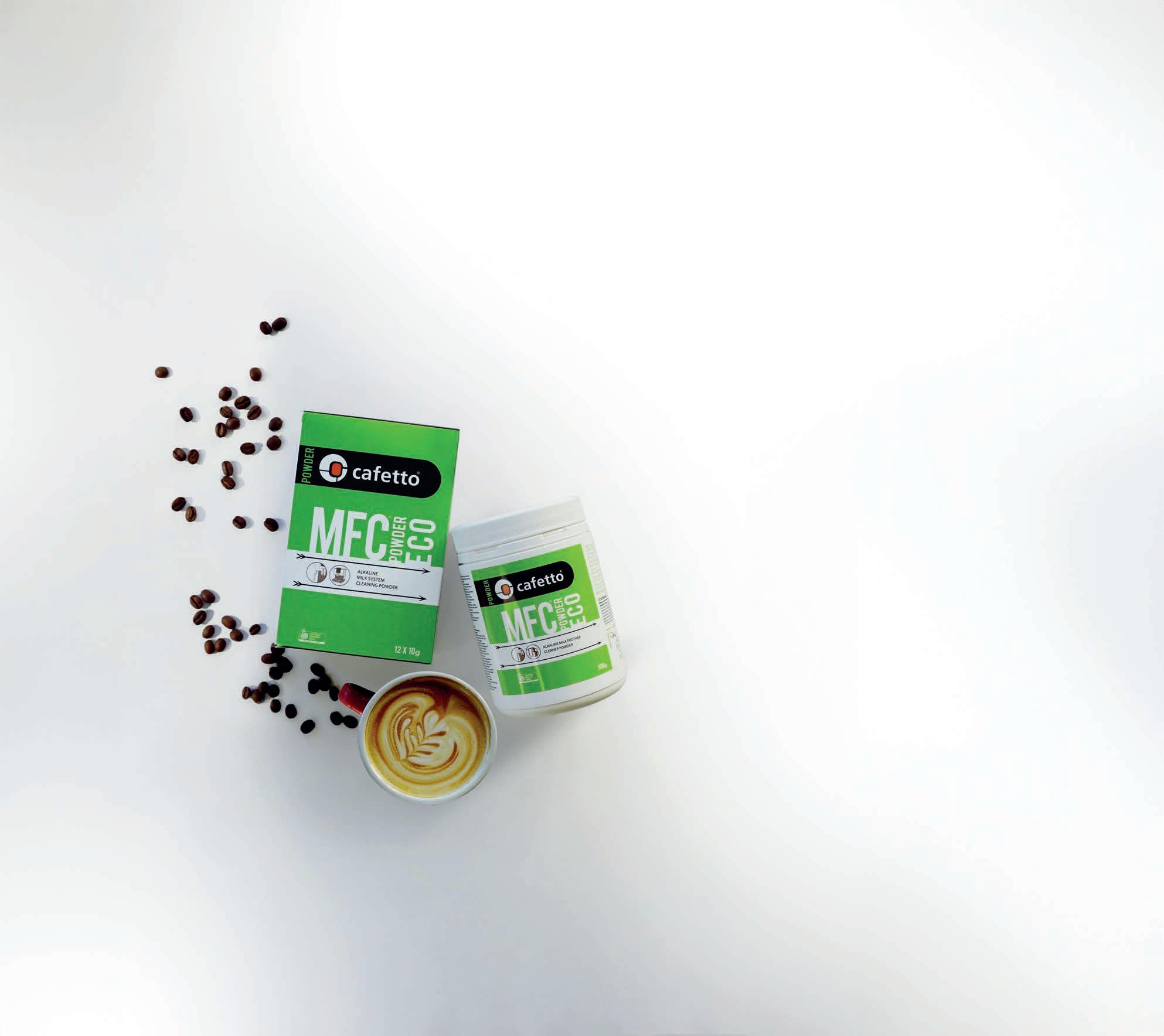

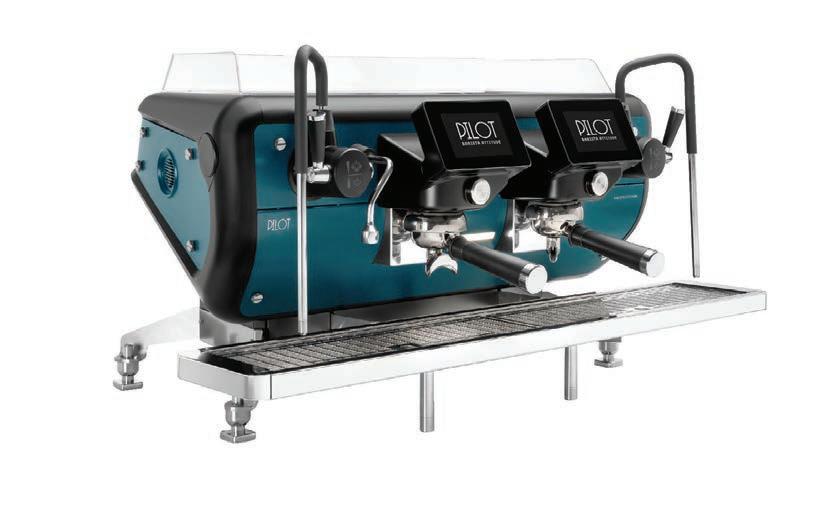

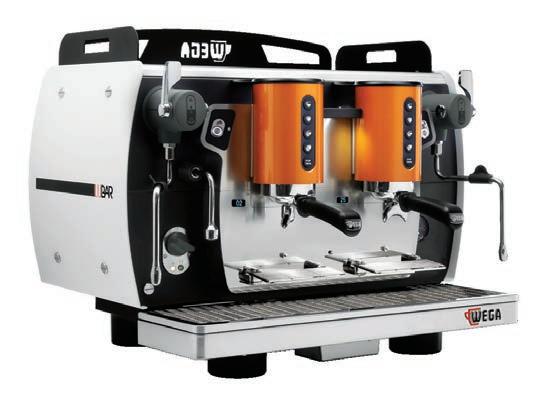


Take a seat and let Barista Attitude’s Pilot take you on a journey. Captained with a single boiler, this espresso machine will take flight and deliver high quality coffee in a breeze.
Paired for perfect milk texturing consistency, the dry steam system eliminates steam condensation for perfect milk foam consistency, whilst pressure stabilisation optimises pressure across the group. Let’s take flight, together.
Elegance advances with all new WBar Pro from Wega. Forged for the Barista, its comprehensive, intelligent design is styled with optimum user functionality in mind.
With raised groups, barista lights and electronic shot timers, the WBar Pro provides complete control for the coffee connoisseur. Paired with an optional auto steamer at the touch of a button, the WBar Pro is unapologetically aesthetic.
Barista Group introduces the DiFluid Omix Green Bean Analyser, a new device that aims to standardise quality in coffee production.
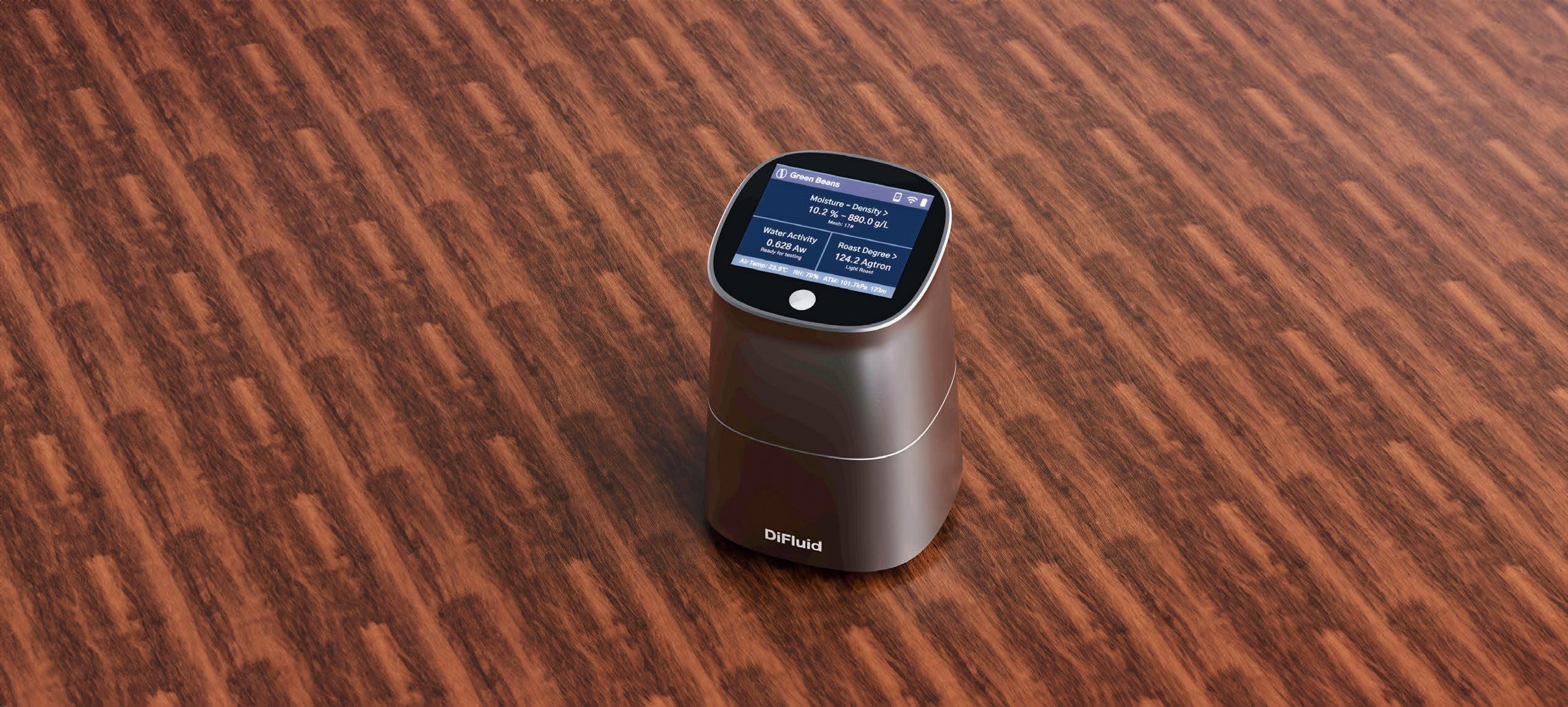
“gamechanging
that enhance the operation and workflow of a café.
DiFluid’s latest offering, the Omix Green Bean Analyser, provides producers with detailed data support and precise control methods, helping to improve coffee quality and production efficiency.
“This includes coffee bean growers, processing plants, and roasting companies that need to monitor the quality and characteristics of the beans to ensure stability during the production process,” he says.
“Producers can predict bean size to provide a reference for rating and choose suitable coffee beans for processing and roasting.”
Joe says the Omix Green Bean Analyser is also ideal for coffee roasters that need accurate data to evaluate coffee bean characteristics and develop roasting and blending strategies accordingly.
“Coffee traders can also use the product to understand the quality of beans to make purchasing and sales decisions. Coffee research institutions can use it for scientific research, quality assessment and new product development,” he says.
“This product is applicable to the entire coffee industry, providing key data support and technical solutions for each stage [of the value chain] — from planting to consumption.”
Joe says the device is made from sustainable materials that have a minimal environmental impact throughout their entire life cycle, including procurement, production, use, and disposal.
“DiFluid minimises waste during the manufacturing process, and materials are reused and recycled where possible. The machine’s components can be disassembled easily and recycled to reduce disposal costs at the end of its life,” he says.
“The equipment is designed with long-term use and durability in mind. A modular design principle was adopted to facilitate the repair, upgrade, and replacement of components and reduce unnecessary scrapping.”
Joe says this product solves many challenges, such as monitoring and controlling coffee quality and characteristics, and providing users with a comprehensive and convenient solution.
“I believe this product will have a positive impact on the coffee industry. By improving the standardisation and quality of coffee production, it helps to enhance the reputation and competitiveness of the entire industry,” he says.
The Omix Green Bean Analyser measures bean moisture, Agtron (a spectrophotometer which uses infrared light to determine roast degree), density, and water activity.
“It uses optical, electromagnetic, and sensor technologies to provide efficient and accurate results to meet the user’s precise coffee bean requirements,” Joe says.
“This product represents a technological breakthrough in the field of coffee production, opening up new possibilities in the industry.”
The device analyses moisture by using the capacitive method (the use of a sensor to detect solid or liquid targets without physical contact) combined with an AI algorithm to identify change in the capacitive medium. It automatically identifies sample types, establishing moisture content models of green beans, roasted beans, dried coffee fruits, and shelled fruits.
“By measuring the moisture content, it helps producers control the liquid in the beans and ensure the preservation and roasting quality of the coffee,” Joe says.
The Omix Green Bean Analyser deciphers density by combining the weight/ volume measurement and AI algorithm to automatically calculate the gap rate of the sample and obtain the true density value.
“It uses image recognition to analyse
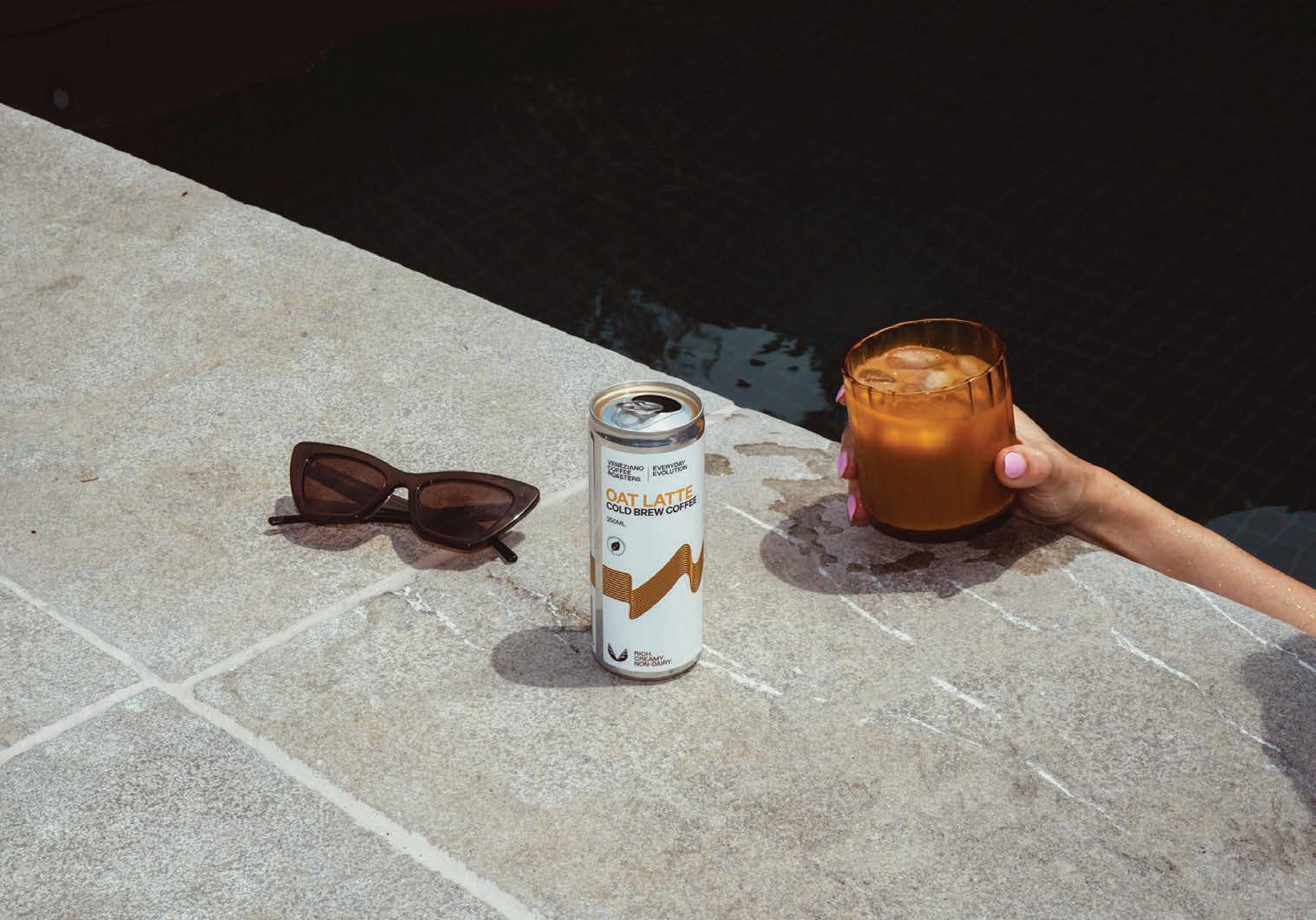
coffee bean gaps and compensate for the true volume of the sample for accurate measurements,” Joe says. “This helps producers select high-quality beans and improve stability, and taste during the roasting process.”
Joe says the device can capture Agtron values using near-infrared imaging technology and other multi-band data fusion, while also automatically identifying silver skin and background noise.
“Using Agtron values to measure the roasting degree of coffee helps roasters control the roasting process and ensure the consistency and stability of coffee quality,” he says.
It measures water activity by using the cooling mirror method, minimal module design, and accurate and rapid detection to obtain stable results within tens of seconds.
“The device helps the user understand the proportion of water used by microorganisms in coffee beans, thereby effectively preventing the microorganisms from affecting the quality,” says Joe.
It can predict sample size through the AI algorithm, output colour, defects, and other feature information according to customer needs.
“You can also use the environmental

humidity, air pressure, and altitude,” says Joe.
The data can be stored in the DiFluid Café App and shared with global users through online data transmission. The application and its functions are developed continuously and updated in line with market demand.
Joe adds the product is innovative and practical and can provide users with accurate data support to help better control the coffee production process.
“I’m excited about launching this product because it represents advancement in the industry and promises to bring real value and benefits to users, while also providing opportunities for growth and development for the company,” he says.
The Omix Green Bean Analyser will be available from Barista Group in June 2024.
“We will have it on display at our stand at the Melbourne International Coffee Expo, along with our portfolio of products — plus a little surprise,” Joe says.
“We also have another game-changing product coming to Australia in August 2024. Keep your eyes peeled.”
With a growing list of DiFluid products in its portfolio, including the DiFluid Omni advanced roast and particle-size analyser,
5 29/2/2024 4:07 pm
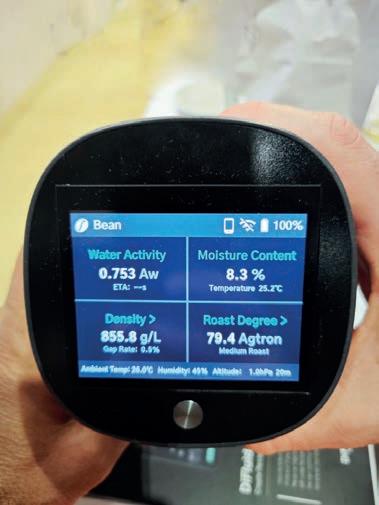
Group is eager to grow the partnership and offer more products that can assist the café industry.
“We take great pride in our identity as innovators and leaders in our industry. Our core mission is to continually push the boundaries of what is possible, striving to distribute new and exciting products that streamline workflow and optimise labour to meet the evolving needs of our customers and the market,” Joe says.
For more information, visit
 The device measures water activity, moisture content, density, and roast degree.
VENEZIANO COFFEE ROASTERS Veneziano-BeanScene_April24_OT
The device measures water activity, moisture content, density, and roast degree.
VENEZIANO COFFEE ROASTERS Veneziano-BeanScene_April24_OT
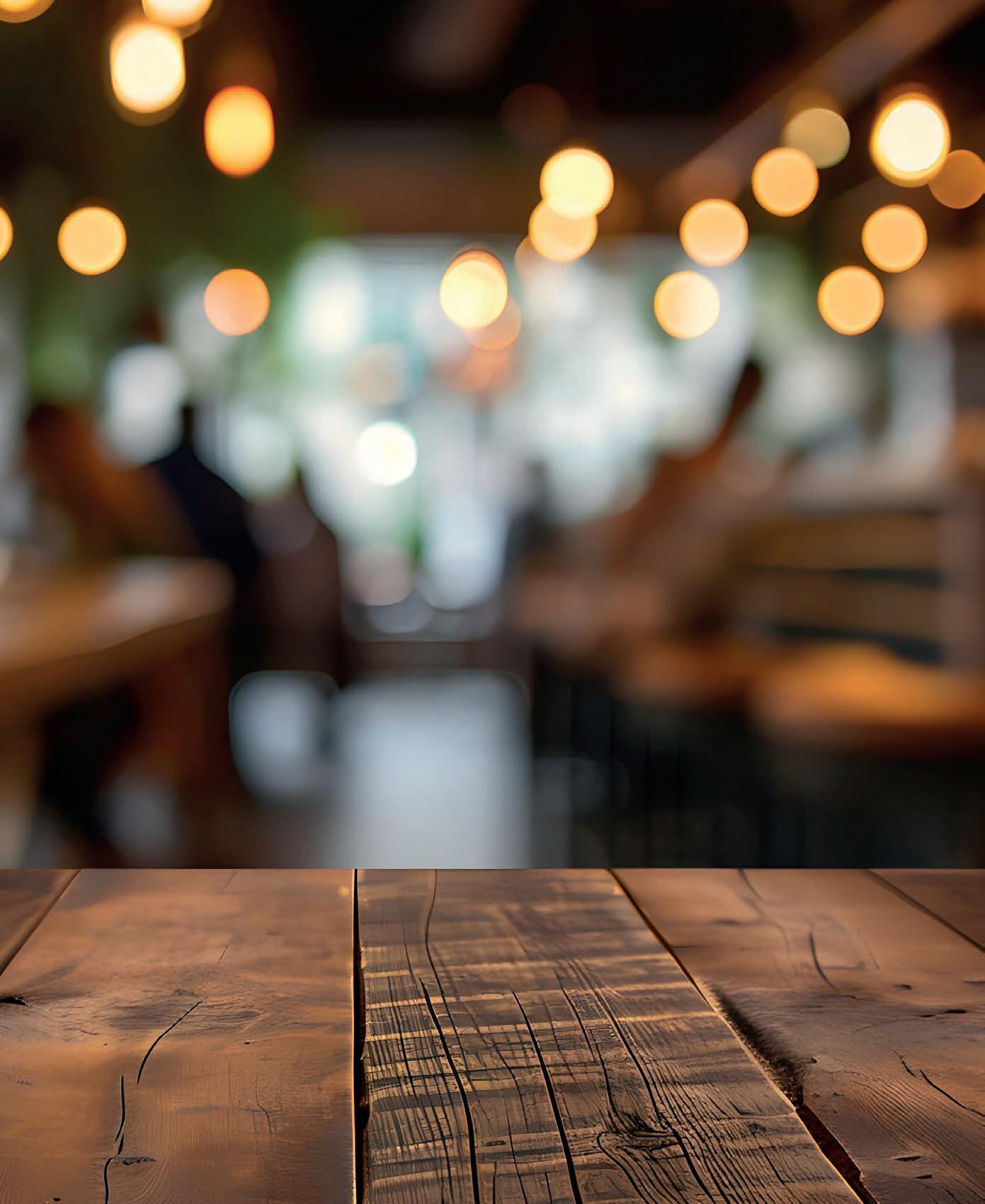
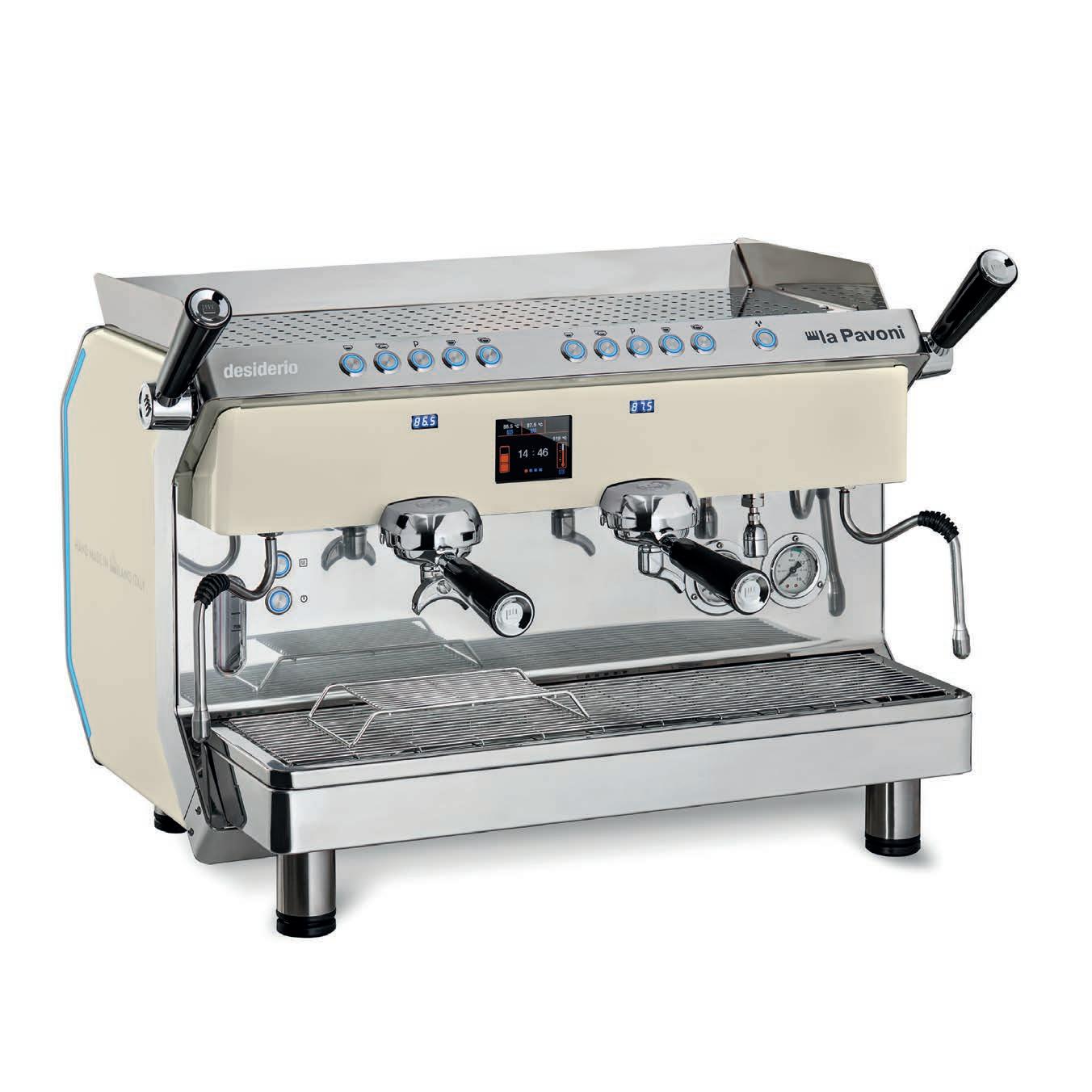
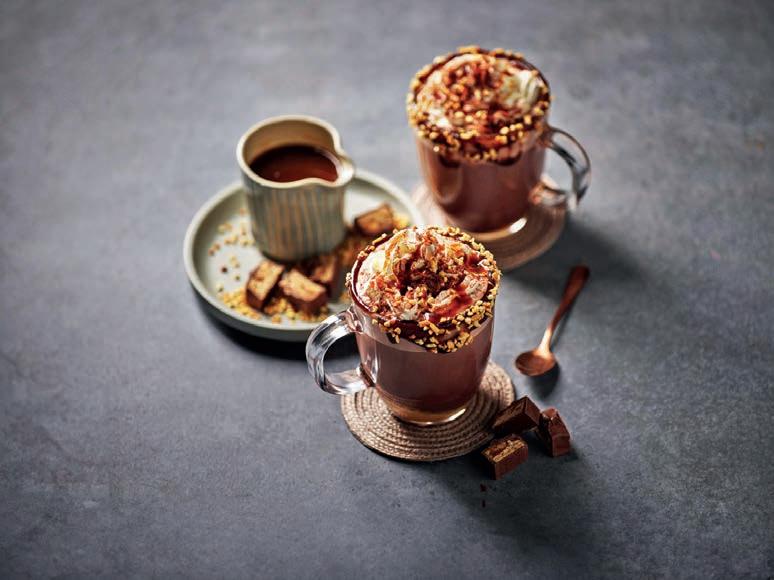


With winter approaching, Arkadia has uncovered the trends and crafted 10 new recipes they believe will be the signature drinks of the season.
ifferentiation in the café space isn’t always easy.
Each business needs something to set it apart from its competitors, and this distinction is often found in the menu.
Flavour specialist Arkadia is a familyowned Australian business with more than 25 years’ experience supporting the café industry with its coffee-alternative beverages. It continuously develops its growing suite of recipes, which showcases a collection of food and drink options for cafés looking to add something new to their menus.
Owned and operated by Maltra Foods, Arkadia is constantly looking at innovations around the globe to ensure it is at the forefront of trends.
“Sharing what you’re eating and drinking on social media is huge these days, and one way cafés can ensure visitors are posting and talking about them is by introducing a wow-factor signature drink,” says Maltra Foods Marketing Manager Ramona Culda. “For cafés struggling to find that signature recipe, we are here to help and inspire them.”
Arkadia’s new website and Winter Warmers recipe booklet features dozens of drinks creations that incorporate its powder and liquid beverage products.
The 10 latest recipes were published in
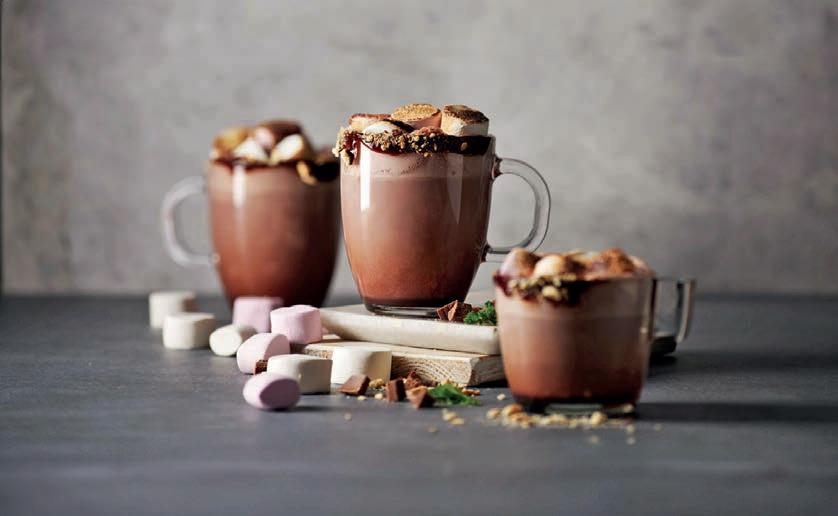
Hot Chocolate.
“Consumers tend to crave comforting drinks during winter, especially in areas like Sydney, Tasmania, and Melbourne where it gets a bit colder,” says Ramona.
The recipe creation process begins with research into fresh trends from around the world. Ramona says the continued rise of plant-based milks was a major consideration for the winter range, with each new recipe constructed to allow for an easy substitution of any dairy products.
A continued focus on nostalgia and tapping into childhood memories in the food and beverage space was another theme highlighted by the Arkadia team. As a result, recipes such as the Peanut Butter Hot Chocolate were constructed to replicate the taste of classic chocolate bars.

“It’s all about customisation and creating new recipes that enable cafés to stand out from the crowd,” says Ramona. “You need to be up to date on these trends because they are often what customers are
“Once we pick a theme, we brief the research and development team who then begin to look at how to create these recipes using our products. Most of our team have a barista background and use their experience to develop unique drinks options
Arkadia Brand Manager Kylie Chan adds that the core concept of the recipe booklet is to showcase the versatility of
“Café owners are busy, which is why we do our part in translating trends into recipes, so they can focus on running their business,” she says. “At the same time, our recipes are a springboard for creation that cafés can use to try new things.”
Kylie says the café owners need to understand what kind of drink best fits the café’s identity.
“The first thing we think about when engineering new recipes is educating cafés,” she says. “We encourage them to pick products, recipes, and flavours that best suit their area and profile.”
Arkadia’s Black Forest Hot Chocolate, according to Kylie, is the ideal menu option for a more high-end café with a younger social-media-savvy crowd looking to post eye-catching content, while more familiar flavours, such as the Orange Jaffa Hot Chocolate, complement venues with a homely feel.
Kylie adds that, regardless of your preferred winter drink recipe, every café can benefit from adding something unique to their menu rather than sticking to the basics.
“You can do so much more with a standard hot chocolate or a chai,” she says.
“Experimentation is part of the process, and we love seeing what people can come up with on their own.”
For more information, visit arkadiabeverages.com.au
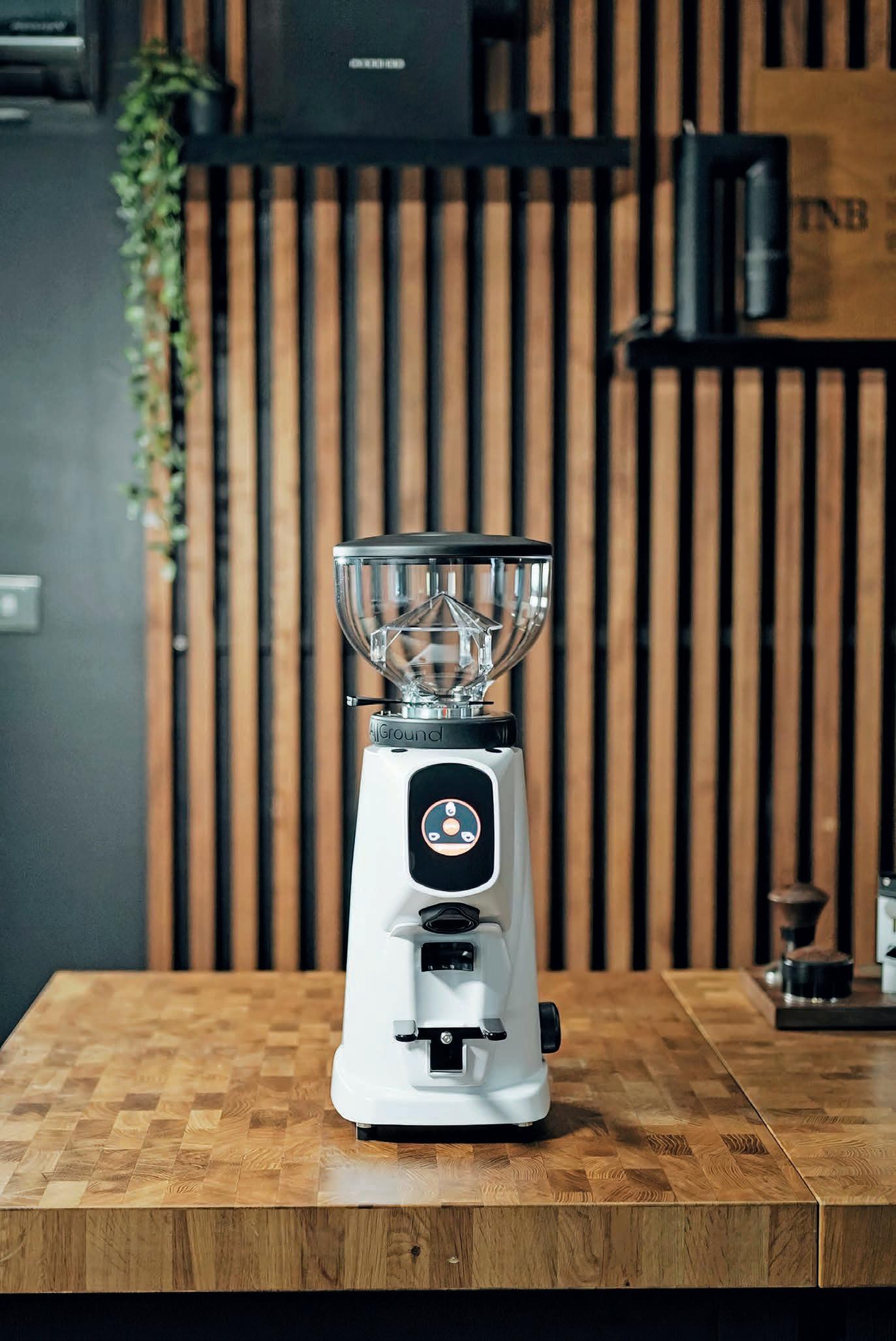
Coffee Machine Technologies spotlights the Fiorenzato AllGround Sense, and how the product’s grind-by-weight technology streamlines workflow and increases the precision of the dose.
hen grinder manufacturer Fiorenzato launched the AllGround coffee grinder in 2021, it was its first high-performance grinder for the domestic channel, and served as a starting point for Fiorenzato’s Home Line. When the brand introduced the AllGround Sense integrated scale grinder in late 2023, it was designed to improve of the original and excel in any environment.
According to Australian distributor Coffee Machine Technologies, AllGround Sense embodies the essence of the
Fiorenzato Home line and brings the experience of the professional world into the home market.
“The AllGround Sense stands as a high-performance grinder, catering to both home enthusiasts and the specialty coffee community. This versatile product guarantees maximum yield and accentuates the coffee’s aromatic nuances, all thanks to its instant grinding capabilities and a tailored display,” says Coffee Machine Technologies Assistant General Manager Gianluca Colangeli.
Gianluca says the AllGround Sense is tailored to the needs of coffee enthusiasts
as well as micro roasters, specialised coffee shops, and baristas with a taste for premium equipment.
“The grinder features a weighing technology built into the fork to ensure the portafilter receives the precise amount of ground coffee every time. A dedicated touchscreen display also lets users select the exact grind dose for brewing, ensuring precision with every cup,” he says.
The AllGround Sense’s sister product, the AllGround Probrew grinder, is designed to minimise retention and waste thanks to its zero-retention bellow which replaces the traditional hopper. Both the AllGround
Images: Coffee Machine Technologies.

Probrew and AllGround Sense come with a metal grind cup and Dark-T burrs specifically designed to produce the ideal grind size for filter brewing.
“The new Dark-T burrs are an evolution of Fiorenzato’s M340 burrs, created to further enhance grinding performance. AllGround burrs have a 64-millimetre diameter which guarantees a larger grinding surface, avoiding damage to the coffee beans. The black coating in titanium, aluminium, carbon, and nitrogen promises a durability five times longer than standard burrs,” says Gianluca.
“Grinding the beans on the spot enhances the aromatic notes of the coffee. With AllGround Sense we have the opportunity to meet everyone’s tastes with its three modes: Espresso, Moka, and Filter.”
The user can simply rotate the ring nut that guides them between the different granulometries to create their ideal cup of coffee. At the end of the stroke, the easy-open button is activated, which allows users to open and quickly clean the grinding chamber.
“For Espresso mode, Fiorenzato’s efforts were concentrated on the creation of a burr geometry so that the bimodal granulometry curve showed a low peak of “fines” – which led to increase the perception of bitterness –and a more pronounced curve of “boulders” – which convey the sweetness and aromatic part,” Gianluca says.
“For Filter mode, the burrs showed a very low level of fines in favour of greater homogeneity in the peak of boulders, ensuring the end user to be able to extract a great balance from the drink prepared with filter methods.”
In Moka mode, the curve shows peaks similar to Espresso ones but with levels of fines between Filter and Espresso. This conveys grater body and aromas into the cup, typical characteristics of the drink prepared with a pot.
“Thanks to the geometry and the inclinations specifically designed by the research and development team for AllGround, each type of grinding expresses the maximum performance and aroma,” says Gianluca.
The AllGround Sense grinder is available in a rich range of colours including a new copper and deep black.
“We’ve noticed a massive increase in sales since the product was released, thanks to a push on social media, and I think the specialty coffee market, especially home users, is after precision in grinding. The AllGround Sense has an accuracy of 0.2-grams, which allows home users to get their ideal cup of coffee,” Gianluca says.
Despite a wealth of intuitive features, Gianluca says the Fiorenzato grinder is still an affordable product.
“The original AllGround is priced
at $1500. For only $100 more, you can purchase the upgraded version, so it’s really a no-brainer for those looking for a quality grinder,” he says.
“You definitely get a lot of bang for your buck. When we start to explain the advantages of having a Fiorenzato grinder, our café customers gravitate towards it, and find it hard to go back to another brand.”
Founder John Colangeli introduced grinder manufacturer Fiorenzato to the Australian market in 2014, he saw the potential in the brand to innovate and make waves in the specialty coffee industry.
“We recognised the quality of its grinders but also suggested areas for improvement. The team valued our feedback and made substantial enhancements, from electrical functions to design. To this day, they send us their products for assessment before market release,” says Gianluca.
Gianluca says a drive towards innovation has allowed Fiorenzato to manufacture state-of-the-art products and solutions for coffee grinding. He says this all-round guarantee is the outcome of decades of experience and a longstanding partnership
with Coffee Machine Technologies that has facilitated ongoing research into technologies and aesthetic appeal.
“A Fiorenzato product offers highquality coffee even under extreme operating conditions when consumption is high,” says Gianluca.
“In addition to constant monitoring of grinding, and reliable performance, which are factors that have strengthened the trademark on an international scale, their products have an elegant design that makes them stand out. This important feature, combined with low operating noise, makes Fiorenzato coffee grinders valuable tools for all professionals in the coffee sector.”
Gianluca says Fiorenzato has been able to design increasingly advanced and efficient grinders with “exceptional performance and ease of use”.
“Each grinder is able to ensure precision and consistency, reduce energy consumption, and offer exceptional reliability even when used over a long period of time,” he says.
For more information, visit coffeemachinetechnologies.com.au
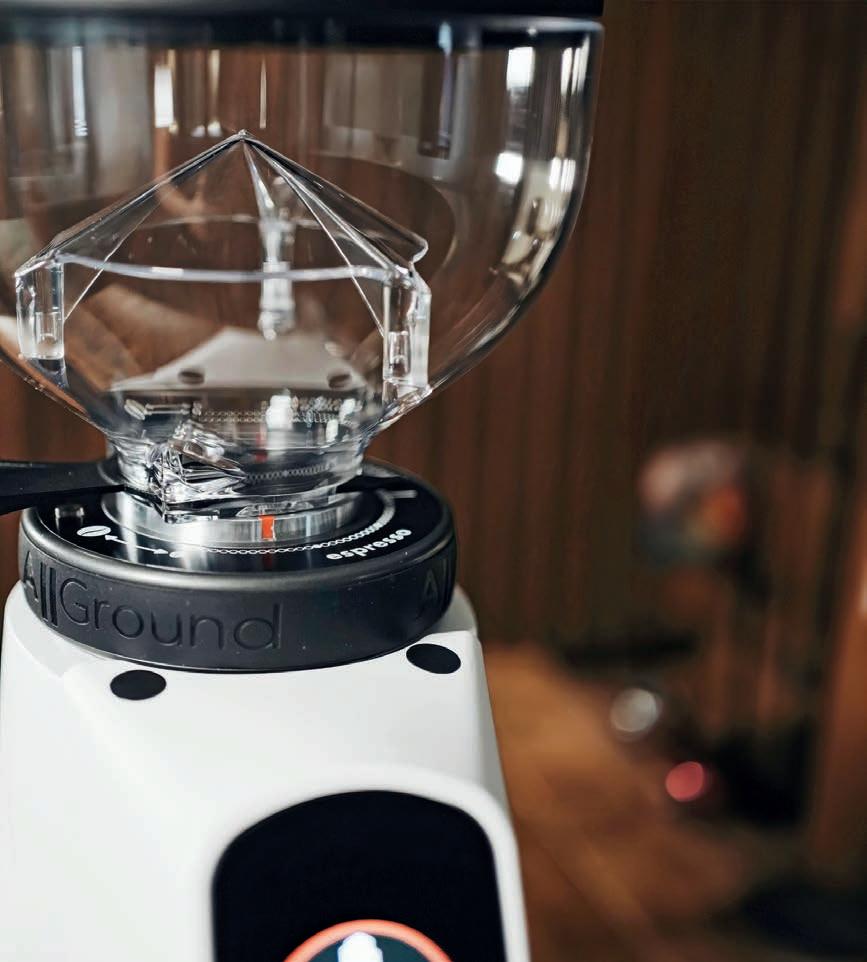
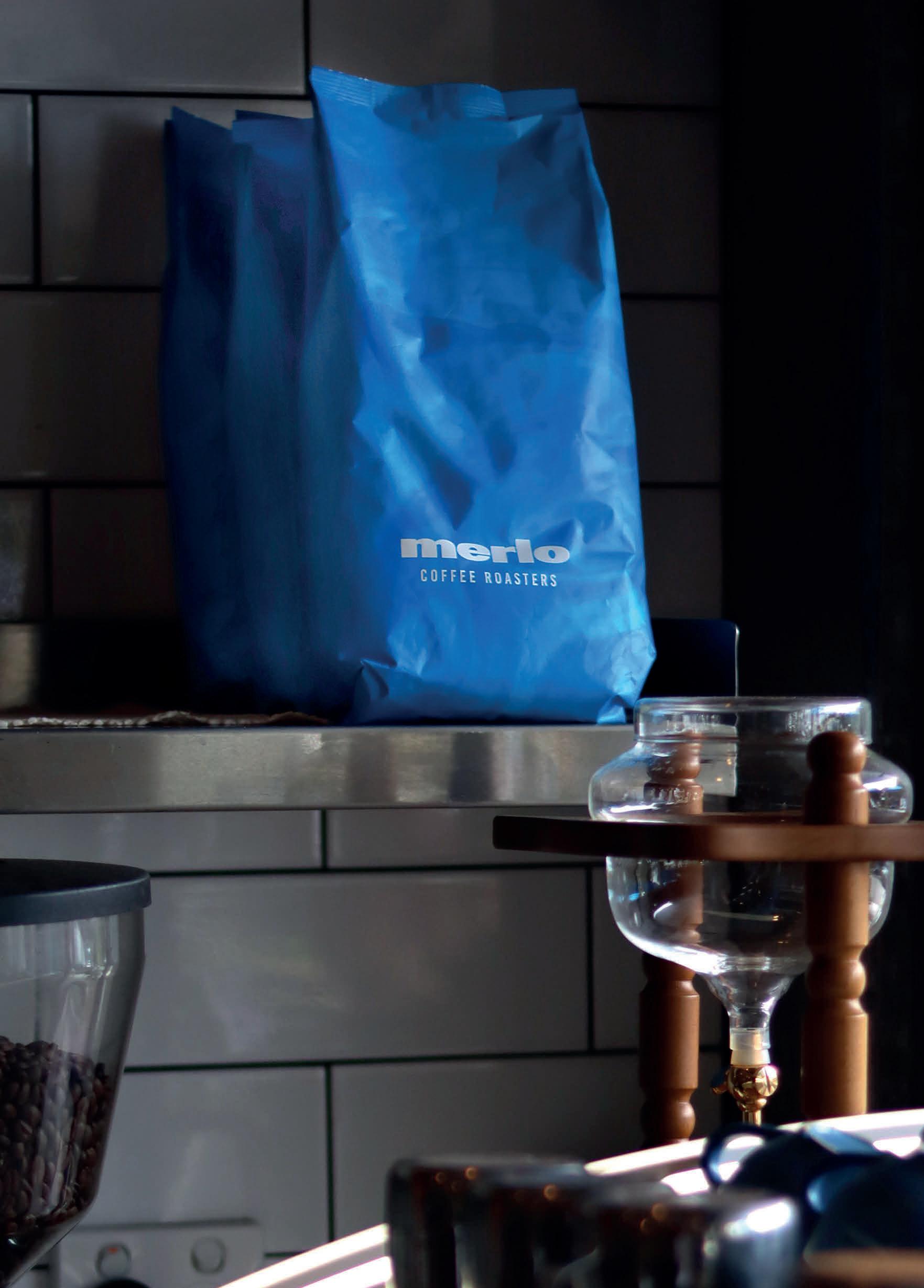
Roasted to perfection, packed full of flavour, and now delivered to our café partners in a fresh new look.
Enquire today about how we can help inspire your tomorrow with the best training, equipment, and freshly roasted specialty coffee.

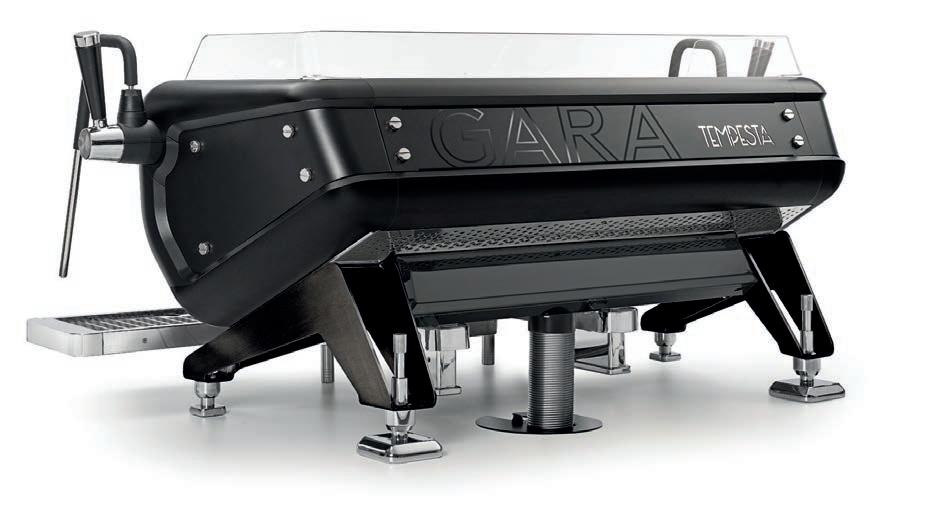
f you’re an avid follower of the World Barista Championship (WBC), you will have seen the Tempesta Gara from Barista Attitude taking centre stage at the annual event in 2022 and 2023.
The Italian coffee machine manufacturer is the official WBC Qualified Espresso Machine sponsor until 2025, with this year’s event taking place in Busan from 1 to 4 May. It will be Asia’s first World of Coffee (WOC) expo and the first time Barista Attitude has exhibited its machines in South Korea.
“Busan is a small market, but it has a big impact in Asia, which is why we are looking forward to learning more about it this year,” says Barista Attitude Group Marketing Director Jacopo Bambini. “The specialty coffee market in Asia is very important, especially in South Korea.”
The competition will start with the Barista Attitude team getting accustomed to the Tempesta Gara in a pre-practice session.
“We’re aiming to ensure all participants are well-prepared and accustomed to the competition environment, which will enhance the overall experience for everyone involved,” says Jacopo.
Jacopo believes the power in partnering with barista competitions goes far beyond brand recognition.
“We like to take the opportunity to learn from the competitors and understand what they are looking for in a machine,” he says.
“At all times, our main target is the quality of the coffee in the cup. We want baristas to be assured our machines help achieve consistently great espresso and milk-based drinks.”
The Italian company looks to constantly improve its machines to give baristas the ultimate coffee-making experience, which Jacopo describes as a marriage between precision, passion, and innovation.
“It’s about delivering consistently exceptional flavours while embracing the artistry and craftsmanship of those who prepare it,” he says.
On the back of competitor feedback that the portafilter handle was too heavy, the Barista Attitude team remodelled the handle to be lighter and improve the weight distribution, as well as installing new portafilters.
“We knew we could make it even better,” Jacopo says. “Lighter, shorter, and more ergonomic, these portafilters reflect the result of feedback and collaborations with baristas and our brand ambassadors. We believe they will elevate the user experience and help competitors during the competition.”
It’s adjustments like this that make competitors feel like they’ve been listened to, and have helped Barista Attitude build strong relationships within the barista community.
“We are challenged every day to listen to feedback and improve our machines because, at the end of the day, our job is all about making the lives of baristas easier,” says Jacopo.
As is tradition, the Tempesta Gara will undergo an aesthetic makeover for the competition. Barista Attitude aim to encapsulate the host city with each annual WBC design.
“The new visual concept for our
machine has been meticulously designed to harmonise with the event’s themes,” says Jacopo.
“This process involves crossdepartmental collaboration within our company, while engaging with other equipment providers.”
The WBC is just one event in Barista Attitude’s busy 2024 schedule, which started in January with the WOC expo in Dubai.
“Dubai was a valuable opportunity for us because the Middle East is increasingly becoming an important hub for coffee and technology,” says Jacopo.
The Tempesta Gara will also be on display at the Specialty Coffee Expo in Chicago in April, and the European WOC in Copenhagen in June.
“Events give us the opportunity to track trends in the market, such as new recipes and coffee varieties,” Jacopo says. “People come from all around the world for these competitions, and there’s always a community atmosphere when people get together in the name of coffee.”
Each new city and event gives Barista Attitude the platform to make its mark in new coffee markets.
“It’s all part of a journey to promote our equipment and machines while also engaging with the coffee community,” Jacopo says. “We’re looking forward to growing our brand awareness in the specialty coffee sector in 2024.”
For more information, visit barista-attitude.com or Australian distributor Coffee Works Express cwe.com.au
s prizes in the coffee competition world continue to climb, Milklab is upping the ante by hosting not one but three competitions at this year’s Melbourne International Coffee Expo (MICE) – one offering an all-expenses-paid trip to Papua New Guinea, and a $10,000 cash prize.
“We’re building on last year’s success and have created some exciting events to celebrate baristas and coffee roasters in all their glory. We’re ready to shake things up with a whole new Barista Battle online format, our first-ever Roaster Royale competition, and exciting daily Latte Art Workshops led by some of the most talented latte artists in the industry,” says Milklab Brand Manager Melanie Ung.
The 2024 Milklab Barista Battle will enable contestants to showcase their skills and battle-it-out in an online latte art forum hosted on Instagram and TikTok.
The barista with the best pour uploaded to Instagram or TikTok, as decided by Milklab’s expert panel of judges, will represent their state in the finals and continue through to MICE to compete for the national title.
“We had feedback from baristas in previous years who weren’t able to participate due to location challenges, so we shifted the focus online this year to make it more accessible for all baristas no matter where they live. It also means there’s no limit on how many people can enter the competition,” Melanie says.
The state winners will win a trip to MICE to compete in the Milklab Barista
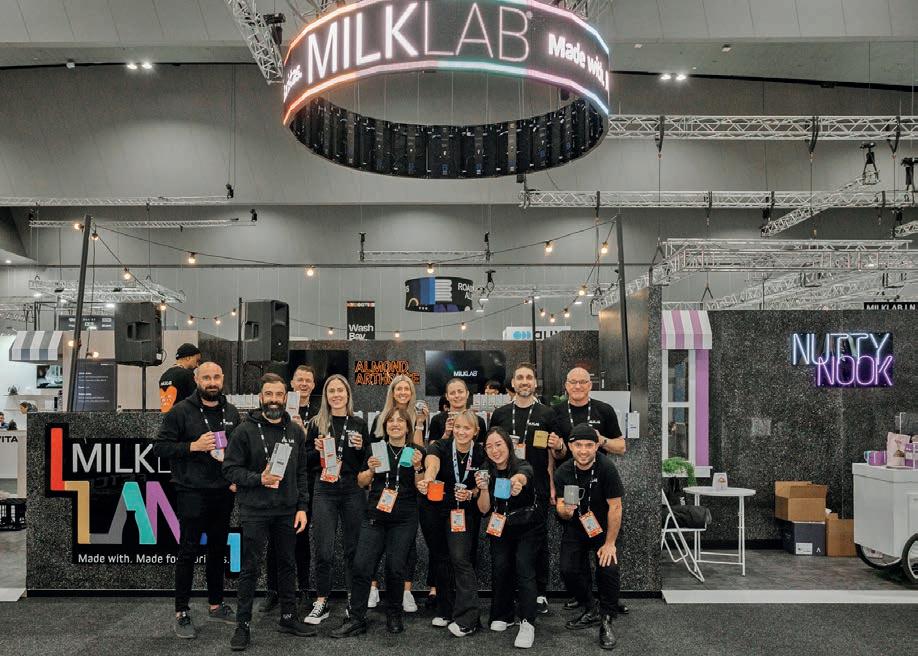
“This year we are mixing it up by injecting some fun into the competition, challenging baristas to share their most entertaining and creative pours where winners will win limited edition Milklab merch packs,” says Melanie.
Barista Battle 2023 Champion Mohammed ‘Rizky’ Ramadani, of café Des Delices and Offshoot Coffee in Western Australia, says winning the competition and becoming a Milklab Brand Ambassador has
community,” he says.
For those looking to compete this year, Rizky says it’s important to stay grounded and be confident in your skills.
“It can be a very competitive battle, so for those who are new, don’t let it get to you. It can be terrifying being watched by other baristas and judges, but remember you’re doing your best,” he says. “It’s important to learn something new and have fun.”
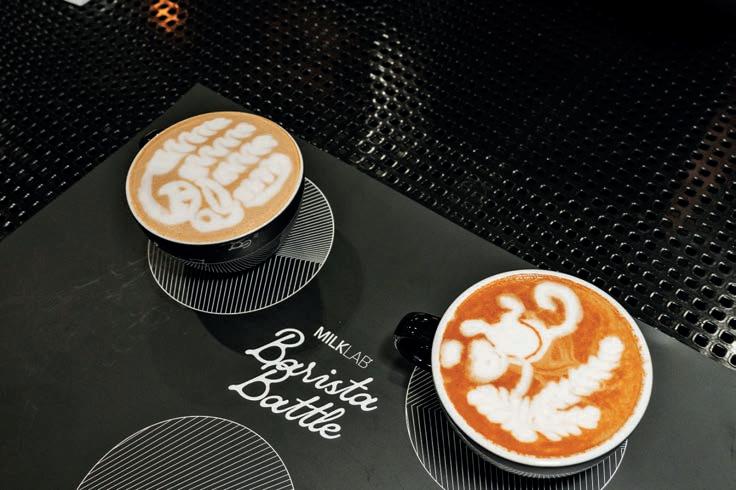
“It’s been such a great experience and has
To satisfy the wholesale coffee community looking to score a trip to origin and some serious cash, Milklab is hosting its first roasting competition, Roaster Royale.
“The brief is simple: create a signature roast that pairs well with Milklab Oat, using beans supplied by our green bean partner InterAmerican Coffee,” says Melanie.
To enter, roasters must register and submit one kilogram of the signature roast by 4 April.
“Milklab judges will blind taste each coffee blend and announce the top five on 12 April. The finalists will be showcased at the Roaster Royale Grand Finals at MICE on 13 May, where the winners will be crowned,” Melanie says.
The roasts will be rated out of 10 in four categories: sweetness, flavour, aftertaste, and balance with Milklab Oat.
“The winner will receive a trip to Papua
New Guinea, $10,000 cash prize, and be invited to become a Milklab roaster partner. Second place will take home $5000, and third place will win $2500,” Melanie says.
“We want to collaborate with roasters and give them a platform to showcase their brand and put their skills to the test as they are a key part of our vibrant coffee community.”
Milklab is also hosting daily Latte Art Workshops for baristas looking to enhance their latte art skills but who don’t want to compete. Each morning of the Expo, Milklab will host an expert barista who will share key latte art tips and tricks as well as a tutorial on how to replicate their signature latte art pattern.
“Once the workshop is complete, we invite baristas to try and replicate the expert’s signature latte art themselves for the chance to win $500,” Melanie says.
Victor Vu, the 2024 ASCA Australian Latte Art Champion, Junnie Phyu of Junnie Coffee Workshop, and Ming Wan, 2024 ASCA Australian Latte Art Championship runner up, will each host the Latte Art Workshop one day of the Expo.
“We love seeing the interaction among the barista community, and not just between us and the baristas. We wanted to offer something different and fun. It’s really rewarding to be able to cultivate a friendly
competition and give baristas a space to learn from and challenge each other.”
The Milklab stand will again be made from saveBOARD, a low-carbon building material made from hard-to-recycle liquid paper board used in long-life cartons.
“saveBOARD focuses on building a circular economy by turning composite packaging waste, such as milk cartons, ingredients bags, coffee cups, and soft plastics, into low-carbon products that reenter the local supply chain,” says Melanie.
“We’re also bringing back the Milklab Lane layout, inspired by Melbourne urban coffee culture and our collaboration with baristas. It resembles hole-in-the-wall cafés and coffee carts, which encourage guests to explore the ‘laneways of Milklab’.”
Melanie says Milklab was built on collaboration, and that it’s important for the brand to continue to highlight its partnerships with baristas so it can continue
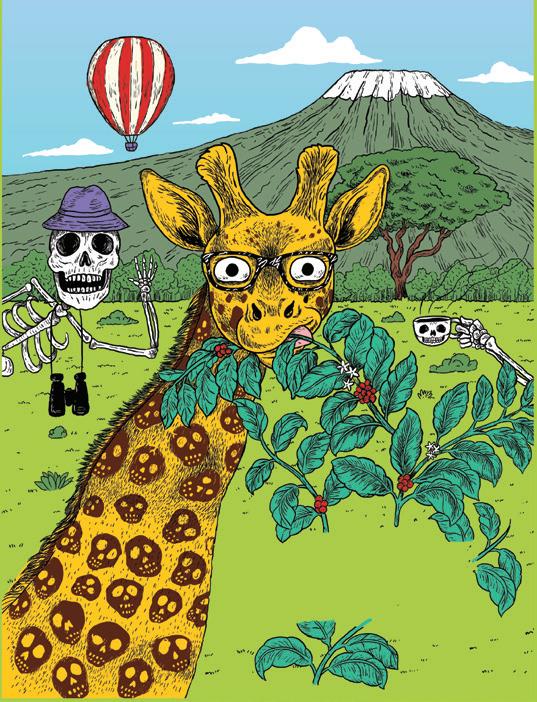
plant-based industry has been phenomenal and there is definitely much more room for growth in this booming sector. We’re really proud of the loyal following we’ve developed, and we’re excited to continue to innovate for
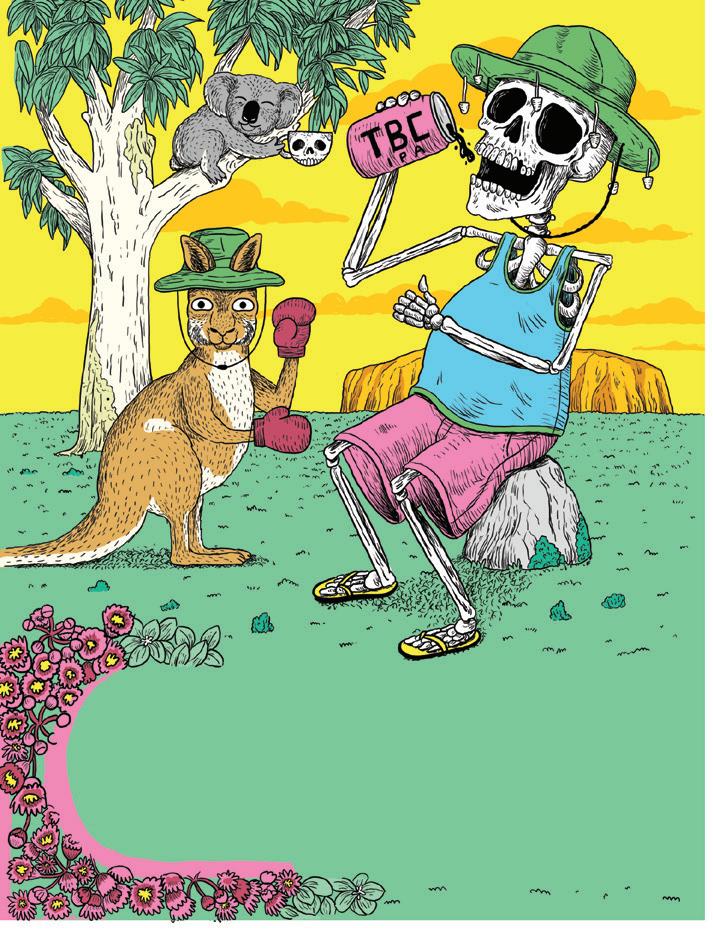
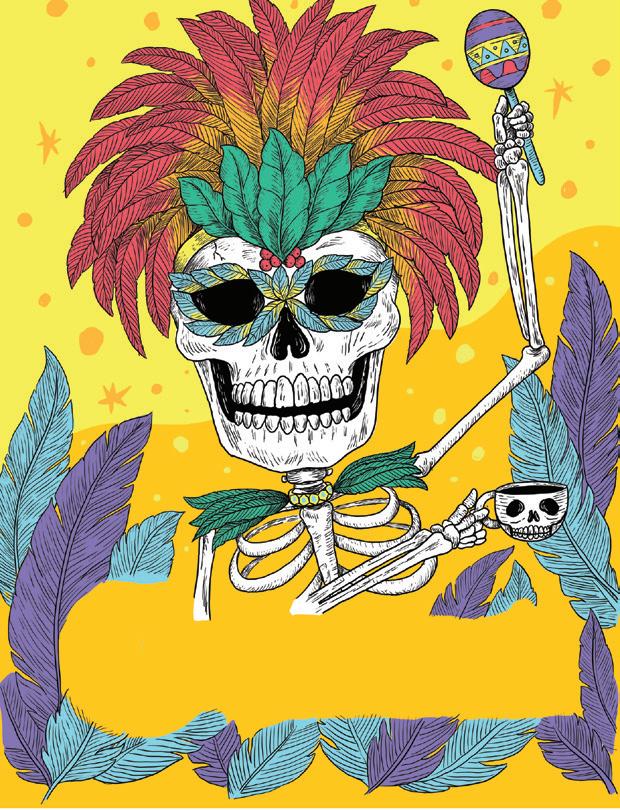
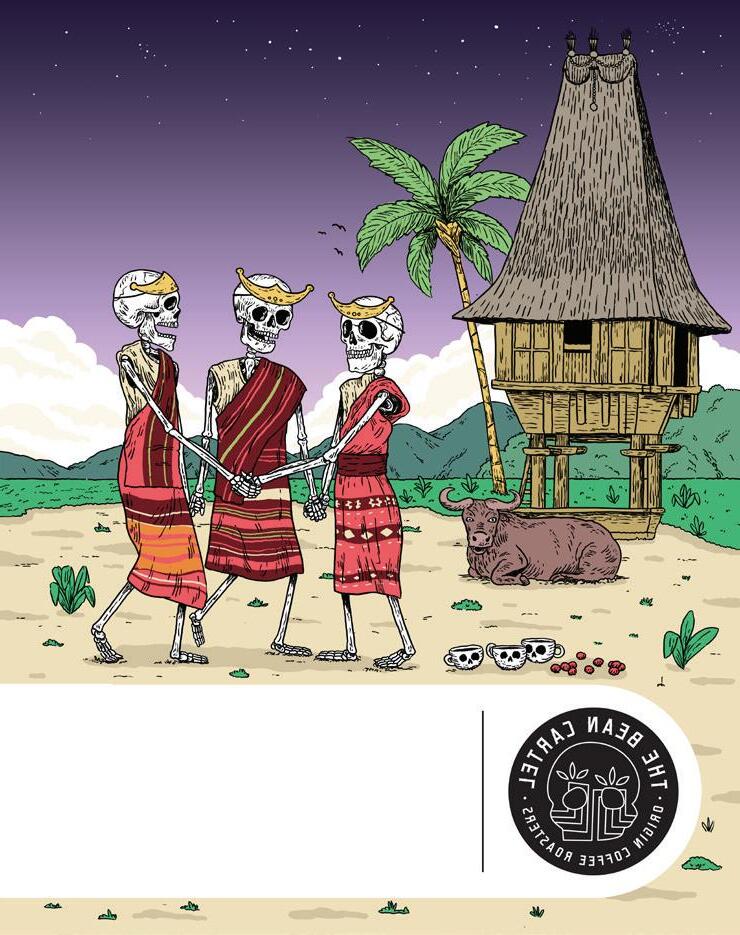
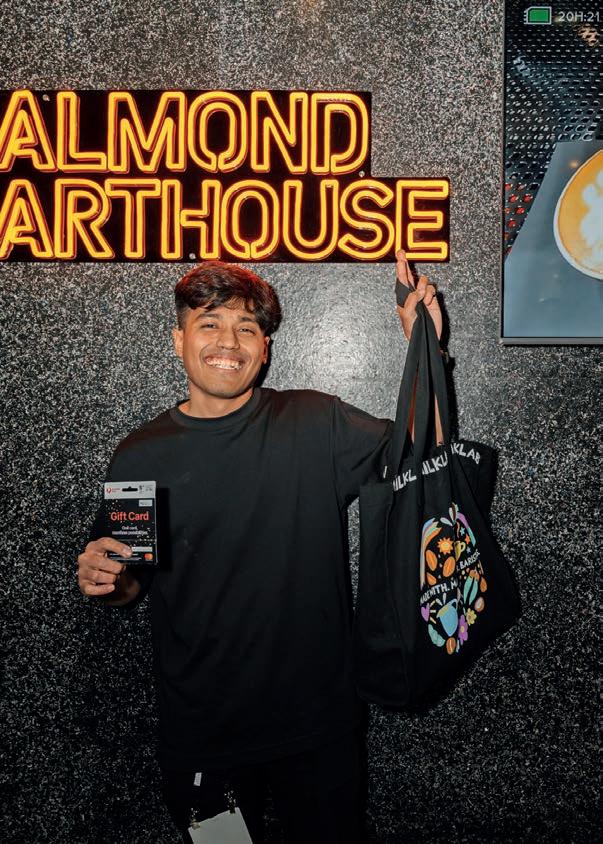




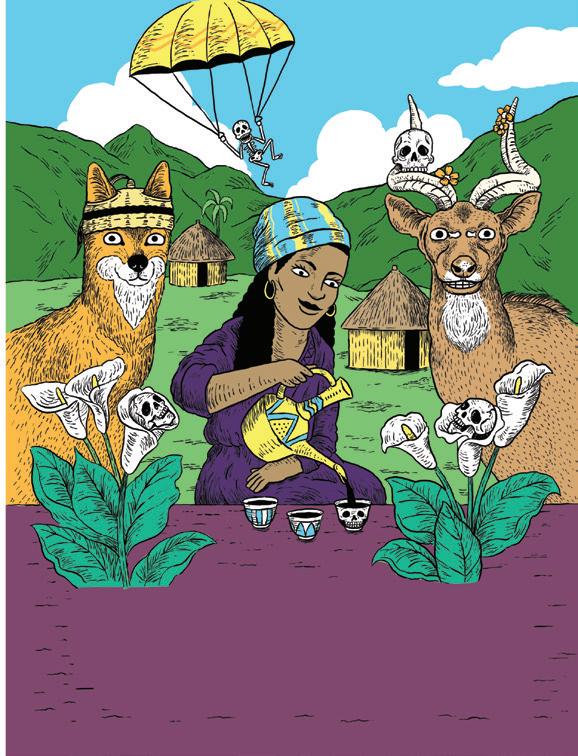


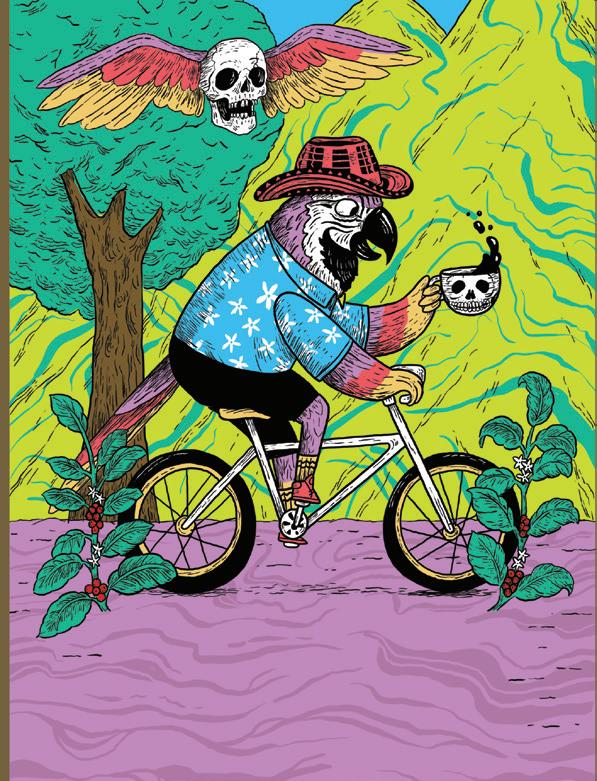

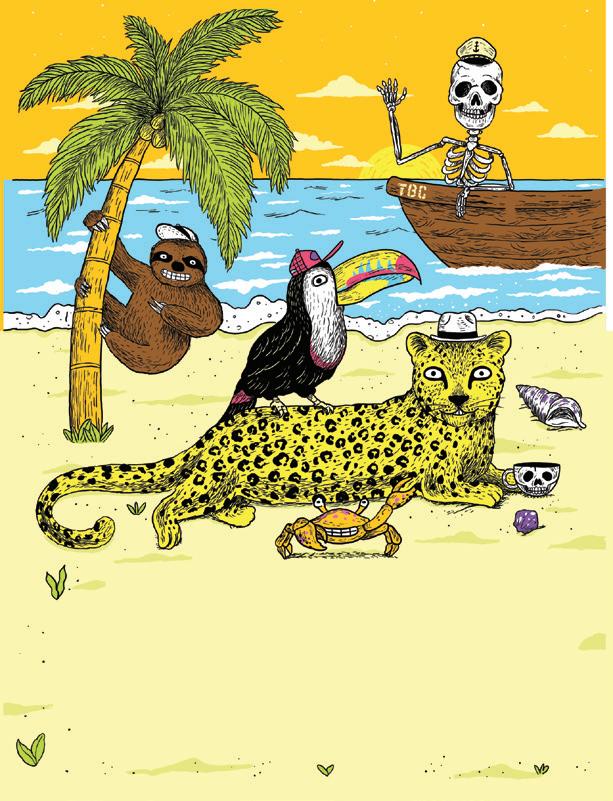
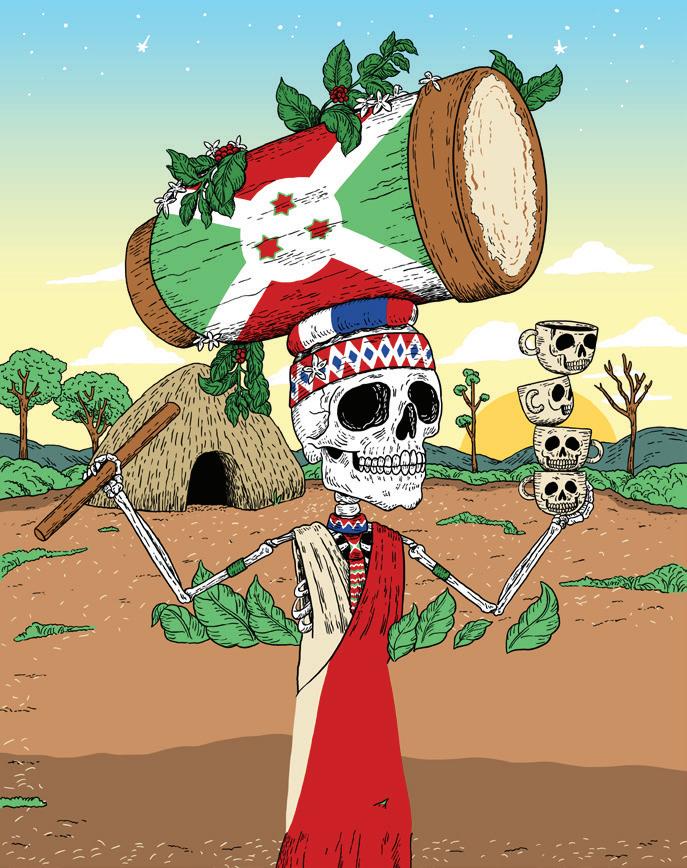
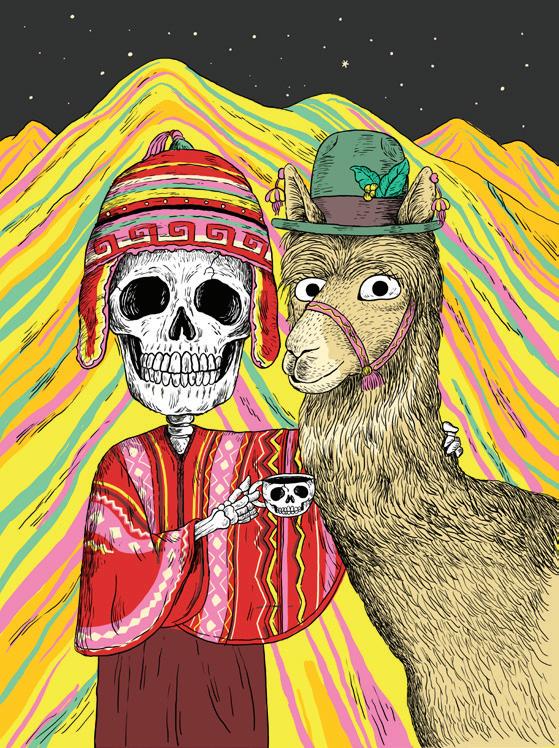
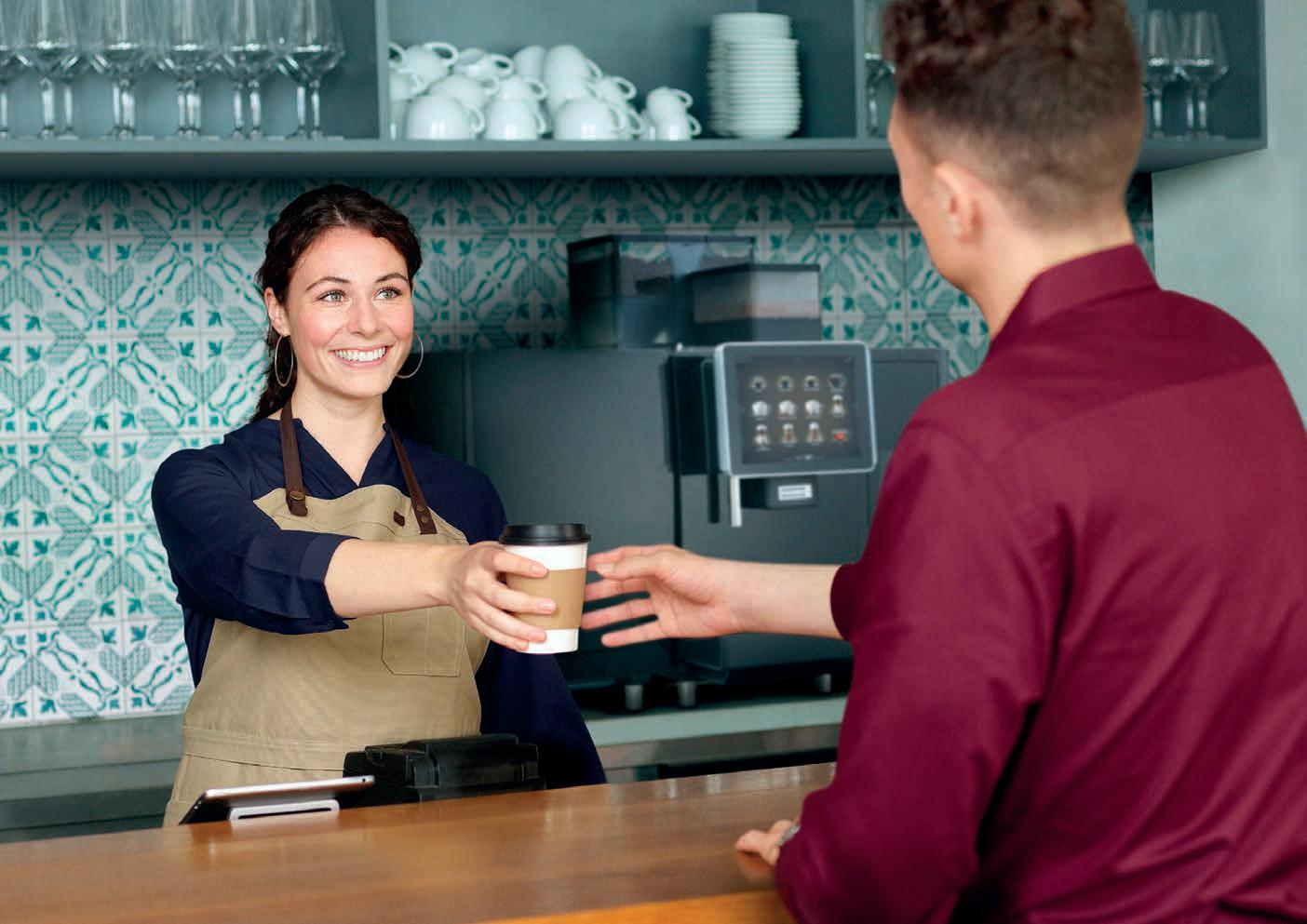
make lives easier, but according to David Downing, Franke Coffee Systems’ Oceania Business Development Director, the Australian café market has not moved to automation as quickly as Europe and North America.
“[Australian baristas] want their customers to walk into their café and see all the different components operating, from the grinders to the extraction to the final pour,” he says. “This usually comes down to the barista wanting more involvement, especially in latte art.”
This is why David believes Franke’s A Line of automatic coffee machines is ideal for cafés looking to make the adjustment to an easier mode of coffee making.
The range consists of seven models:
and SB1200. David believes the larger machines, specifically the A800, A1000, and SB1200, are best suited for cafés with a greater output.
“It’s a range that fits into most, if not all, customer segments, including cafés,” he says.
The collection was first launched in Australia in 2014, but has undergone several changes since.
“We added the SB1200, A1000, and A300 machines, while making new configurations to each of the pre-existing models,” says David.
One such change was the ability for the larger machines to produce iced coffee in line with its growing popularity.
“The machines chill an extracted espresso down to room temperature
while maintaining the notes of the coffee,” David says.
This is made possible through Franke’s unique iQFlow technology, which David describes as one of the more innovative features of the range.
“If you do an extraction out of a normal coffee machine, you’re bringing the coffee into the cup while losing pressure on the extraction, which leads to a loss in the taste profile,” he says. “It’s critical that the profile remains perfect, which is why we developed this technology.”
Through iQFlow, users can personalise any number of flavour profiles, which can help a café achieve a unique sensory experience for the customer. This is accomplished through the personalised settings on each A Line machine.

“It takes the purity of the coffee to the next level,” David says.
A similar degree of care can be seen with the FoamMaster technology in each A line machine, which delivers the milk texture to match the demands of the user.
“We texture and heat the milk through a thermal block in the machine, so it can reach the exact temperature set through the settings,” David says.
The milk texture, as well as other menu changes, can be made through either the touchscreen of each machine, or through Franke’s telemetry system, Franke Digital Services.
“We developed [Franke Digital Services] ourselves, so it matches perfectly with our equipment,” says David. “It allows the user not only to obtain data on demand daily, weekly, or monthly, but it also allows for the monitoring of performance and software.”
This monitoring, according to David, can apply to any number of machines a business might have.
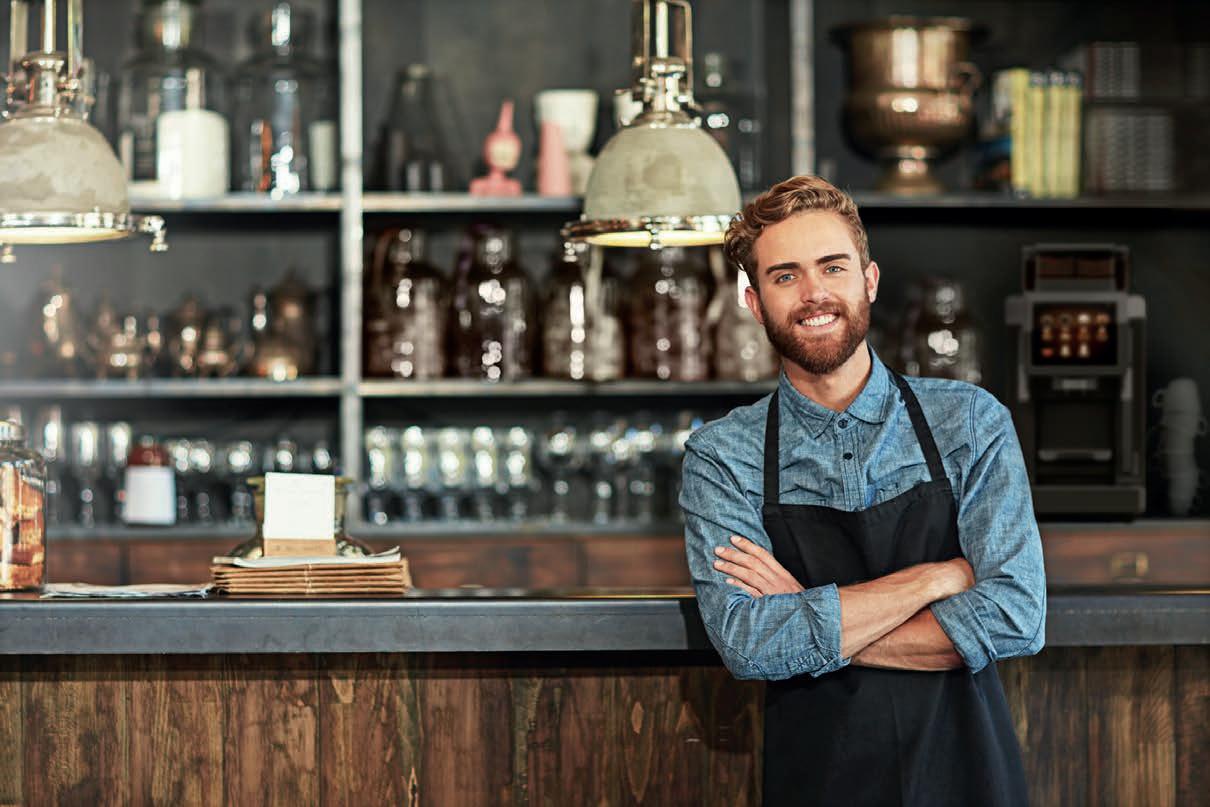
“It’s best if you control things on the telemetry side through a laptop,” he says. “It’s a great system, because you can make one adjustment to a recipe through your device and it can transfer to the entire fleet.”
David says the intuitive screen on each machine can give the user full customisation.
“The menu screen itself is very unique, because we can develop specific menus for each customer,” he says.
The A Line comes with its own range of extensions that can further help a barista, including the Flavour Station, which dispenses a pre-set volume of flavour into a drink. Baristas simply need to connect a syrup bottle to the flavour station, adjust the settings for the right quantity, and have the machine do the rest.
Additionally, Franke provides milk cooling units as an optional service. With seven solutions to choose from, Franke gives the user the opportunity to select the type that best suits its chosen machine. This includes the UT40 CM, a cooling unit designed specifically for the SB1200.
“When we made the SB1200, we saw a need in the market for a system that could include complete milk separation,” David says.
Through the UT40 CM, users can store up to four 10-litre milk containers in the SB1200 machine. Any type of milk, including dairy, dairy alternatives, or cold brew, can be put in this system. It contains Franke’s IndividualMilk Technology, which ensures complete milk separation from storage to cup.
With optics a common concern across the Australian café scene, David says the look of the A Line machines was a big factor.
Users of the range can still take control back if they desire through some adjustments to its larger machines.
“There is plenty of automation already happening in the coffee space, from grinders to milk pouring,” he says. “What we’re doing with the A Line is combining all of these into the one machine.”
“You can attach steam wands to the SB1200. With this, you have the option of bringing automation into a new environment while making it look traditional.”
David highlights one Asian café chain that has made its way into Sydney, and is in the process of installing a fleet of A800 machines across its locations, signalling a change in the perception of fully automatic
machines in the café space.
David does not recommend any one machine over another, as he believes every business will have its own needs.
“When you look to invest in Franke, make sure you do your homework before contacting an authorised distributor,” he says.
Prospective buyers are encouraged to visit Franke’s showroom in Sydney, as well as its upcoming showroom in Abbotsford, Melbourne, which will open soon.
“Our doors are always open for people to bring their ideas in and see what works best,” says David.
For more information, visit coffee.franke.com
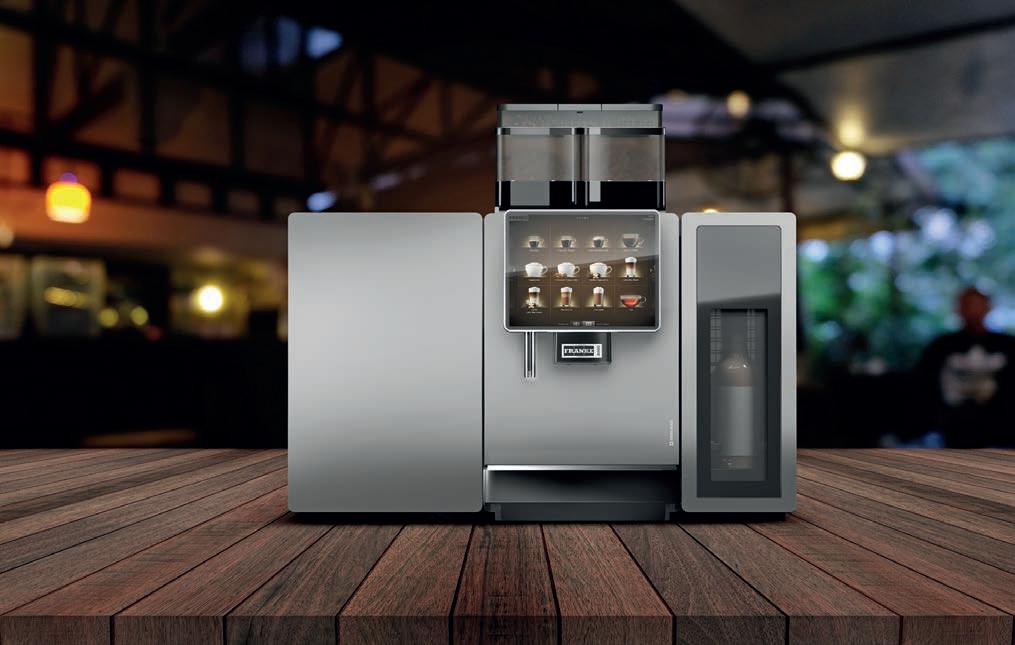 Franke works to find the right A Line machine for each business’ needs.
The A Line range automates the coffee-making process without compromising on taste.
Franke works to find the right A Line machine for each business’ needs.
The A Line range automates the coffee-making process without compromising on taste.
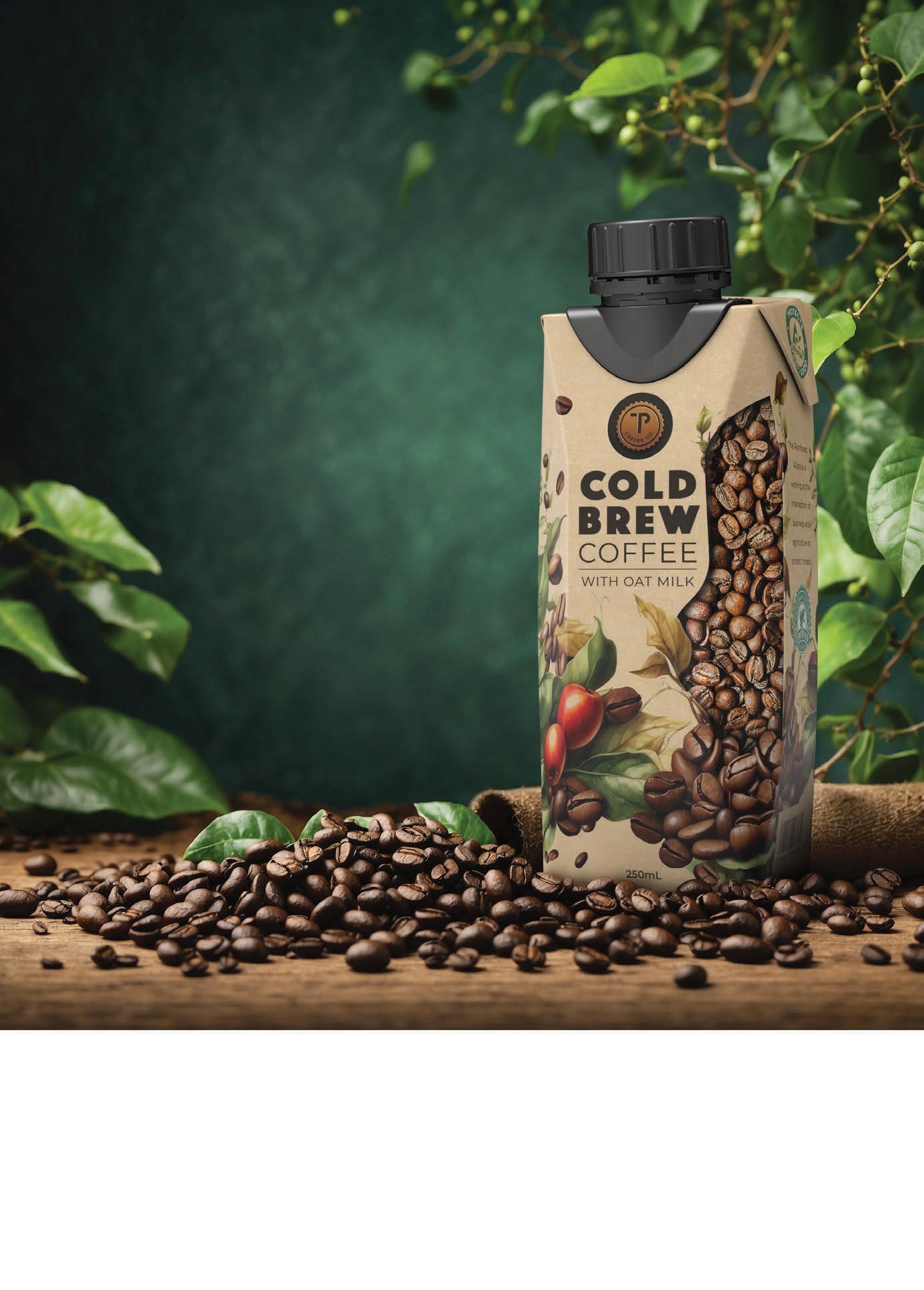

or many Melbourne International Coffee Expo (MICE) visitors, the May event will be their first opportunity to view and road-test new technology and innovations unveiled at the Host Milano exhibition last year.
For coffee equipment importer and distributor Coffee Works Express (CWE), the Melbourne event is the perfect platform to introduce customers to a wide range of new products from its international partners. It’s also an opportunity to collaborate with its ambassadors, such as Australian Barista Champion Jack Simpson, to demonstrate the kit in action.
“MICE is a great place to showcase everything that’s new in the industry, and that’s what we hope to bring,” says CWE Marketing and Brand Manager Natalie Kollar. “We want to give the Australian market what they’ve been asking for.”
One of the most anticipated product ranges is the latest coffee machines from Wega: the WBar and Nova. The Nova was designed with ergonomic and user-friendly features to improve the barista experience, while the WBar includes an optional Autosteamer function which can be activated with the touch of a button.
The CWE stand will also showcase Barista Attitude’s single-boiler Pilot espresso machine. Its features include a long steam arm which produces dry steam and no additional water dispersal to ensure consistent milk foam.

For those interested in the integration of tradition and automation, the Mytico line from Franke will be on display too. The CWE team are particularly excited about the range’s Duo and Vario hybrid coffees machines.
“Franke is known for its superautomatic machines, but the Mytico blends automation beautifully with a real barista feel,” says Natalie.
Mazzer’s Philos grinder will also be making its Oceanic debut at the Expo. The compact light commercial single-dose grinder weighs around 12.5 kilograms and is best suited to cafés and roasters. Its straightforward design is exemplified by its on/off button: a simple flick of the switch is all that’s required once the beans are manually measured and loaded into the hopper.
“Because it’s got a very specific and niche use, we’ll be doing some demonstrations on the stand to give it a proper introduction,” says Natalie.
The Mazzer Kony Sg will accompany the Philos on the CWE stand. Made with busy cafés in mind, this device is Mazzer’s first commercial gravimetric grinder. Its vibration control system can weigh each dose to provide a consistent result. It also features a built-in scale which weighs each dose within a precision of one hundredth of a gram.
“The Kony Sg is a high volume, stateof-the-art grinder that people have been requesting for a while now,” says Natalie.
Pete Licata, 2013 World Barista Champion and long-term friend of Mazzer, will be helping showcase the two grinders.
“I was part of the team that worked on the development and refinement of the Philos,” Pete says. “Our goal was to create
a zero-retention grinder with unimodal grind cut burrs suitable for home and light commercial use.”
Pete says these features help the Philos maintain each coffee’s distinct flavours.
“It’s very different to what Mazzer has done in the past, but the quality is still exceptional,” he says.
Joining Pete at CWE’s stand will be Jack Simpson, winner of the past two Australian Barista Championships. Jack became a Mazzer brand ambassador in February, marking the beginning of a partnership that’s close to his heart.
“I was over the moon to join the Mazzer team as it’s a company I’ve always wanted to work with,” Jack says. “It embodies many of the principles I follow within specialty coffee, such as quality and consistency.
“The first grinder I ever used in a café was a Mazzer, and I still use the company’s products today. It’s a company I truly respect in the industry.”
Jack thinks the Philos is one of the more unique grinders he has seen.
“It’s not a big grinder, so it also appeals to the home market,” he says. “There aren’t a lot of options in this area of the market at the moment.”
Jack says the Philos grinder reflects the level of quality that has made the Mazzer brand well-known around the world.
“That’s why you’ll see Mazzer on a lot of café benches, because its grinders keep producing consistently high-quality coffee,” he says. “It’s the kind of product and brand I am happy to associate my name with.
“I’m excited to show those who haven’t tried Mazzer products before exactly what they’re capable of.”
CWE’s Natalie says the excitement surrounding Jack’s partnership with Mazzer is palpable.
“It’s great to have someone based in Australia join the Mazzer team,” Natalie says.
“Jack is an all-round fantastic guy with great talent. He knows these grinders inside and out. He has a real passion and knowledge for the importance of grinding, and he knows how to look at things from a barista’s point of view. It will be a great experience having him showcase Mazzer’s new products to Australia.”
For more information, visit cwe.com.au
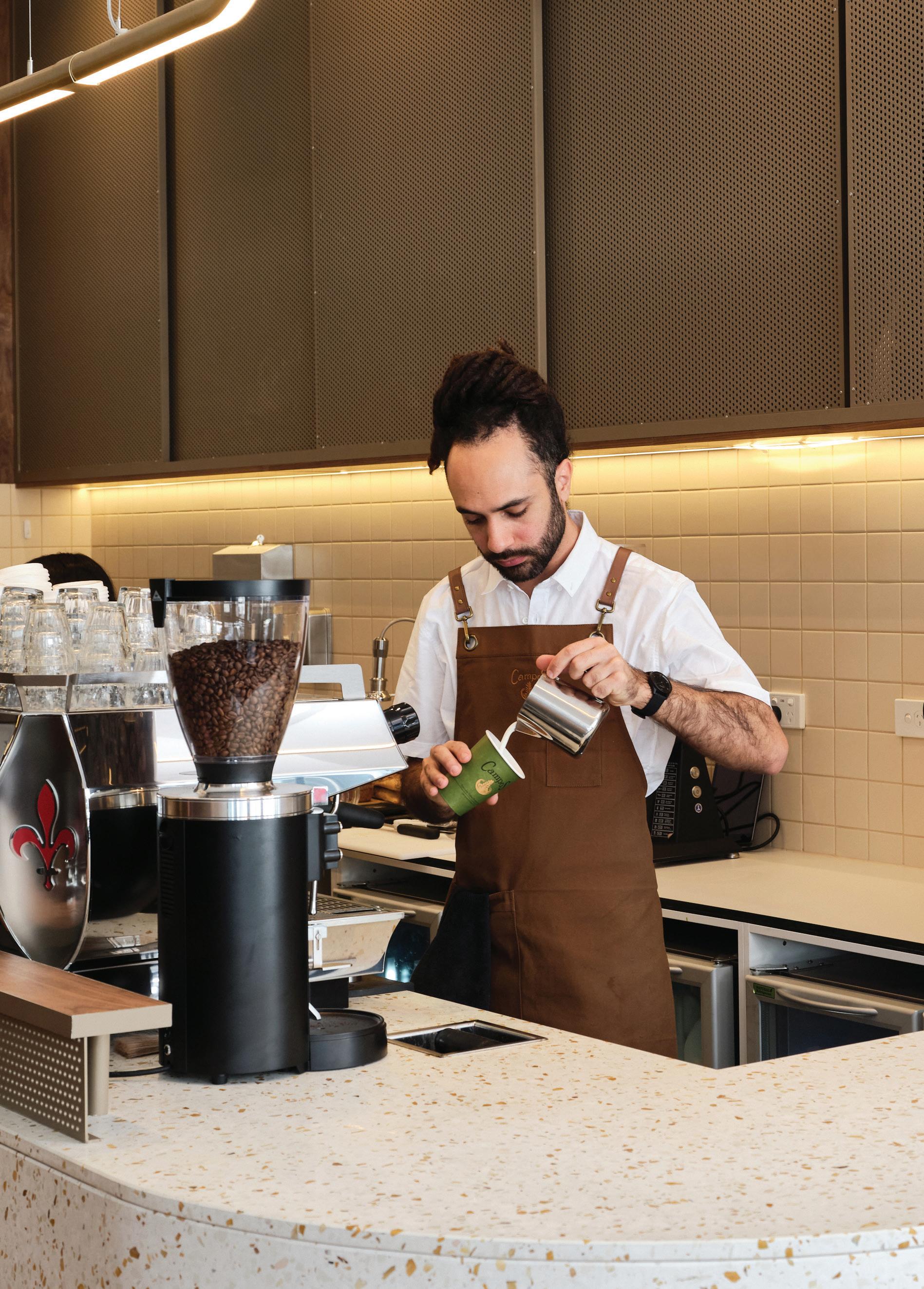
THERE’S COFFEE, THEN THERE’S

BeanScene takes a look inside the MONIN Studio in Sydney, where innovation is constant and new creations emerge.
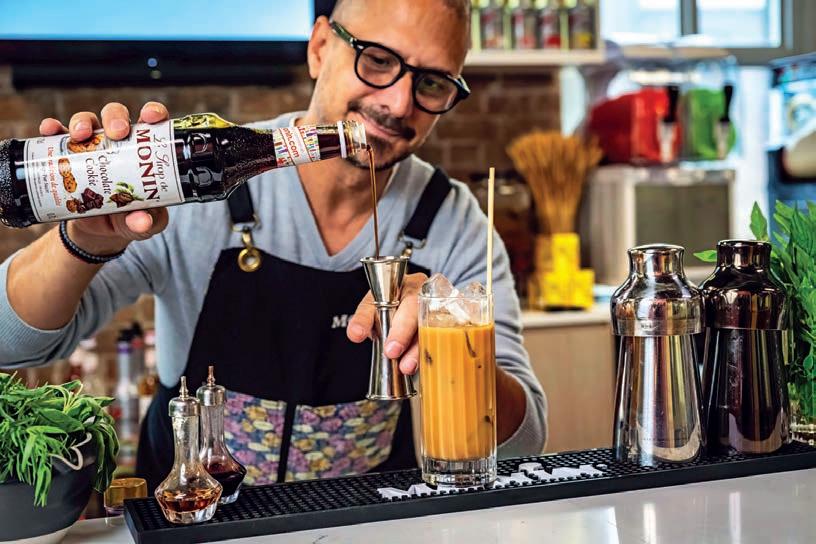
afé counters and kitchen benches are often a flurry with customer orders. When it comes to new menu items, these spaces transform into creative hubs where flavour combinations are tested and measurements refined. The limitation for many café owners and baristas, however, is access to high-level kitchen equipment that has the ability to make a good drink great.
This is exactly what the MONIN Test Kitchen and Studio in Sydney was established to provide. It’s a haven for flavour specialists to experiment with a bounty of equipment to concoct innovative signature drinks.
While the space is open to all, it’s also the “unofficial laboratory” of MONIN Brand Ambassador Karel ‘Papi’ Reyes, which is why it’s also often referred to as Papi’s Kitchen.
“The facility has all the tools and toys you could need,” Papi says. “It’s all about incentivising baristas and bartenders to try new things using our products.”
The list of tools includes a Hoshizaki IM-130 ice cube machine, a Nitro.Cool kegged nitrogen machine, and an SPM i-Pro slush machine, which Papi describes as “the Rolls-Royce of frozen drink technology.”
The Studio was created as a space for drink specialists to experiment with MONIN’s new and existing syrup flavours. There is no level of expertise required for
café owners looking to visit, but Papi says the MONIN team often personally guide each customer through the flavour journey.
“A lot of the time, café teams will come in with no idea what to do or how to get started, but we’re here to help them through the creative process,” says Papi.
“The creative process can start anywhere. Often, it’ll be bringing in new friends and customers who are looking to offer something new at their venue.”
In advance of these collaborative sessions, the MONIN team research global trends in the beverage space that cafes may want to capitalise on.
“For cocktail inspiration, we often
More
look to major cities like London, Tokyo, Paris, or New York,” Papi says. “In coffee, however, Sydney and Melbourne tend to drive innovation so we look to the local coffee scene.”
The MONIN team also assess each cafe, considering the drinks that would best suit its brand and customer base.
“A signature drink plays a big part in a café’s menu and overall feel of the place. It can give regular customers an incentive to try something different, and new customers a reason to visit,” says Papi.
Finding the personality of a business is crucial to MONIN, as the team believes no two businesses are alike.
“It always depends on the requirements and the demographic of the café, as well as opening and closing hours since some drinks might be better suited for the evening,” says Papi.
The café’s location is also an important consideration in the formulation of a new drink.
“If you’ve got a café in the west of Sydney, it’s a very different experience to the CBD, so not everything will work in both locations,” Papi says.
While the MONIN team enjoy diving head-first into the creative process, Papi says café owners with their own game plan are more than welcome to take charge of the session.
“We love it when customers have a strong idea of what they want. They will bring in their own coffee blend, and maybe even their preferred milk, and tell us exactly what they’re looking to create,” says Papi.
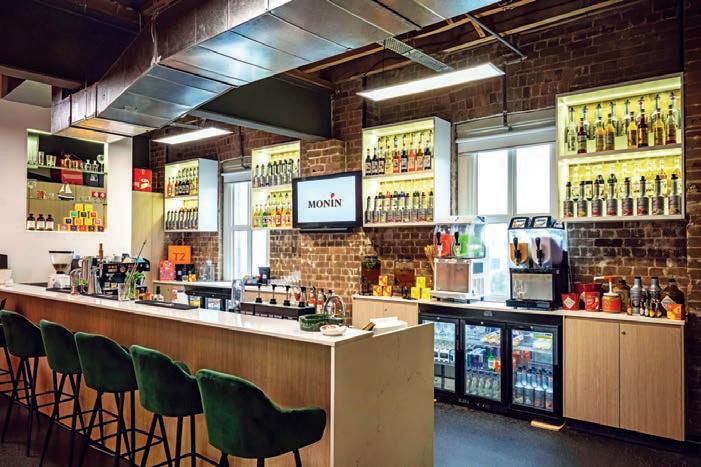
“If you want to experience the studio, the door is always open for any business big
Finding these differences is part of the MONIN team’s communication process with the café owners, as the team explains each detail to studio guests who may not have a clear idea of what kind of new creation they are looking to make.
“We want to simplify everything for both our new and existing customers,”
“It’s all about cementing a strong relationship, because the happier they are, the better everything is for









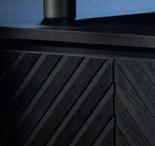


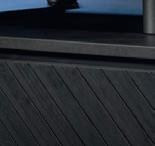















WMF espresso NEXT Making coffee is an artistic endeavour, involving passion at every step. The WMF espresso NEXT turns this process into an effortless, reliable and endlessly repeatable choreography. Just like a world-class athlete, the semi-automatic portafilter machine delivers passion, expertise and character every time. With the WMF espresso NEXT handling complex tasks like grinding, tamping and milk frothing, barista-quality coffee is guaranteed and the operator has more time for customers. Let your coffee business flow smoothly – with the WMF espresso NEXT.




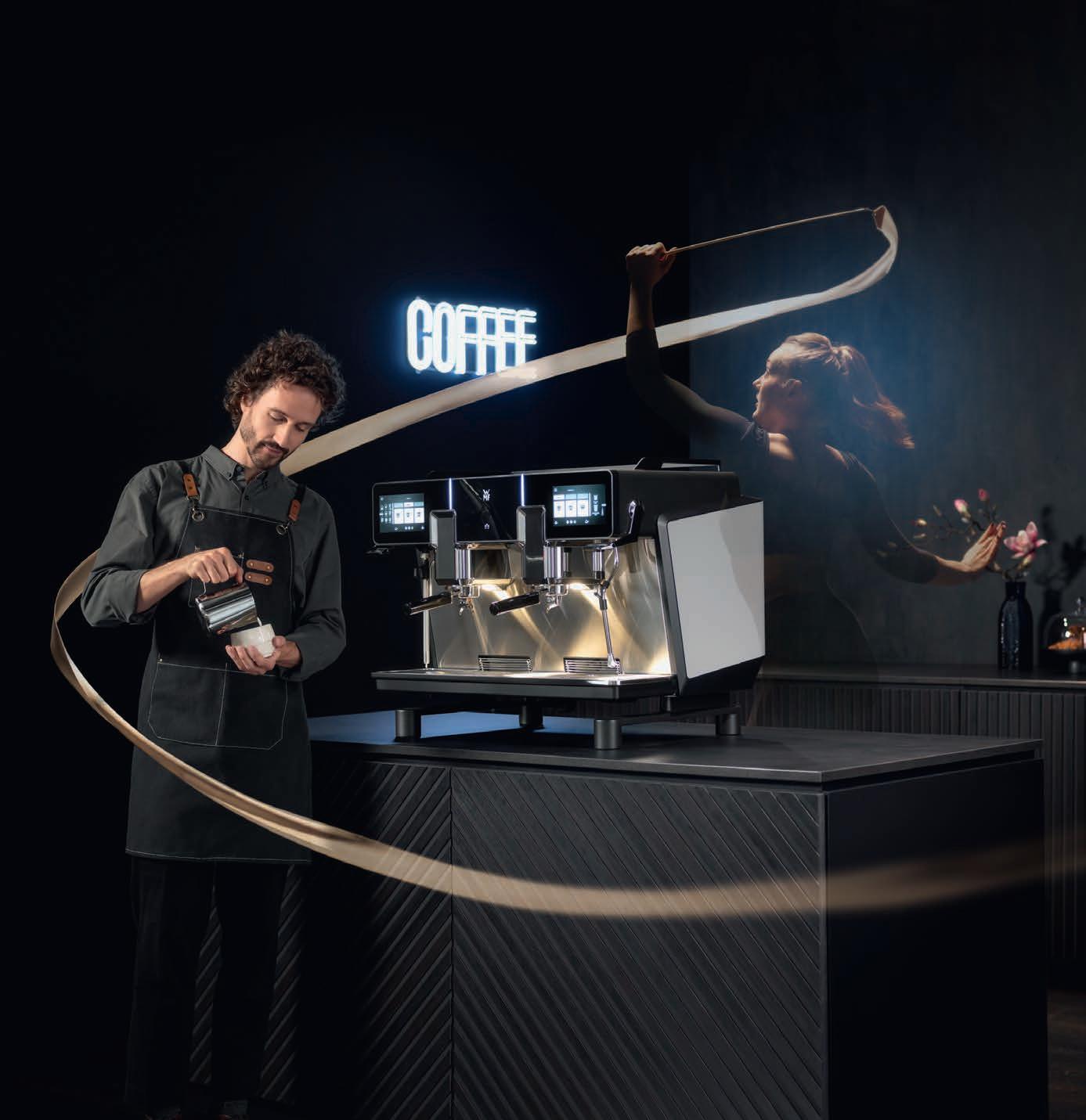
Five Senses is reopening its processing mill in North Sumatra and reintroducing the region’s distinct coffee profile to the specialty market.
hen Five Senses Founder and Owner Dean Gallagher first tasted North Sumatran coffee, he knew right away it was unlike anything he had ever experienced.
“Sumatran coffee has a unique flavour profile,” says Dean. “It is the result of a processing method only found in the region that, when done right, produces a highly sought-after coffee.”
Keen to share the unique North Sumatran coffee’s captivating taste with more people, Five Senses first purchased a processing mill in the country in 2013.
“We planted coffee trees in Bali with two farmers over several years. Once the project came to its natural conclusion, we noticed the coffee from that area was gaining attention,” Dean says.





“An opportunity presented itself when we met an Indonesian worker who had started a project setting up mills in North Sumatra. We felt we were well placed to provide the locals with an avenue to market – and the rest is history.”
Dean and the Five Senses team decided to establish their mill in the Tiga Raja region, but before it could start processing coffee it needed to be refurbished and new equipment installed.
The company gifted a 15 per cent share of the project to the local farming cooperative, and a further 15 per cent to the original local mill operator, which was then recently transferred to the cooperative, adding up to 30 per cent.
“We didn’t want to just have a speaking relationship with the locals: we wanted to give them a tangible stake in the operation,” Dean says.
Once the refurbishment was complete, the local coffee farming community began to flourish, with its coffee reaching the Australian and American markets.
The success, however, was short-lived. A series of harvest failures combined with COVID-19 economic uncertainty forced the mill into hibernation.
“During this time, it became critical for these farmers to feed themselves, so many of them ended up ditching coffee and started investing in turnover crops like cabbages in order to stay afloat,” Dean says.
When Dean and the team visited the North Sumatran region in August 2023, the coffee scene was at its lowest point. They could see the local community needed
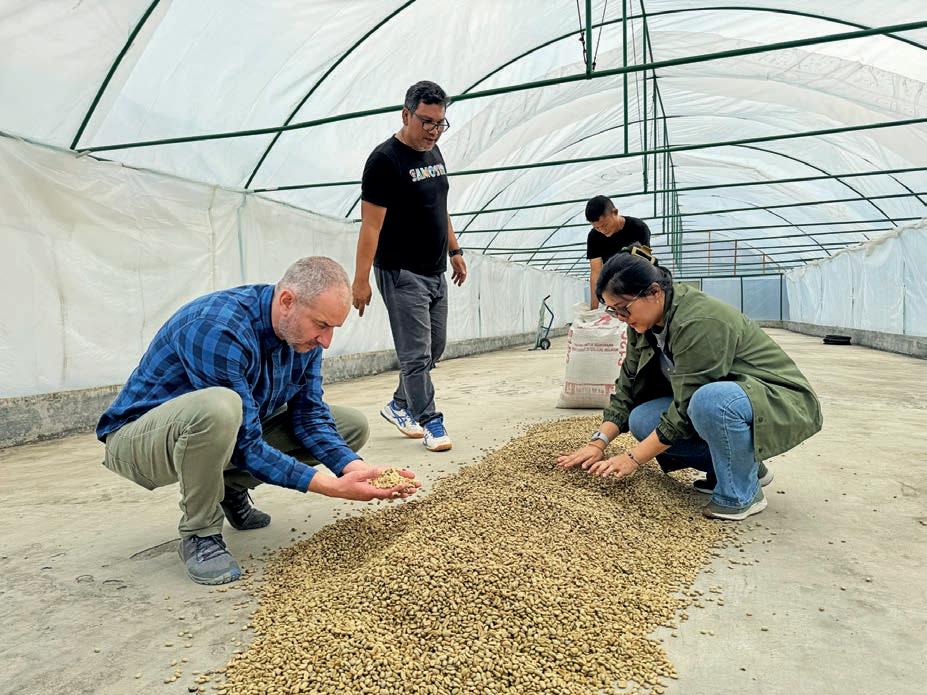
inspiration to start producing coffee again.
Revitalising North Sumatran coffee was not going to be accomplished overnight. Once the coffee is planted, farmers must wait three years before reaping the rewards, so it was up to Five Senses to assure the farmers it was an investment worth waiting for.
“If they were going to start producing coffee again, we knew we had to reopen the mill,” says Dean.
“They needed reassurance and trust that their coffee will eventually go to market and that it will be bought.”
As such, the Five Senses team travelled door-to-door throughout the region to convince the farmers.
“We’ve engaged some agronomy consultants to help the farmers elevate their yields, as well as our on-site mill operators answering any questions they might have,” says Dean.
After years of hibernation, Five Senses reopened its Tiga Raja mill in February 2024.
Dean hopes this will inspire local producers to return to the industry and bring back North Sumatran coffee.
“It’s not about us. It’s about the region around the mill and giving the local community a consistent income, which will
uplift the area,” he says.
Dean notes that coffee growers have already shown interest in re-investing in North Sumatran coffee.
“The farmers not growing coffee are already seeing the price of their neighbours’ coffee go up and up,” he says.
Dean hopes that, by revitalising the local coffee industry, the world can be reintroduced to the flavour of North Sumatran coffee.
“My long-term goal is for the reputation of this coffee to be among the hottest origins in specialty coffee,” he says.
“We hope we can promote it to the point where we will have to compete for this coffee ourselves.”
The company’s work in North Sumatra is part of Five Senses’ larger principle of helping uplift the regions from which it sources its coffee.
“The context around coffee and its origin countries has to be understood, and some roasters don’t know much about the areas they source from,” Dean says.
“We have an overarching desire to make a real impact with our producers, because this is how you develop nations.”
For more information, visit fivesenses.com.au
When BrewHub wanted more control over the coffee it served, a partnership with IMF and Roastquip made the transition to a new in-house roastery as smooth as espresso.
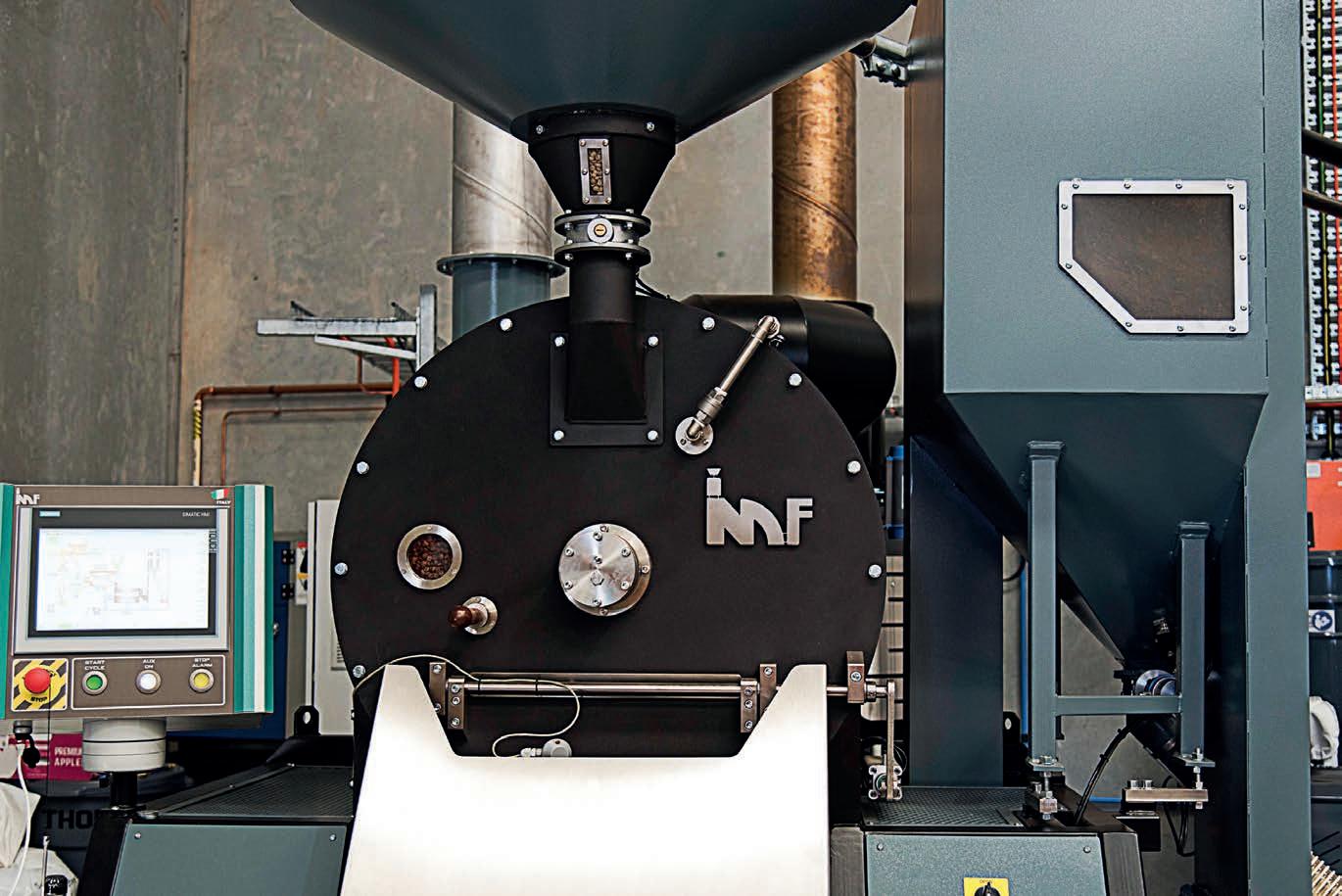
ince 2010, BrewHub has provided corporate workplaces with fully integrated coffee solutions. It supplies everything a workplace drinks hub might need – from coffee equipment, beans, milk, and fresh fruit to a valet service which ensures the beverage station is clean, fully stocked, and ready to welcome visitors.
At the start of 2024, BrewHub looked to level up its production of freshly roasted beans to fill its fleet of automatic coffee machines in workplaces across Australia.
“We wanted to have more control of the process, develop a deeper knowledge of the coffee, and introduce new blends and single origins,” says Craig Ellingson, BrewHub
General Manager of Beans and Machines.
Working with BrewHub’s Coffee Culturalist Dom Spadaccini, Craig researched the market to find a roaster that would hit their three key criteria: consistency, automation, and sustainability. For Craig and Dom, an IMF roaster was the clear winner.
“IMF ticks all the boxes for me,” says Dom, who worked with Will Notaras of Roastquip, IMF’s Australian agent, to get an IMF RM60 60-kilogram roaster, and six two-tonne silos to Australia. Will also coordinated the installation and continues to provide after-sales support.
“I’ve worked with Will for over 15 years; we actually saw the IMF roasters together at
Host Milan when they were first exhibited,” says Dom.
Consistency was the top priority for Craig and Dom as the BrewHub roastery would be producing large amounts of coffee. Within a couple of weeks of installation, the team were roasting several tonnes of coffee each week.
“Being able to maintain consistency with big volumes of coffee is tricky, but the IMF roaster can maintain a very stable temperature which produces great results,” says Dom. “We talk about the averaging out of colour and size of beans in the drum. Traditionally, it’s always been a little bit of a mystery, but this IMF machine does it better than any other

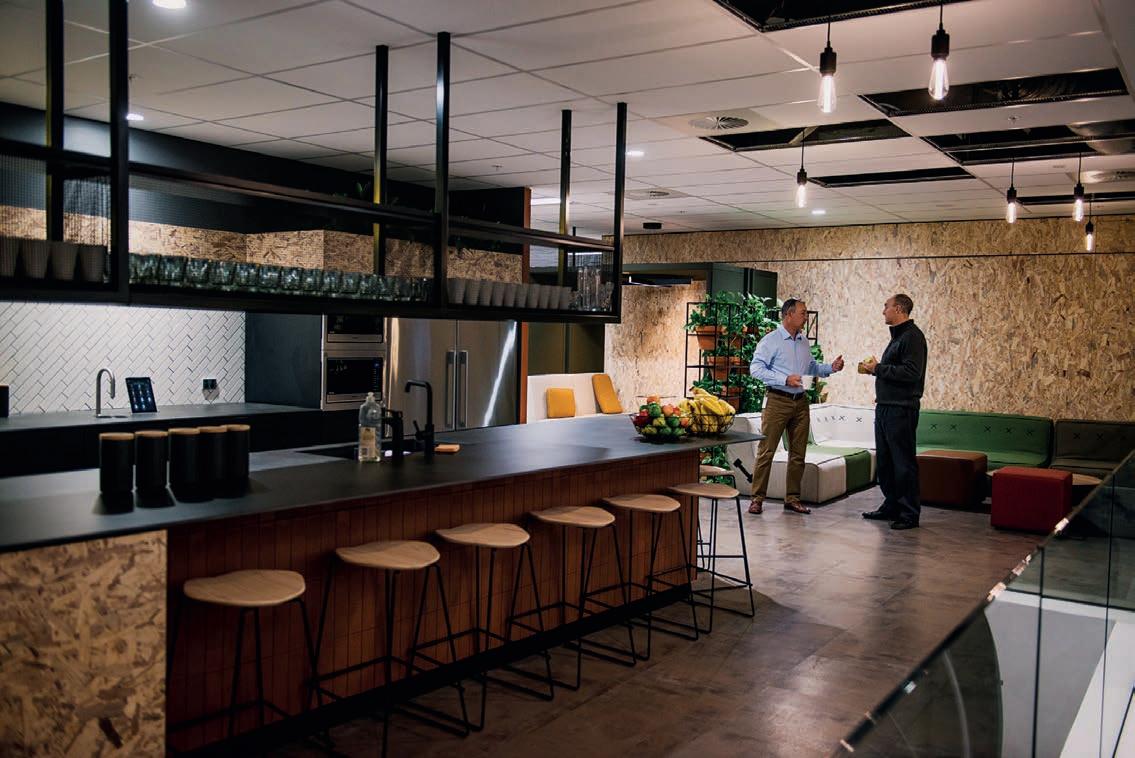
I’ve worked on thanks to its one-degree temperature control.”
As a company that champions automation in all areas of its business, the BrewHub roastery needed to follow suit.
“We have a company-wide drive for efficiency, and integrating automatic machines into our workflow means we can run the roastery on far fewer people than a traditional setup,” says Craig. “This efficiency means we can pass on the reduced costs to our customers.”
Dom also believes this use of automation results in a better product.
“The great thing about the IMF RM60 is that you can still have a lot of control if you want. There’s the option to roast automatically, manually, or in a semiautomatic fashion, which allows the roaster to exercise their passion and creativity. It’s especially useful when dialling in new blends and single origins,” he says.
The equipment’s automatic functions extend to the integrated IMF silos, which reduce the amount of manual handling and heavy lifting on the roastery floor. They also enable automatic pre- or post-blending into the roaster at the touch of a button.
“We currently have two people working in the roastery, but once we’ve settled into the rhythm it could easily function with just one,” says Craig.
Many of the IMF RM60’s automatic features also contribute to its eco credentials. For Craig and Dom, finding a machine that cut workload and emissions was essential.
“It’s super efficient,” says Craig. “It uses far less gas [up to 47 per cent] than some traditional roasters, which is great
position. We power the roaster on 100 per cent green energy using a combination of rooftop solar and renewables from the grid.”
For Dom, the machine’s ability to highlight specific origin characteristics is also impressive.
“The IMF still has a traditional drum that rotates, but it’s indirect hot air heating the drum rather than a naked flame. This results in a clean heat, which we think
machine’s 12-step profile. This means customers can choose between more conductive or convective roasting.
Craig and Dom credit Will from Roastquip with making the installation so smooth.
“Being based in Australia, importing goods from Europe is often tricky because we are so far away,” says Craig. “Aftersales support was crucial to our decision and Will has been meticulous and his
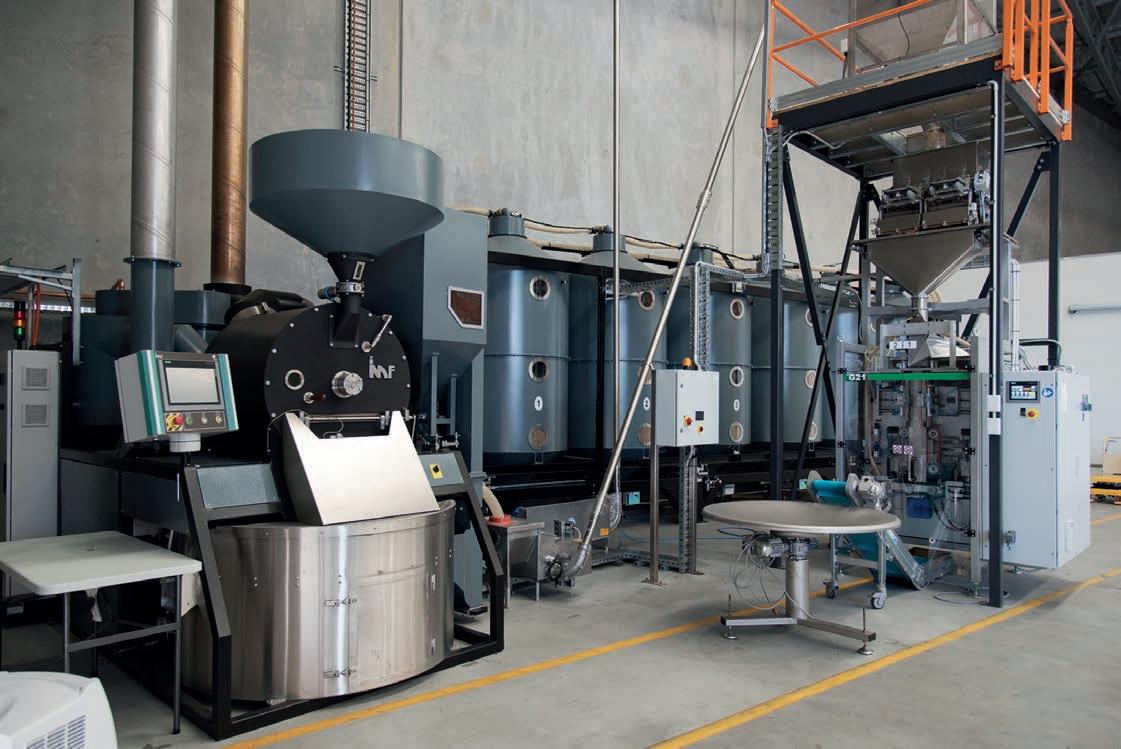
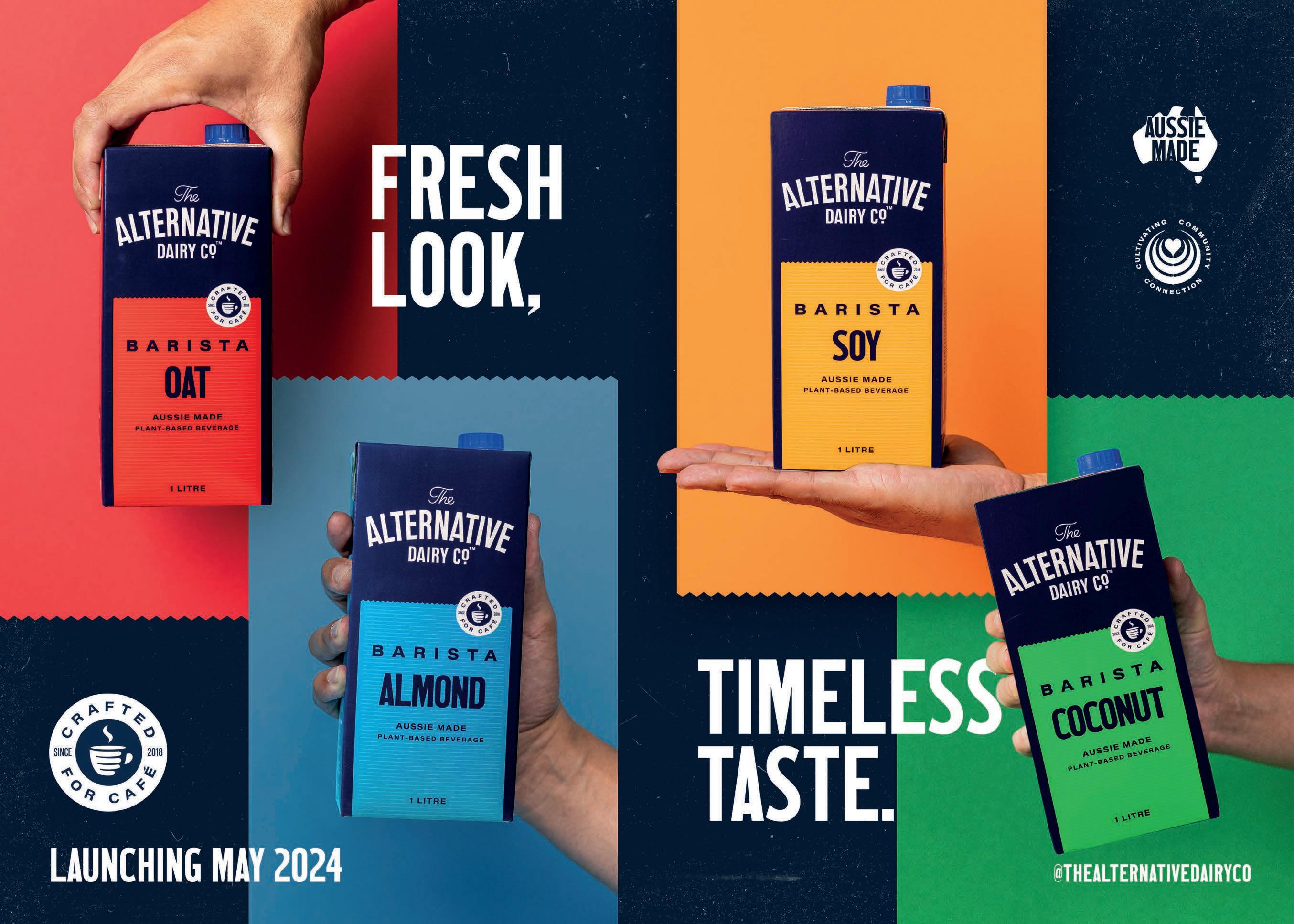

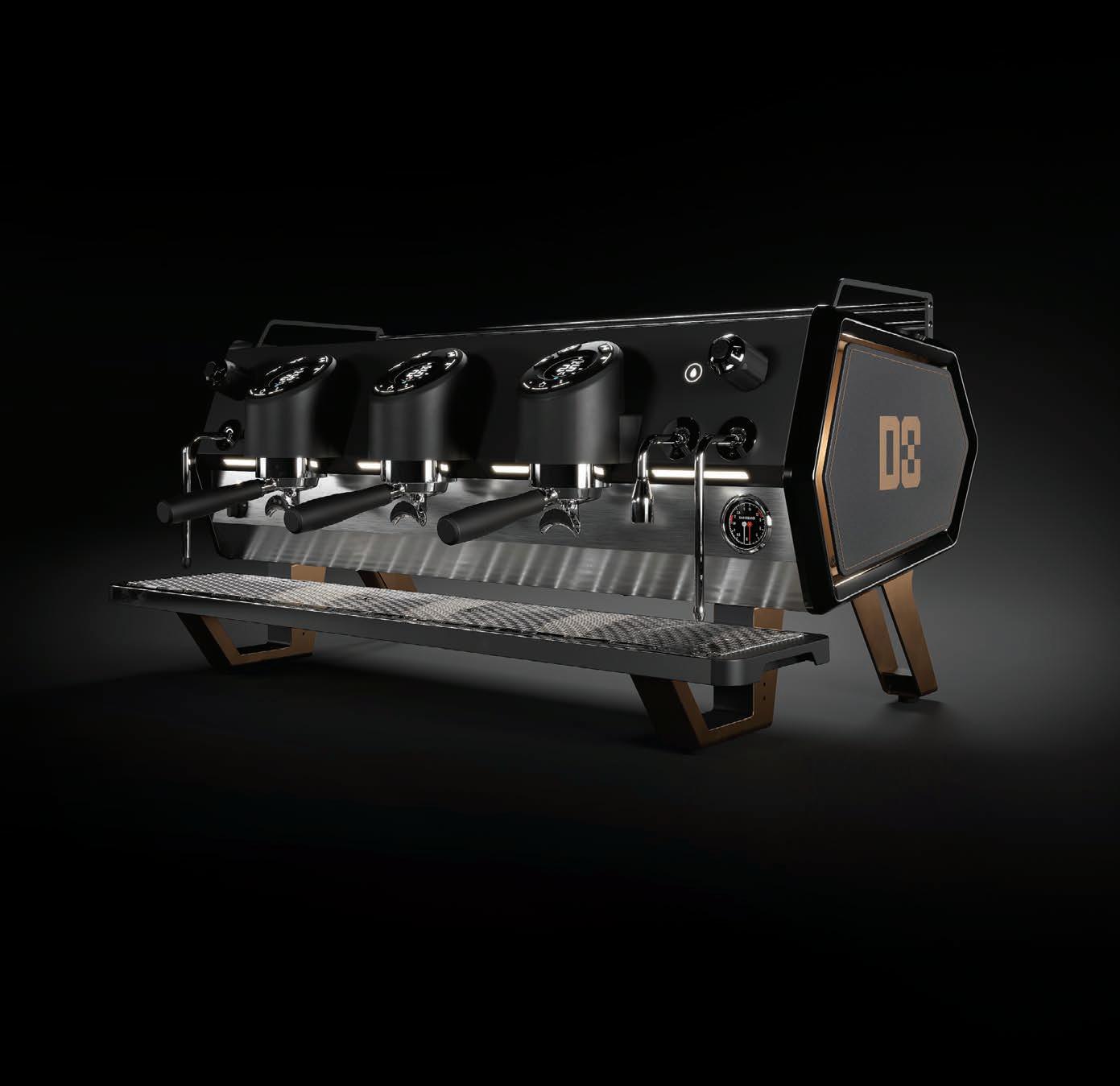

Kivahan Co-founders Luigi and Turkan Bertolacci share how a chance encounter led to a newfound coffee obsession and a fast-growing business.
uigi Bertolacci never imagined he would become infatuated with coffee, but now it’s all he and wife Turkan want to talk about.
“We love the whole history of coffee, from the machines to the origin areas,” says the Kivahan Co-founder. “The minute someone talks about coffee notes, I jump in and start chatting away.”
Luigi’s path into the coffee industry was unconventional. He started his first hospitality business, a sushi restaurant in Brisbane, in 1999, and within a couple of years it was franchised. By 2008 it had 32 locations across Australia, but Luigi sold the company shortly after.
Unsure of his next business venture, it was on his honeymoon in the United States in 2011 that Luigi found unexpected inspiration.
“We were in Los Angeles and visited an organic venue called Urth Café,” Luigi says. “The coffee was fantastic, so we decided to set up something similar once we returned home.”
The name Kivahan comes from ‘Kiva Han’, the world’s first recorded coffee shop which opened in Constantinople (now Istanbul) in 1475. It’s also a nod to Turkan’s Turkish heritage.
Kivahan began as a chain of cafés, but has since expanded to become a roaster and wholesaler.
Each coffee shop features Modbar under-counter espresso group heads, which are handcrafted in Tuscany, equipped with La Marzocco technology to ensure consistent extraction.
In 2023, Kivahan acquired a warehouse in Brisbane and fitted it out with an expanded roasting operation. It now has the capacity to ship wholesale coffee across the country.
All roasters at the new HQ are electric, which Luigi credits to company’s commitment to being environmentally conscious and only buying organic coffee.
“I had a health scare around 20 years ago that led me to a more organic path, and that’s represented in the coffee we craft at Kivahan,” says Luigi. “A lot of roasters have an organic range, but we’re 100 per cent committed to staying this way.”
Beyond health, Luigi favours organic coffee for its environmental benefits. This stance has led Kivahan to acquire customers in unique areas outside its
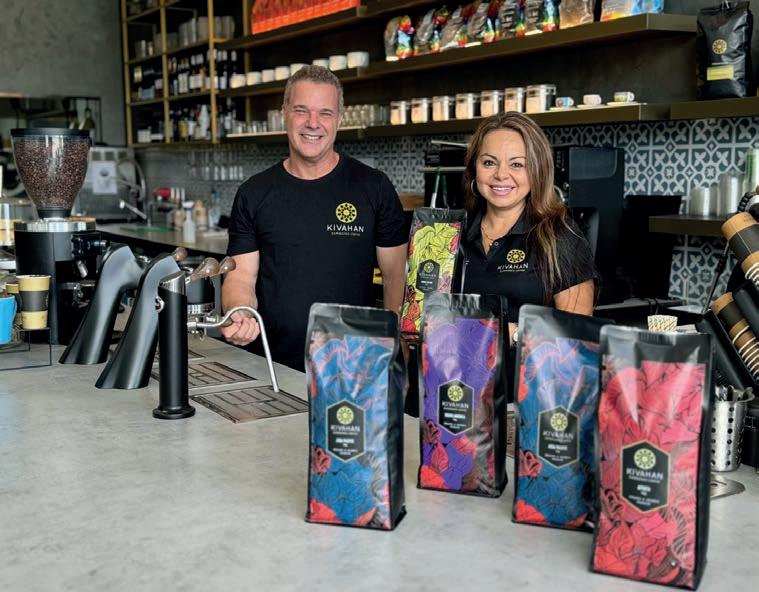
Brisbane home who resonate with the company’s commitment
“Because we’re organic, we tend to find quirky venues that want to use our product, which is why we’ve begun selling to New South Wales and Melbourne,” Luigi says. “We want both organic and non-organic cafés to look at our product and see what we can offer.”
Luigi and Turkan have embraced the opportunity to be a wholesale coffee provider
and become the kind of business partner they would want to work with.
“It all comes down to that personal touch,” Luigi says. “Everyone can get a hold of the owners in this business.
“If you ring us and want to talk about coffee, you’ll get either myself, Turkan, or a manager on the phone. You’ll always be talking to someone who is hands-on in the business.”
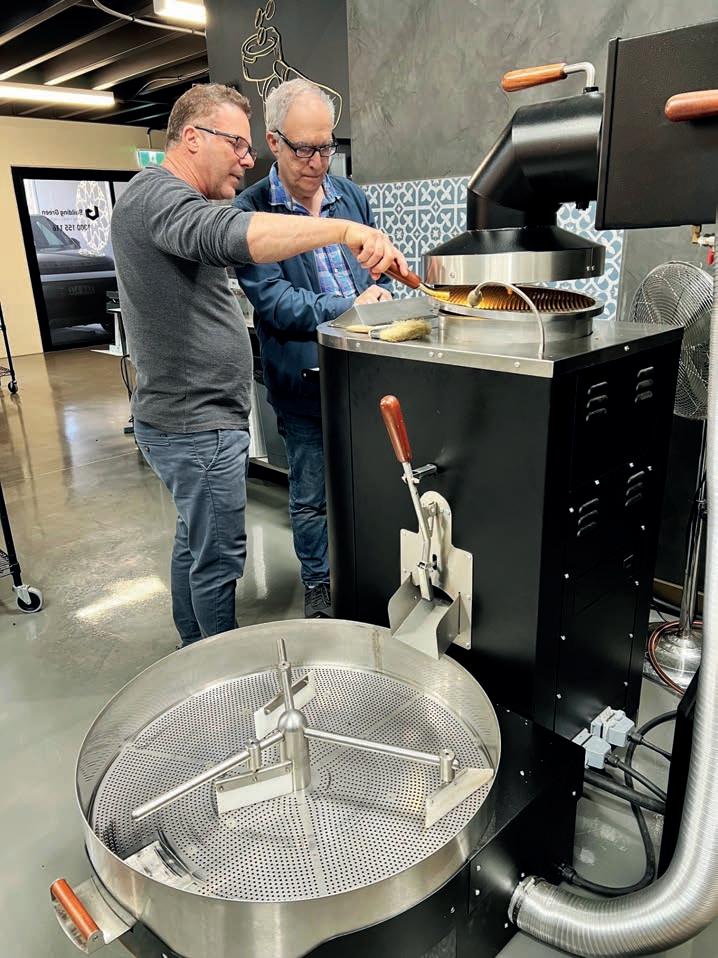
This assistance covers all aspects of the café industry. So far, the company has helped its café partners find the right equipment, including coffee machines, grinders, and filtration systems.
“If we help install machines, we also take the client through each machine and teach the baristas how to use it to get the best coffee,” Luigi says.
Once a café partners with Kivahan, Luigi says it becomes part of the extended family.
“We like to return to our clients’ cafés every now and then to make sure everything is going OK,” he says.
The connections Luigi has made have only added to his passion for coffee, which is palpable whenever the subject is brought up.
“I’m obsessed with it,” he says. “If I can do this work into my old age, I’ll be a happy man.”
For more information, visit kivahan.com.au
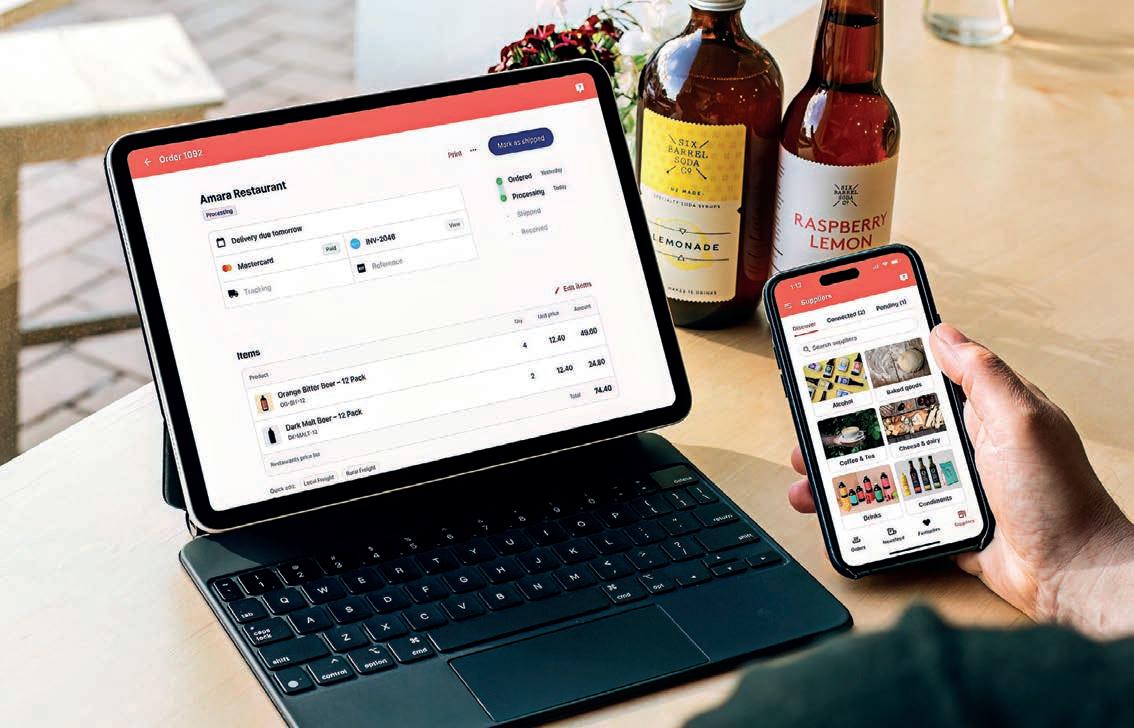
Roasters Market Lane Coffee and Sixpence explain how using Upstock has made managing wholesale orders a walk in the park.
s the team at Market Lane Coffee saw the number of wholesale orders increase over time, they knew they needed a system in place to keep track of everything.
To solve the issue, Market Lane Coffee turned to Upstock, a software website and app designed to simplify wholesale orders.
“Upstock has helped us simplify the ordering process,” says Market Lane Coffee Co-founder Jason Scheltus. “Now our wholesale clients can focus on their customers and making coffee rather than spending time with inefficient ordering systems.”
Through the app, Market Lane’s wholesale customers can select any blend or single origin the roaster has on offer. They then submit orders using the saved payment information before real-time notifications are sent to the Market Lane team to prepare orders as quickly as possible.
Tyson Stagg, who oversees partnerships and wholesale at Market Lane, believes the switch has helped put the spotlight back where it belongs.
“Our coffee is the hero, and we want to be able to share that story,” he says.
According to Tyson, Market Lane’s customers have also preached about the new system and seamless transition process.
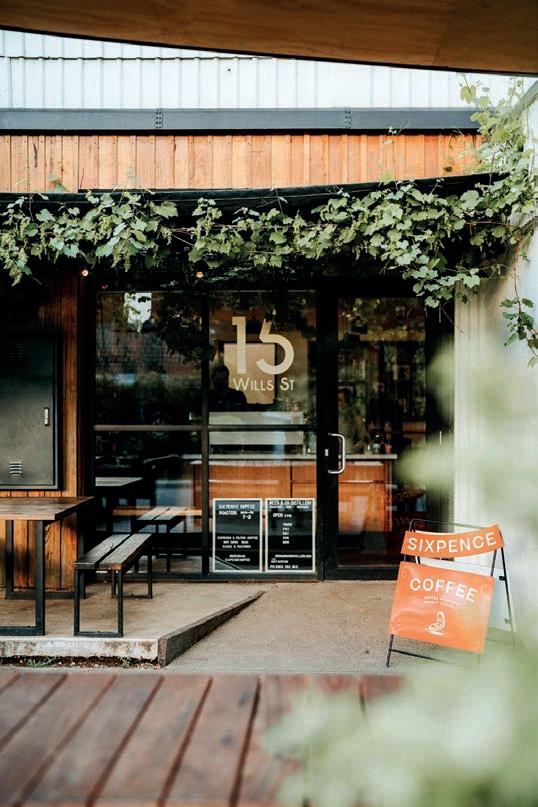
our processing time has been cut in half.
“When things are implemented on Upstock, they work from day one. We don’t want to be testing out new features on our customers and causing them frustration.”
For Market Lane Coffee, the order scheduling system, which is created by the supplier and sent as a notification to the buyer, has been especially helpful. With payment details already saved to the system, the customer just has to confirm the transaction.
Tyson says he no longer needs to review customer orders to check for mistakes. Instead, most wholesale accounts pay upfront using credit card, which has helped remove security risks.
“Having a really easy method for customers to pay their orders upfront has been a great system for minimising outstanding debt,” Tyson says.
With each café’s information in one place, Tyson says Upstock has helped the roaster learn more about each customer, which helps develop stronger relationships.
“Our vision has always been ‘good coffee, good for everyone’, so we want to make sure our coffee not only tastes great, but that everyone across the supply chain is looked after,” he says. “Upstock has been a great help. It allows us to stick to our values and take care of our people.”
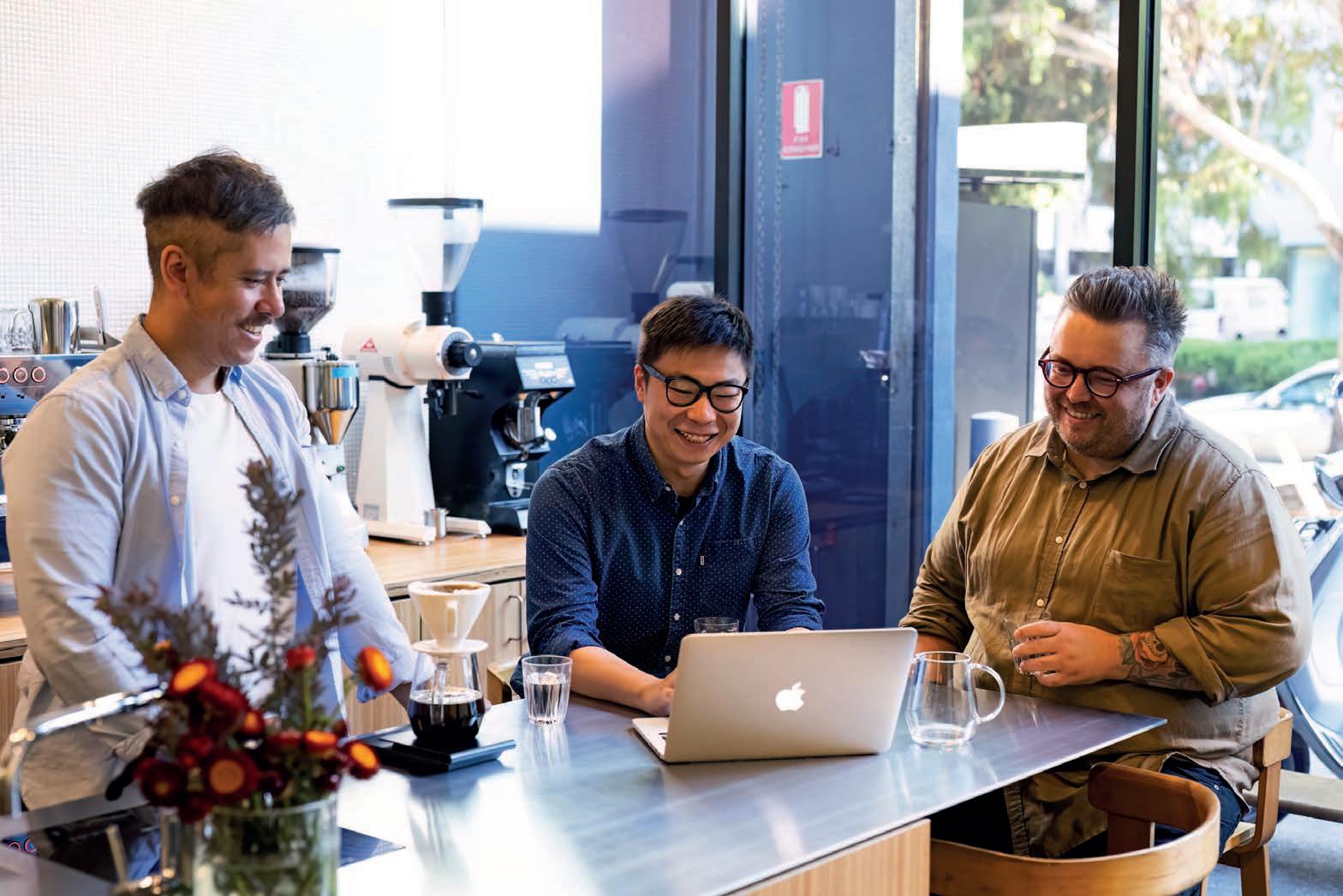
Upstock’s management system has not only benefitted Market Lane. For Victorian coffee roaster Sixpence, it has helped run the part of the wholesale business the team enjoys least.
“It’s never nice to receive an overdue invoice, and it’s not fun sending them out either,” says Sixpence Production Manager Tim Dickens.
Roasters and cafés can create accounts to sell and buy anything they require through Upstock. Orders placed through the app are traceable, eliminating much of the laborious administration involved in running a business. For Tim and the Sixpence team, Upstock has been a game-changer.
“Every month, the number of statements we are issuing seems to be going down,” he says. “What used to take 10 to 15 hours a week is now just 15 minutes at the end of the month thanks to Upstock.”
Tim says Upstock has helped Sixpence monitor revenue streams to detect which parts of the business are more profitable.
“Upstock pre-payments let us see exactly how the wholesale side of the business is doing compared to our retail and online figures,” he says. “Now everything is so much easier in terms of reporting our numbers.
“Before signing up to Upstock, we would receive orders in any number of methods, including emails, text messages, phone calls, and so on. Now, there are no more 3am emails.”
Sixpence uses Upstock as both a buyer and a supplier. While roasting takes place at its HQ in Bright in Victoria’s High Country, its café in Albury, New South Wales, can submit coffee orders through the app.
Tim says organising manual invoices between each location was stressful and time-consuming.
“It wasn’t very traceable,” he says. “Having stock transfers as part of the same process has allowed us to streamline our physical processes in the roastery, like
packing and sending orders.”
To acquire baked goods, cafés can even search Upstock for nearby bakeries, and then place orders through the app.
The platform also gives Sixpence the opportunity to organise and display its prices, while also including price tiers for its customers.
“We have price lists for the cafés we consider a part of the Sixpence family, and Upstock helps us adjust each bundle easily,” Tim says.
Tim says Sixpence’s wholesale customers that have switched to Upstock have also come to appreciate the management system.
“They love that there’s minimal errors in invoicing, and that they can always double-check everything from the app,” he says. “I can’t stress how much this has made life easier for everyone.”
For more information, visit upstock.app/coffee

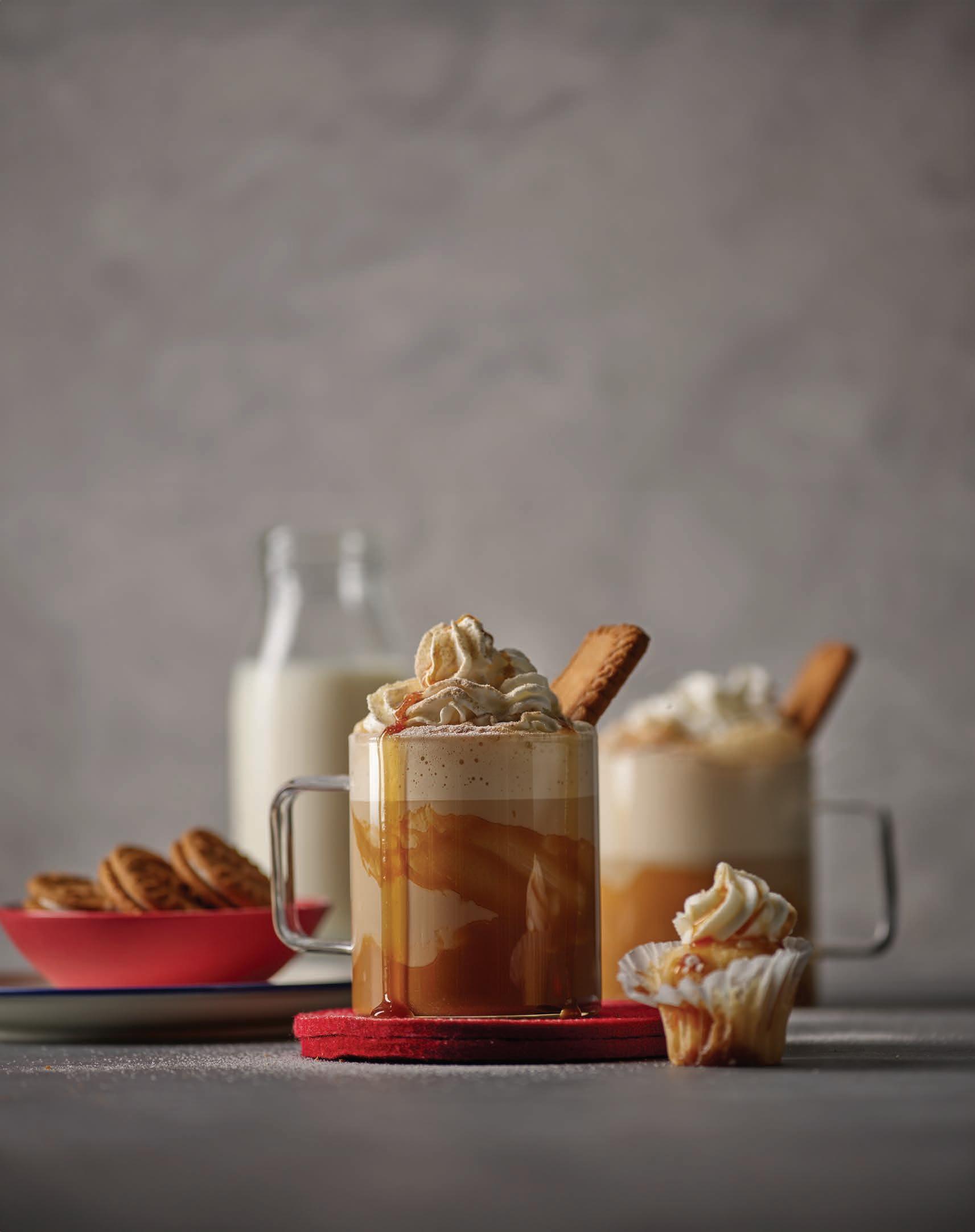


Riverina Fresh dairy farmer Paul Grinter explains how he’s turning the laborious task of milking cows into a hands-free operation.
s Paul Grinter speaks to BeanScene, he observes a sight most dairy farmers could only dream of: hundreds of cows lining up to milk themselves.
This isn’t some sort of magic trick. It’s the result of Australian dairy and food services company Riverina Fresh collaborating with its dairy farmers to adopt technologies such as automation and robotics to produce consistent, highquality milk, and sustainable outcomes for
In November 2023, Paul and Claire Grinter’s multi-generational dairy farm in Muckatah, northern Victoria, installed 14 robotic milking units, a one-of-a kind system designed for their own operation. Paul says the units are a “game changer”, and has left room for another four units for
“It’s quite a large investment, but we see it being very significant for the dairy industry,” says Paul.
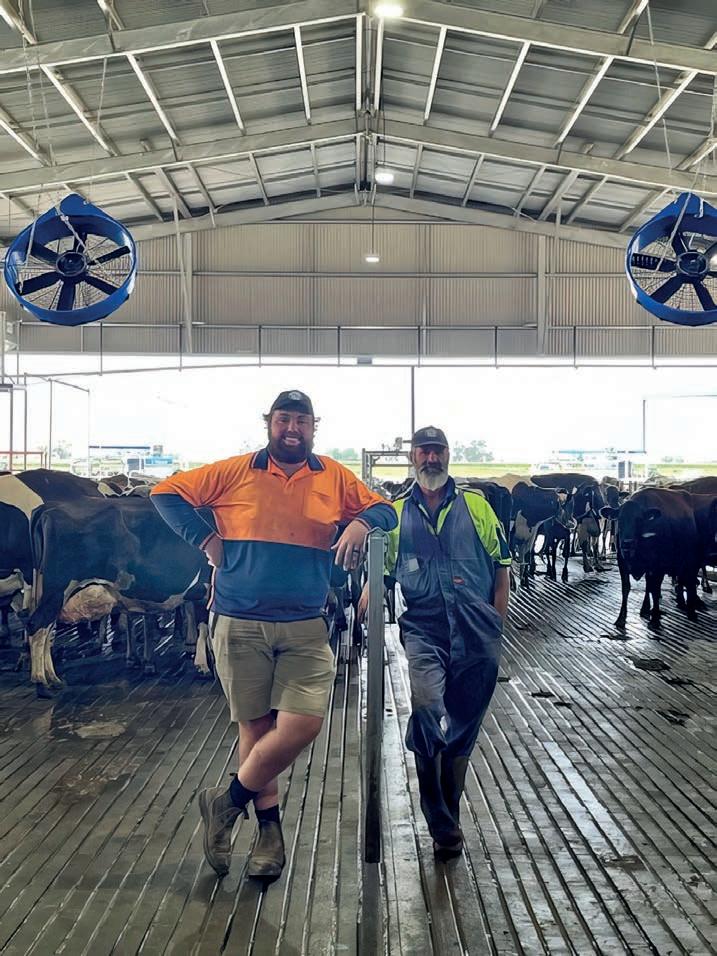
Each robotic unit has a sensor that registers a cow’s electronic tag when it enters the space. The machine’s computer then uses a camera to locate the udder before extending robotic arms to milk the cow.
According to Paul, having the most upto-date milking technology has already had a positive impact on efficiency, production, milk quality, and cow health.
“The milk runs through a meter, which measures all elements of the milk’s quality while the cow leaves the stall and goes back to eating,” he says. “If a cow has any health issues that need attention, the technology will tell me immediately.”
Paul has worked in the industry since the 1970s and says the move to automation was a big decision. The Grinters have four young adult children, who work on the farm or within the dairy industry, who were all involved with the design of the
“Because it is modern technology, the younger generations tend to know it better, so I’ve consciously stepped back and let the kids take control because I want them to learn how to manage it in the future,”
Ultimately, the decision to move to robotic units came down to resolving the issue of skilled farm labour, which has become increasingly difficult in recent years, resulting in having to rely on international workers for the majority of the milking staff.
“We’ve opted to keep a staff member at the dairy during the day, but that’s not necessarily for milking, rather to monitor data and reports. It’s also freed up staff to do other tasks around the farm, including irrigation, maintenance, and general farm work.”
The robots at Paul’s farm have the capacity to milk more than 1000 cows up to three times per day. He says the cows have taken to the new technology quicker than anticipated.
“The cows adapted to the new system in only three days,” says Paul. “After they
“Cows are creatures of habit, and the greatest strength of these new machines is that they are consistent. The cow gets the same treatment every time it walks in, so
Paul says the switch to automated milk stations has made the cows noticeably happier and quieter. Now they’re the ones that decide when they need to be milked by joining the queue to the robotic stations. This means more freedom for the cows and less hands-on work from farmhands.
“From an animal welfare point of view, it’s as good as I can do for these cows in terms of milk production and cow health,” he says. “This system has given us two or three extra litres of milk per cow with much higher quality because of how stress-free
Paul says he is thankful for the support he’s had from Riverina Fresh since installing the machines, as the company remains committed to working closely with its farmers who are investing in technology that will help uplift the dairy industry for generations to follow.
“I can’t stress enough how good Riverina Fresh has been to us throughout this process,” says Paul. “They have been very positive, patient, and supportive.
“The relationship we have has given us security around our milk supply and allowed us to take risks and invest heavily into new projects, which helps us ensure we’ve always got the best quality milk.”
For more information, visit
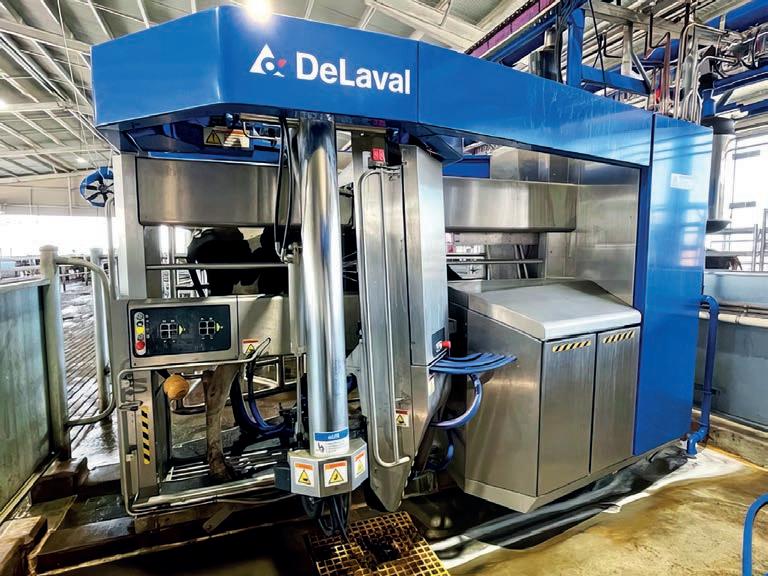
Images: Riverina Fresh.
Owner Paul Grinter (right) pictured with his son Tristan on their Muckatah farm.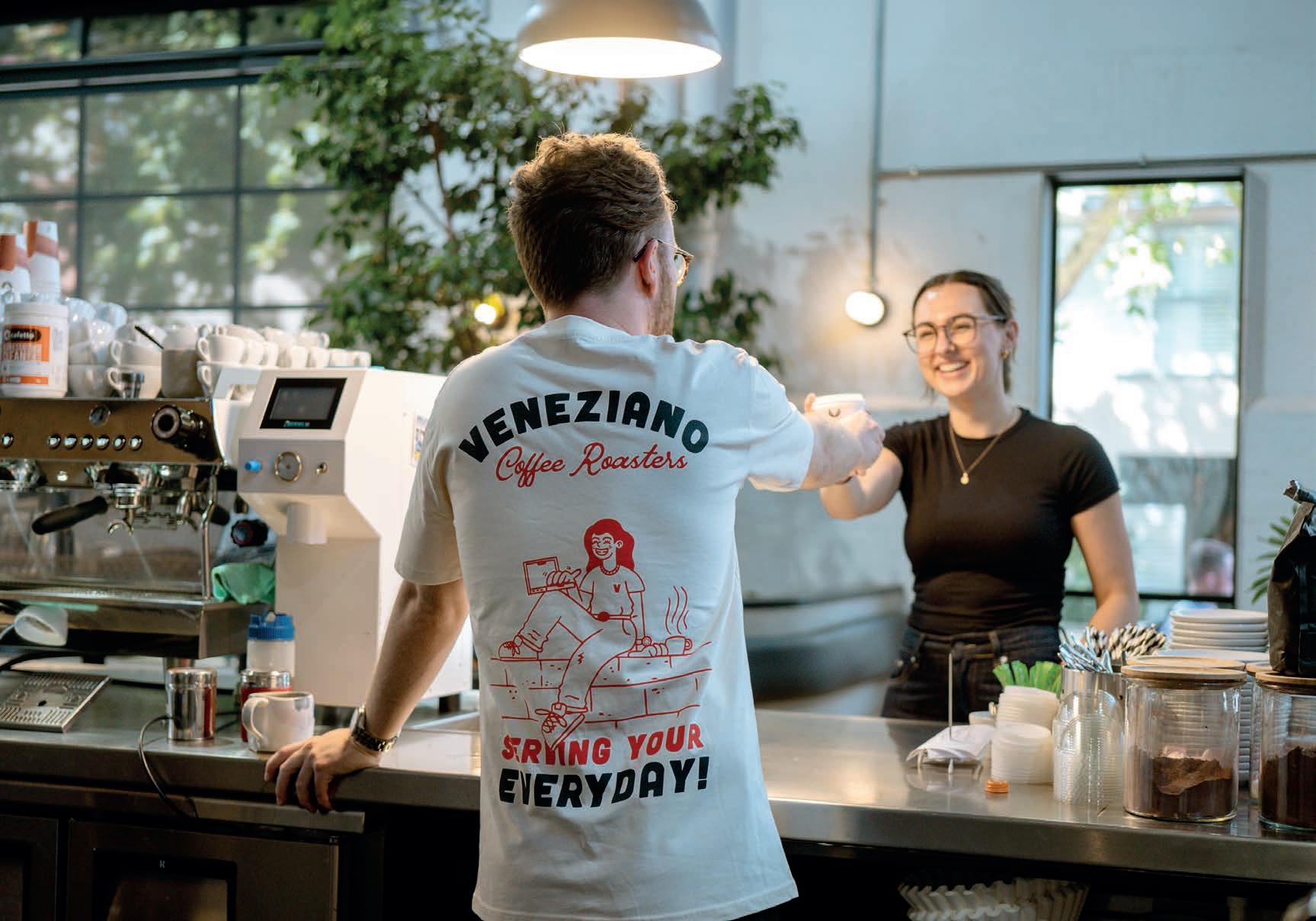
Veneziano Coffee Roasters shares its advice for cafés that want to remain profitable while facing current industry challenges.
Over the past four years, the coffee industry has proven just how adaptive and innovative businesses can be as they tackled obstacles such as COVID-19, staff shortages, inflation, and technical advancements.
Veneziano Coffee Roasters, owned by parent company Nomad Coffee Group, operates five flagship cafés across the country. Sales and Retail Manager Michael Taylor says this allows the roaster to have a keen insight into the challenges the café industry is currently experiencing.
“We’ve adapted our own venues to meet the trials of today’s market. This involves
looking at things like the way we roster staff, menu development, and pricing. We constantly monitor our cost of goods to ensure we’re maintaining profitability while still operating with the customer in mind,” he says.
Michael thinks one of the biggest challenges for cafés this year will be keeping up with cost pressures.
“Cafés aren’t generating margins like they used to. The price of goods, employment, and external factors like cost of living continue to rise, meaning businesses need to find new ways to pivot and reduce their expenses,” he says.
“Another test is fostering brand
awareness in today’s congested market. Even with a social media presence, you need to find ways to stand out, so when people are searching for somewhere to enjoy a great cup of coffee, they look to your brand.”
Despite these challenges, one business aspect Veneziano Coffee Roasters won’t sacrifice is its focus on sustainability.
“Although we’re always looking for ways to reduce costs, sustainability remains a key focus. Being a B Corp-certified company, we continue to embed sustainable culture into our every day. This includes long-term waste reduction strategies like partnering with social enterprise Reground to ensure our coffee grind waste is recycled,” Michael says.

Another brand under Nomad Coffee Group, New Zealand-based Flight Coffee, has seen its retail partners simplify their business models in a number of ways.
“This includes savvier staff rostering due to difficulty recruiting the right people. Café venues are also reducing their footprint, opting for smaller spaces for a more profitable model,” says Flight Coffee Creative Director and Founder Nick Clark.
“Café owners are streamlining their business to make it easier to operate, and for consumers to understand what they have on offer.”
Nick says it’s important for café owners to stay nimble to alleviate these issues.
“You need to be able to pivot easily depending on which way the market goes, while still maintaining your core focus and being able to execute it. You’ll see Flight Coffee implement some new, refined concepts this year that will better assist our wholesale accounts to provide a core coffee offering,” he says.
“During COVID-19, businesses actioned quick solutions to stay afloat. Now it’s about refining those solutions so cafés can survive long-term.”
What’s interesting, Michael says, is the hospitality industry continues to grow.
siblings Massimo and Romina, opened the café in 2019.
“My brother and I started working in our aunt’s café, Santucci’s, in the late 90s. We learnt a lot – everyone had to cook, make coffee, serve, and clean. That gave us confidence to open the second Santucci’s, followed by Son of Tucci and Mr Tucci,” says Fabian.
The café, which serves Veneziano Coffee Roasters’ Soar blend as its house roast, has undergone point of sales changes to accommodate the new wave of automation in the industry.
“One example is the adaptation of QR codes on tables to assist customers with ordering, while still maintaining a high level of service,” Fabian says.
“Yet, it was a great change. It helped our staff immensely, reducing their workload and freeing up their time to focus on other important aspects of the business such as staff training and interacting with customers.”
Fabian says customers are now looking for more value and have higher expectations for what they eat and drink. He says his café has had to adapt to this too.
“These days it’s considered a luxury to eat out. For us, that means creating a more
“We participate in team building activities like paint ball, bowling, and escape rooms. We also invite our customers to join the JoeFrank team in trivia nights once a month. It’s important that we develop a strong bond among staff and our community, as this is the foundation of a good business,” he says.
Flight Coffee’s Nick says he is focused on engaging with the end consumer to generate a more positive experience for customers.
“This is something we’ve done quite well in the retail space and want to replicate with our wholesale accounts. We’ve done some great work connecting with local communities in the past 12 months through café activations. Those small interactions go a long way and are something we’ll refine in New Zealand this year,” he says.
Veneziano Coffee Roasters’ Michael says the appetite for coffee quality and knowledge will continue to evolve, along with the call for retailers and café operators to respond with more impressive innovation, education, and a sensitive approach to sustainability.
“The fundamentals of business haven’t changed. The four Ps – product, price, place, and promotion – are still in place, it’s the way we achieve them that’s changing. Finding a way to stand out among
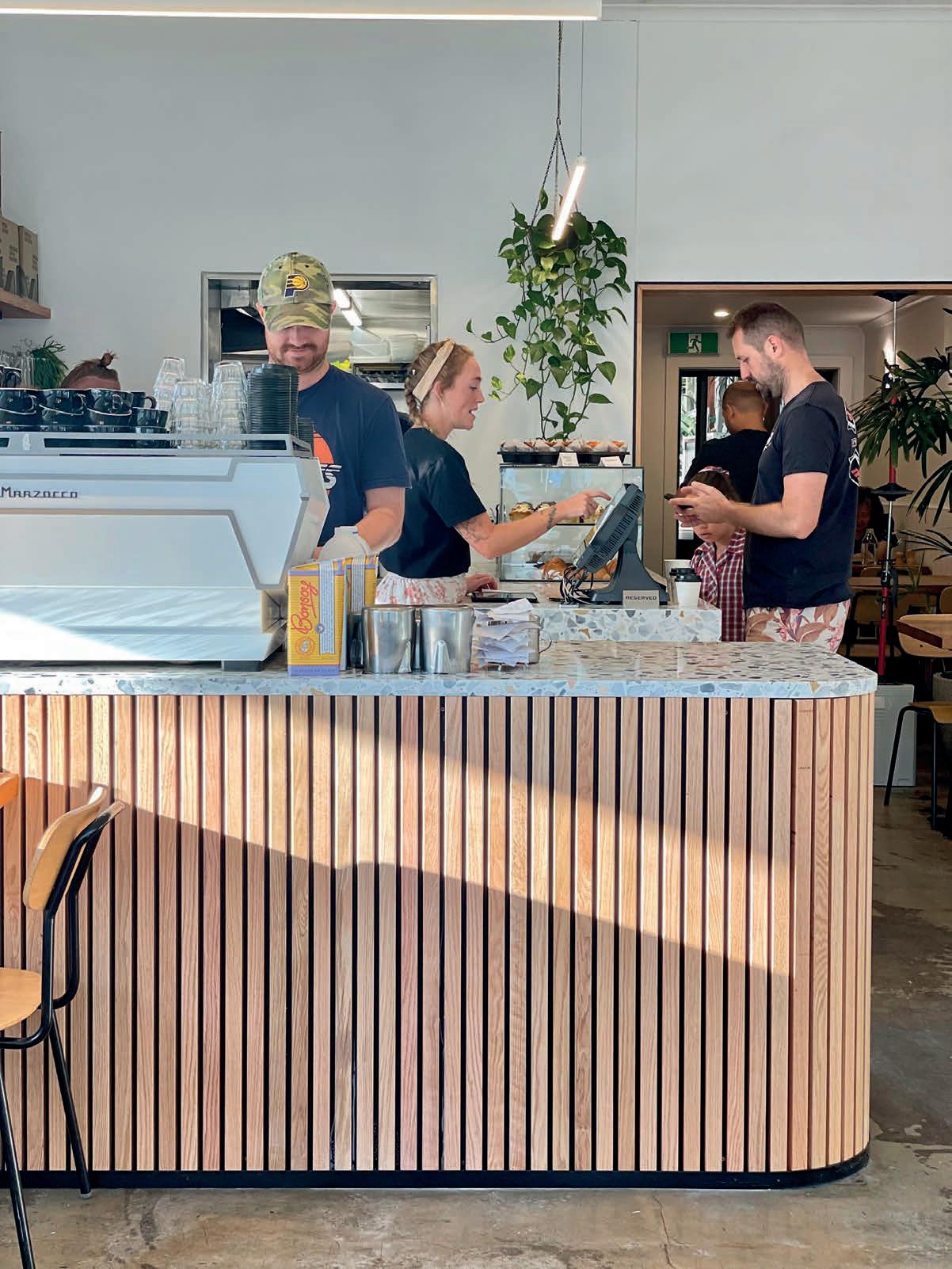
overcome every hurdle it faces and come out
JoeFrank Café serves Veneziano Coffee Roasters’ Soar blend. Image: JoeFrank Café.BeanScene every coffee shop should consider, and feature partner Tetra Pak explains how it works with businesses to find the right solutions beyond packaging and processing.
etra Pak has a proud and successful history in the dairy industry, providing sustainable processing and packaging solutions to preserve milk’s taste and texture. However, the milk landscape has come a long way, and Tetra Pak’s reach now extends to the dairy-alternatives market.
Helping its clients devise new drinks and products is a more recent part of the company’s remit, and its message to the dairy and dairy-alternative industry is clear: its services can cover the entire milk creation process.
This includes advising customers on sourcing the right milk, which ingredients should be added, what kind of messaging the milk or dairy-alternative beverage should display, and, finally, what kind of package it should be in.
“There’s still a strong belief in dairy milk,” says Tetra Pak Oceania Communications Manager Michael Grigg. “We’re still seeing definitive growth around the world in dairy products, and that’s on the back of consumers recognising the positive aspects it can have on their health.”
For the dairy-alternative industry, Michael says its ever-evolving popularity is hard to ignore.
“At the moment, soybeans, almonds, and oats are all well-known plant-based alternatives, but there are always interesting options entering the market, such as fava beans, potatoes and peas to name a few,” says Michael.
He says companies in the dairy alternatives space need to stand out from the crowd, and that’s where Tetra Pak can assist.
“When you partner with us, we’re giving you access to our global network, which includes state-of-the-art production and packaging options and expert advice on raw materials and distribution strategies,”

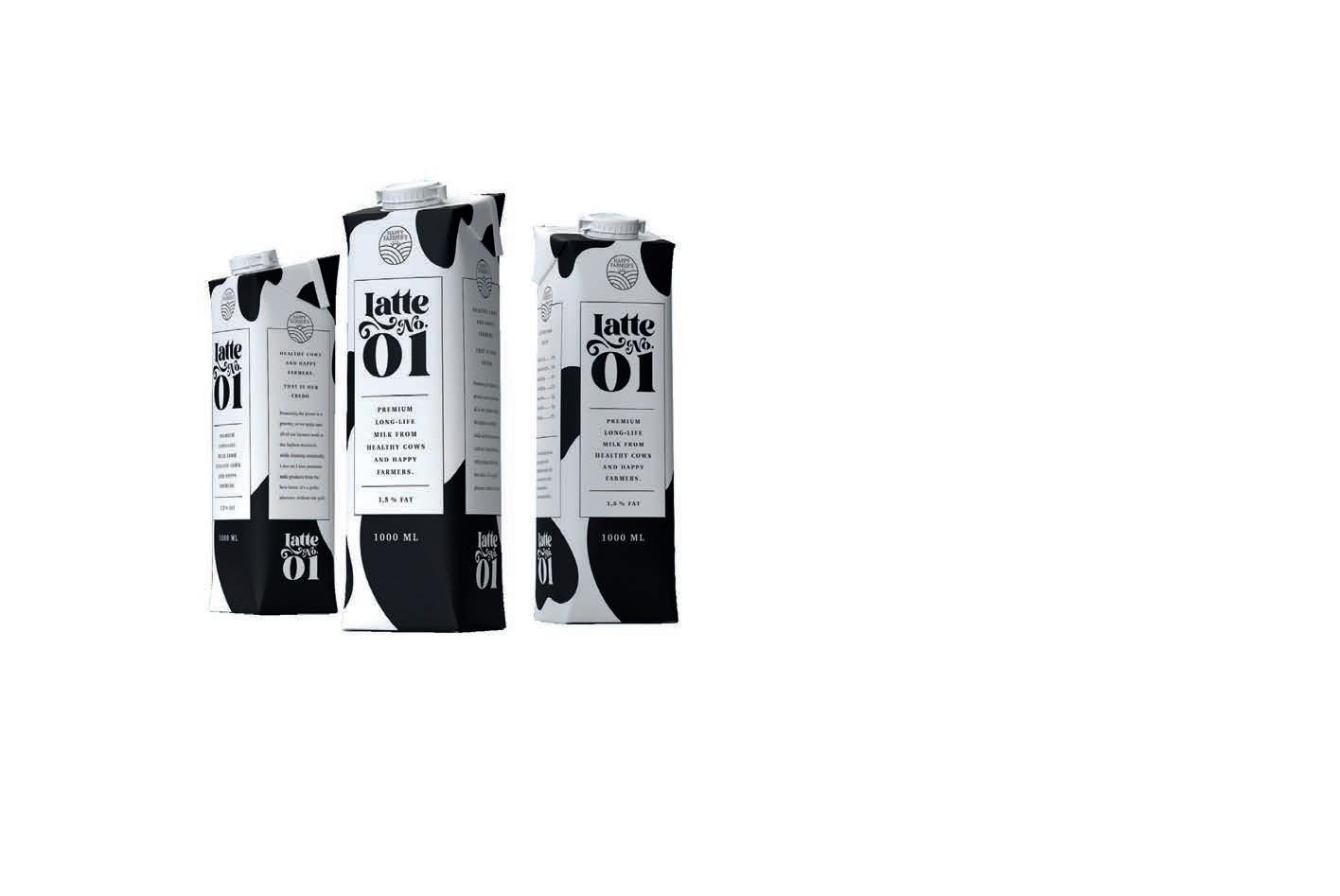
marketing services can help shape a business’ future, whether it’s an established brand or newcomer in the beverage space.
Brands may already know what they want to achieve, or they could be looking for a new direction. For both circumstances, Tetra Pak has developed Trendipedia, an encyclopedia of worldwide trends. It takes in factors that contribute to a trend’s popularity, including cost-of-living, shopping strategies, empowerment through diet, and how COVID-19 has changed consumption methods.
“We really see ourselves as a partner with
“We are ready to support your vision, and we work to innovate both with and for you,” Michael says. “Your most vivid ideas can be transformed into a realistic product.”
Michael says any customer in the dairy and dairy-alternative space is welcome to get started on the creation process with Tetra Pak.
“The best way to reach us is through our website’s contact page,” he says. “We always look forward to innovating new things together.”
For more information, visit tetrapak.com.au
It takes wholefoods to nourish whole humans. Since 1983, Bonsoy has been crafting premium-quality beverages packed with real food for real people. Whether it’s saying goodbye to lactose, or simply your health preference, Bonsoy is wholly made goodness. From soy and almond milk to its sparking coconut waters, Bonsoy is the golden halo of health. So, when you visit a café and see its boxes stacked high, or open a fridge to that welcome warm glow, you’ll experience a feeling of calm it likes to call “Bonjoy”.
For more information, visit bonsoy.com
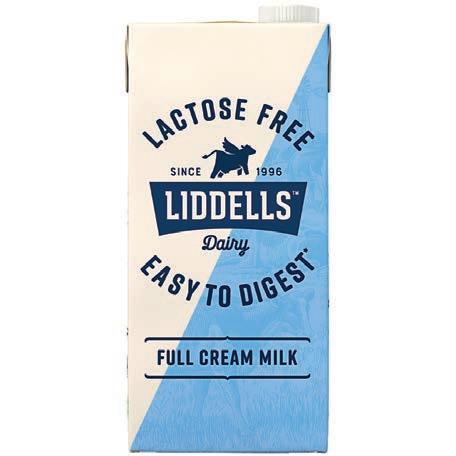

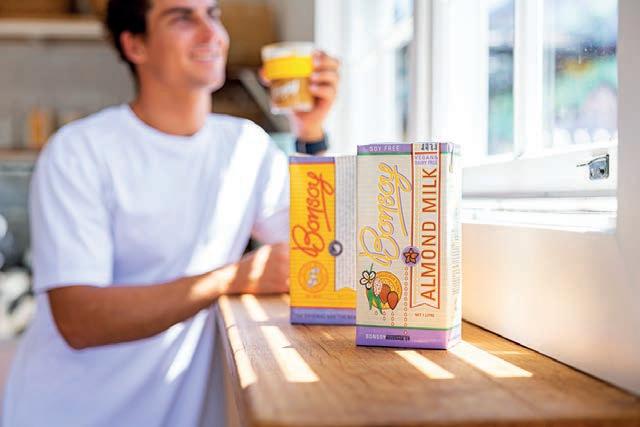
Preference for lactose free milk is on the rise, growing 17 per cent year on year*. Liddells gives Aussies the freedom to enjoy the delicious goodness of real dairy, without the lactose. Liddells sources real dairy from Aussie farms, and adds the lactase enzyme during processing to remove lactose so it’s easier to digest**. Liddells delicious range of milk will keep your customers’ tastebuds happy, while delivering all the nutrition from dairy. With Liddells lactose free, no lactose means no limits, so your customers can dairy on. And on and on.
For more information, visit liddells.com.au
*Circana MarketEdge Australia, national scan grocery, long life milk category, $ growth sales, Data MAT to 14/01/2024. ** If you love dairy but your digestive system doesn’t, Liddells lactose free is for you. This product should form part of a healthy diet containing a variety of foods.
Riverina Fresh is an independent, 100 per cent Australian-owned dairy manufacturer and foodservice distribution business based in the Riverina Region of New South Wales. Operating from the same site in Wagga Wagga for over a century, Riverina Fresh focuses on producing premium, innovative dairy products. Riverina Fresh milks are highly regarded by leading roasters and baristas for their taste, functional performance, and consistency.
Riverina Fresh has built a reputation as the milk of choice for specialty coffee by focusing on the science and art of delivering quality milk for coffee, understanding the key role of milk composition, the importance of on-farm practices, and the many other factors that influence the functionality of fresh milk with coffee.
Riverina Fresh Full Cream has a smooth, full-bodied flavour, delicious taste and mouthfeel, and is consistently used by Australia’s leading baristas at both National and World Barista Championships.
Riverina Fresh produces a range of milks, creams, and yogurts and distributes a full range of leading dairy and non-dairy products throughout New South Wales, Victoria and Australian Capital Territory to meet your café needs.
For more information, visit riverinafresh.com.au
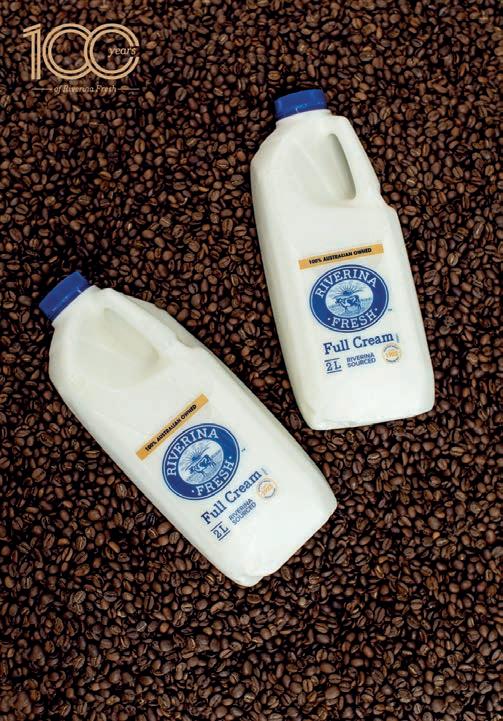
 Image:
Image:
MILKLAB Oat is a smooth and creamy alternative to dairy from the number one plant-based milk used by Australian cafés. Proudly made in Australia with 100 per cent Australian Oats, MILKLAB Oat has a mild oat flavour and no added sugar, delivering a natural subtle sweetness that complements the flavour of espresso coffee. Designed in true MILKLAB style in collaboration with baristas to texture, stretch, and pour with high performance, ask your barista for MILKLAB Oat.
For more information, visit milklabco.com/oat-milk
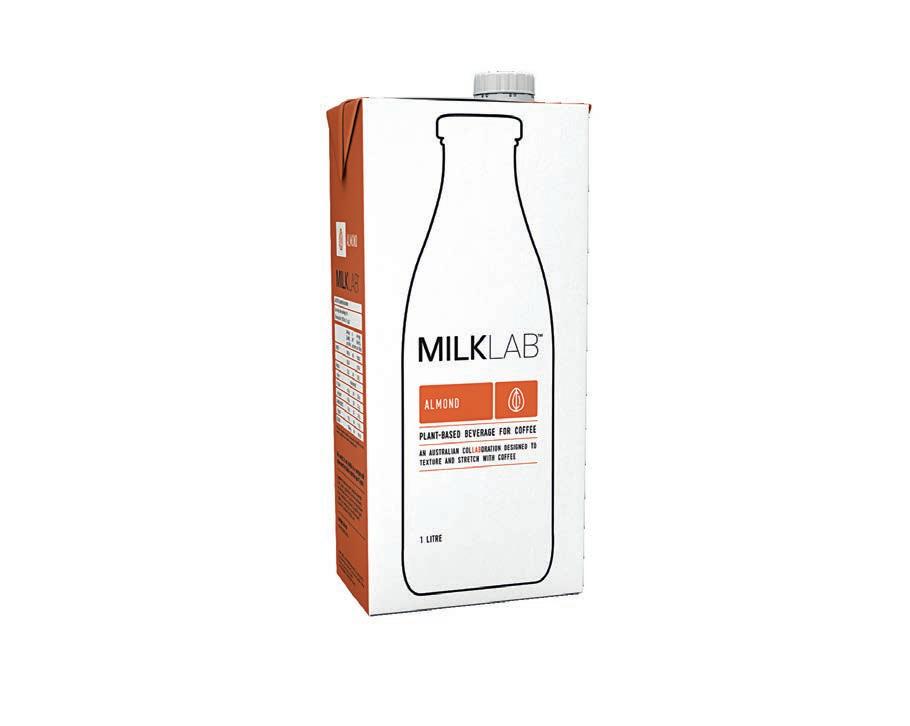


MILKLAB Almond is the number one Almond milk used in Australian cafés. Proudly made in Australia with 100 per cent Australian almonds, MILKLAB Almond has a mild, nutty flavour and a rich, creamy mouthfeel that perfectly complements the flavour of espresso coffee. Designed in collaboration with baristas and coffee professionals to texture, stretch and pour with high performance, ask your barista for MILKLAB Almond.
For more information, visit milklabco.com/almond-milk
Working side by side with the local barista community, The Alternative Dairy Co. has developed a plant-based barista milk range that delivers on performance and taste, as well as the best texture to highlight latte art.
According to 2023 Sanitarium Salesforce data, The Alternative’s Oat barista milk has quickly climbed to the number one spot for oat milk. With only five ingredients and Australian-grown oats, its oat milk is simple clean and delicious. Delivering a smooth and creamy experience in your cup, for locals like you.
For more information, visit altdairyco.com
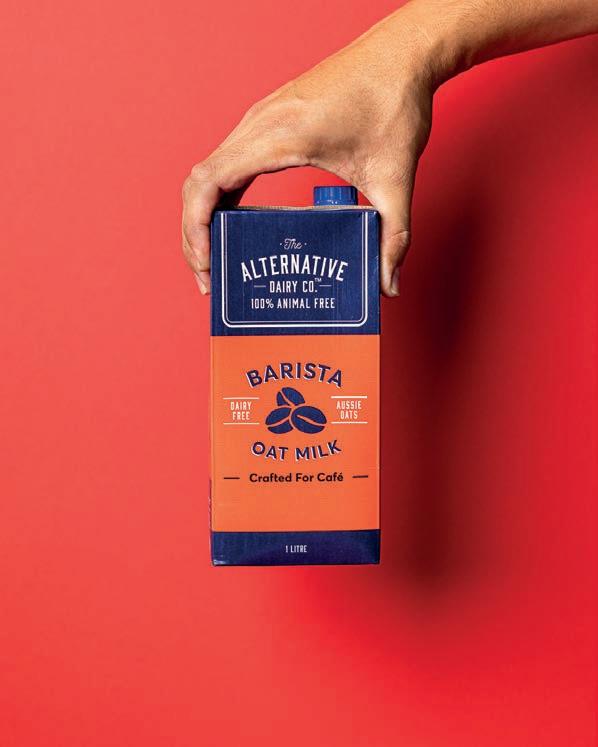 Image: MilkLab.
Image: AltDairyCo.
Image: MilkLab.
Image: AltDairyCo.
Vitasoy worked closely with one of Australia’s best baristas to achieve a rich, creamy mouthfeel and a round smooth finish in its Barista’s Choice Almond Milk, which is made from 100 per cent Australian-grown almonds.
“It has a smooth, decadent, and high-quality sweet almond finish that together with coffee creates a complete experience. It’s utterly delicious,” says Matthew Lewin, 2019 Australian Barista Champion.
For more information, visit vitasoy.com.au
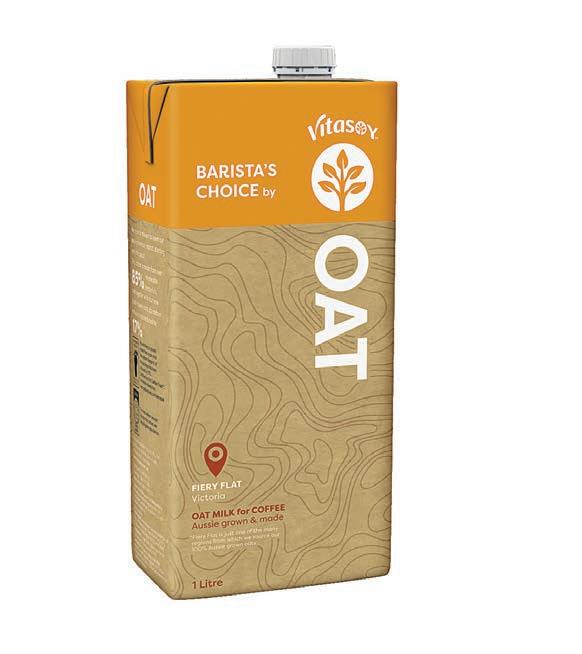
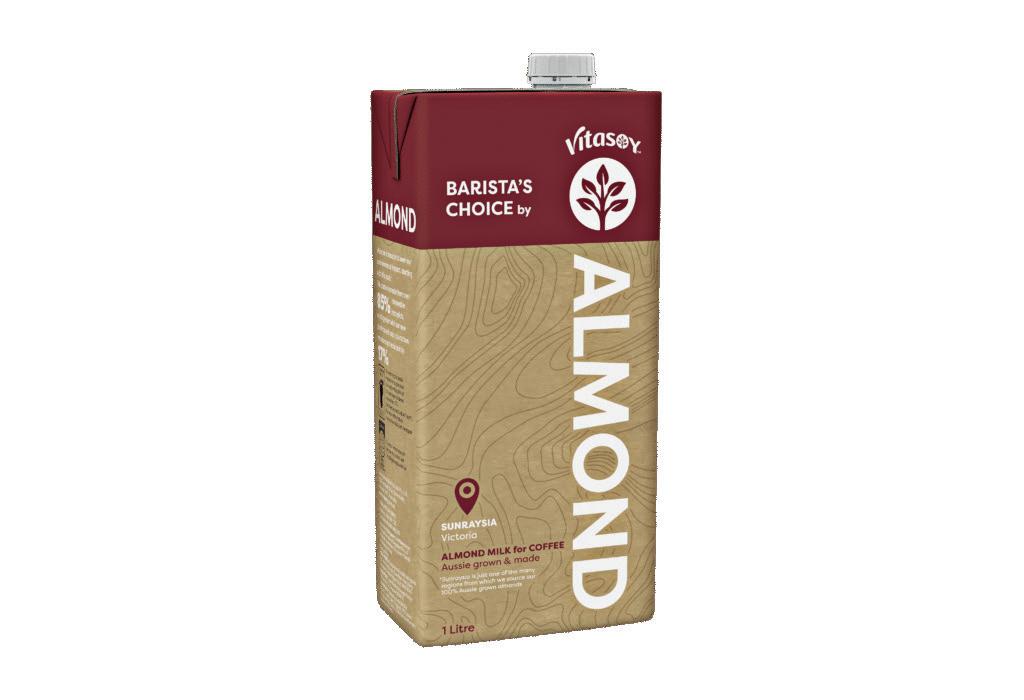
Barista’s Choice by Vitasoy Oat Milk has been specially formulated to deliver a perfect plant-based coffee. Made from 100 per cent Australian-grown whole oats, it has a mild and balanced flavour that lets the coffee speak for itself.
Vitasoy is on a mission to grow a better world. The Barista’s Choice range is packaged in cartons made from over 85 per cent renewable materials, and together with its plant-based caps, its carbon emissions are reduced by 17 per cent. It’s Aussiegrown, Aussie-made, and planet-friendly inside and out.
For more information, visit vitasoy.com.au

When it comes to being local, The Alternative Dairy Co. has got it covered. Australian-owned and lovingly crafted on the Central Coast of New South Wales, it constantly hones its ingredients and processes to deliver the best plant-based milk experience.
Delivering a subtle, creamy, and neutral taste, its Aussie-grown and made Barista Almond Milk delivers on performance as well as finding a great balance between flavours to deliver an incredible cup every time.
For more information, visit altdairyco.com Background image: Mama pig/Shutterstock.
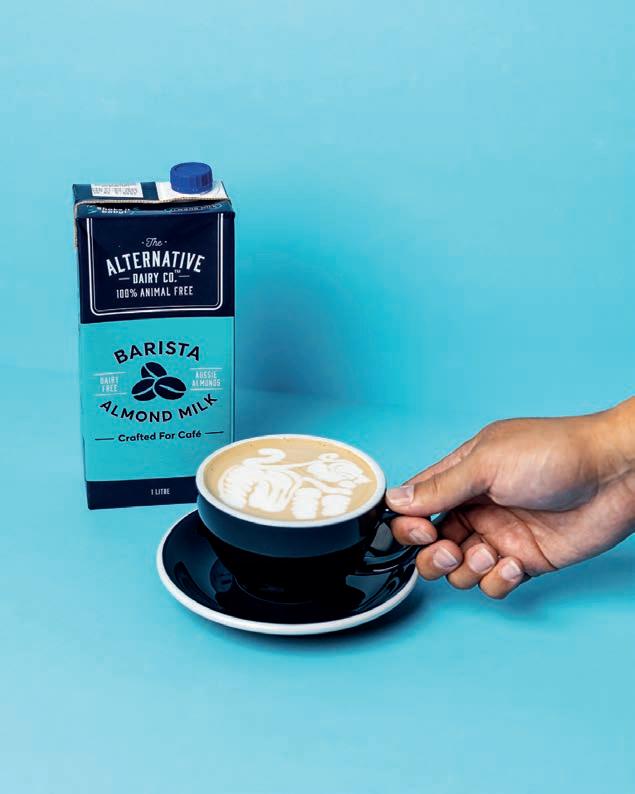

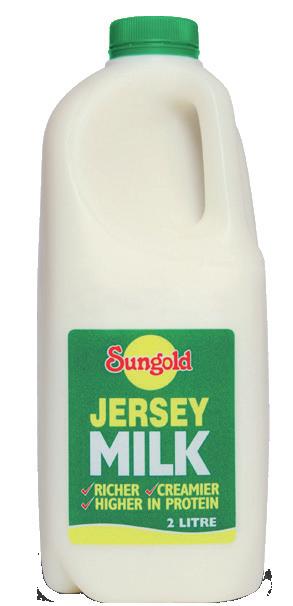
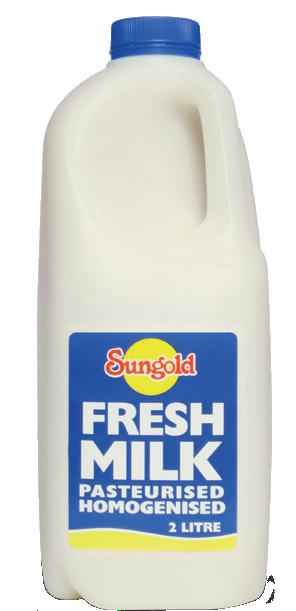
60 DEGREES CELCIUS. AERATE. EMULSIFY. TAP. SWIRL. POUR. BUT YOU ALREADY KNEW THAT.
Campos Coffee discusses the growth of specialty coffee in regional areas and how it helps local cafés source quality beans.
ampos Coffee Commercial Director John Ronchi says the quest for quality coffee is becoming a nationwide obsession, with the demand for a truly good brew now extending far beyond Australia’s urban centres.
“We’ve supplied cafés in regional areas for a long time, but COVID-19 and lockdowns saw a slew of people moving back to their local community and looking for good coffee closer to home,” he says. “Demand skyrocketed in regionals areas as consumers sought out the quality they were used to in the city.”
With an increasing number of cafés opening in regional towns, John says it is important to the Sydney-based roaster to supply high-quality coffee to as many areas of Australia as possible.
“We want everyone to enjoy their brew, no matter where they are. Thanks to things like cheaper rent and local loyalty, café owners are gravitating towards regional locations, and customers are following,” he says.
“Now some of our busiest accounts are in what you would consider rural places.”
One of those cafés is Twelvefold in Portland, Victoria. Owners Sophie and Charles Fredericks opened the café in November 2021, determined to serve a quality brew.
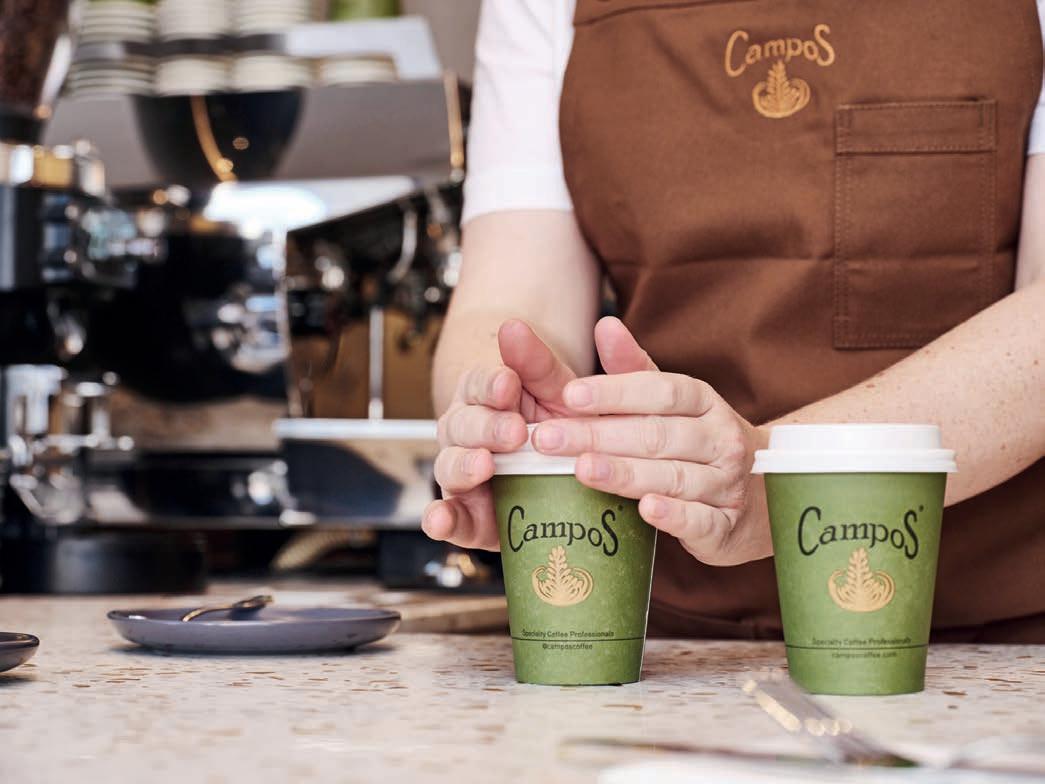
“We use the classic Campos Superior blend, which is a universal favourite – our customers love it. We also have Dark City blend as a second option, so there’s something to suit the taste of everyone in the community,” she says.
“We wanted to bring the Melbourne atmosphere to Portland by incorporating modern machinery and the city’s love for coffee. It’s clearly resonated with our customers because we easily sell over 80 kilograms of coffee each week.”
Sophie says Campos Coffee has supported Twelvefold from day one, providing the café with twin custom La Marzocco Linea Classic coffee machines, as well as the staff training to make the most of the coffee and kit.
“Campos is very accommodating of our needs. We’ve never gone without coffee; a Campos representative will drive down within the day to bring us product and make sure we uphold a high standard for our customers,” she says.
Another café owner that recognises the importance of quality coffee is 7 Beans Founder Kyle Bartlett. Kyle owns four 7 Beans locations in Victoria, with plans to open more stores in the future.
“I want a minimum of seven cafés, just because of the brand’s name,” he says.
Kyle thinks that while customers are drawn to each café’s rustic country vibe, it’s Campos Coffee’s Superior Blend that entices them to stay. He says the coffee’s sweet, butterscotch flavour profile perfectly reflects the bright-pink ‘life is too short for bad coffee’ neon sign behind the counter.
“We specialise in quality, consistent coffee. Campos ensures we’re one of the best cafés around,” he says.
According to Kyle, Campos Coffee not only supports him by providing high quality beans but also by supplying the La Marzocco Linea PB espresso machines and PuqPress automatic tampers for each of his cafés.
“They also offer on-call technicians to fix any issues that may occur with the
equipment, and have trained our staff to ensure everyone knows how to operate the machine. The best part about Campos is they have a big team that go above and beyond to ensure we always have specialty coffee,” he says.
Campos Coffee supplies coffee beans in its iconic green packaging to more than 700 cafés across the country, in-store at select Woolworths, and at its three flagship cafés along the east coast: Newtown, New South Wales; Newstead, Queensland; and South Yarra, Victoria. According to Campos Coffee’s John, the roaster’s reach is only going to extend further.
“Our mission is to help everyone love great coffee as much as we do, wherever they are, however they like it. We’re focused on supporting and growing our café network across the country and we’re really enjoying getting to know each community we connect with in the process,” says John.
For more information, visit camposcoffee.com
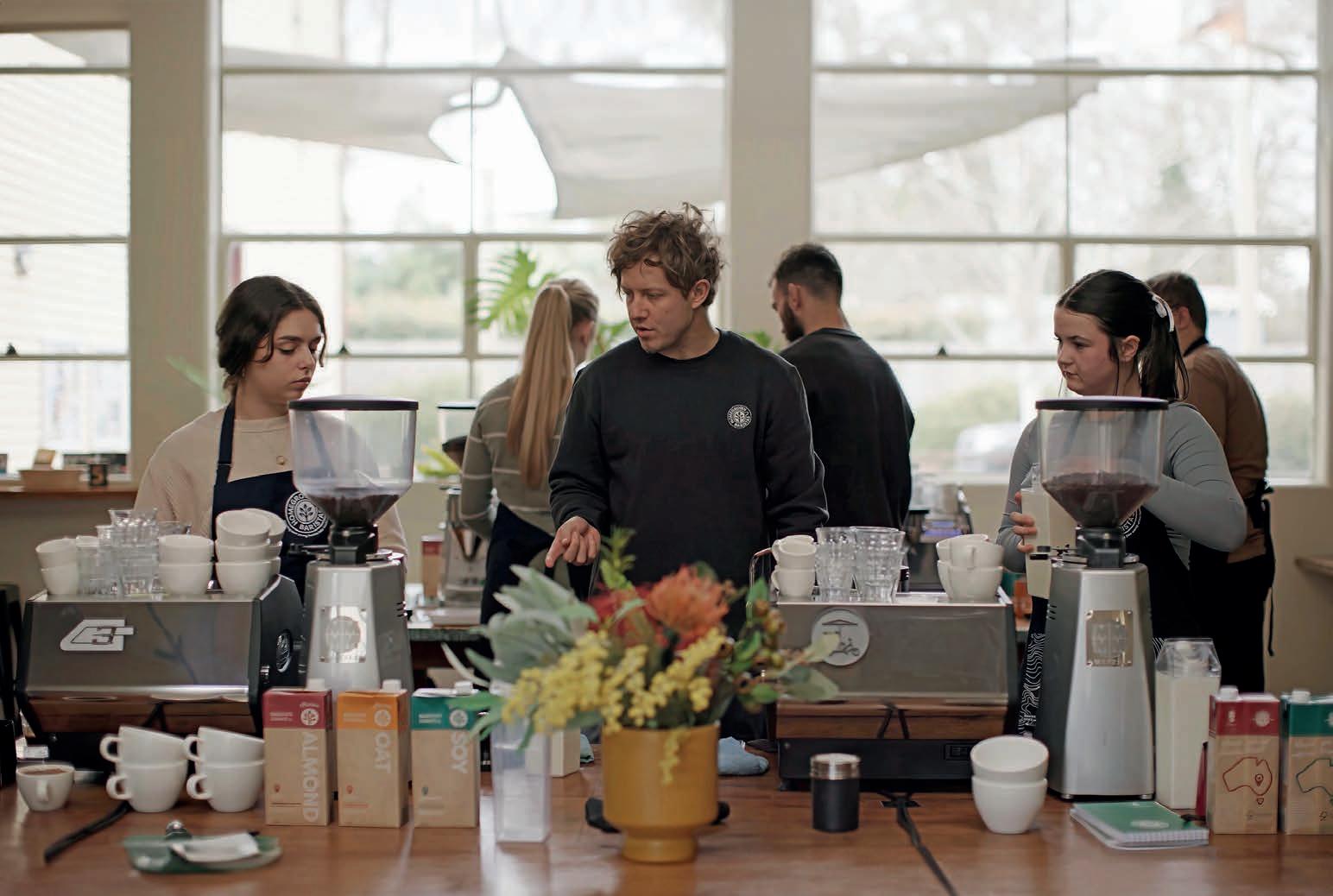
A pioneering project from Vitasoy is creating opportunities in the coffee industry for young people in rural areas.
ccording to the ‘What Will It Take?’ youth unemployment report 2021, young people are 2.5 times more likely than adults to be long-term unemployed. As a business based in the regional community of Albury-Wodonga, Vitasoy is acutely aware of the challenges faced by young people in remote and regional areas. This statistic inspired the dairy-alternative company to launch the Homegrown Baristas project with its ambassador and 2019 Australian Barista Champion Matthew Lewin.
“Vitasoy is a brand that wants to do good, so we put our heads together to come up with an initiative that would benefit young people in less-populated areas who might have fewer opportunities than their peers in the cities,” says Matthew.
“I’m a country boy and spend a lot of time in regional Victoria, so for me it’s important to give back to that community. I know cafés are the heart of all towns – big and small – and there’s an opening for country kids to feel a sense of purpose by working and contributing to their local communities.”
The Vitasoy team collaborated with Matthew to mastermind a barista school project that teaches students everything they need to know about crafting great coffee. They piloted the initiative in autumn 2023, working with CafeSmart, an initiative supporting charities that provide grassroots community and homelessness services across Australia, to connect them with Phoenix Community College in Victoria.
“Our first year was very much about setting a strong foundation and framework for the project,” explains Matthew.
“We worked with four students, Ashley, Charlie, Blake, and Bree, aged 16 to 17 who joined us for a week of intense barista training. We were keen to engage young people who were nearing the end of their time at school because this is a prime period in their lives to soak up essential transferable skills.”
The team took over an existing café close to the school and modified it to create a MasterChef-style setup, in which each student had a workstation complete with espresso machine, grinder, all the tools you’d find in a café, and, of course, the full
range of Vitasoy’s Australian grown and made Barista’s Choice dairy alternatives.
Matthew and the Vitasoy team devised a five-day schedule, designed to build transferable skills from the ground up, and equip the students with the fundamentals to craft coffee at a very high level.
“On day one we started with foundations, such as machine components and café setup, and by the end of the day they were already pouring basic patterns,” says Matthew.
“From day two to four we built on these skills, progressing to diverse latte art design, preparing different types of coffee, workflow, resume writing, and interview preparation.”
The final day saw Matthew guide the students through what they had learnt and how to transfer it to the real world. Empowering the students with the knowledge and means to implement these practical skills in a work setting and provide a clear pathway into secure employment was particularly important to the Vitasoy team.
“They were ready to take the challenge head on and we felt incredibly proud of

what they’d achieved. We also invited their friends, family, and the local community to come and see what they’d learnt. It was complete graduation day,” says Matthew.
As this was the first time they’d run the barista school, Matthew and the Vitasoy team were unsure how the students might cope under the pressure of training with an Australian Barista Champion.
“All the students started out with pretty much zero experience. Naturally they were nervous, and any one of them could have buckled under the pressure, but they were so confident, enthusiastic, and eager to learn from the get-go. What they achieved in the space of one week was relatively remarkable,” says Matthew.
The Vitasoy team returned to the school a couple of months on to assess the progression. Matthew says the most recognisable improvements were in their confidence and the community’s studentrun coffee van.
“It was so fulfilling to see their skills in full flight and translated into the real world. The standard of the coffee served from the van had improved so much. It had even become more profitable,” says Matthew.
“They all said the experience of taking part in the project had a profound impact on them, and that they would never look at coffee in the same way.”
The week was documented by a film crew which followed the students on their
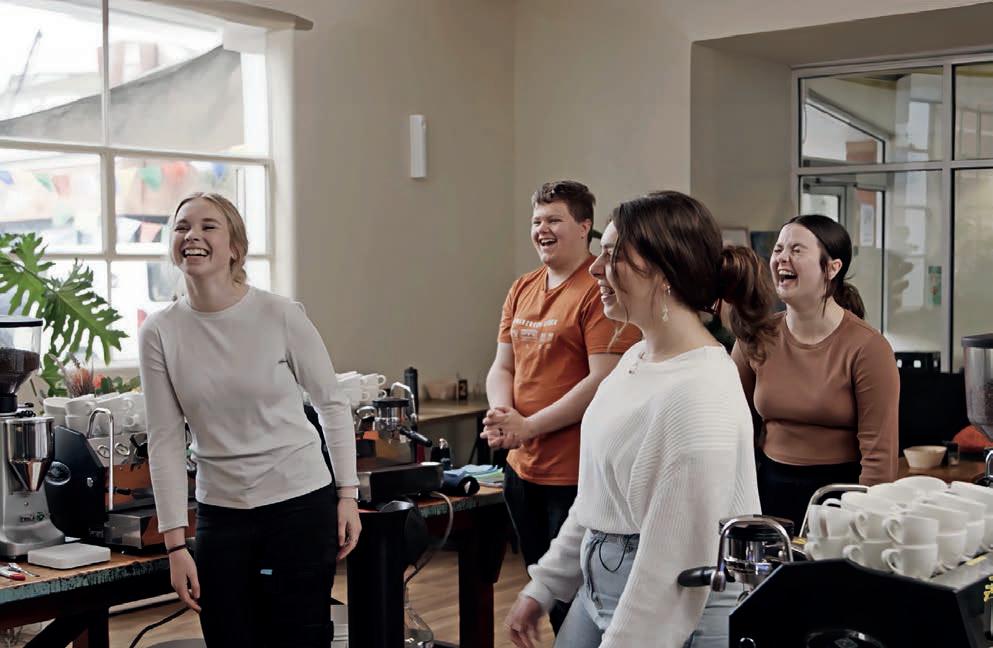
journey through barista school. The mini documentary will be available to watch across digital platforms this April.
Following the success of the first year of the Homegrown Baristas project, Vitasoy is already planning the 2024 incarnation and has its sight set on scaling up the project with the help of some key partners.
“We’re looking forward to partnering with CafeSmart again as their reach and connection to the communities we can impact is essential. Vitasoy has been a supporter of CafeSmart’s annual event, in which hundreds of roasters, cafés, and coffee lovers across the country fund raise for local homeless charities, for the past seven years, and we will continue to work with the team to recruit participants for the Homegrown
Baristas project,” says Matthew.
“This year we’re also looking to collaborate with a range of industry partners and are in talks with some key players who can help us expand the project to more young people in regional areas.”
Vitasoy views the project as a “closedloop pathway”, which will see Homegrown Baristas graduates not only garner practical skills for employment but also benefit from the long-term support of the project.
“We wrapped up the first year feeling we’d done something really powerful, and we can’t wait to share it with others. Watch this space for the next instalment.”
For more information, visit vitasoy.com.au/ homegrownbaristas
Vitasoy dairy alternative products were used in the Homegrown Baristas course.
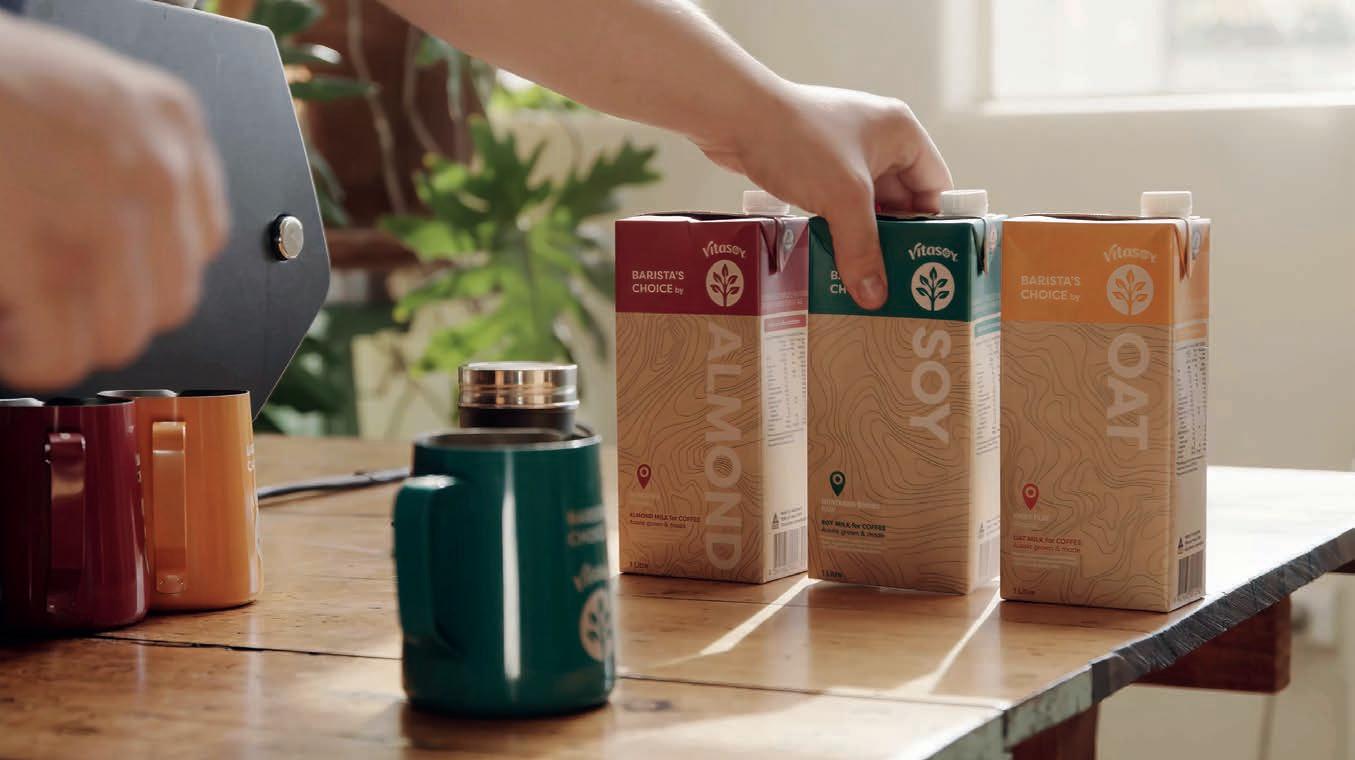
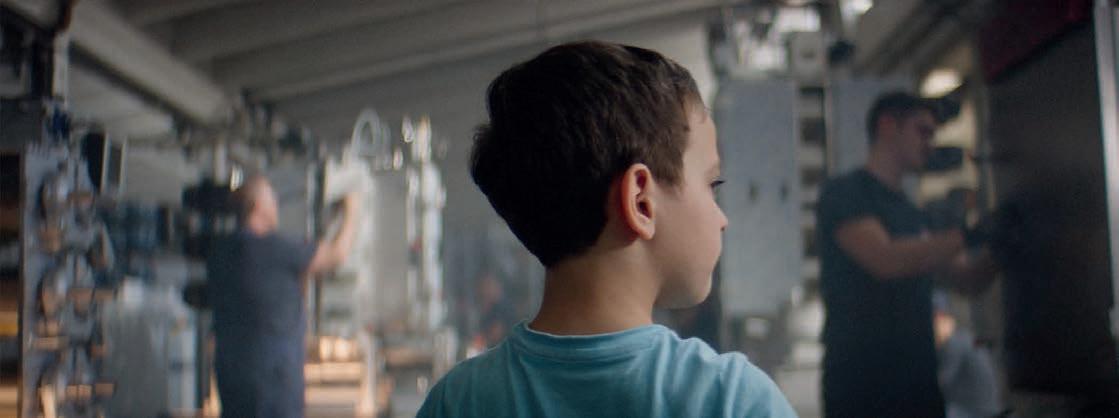
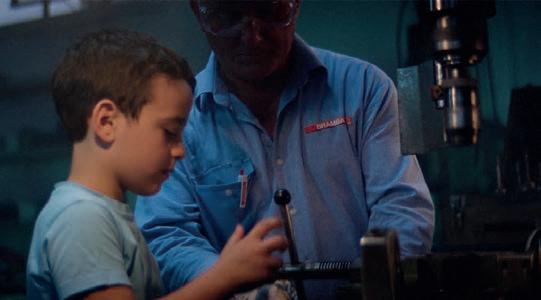
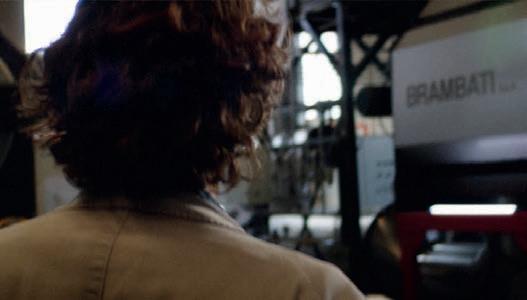

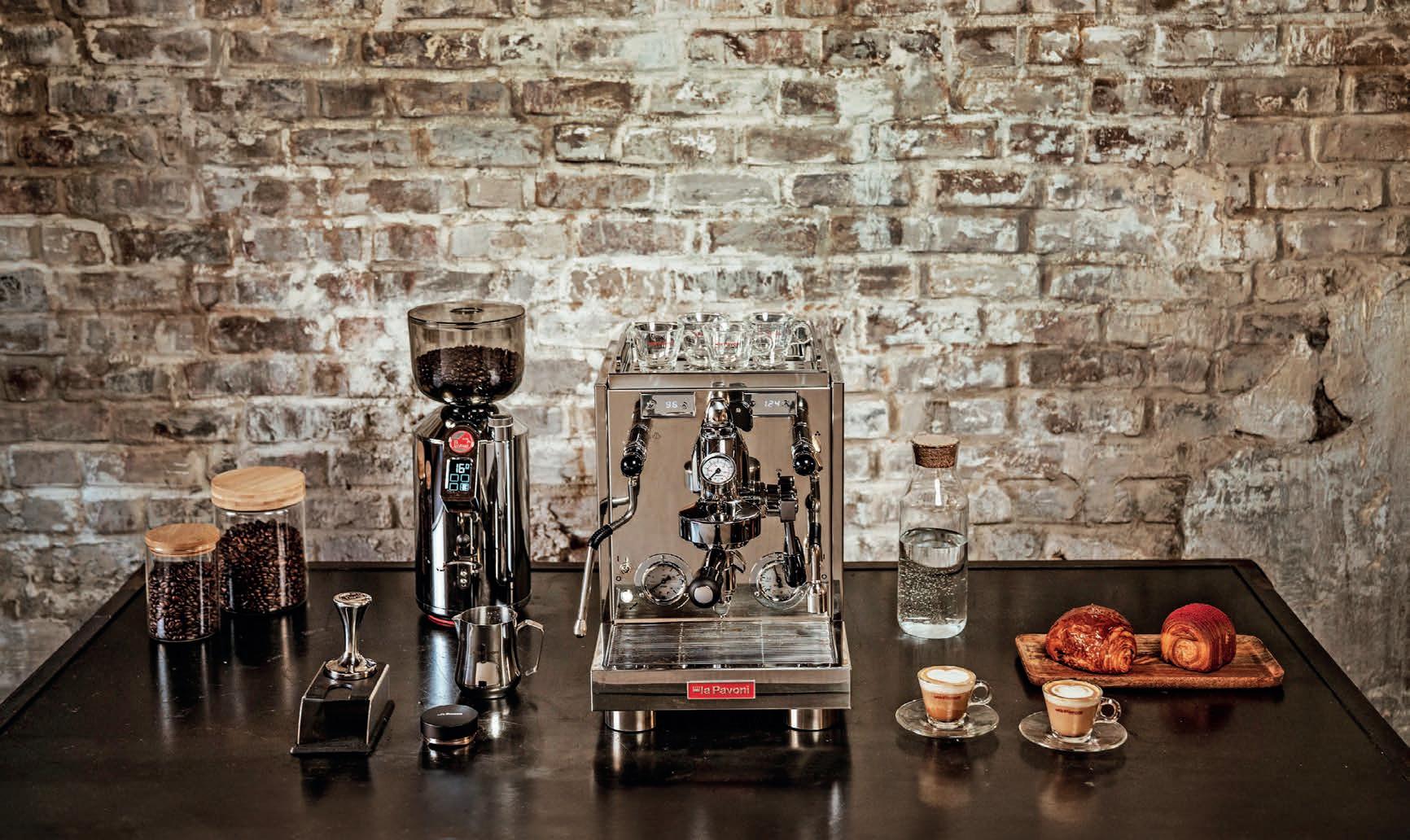
La Pavoni explains how it upgraded its Botticelli domestic range by taking on board customer feedback and striving to create high-quality espresso machines. A work of art
he La Pavoni brand has almost 120 years of coffee machine manufacturing history. Just like the Early Renaissance painter Sandro Botticelli from Italy who strived for perfection, La Pavoni continues to refine its work to make a great machine even better.
“We wanted to ensure our customers were receiving La Pavoni machines in perfect working order, so we took on board feedback from our service and retail network, and upgraded the packaging, materials and components to withstand the freight journey from Italy,” says Smeg Australia’s General Manager of the Professional Division, Leon Wolf.
Those improvements include a new proportional integral derivative (PID) temperature control, wider feet, and a magnetic drip tray — to name a few.
“The Botticelli dual boiler machine has always been the star of our product line. It allows for better temperature stability thanks to its dedicated and independent boilers and PID control,” says La Pavoni National Sales Manager Tom Douch.
“We’ve kept the brewing pressure profiling control (BPPC) system on the Botticelli Specialty model, equipped with competition shower screen and filters on the group head. During coffee brewing, the water pressure on the coffee puck can be adjusted with the BPPC mechanism, obtaining the best result in the cup. It has a full commercial rotary pump, and the option of direct water connection or water tank supply.”
Tom says La Pavoni has also updated the toggle (lever) controls of the Botticelli Specialty machine for improved workflow.
“The power you get immediately from the steam wand is incredible. The PID controls now have a metallic gloss finish, which complements the stainless-steel exterior,” he says. “The drip trays had rubber seals originally, which we’ve replaced with magnetic guidance. This ensures a perfect fit every time and that the water goes exactly where it’s supposed to.
“We’ve also increased the diameter of the feet of the machine, with larger O-ring gaskets for stability and to prevent vibration.”
These changes have been implemented into La Pavoni’s complete domestic range, including the Cellini Evoluzione, Cellini Mini, and Cellini Classic.
In response to market colour trends, the
Cellini domestic range is now available in both stainless steel and matte black.
“We’ve changed the colour of the logo to match the matte-black finish. This completely transforms the look of the machine and the way it stands out on the benchtop,” Tom says.
“At the factory, we’ve invested in a larger quality-control team to ensure our machine manufacturing is of the highest standard. I have a lot of confidence in the internal machine upgrades and the packaging.”
Leon says the new packaging is completely recyclable and in line with the Australian Packaging Covenant Organisation standards.
“We’ve moved to a full cardboard solution which can absorb more impact to avoid any damage to the machines,” he says. “It’s a win-win: the machine will last longer thanks to the improved components, and the packaging is sustainable.”
Leon says these improvements to La Pavoni’s domestic range are designed to inspire renewed confidence in the brand and the products themselves.
“We’ve absorbed a lot of the cost of updating these machines to maintain the
same price point. Consumers who were looking at an original Botticelli model can have the confidence they’re getting an upgrade for the same amount,” he says.
“We want these changes to show that we’re committed to supplying quality products in short periods of time.”
Driven by continuous growth and innovation, in February 2024 La Pavoni’s Sydney head office moved to new administration and warehouse facilities.
“Our warehousing operations have moved to a larger, purpose-built facility in Ingleburn, while administration staff have moved to The Woolstores, a restored, heritage-listed space in the heart of Alexandria,” Leon says.
The office space includes an in-house café and a purpose-built showroom to display a wide range of La Pavoni coffee machines.
“These new facilities are an exciting development which will expand our capabilities and mark a significant milestone,” says Leon.
For more information, visit au.lapavoni.com
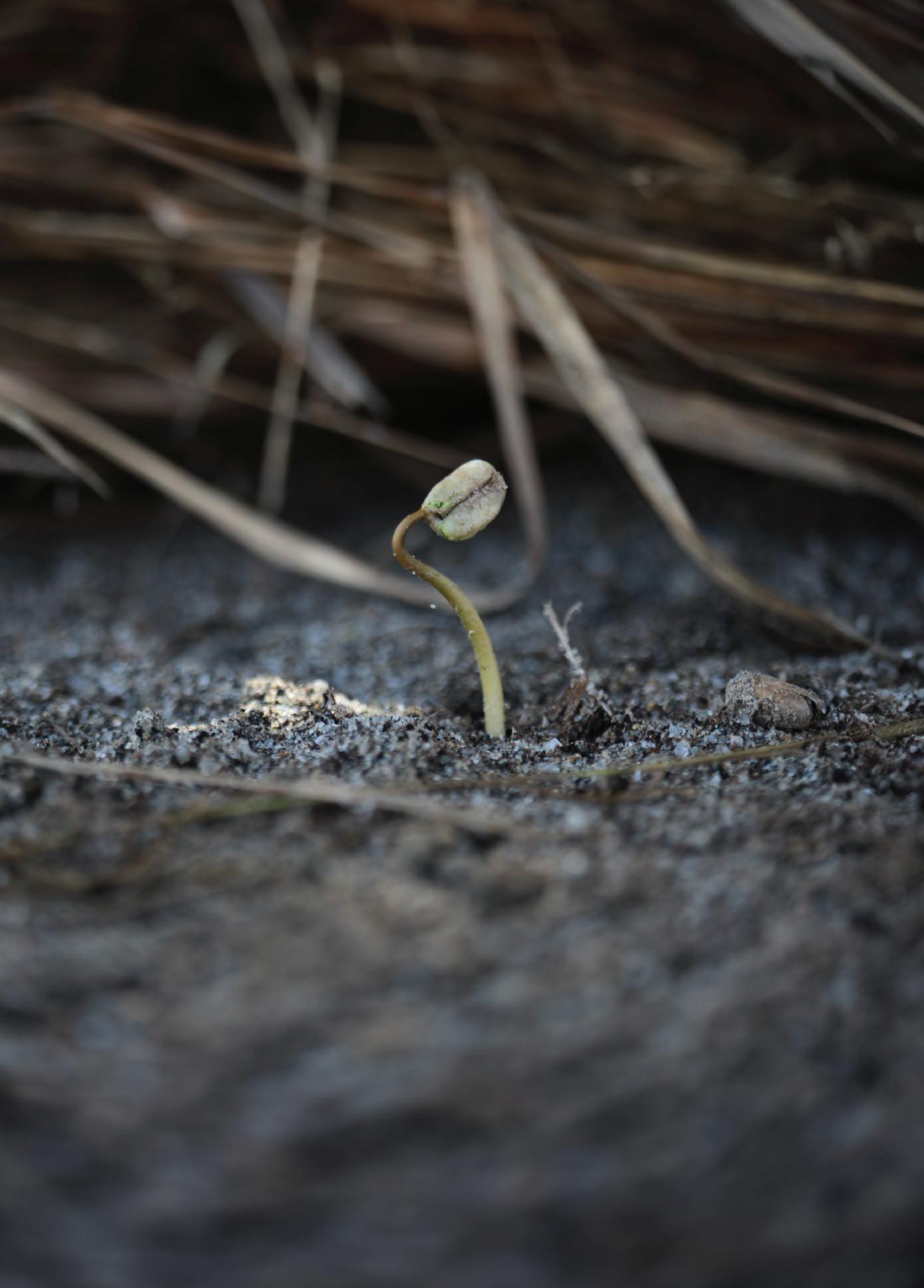

are
to
hether you’re going hiking, camping, or staying in a hotel, Coffee Tools Distributing Director Curtis Arnold believes Wacaco’s hand-powered portable coffee makers are the perfect tools to prepare espresso – anytime, anywhere.
“I’ve worked with Wacaco since 2013 when it first launched the Minipresso. It’s been amazing to see the brand expand and come into its own,” says Curtis.
With its user-friendly design and compact size, Curtis says the Minipresso line, which produces 50 millimetres of coffee per use, is the ideal entry-level espresso maker. For those who prefer capsule coffee, there’s the Nespressocompatible Minipresso NS as well as the newer, redesigned Minipresso NS2.
“The advantage of brewing with a capsule is the coffee is already ground, measured, tampered, and then sealed in a condensed hermetic package. There is very little room for error, so your espresso tastes great cup after cup. Capsules are also more convenient if you’re on the move as there’s less mess,” Curtis says.
Wacaco also recently introduced the Minipresso GR2, a more compact and lightweight version of the original groundcoffee model. The Minipresso’s sister product, the Nanopresso, is built with a patented pumping system and requires 15 per cent less force to pump compared to previous models.
To satisfy professional baristas, the Picopresso is another ground coffee option, designed specifically for expert coffee makers.
“The Picopresso features a naked portafilter and a 52-millimetre stainless steel filter basket which can hold 18 grams of ground coffee,” says Curtis. “It’s light and durable. The Picopresso produces an amazing café-quality espresso once the user has learned proper puck preparation and mastered how to dial in the grind.”
As well as Wacaco’s core range of products, Coffee Tools Distributing also supplies the brand’s newly released accessories. These include the Picopresso Gauge, a pressure meter which monitors and controls the pressure during each extraction, the Picopresso Stand, made up of four easily dismountable parts to provide a sturdy base for brewing, and custom-
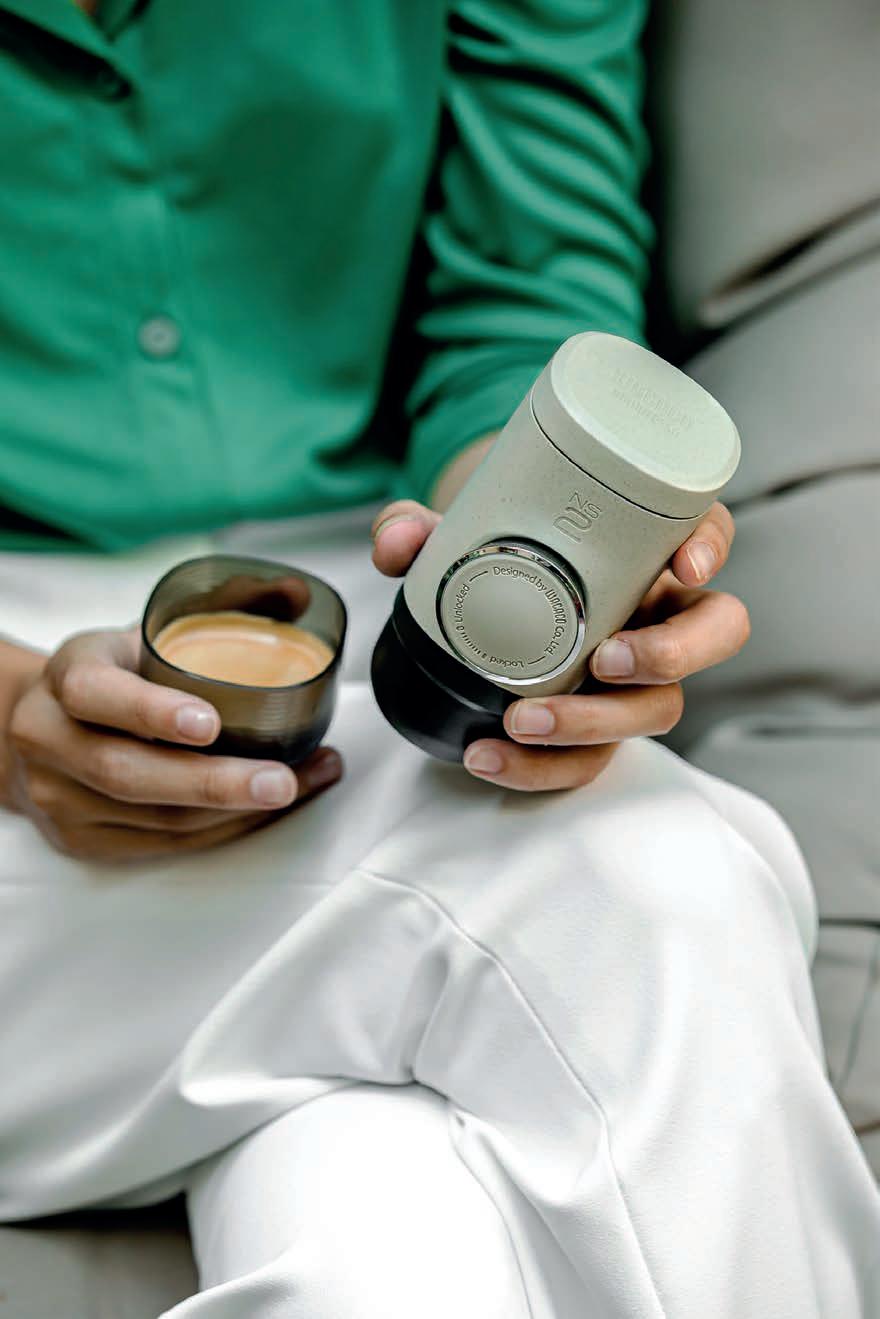
coloured protective sleeves for insulation.
“The new additions are a testament to the brand’s ability to adapt to its customers’ needs. To watch them evolve from a single model to about 15 genuinely great products is amazing,” Curtis says.
“I always travel with my Picopresso and it’s very easy to use. The same can be said for the Exagrind manual coffee grinder and recently added Exagram Pro coffee scale. Their workflow and quality are fantastic. It’s hard to believe something that compact and portable can produce such a nice cup of coffee.”
Along with consistent quality and portability, Curtis says Wacaco’s products are suited to consumers on a budget.
“If you aren’t ready to spend $1000 on a good espresso machine, you can buy the Exagrind, Exagram, and Picopresso for considerably less and produce great espresso just about anywhere. And you don’t need batteries or mains power – just hot water and your hands,” he says.
Wacaco prides itself on delivering innovative and versatile kit, which is one of
the reasons Coffee Tools Distributing was so keen to support the brand in Australia.
“All of its products are fantastic. If there’s ever an issue with any Wacaco product, we’re right there to take care of the problem. We ensure the brand is well represented so customers can buy with confidence,” Curtis says.
Coffee Tools Distributing will exhibit at the Melbourne International Coffee Expo (MICE) and present its full range of Wacaco products. It will also showcase other best-selling brands such as Grosche, Subminimal and the new xBloom automated pour-over machine.
“We love exhibiting at MICE. We always bring a really exciting product to promote, and this year will be no different,” Curtis says.
“I have a positive outlook on the year ahead. Things are going well, we have a great range of products to talk about, and we can’t wait for Australia to work with whatever Wacaco release next.”
For more information, visit coffeetools.supply
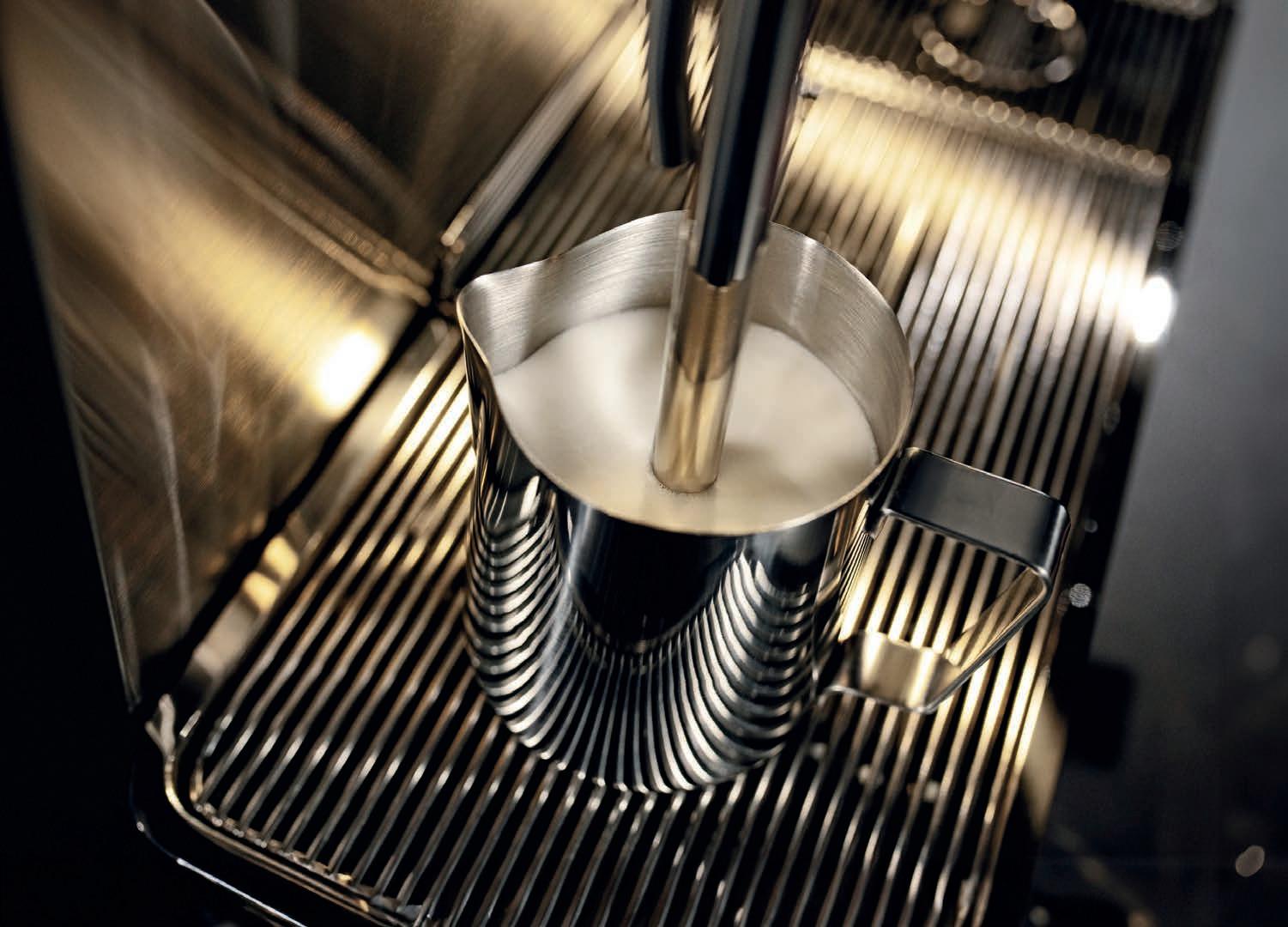
MF’s machines have catered to the requirements of dairy milk for decades, but this doesn’t mean the company hasn’t kept up to date with innovations in the dairy alternative industry.
The German coffee machine manufacturer constantly focuses on future trends and how it can adapt and improve its machines. Axel Fähnle, Head of Global Marketing for GBU Professional Coffee
Machines at WMF GmbH, says WMF recognised early on that milk research needs to be a priority.
“In the early 1990s, our fully automatic coffee machines were among the first capable of producing high-quality milk foam, especially when using the WMF Bistro model,” he says. “Since then, a lot has happened in the world of international coffee specialties, so our job now is to reflect these developments in our machines and make them accessible for every user.”
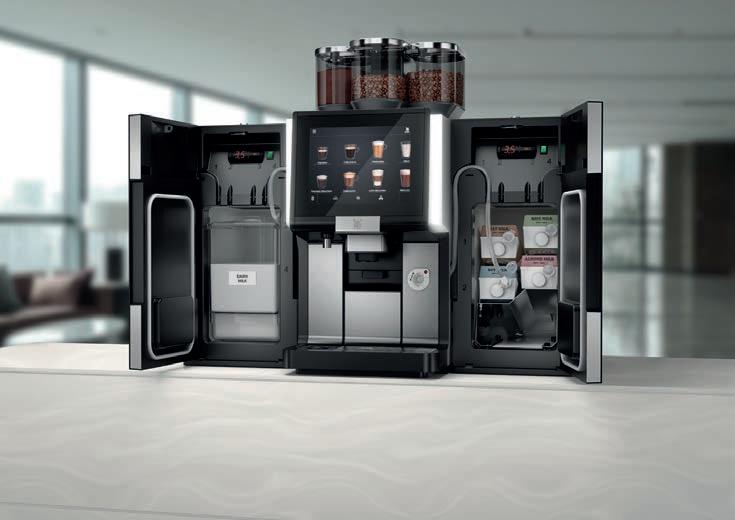
Axel believes there is one trend that has specifically shifted coffee culture in the industry.
“Plant-based milk alternatives are fuelling a new freedom in the creation and preparation of coffee specialties,” he says. “Vegan coffee beverages are no longer considered alternative drinks but are becoming their own new category.”
Axel says the popularity of plant-based milk alternatives continues to impact coffee consumption habits, and will evolve as an independent beverage category.
“It’s changing the way the world drinks coffee, and our customers – such as big café chains, petrol stations, hotels, and catering companies – must address it,” he says.
Axel credits the United States, China, and Australia as pioneers of the alternative dairy movement.
“China in particular is an important driver of new trends,” he says. “The focus there is not on reinventing the cappuccino, but on constantly coming up with new creations made from milk, milk alternatives, and countless other ingredients such as syrups, toppings, colours, and every conceivable form of sweetness.”
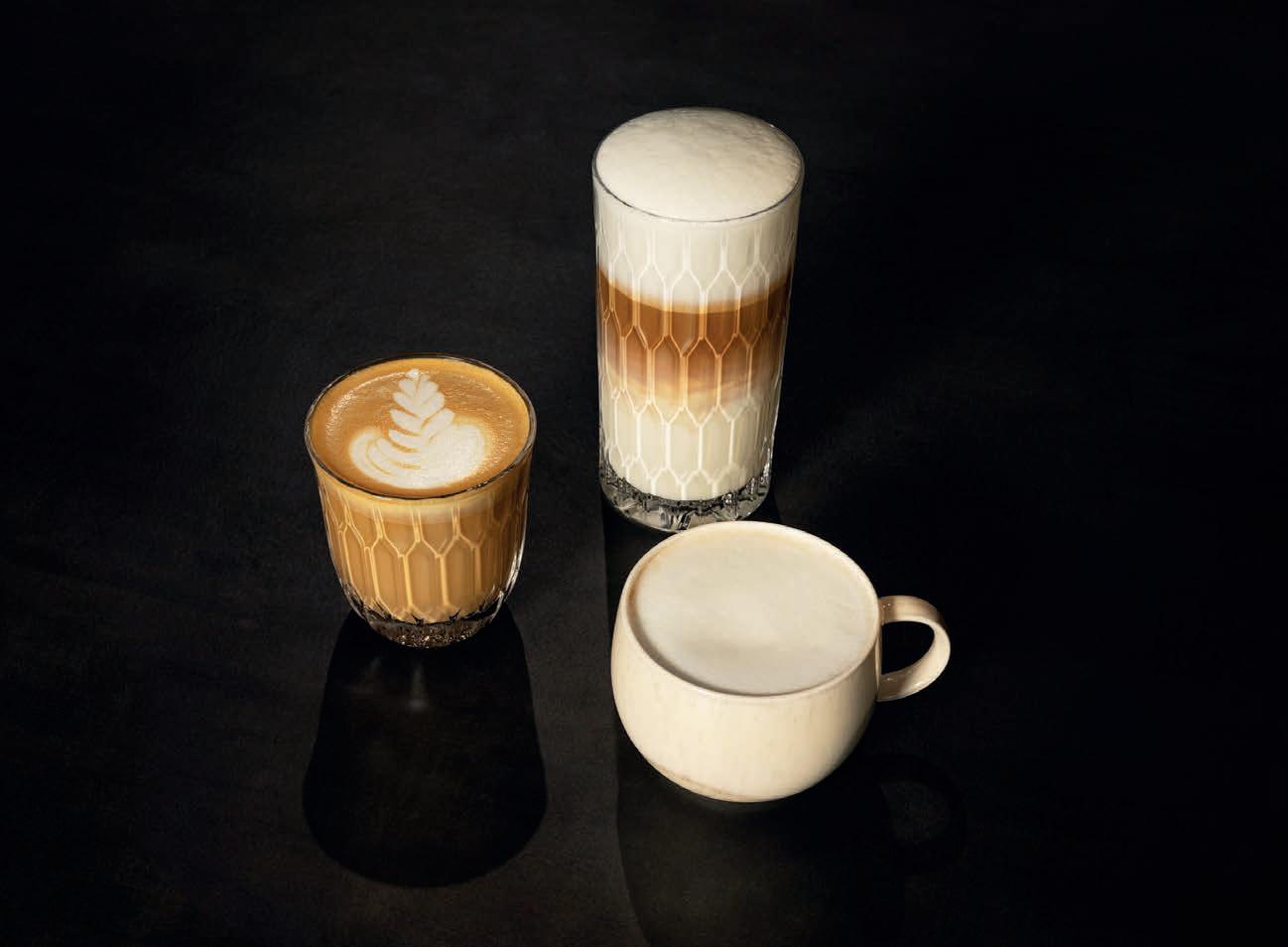

He says this is a stark contrast to Australia, where coffee is consumed in a less “colourful” way.
“The quality of the coffee shops [in Australia] set an international benchmark, which is why many large operators are testing new coffee concepts in the country,” Axel says. “Many innovative customer requirements originate from Australia.”
As such, Axel says it is WMF’s duty as an innovative manufacturer to promote knowledge and understanding in the market, and to demonstrate the technical possibilities for handling milk alternatives in a reliable and flexible manner.
For WMF, its coffee and product training teams are vital in this education process. They are made up of coffee experts who look to answer the more common questions clients have: what is the best way to process individual coffee varieties? What technical features do WMF’s machines offer? How can each machine be individually adapted to serve different tasks? And what specific steps are needed when handling raw materials?
Axel says one of the recurring issues young coffee professionals have with alternative milks is getting the texture right. To alleviate any inconsistency, WMF has introduced the Auto Steam system,
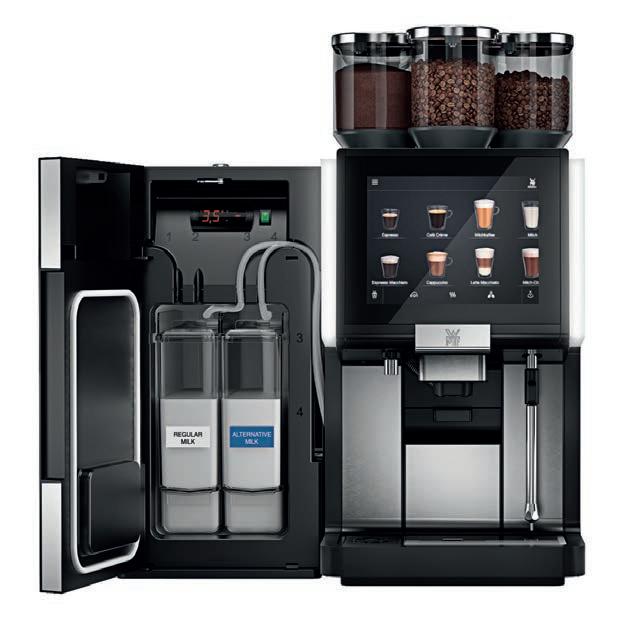
and be customised for different foam density settings.
This function is available in the fully automatic WMF 1100 S, WMF 1500S+, WMF 5000 S+, and WMF 9000 S+ models, as well as its semi-automatic WMF espresso NEXT portafilter.
“On one hand, the WMF espresso NEXT enables a high degree of flexibility in the use of milk and milk alternatives, while on the other, it offers important safety features and
systems. This makes it the perfect machine for outstanding milk concepts on service operation counters, and allows the barista to feel included,” Axel says.
In its fully automatic range, WMF has responded to the need for flexibility with its 2-milk system, which caters to any plantbased milk alternative, including oat, soy, or pea drinks, in one machine.
More recently, the brand has introduced the MultiMilk system, which processes more than two milk varieties almost

“Dairy milk runs through the machine’s pre-existing integrated milk system, while plant-based milks are fed into the machine through several lances in the MultiMilk system,” Axel says. “With these solutions, we are well positioned to meet the requirements of the market to dose and process multiple milk alternatives separately yet automatically.”
Moreover, Axel says machine cleaning is just as important. WMF has taken this into consideration and introduced its AutoClean system, a machine option for fully automated cleaning of all milk- and
“The aim is to automate as many cleaning tasks as possible, especially in the office and other self-serving areas,” Axel says. “The more complex a machine’s system landscape is, the more standardised and reliable the cleaning process has to be, especially in an almost contamination-free
Axel is confident that, with these solutions, WMF will be equipped to handle any future trends in the milk landscape.
“Plant-based milk alternatives have developed, and will continue to develop, as a prominent independent beverage
For more information, visit

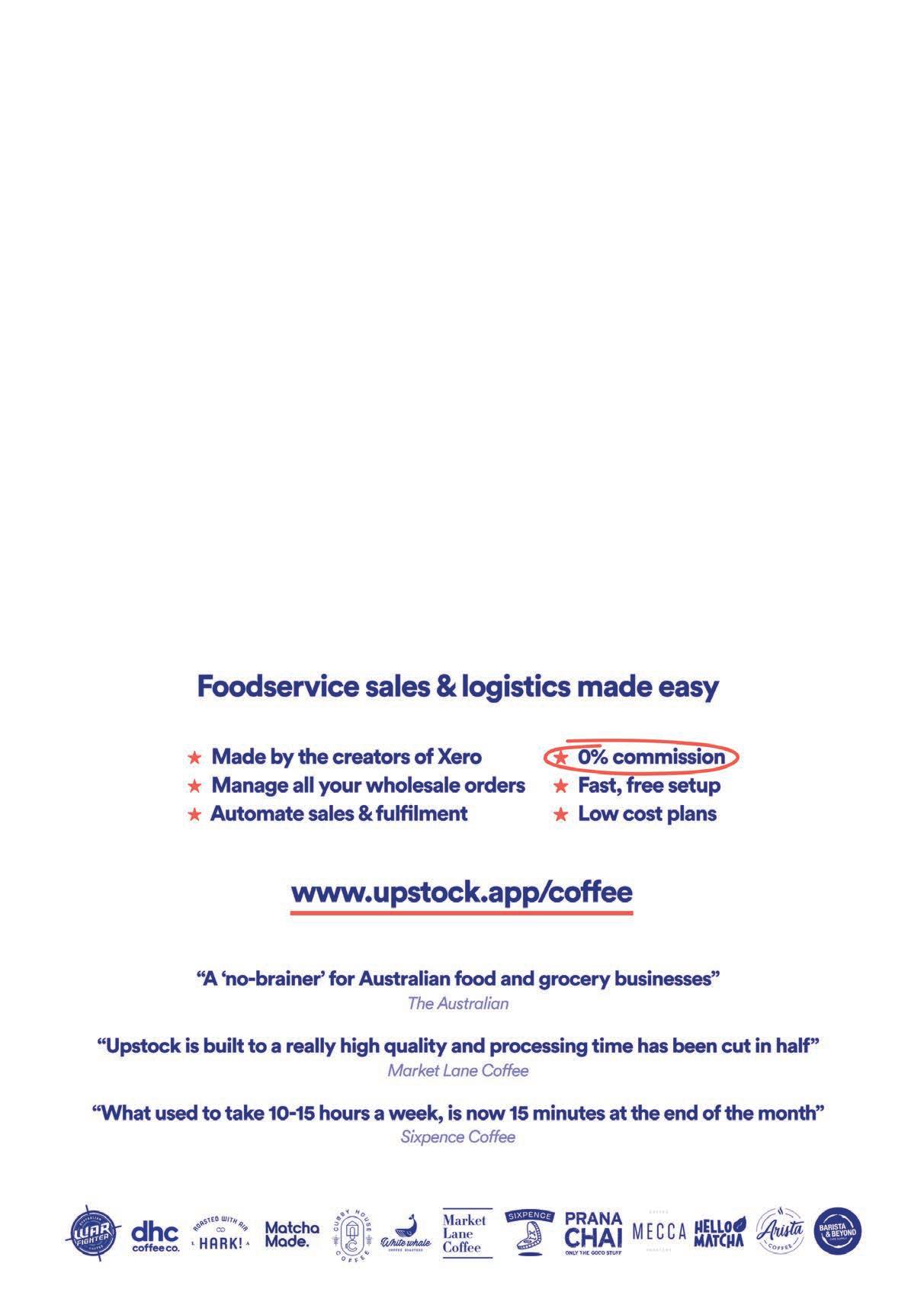

Will & Co Director Josh Passaro shares how the Bondi roaster collaborates with its customers to find their creative rhythm.
he only constant in the coffee world is change, and Will & Co Director Josh Passaro believes innovation is now the driving force of the industry.
“We’ve seen a surge of creativity recently. It’s been great to see cafés continue to elevate the coffee on offer, going beyond the standard espresso menu,” he says.
One innovation that has caught Josh’s attention is the pivot towards extended opening hours, with cafés keeping their doors open longer to serve cocktails, wine, and beer alongside caffeinated drinks.
“We’re seeing more crossover between coffee and alcohol, with a lot of cafés already doing great work in this space. For example, our partner Sammy Jnr in Sydney is blending the two worlds together,” he says.
“It’s a trend we believe will continue well into the future. We’re collaborating with
partners, which Josh says helps build longterm relationships.
“There are so many factors that go into a positive coffee experience,” he says. “Customers enjoy immersing themselves in all elements of a multisensory café, with the interior and design playing a big part in this.
“We aim to connect café partners with local artists to help with everything from brand development to general aesthetics and more. There could be opportunities for internal or external murals, or something as simple as handmade ceramics from local artisans.”
To further grab the attention of visitors, Will & Co offers customised espresso machines to make a bold welcoming statement on the bar.
“We aim for the equipment to fit the venue’s aesthetics through custom art, painting, and unique panel designs,”

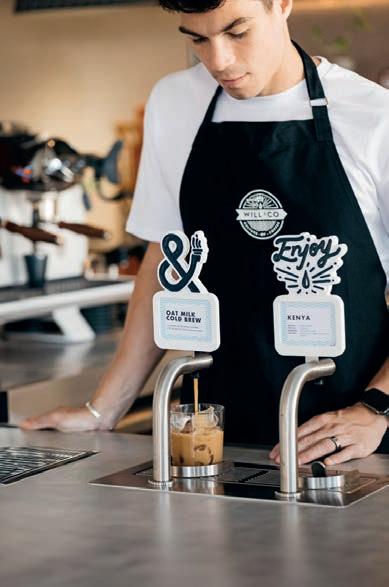
campaigns and reconfiguring workflow or equipment, which Josh says is all part of the Will & Co experience.
This hands-on approach extends to helping café partners navigate the industry’s latest trends. Josh believes a café’s core identity should always be discovered and celebrated when making changes.
“Trends come and go. Venues shouldn’t adopt every trend that comes along – it has to be right for them,” he says.
Will & Co’s own creative innovation usually takes place at the tasting bar of its Bondi headquarters. The team are currently experimenting with cold brew tonics, reserve coffees, pour overs, coffee shakes, and on-tap oat-milk cold brew.
“We create all our drink recipes in house at our HQ, and we’re very fortunate to have a great team that’s passionate about the coffee industry,” Josh says. “If we think a new idea would benefit a particular café, we’ll bring it straight to them.”
This level of care is one of the founding principles of the company.
“One way we try and differentiate ourselves is by going beyond simply supplying the beans,” he says. “It has always been a part of who we are — and always will be.”
For more information, visit willandco.com.au
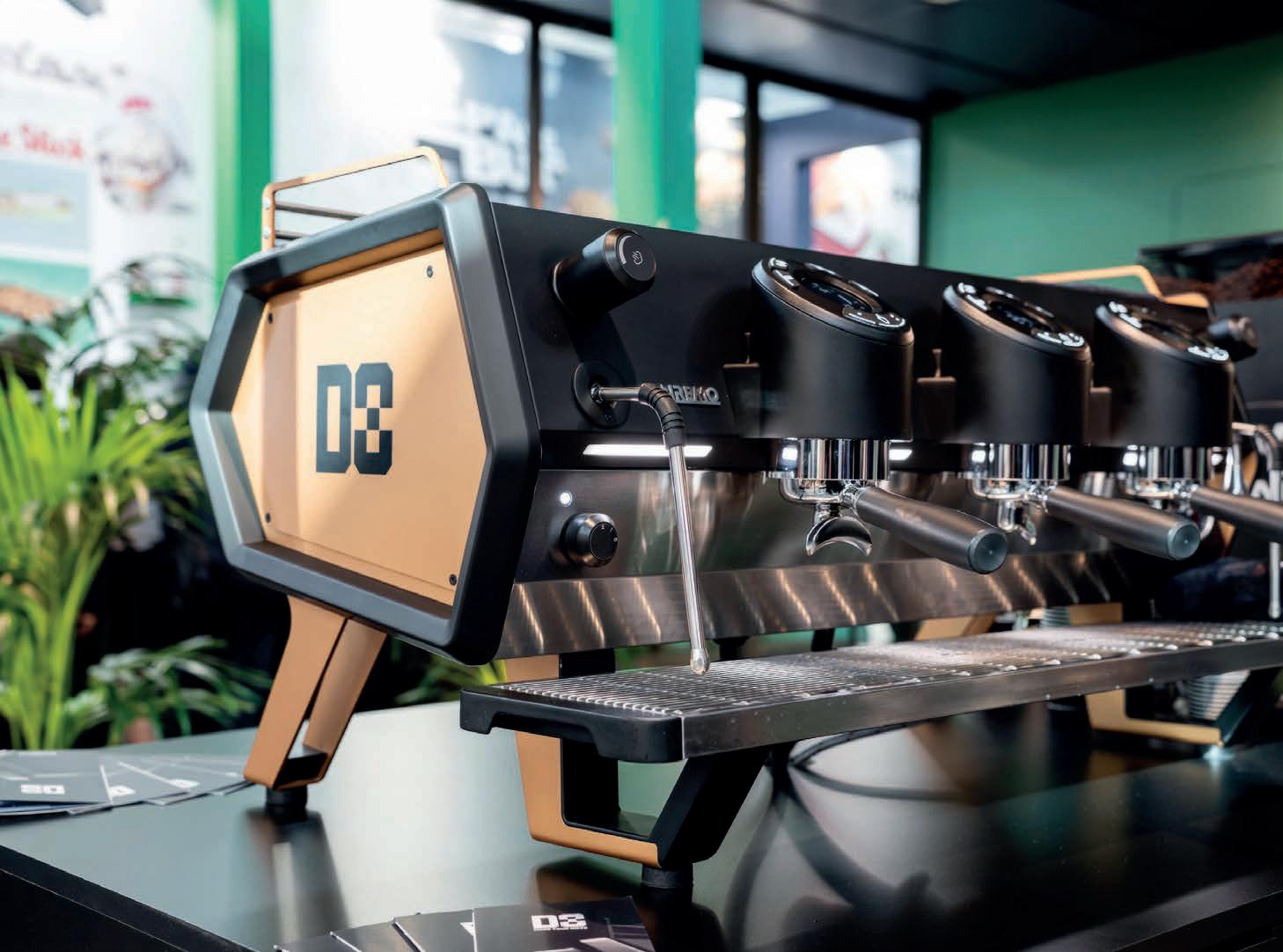
The latest release from Sanremo promises to redefine the single-boiler coffee machine, delivering the technology of a top-end model at a competitive price point.
ake a peek beneath the bonnet of the new D8 coffee machine from Sanremo and you might be surprised to discover just one boiler. Equipped with all the features you’d expect from a premium, multi-boiler model, the D8 marks a new era of ‘hybrid’ machines for the Italian manufacturer.
“We did a lot of research following COVID-19 and saw a gap in the market for a competitively priced machine that had the functionality of a high-end model,” says Sanremo Engineer Andrea Zamprogno.
The engineers’ design brief was simple: create an affordable machine that would shake up the market. They looked to their flagship Café Racer machine for inspiration and sought to simplify the mechanics while still retaining its advanced technology and striking design.
“We’ve put the DNA of our Café Racer into the D8,” says Alessandro Calabrisello, General Manager of Sanremo Australia.
“However, we’re also aware many baristas need simplicity over complexity. The Australian café industry is still navigating the impacts of COVID-19 and the cost-of-living crisis, so we’re confident it’s the right time to introduce a premium entry-level machine.”
While the team may refer to it as an “entry level” machine, they believe the D8 more than delivers in functionality. Its headline features includes the ability to control individual group temperatures from just one boiler, which enables users to dial in different coffees side by side.
“The brew groups operate between 90°C and 98°C while the pressure of the steam boiler can be set between 120°C and 126°C without changing the mechanical components,” says Andrea.
“When compared to a traditional heatexchange machine, the thermal stability of the D8 is greatly improved.”
Alessandro highlights that with traditional single-boiler heat-exchange machines it’s essential to find the balance
between steam-boiler and temperature pressures to avoid burning the coffee.
“The D8’s hybrid functionalities mean baristas can simultaneously have a lower brew temperature and a high steam boiler temperature for maximum milk-steaming performance, all while perfecting the flavour of the coffee,” he says.
The new boiler is made from stainless steel (AISI 316L), the same material Sanremo use for its Café Racer and F18 multi-boiler machines.
“Stainless steel has multiple benefits,” says Andrea. “It has exceptional corrosion resistance which ensures long-lasting performance, brilliant thermal performance which improves energy efficiency, and the ability to maintain water pH which guarantees maximum flavour in the cup. Ultimately, coffee is 98 per cent water, so this is an important factor.”
Andrea says all these qualities result in a reduced need for maintenance and thus a better return on investment for customers.
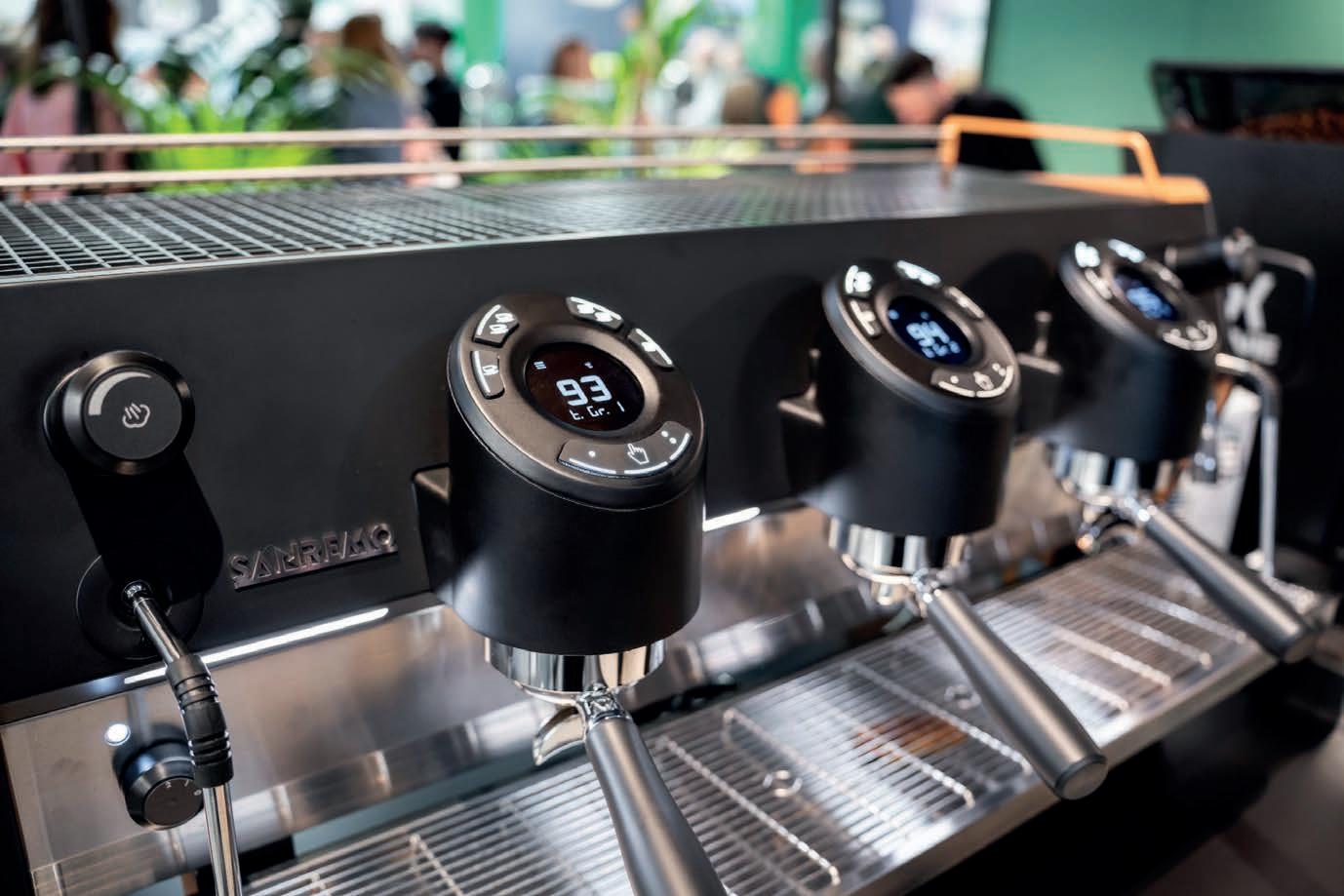

In fact, he says the D8 was engineered with the technician in mind: “we designed it to be easy for technicians to get inside and perform preventative maintenance tasks”.
A feature of the D8 the team are particularly excited about is the Sanremo Internet of Things (IoT) platform. This new technology means all the machine’s parameters can be set via an app.
“The platform will allow users to control the machine remotely. This means they can set the recipe and then review data from the machine over the day to see how it is performing. If the machine tells them the recipe isn’t within its range, they can use the information to decipher whether a certain barista needs training or if the machine requires maintenance,’ says Andrea.
Rather than having a specific target customer in mind, the Sanremo team believe the D8 is the ideal machine for a wide spectrum of setups – from first-time café owners to roasters supplying venues across the country.
“We’ve created a machine that works for all levels of café,” says Alessandro. “For new entrants to the scene, the D8 has all the tools needed to create a successful venue. It’s designed for the cafés Australia is famous
for: those that prioritise quality in the cup.”
The machine build is customisable so café owners and roasters can tailor the kit to fit their setup.
“The modular design means the D8 can be built from the ground up. Magnetic side panels and light-emitting diode (LED) lights offer opportunities for customisation, while all panels are removable if the user wants to add custom colours,” says Andrea.
Customer interaction was a key consideration for the design team who, mirroring the Café Racer, opted for a low machine height to ensure the barista could see and chat with customers as they prepared drinks.
“We didn’t want the barista to be hidden behind a wall of steel,” says Andrea.
Available in two models, the D8 and the D8 PRO, the machine will be available in black and white. The D8 PRO has the same features as the D8, but with additional liquid crystal display screen functionalities (including a scheduler, easy navigation, and additional information via display), pro Eco Mode, pro detailing, and LED work lights.
“The D8 Pro is economically scalable to include the features a specialty café demands in order to be competitive. It also
enables the user to customise their recipe to achieve perfect shots,” adds Alessandro.
Alessandro and Andrea are excited about introducing the D8 to the Australian market, and will launch the new machine this May at the Melbourne International Coffee Expo (MICE).
“The thing that excites me most about the D8 is the lower barrier of entry for cafés to join the Sanremo ecosystem in Australia,” says Alessandro.
“For 15 years, we’ve been laser-focused on creating a strong community that wants to push the coffee experience to the next level. To make this happen, the high-end segment has always been our aim, but we are now excited to bring these innovations to a wider market of users, making Sanremo highly competitive from entry to advanced level.
“The design is bold and we think baristas are going to be blown away by its aesthetic and performance. In the run up to the launch, we’ll have some exciting surprises and announcements – so watch this space.”
Pre-orders for the D8 and D8 PRO are now open.
For more information, visit sanremomachines.com.au

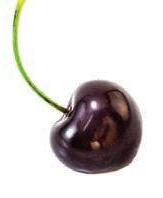
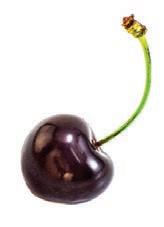
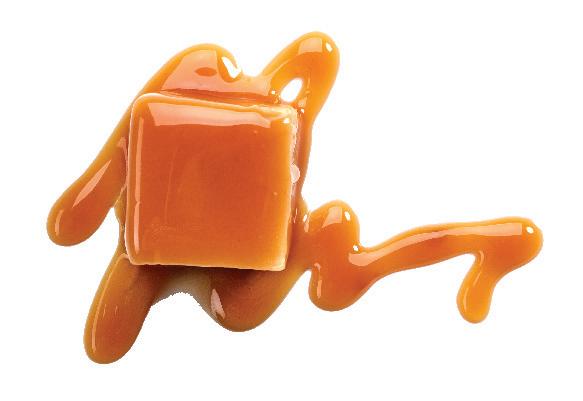
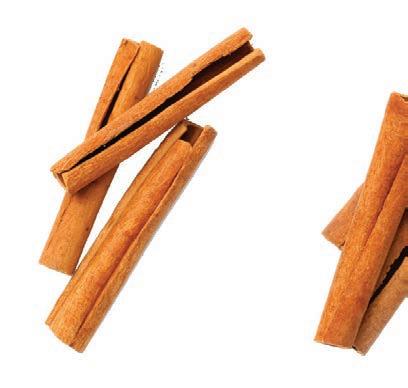

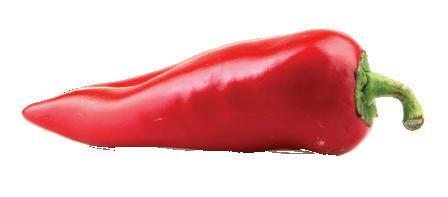
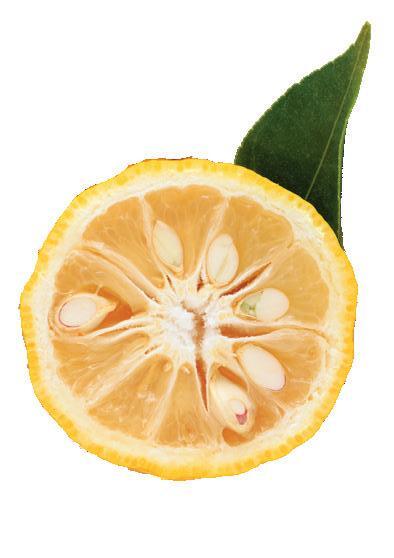
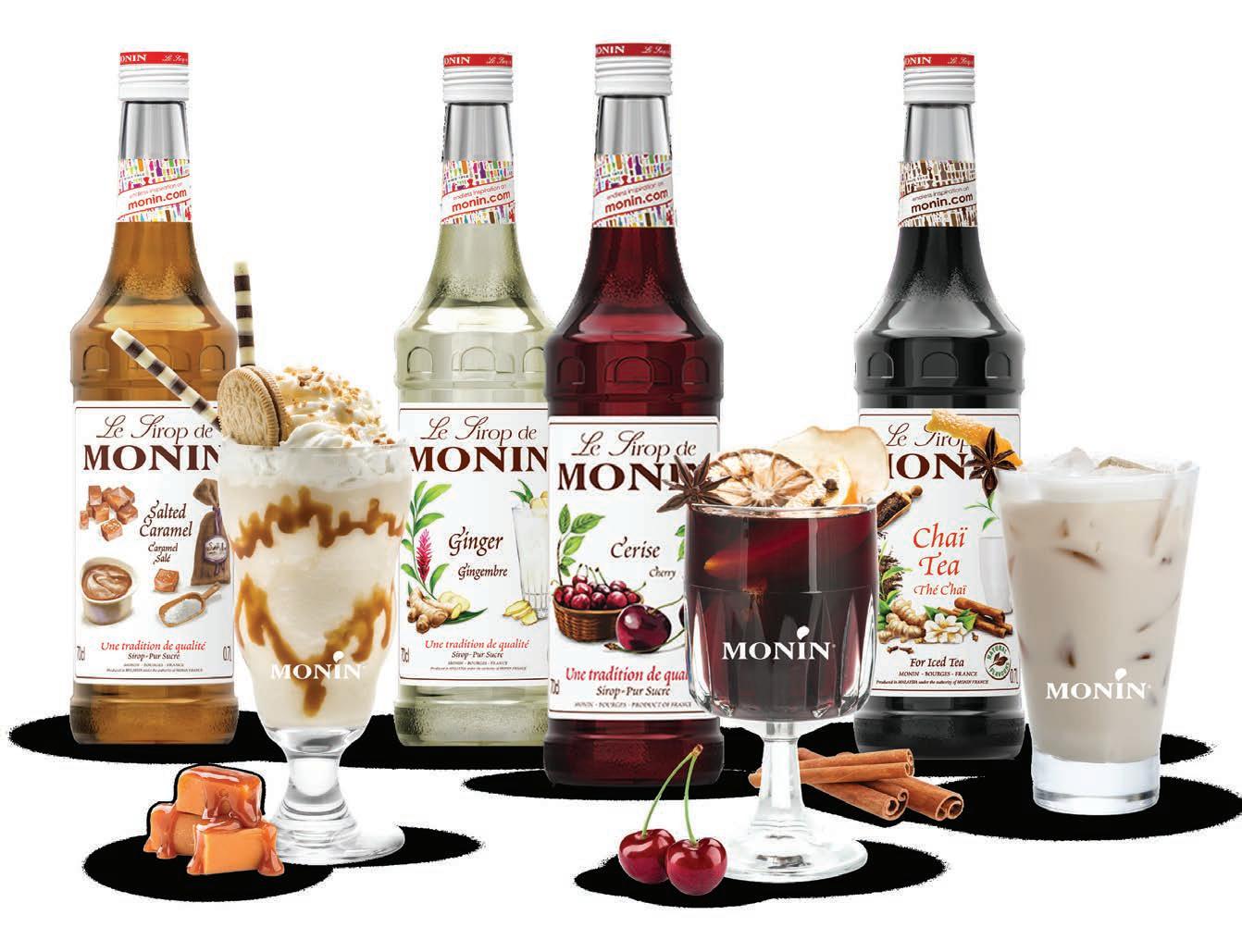

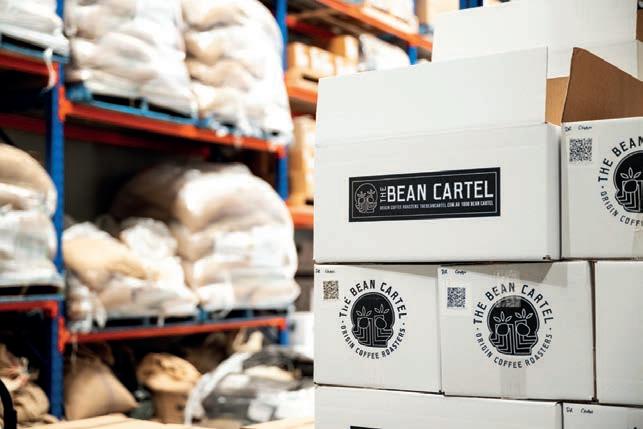




The Bean Cartel is upsizing its roasting operation after a sustained period of growth, led by a bold rebrand to position the company as a serious player in the specialty coffee market.
usiness growth is something to be celebrated, but Melbourne coffee roaster The Bean Cartel admits it almost bloomed too quickly. As such, the company is expanding its operations, starting with the acquisition of additional space.
“We wanted to do this 12 to 18 months ago, but finding a location proved difficult,” says Co-owner Stacy Visser. “We got lucky when our neighbours decided to move, which allowed us to slide straight in next door.”
Now with more space at its Notting Hill HQ, The Bean Cartel will add six two-tonne silos to its roastery to double its current output.
“I originally ordered six one-tonne silos, but we kept growing to the point that twotonnes made more sense,” says Stacy. “We’re hoping this sends a message that we’re more than capable of servicing larger clients efficiently and effectively.”
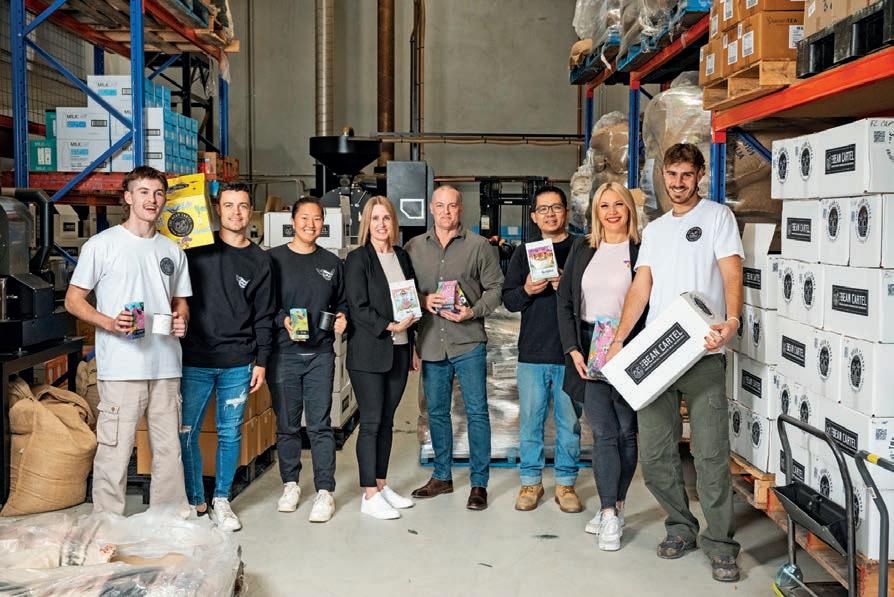
owners know The Bean Cartel could supply the specialty coffee they deserve, as well as develop a unique voice for the company.
The expansion is testament to the hard work Stacy and the team at The Bean Cartel has put in behind the scenes.
This includes the drastic changes to the business that took place during COVID-19, including rebranding the roaster’s identity. Prior to this, Stacy says The Bean Cartel was perceived as an office coffee supplier that occasionally worked with cafés.
“We knew what we were capable of, but we wanted to show others what we could do,” he says. “We’re always looking at how we can level up to the next phase and increase efficiency.”
The goal of the rebrand was to let café
“We went from a vanilla marketing approach to a crazy one,” says Stacy. “We knew we originally didn’t have the appeal cafés called for – we wanted to be seen as a well-respected player.”
A growing business calls for growing workforce, and Stacy says there are a lot of new faces at the roastery, all with hospitality backgrounds.
“From a wholesale perspective, we know exactly what café owners are going through,” he says. “Our customers feel they are getting extra support as a member of The Bean Cartel’s family, as we make sure to visit weekly.

“Each team member is skilled at solving problems directly when they occur.”
Reaching this point of growth has been a team effort, which Stacy believes is the backbone of any business.
“I’m humble enough to understand I don’t know everything, and that’s where the staff around me help,” he says. “With the updated branding and some new additions to the team, we’ve really been able to launch The Bean Cartel 2.0.”
One such addition has been Melissa Glentis, The Bean Cartel’s National Sales Manager.
“I wasn’t aware of The Bean Cartel before I started working for the company, but when I drank the coffee for the first time, I thought it was incredible,” Melissa says.
“Once Stacy showed me all the rebranding he had in place, I thought it was a crazy plan but could definitely help the business grow and really cement its presence in the industry.”
Melissa has seen the company’s new image and goals come to fruition in real time.
“The rebranding has been very successful for us and has led to plenty of conversations,” she says. “Stacy has created a strong brand here which really stands out in the specialty coffee market.”
The bulk of these conversations have been around café owners expressing their appreciation for The Bean Cartel’s prioritisation of their needs.
“Over the last few years, we’ve invested a lot of time in educating our team on the process from farm to cup, so we can handle any questions a café might have,” says Melissa.
Melissa says building team chemistry through opportunities like this has been a special experience.
“We’re a group of professionals who love what we do,” she says. “We’re passionate about the coffee industry, and we’re always customer focused. We’re all invested in this business.
“Our focus is to become an authority in the industry, and we’re looking to get one per cent better every day.”
For more information, visit thebeancartel.com.au
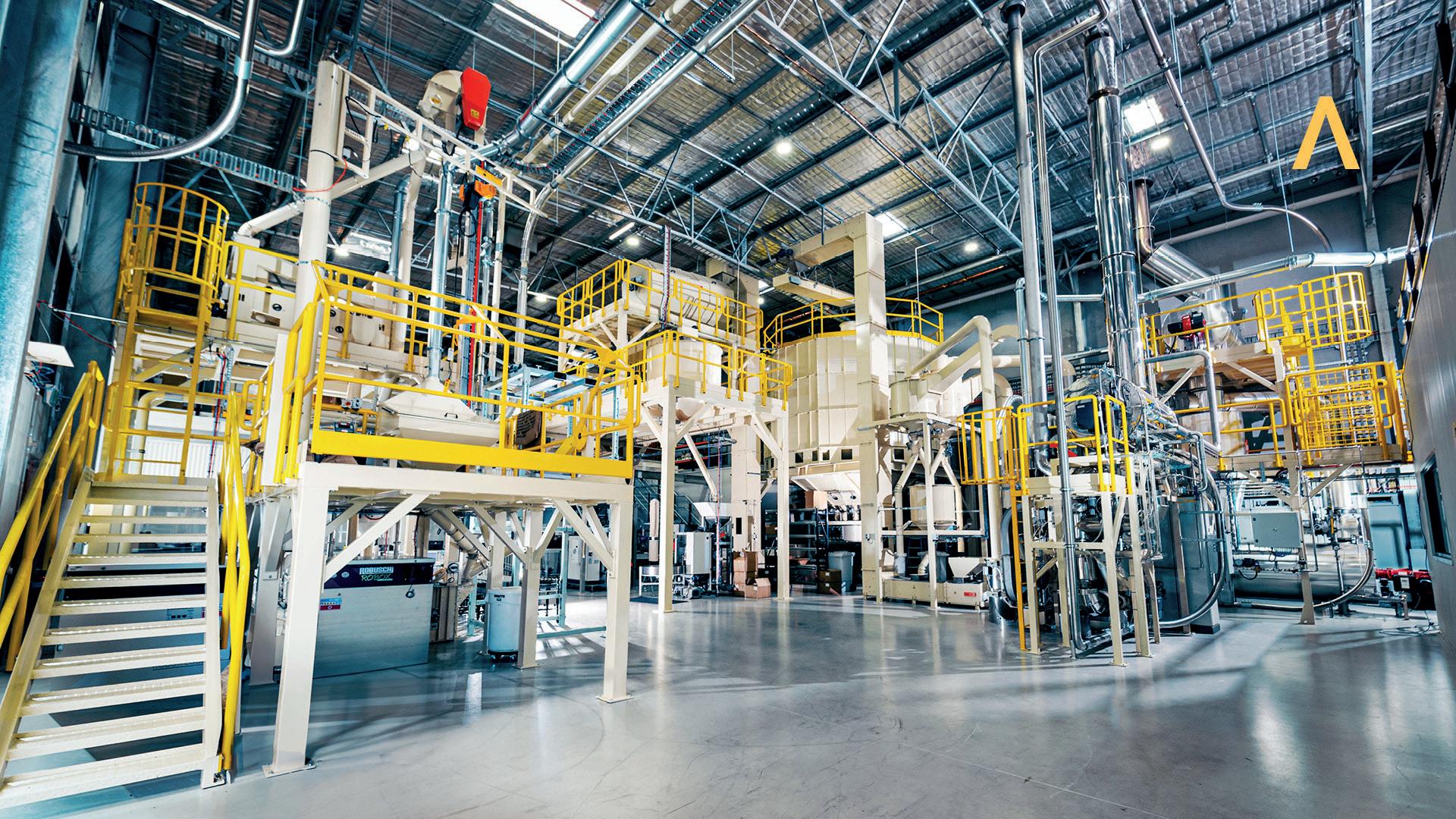
chance meeting at the Triestespresso tradeshow in Italy in 2016 has blossomed into a lucrative partnership between Italian manufacturer Brambati S.p.A. and Victorian roaster Evolve North.
“I went to the expo to find a suitable manufacturer to buy a roaster from,” says Evolve North Director Warwick Shemilt.
“Brambati stood out because they offered a comprehensive description of how to achieve roast uniformity, so the decision was very easy.
“Brambati President Fabrizio Brambati saw me looking at one of the roasters and spoke to me for an hour and a half. It was an amazing experience and the start of our journey together.”
That journey has led to Evolve North commissioning Brambati to fit out its new roastery. Located in Shepparton, Victoria, the roastery plant spans 4500-square metres across the 10,000-square-metre site.
“The partnership has been really
we’ve continued to expand our line-up of Brambati equipment. We started with a 30-kilogram roaster, then two years later we bought green bean silos. Now we have an entire plant fit out,” Warwick says.
The new plant is equipped with a green bean loading platform, one-tonne bulk loader, green bean silos, and an inline scale.
“We also installed a cleaning station to ensure the beans are completely free of dust, stones, and any other impurities before going in the silo,” Warwick says.
“The inline scale weighs the beans before they go into the silo, giving us an accurate inventory of the greens beans we have in stock that are ready to roast.”
From there, the beans are fed into one of two coffee roasters, either the newly installed 120-kilogram or Evolve North’s original 30-kilogram Brambati roaster.
“We can have both roasters running side-by-side, allowing us to roast 150 kilograms of green beans every 15 minutes. That’s six tonnes every 10 hours, which is a significant increase in our
“From the roaster, the beans go to into roasted coffee silos via an 11-metre-high bucket elevator which is the gentlest process to ensure there is no damage to the coffee beans. The beans are then post-blended.” Warwick says this is to maximise the natural flavour of each origin to bring out the best possible flavour of each blend component. He says the recipes created behind the blends balance the intricate flavours each origin has to create a sweet and balanced product.
“The beans go into a roasted coffee silo and then different coffees are mixed in a 600-kilogram blender. After that, the beans go up another bucket elevator into a packaging platform,” Warwick says.
“Above the platform is a grader. This is the final process the beans go through to discard any blemishes or chips. Those defects are discharged into a bin, ensuring customers receive only the best beans.”
Warwick says he placed an order for his Brambati roasting equipment in December 2022, which was completed and made fully

operational in just under a year.
“The equipment was installed by tradesman from Italy and Victoria after arriving in 11 40-foot containers in October 2023, and was up and running within nine weeks,” he says. “This included shifting our existing 30-kilogram Brambati roaster and green bean silos from our original site to the new roasting plant.”
Warwick says he was impressed with the speed and accuracy with which the roasting equipment was delivered and installed.
“It was such a smooth process. To be able to send an entire plant from overseas and have it working as soon as it was switched on is impressive,” he says.
“When we initially looked for a bigger roaster and at how we could increase our capacity, [we needed to ensure our partner Brambati] could offer us an integrated plant from start to finish.
“Fabrizio has visited the new coffee roasting plant at least three times since we started discussions. You’re not just dealing with overseas interaction: they have staff in Melbourne and Sydney who are only a phone call away. It’s been very easy and open communication throughout the project.”
Warwick says the service Brambati has provided is unlike anything he has experienced.
“The automation, software, and equipment design is unparalleled,” he says.
“I can’t speak highly enough of Brambati and how easy they are to work with. We thank the Brambati team for an amazing plant that ensures we bring regional Australians the best coffee in the world.”
Brambati President Fabrizio says the plant is fully automatic, meaning only one operator is required to complete all operations.
“We take pride in our products being adaptable and reliable. We know Evolve North is a company that works tirelessly to ensure its roasting equipment guarantees the same results 24 hours a day, and through our control systems and advanced software it’s easy to ensure everything runs smoothly,” he says.
“When we supply a plant, we do so with the future in mind. We factor in company growth and think with the view that we will eventually double the company’s capacity.”
Once the project was complete, Fabrizio says it was a celebration of two companies that share a commitment to coffee excellence.
“After working with Evolve North for many years, we believe this strategic partnership has benefited everyone, from our companies to our consumers. Our hope after every expansion project is that it will be followed by other projects, to further grow both companies,” says Fabrizio.
He believes one of the key strengths of Brambati lies in its capacity to listen,
differentiate proposals, and develop solutions based on the specific needs of individual customers.
“Our customers have always been taken care of, even remotely. We host webinars for companies all over the world and we make extensive use of virtual commissioning,” he says.
“Our technicians are able to carry out tests and train operators online remotely to ensure the continuity of our high-quality standards, a crucial aspect for a company that produces coffee every hour of the day.”
For 79 years, Brambati has led
technological innovations within the roasting industry. Fabrizio says its longevity is testament to its ability to adapt and grow with the market.
“We still partner with companies today that worked with my grandfather, and to have that intergenerational connection is very special to me,” he says. “I hope the new customers we sign on will eventually get to meet my grandchildren once they take over the business.”
For more information, visit brambati.it or evolvenorth.com.au
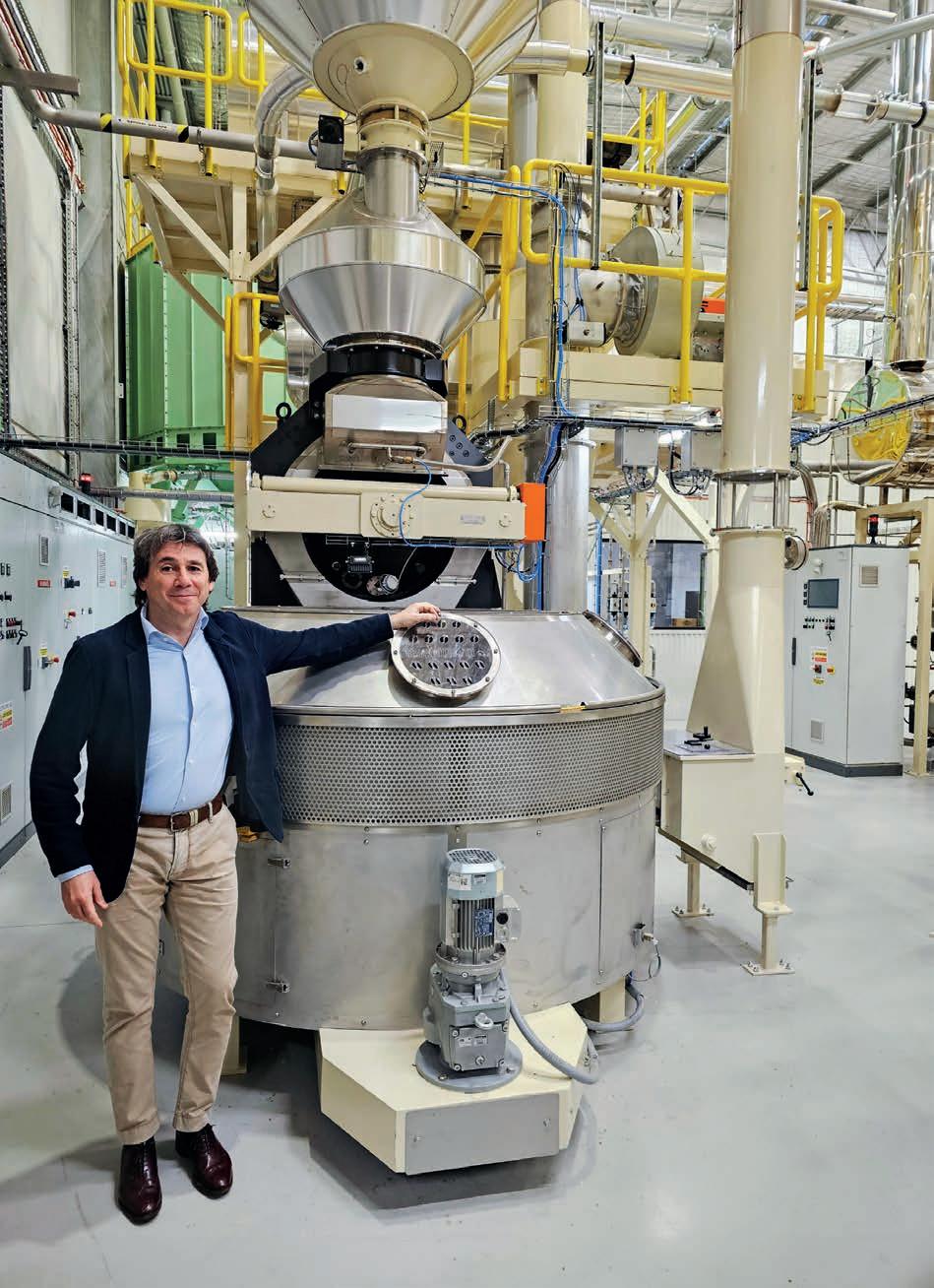
At Kivahan we create a distinctive and out-of-this-world coffee experience. Sourced from around the world, our freshly roasted coffee is 100% organic and specialty grade. Reducing the usage of pesticides and chemicals is just one of the many reasons why Kivahan exclusively stocks organic coffee.
As both a retail cafe and coffee roaster, Kivahan understands the challenge of finding a distinct flavour that helps your cafe stand out. With a range spanning from South America to Africa and Asia Pacific, we have a flavour profile to suit your needs.
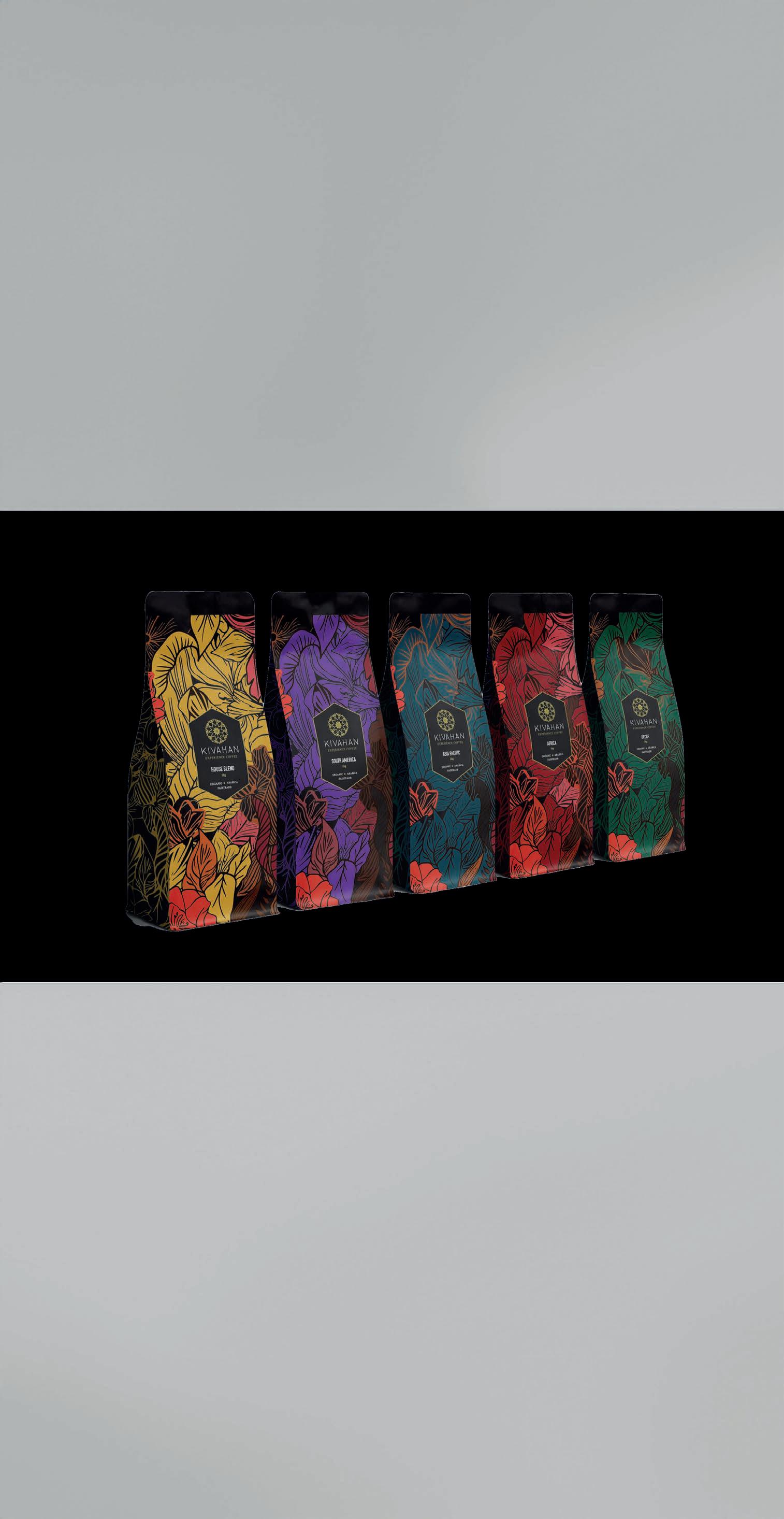
Contact us today, or visit our retail cafe to taste the difference and take your coffee game to the next level with our premium, organic wholesale beans.
www.kivahan.com.au
1300 155 116info@kivahan.com.au

Cafetto explains why its Grinder Clean product is an important aspect of regular and correct-procedure cleaning.
hen a customer visits a café, they have expectations that the service will be friendly, the environment inviting, and the coffee exceptional. They also assume the venue and barista workstation will be clean, especially the coffee machine and grinder.
Cafetto has developed a broad portfolio of products suited to different equipment and requirements to help the coffee industry maintain safe hygiene and cleaning practices.
“Using a grinder cleaner will help give you consistent dosing. By using our product, it removes build up and reduces blockages, which not only increases the efficacy of the grinder, but helps maintain its longevity,” says Cafetto International Business Manager Jason Bond.
One problem Cafetto has solved in the café industry is the need for an easy-touse grinder cleaner that doesn’t require disassembling the unit.
“When the cleaner pellets run through the grinder, they dislodge the coffee granules down and take them with them as they pass through the burrs. Water shouldn’t be used to clean the internal parts of a grinder, so a specialist product is required to do the job,” he says.
Jason says grinders are just as busy as espresso machines throughout service, therefore need as much attention.
“We recommend baristas clean the grinder as part of the daily pack-down, the same way we recommend cleaning your espresso machine at the end of each working day. It should only take a few minutes to clean comprehensively,” he says.
Jason says the user can remove the grinder hopper and empty out the coffee beans, then reattach the hopper and turn the power on, adding one capful of Cafetto Grinder Clean into the hopper to get rid of any residue or oils.
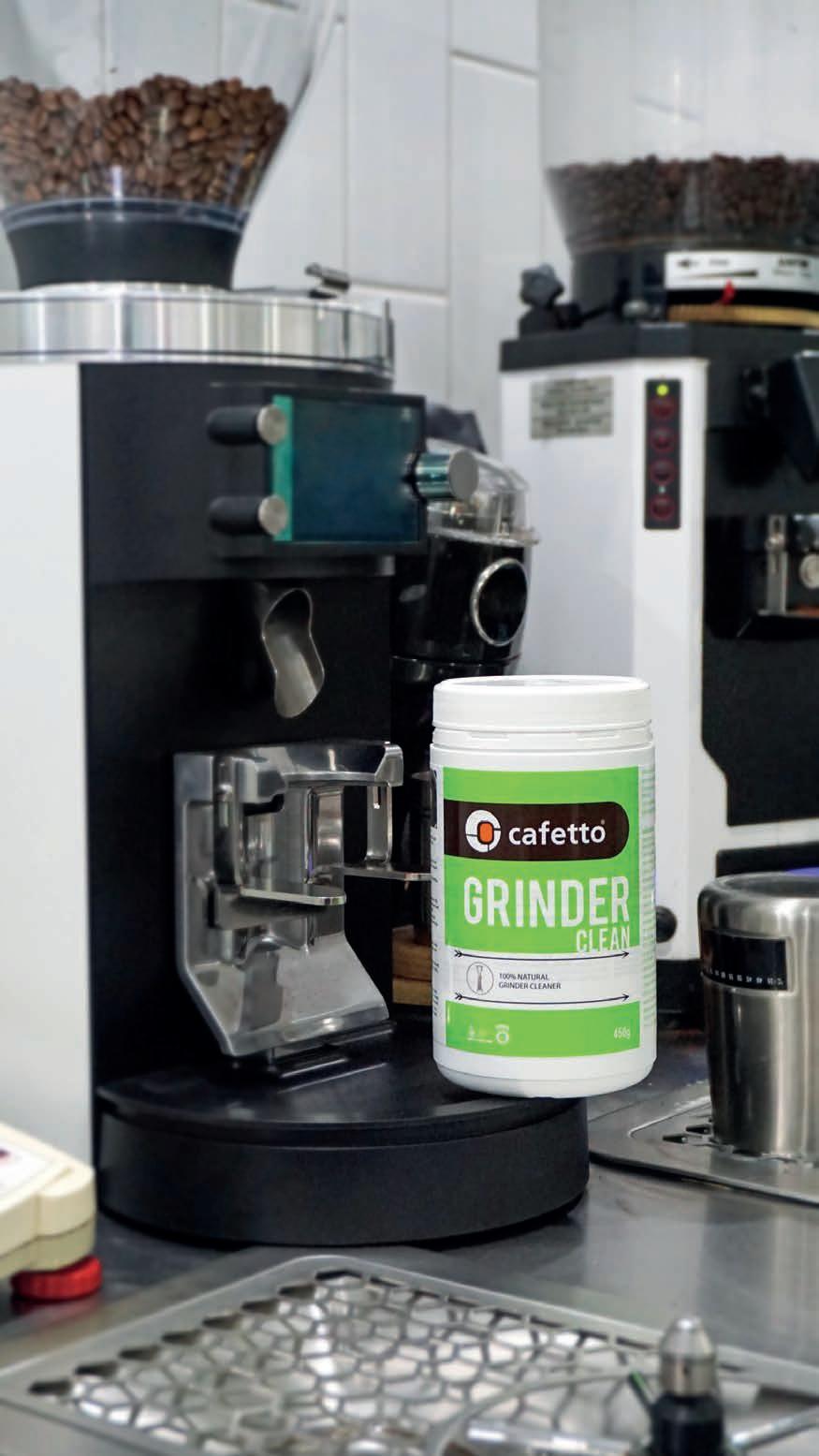
beans in mind. We think it completes the process of being green,” Jason says.
“After you’ve added the Grinder Cleaner, grind it through, just as you would coffee beans. Do this at the end of every shift and the grinder will be clean and ready for the morning rush,” he says.
“Cleaning is all about efficiency, protecting your machine, and the end user. If you’re confident with your actions and always use Cafetto cleaning products, your coffee equipment will thank you for it – and
“We do what we can to improve coffee’s sustainability. An example of this is incorporating ingredients into our products that are produced from food items, plants and minerals.”
To further its commitment to the Australian coffee industry, Cafetto teamed up with Hemro Group and its flagship brand Mahlkönig on an Australian tour in 2023 to launch the EK Omnia Allrounder Coffee Grinder as well as The Sync System, in collaboration with La Marzocco.
“Hemro Group promotes Grinder
in Australia Inc (SICHMA), a certification recognised on a global level. SICHMA is a not-for-profit created to promote halal food, having founded the Australian Halal Certifiers Alliance and the World Halal Food Council.
Jason says Cafetto has developed a holistic range of products to suit all equipment for complete café operations.
“Regularly cleaning a grinder will extend its lifespan, require less maintenance, and keep the coffee quality high,” he says.
For more information, visit cafetto.com
beanscenemag.com.au
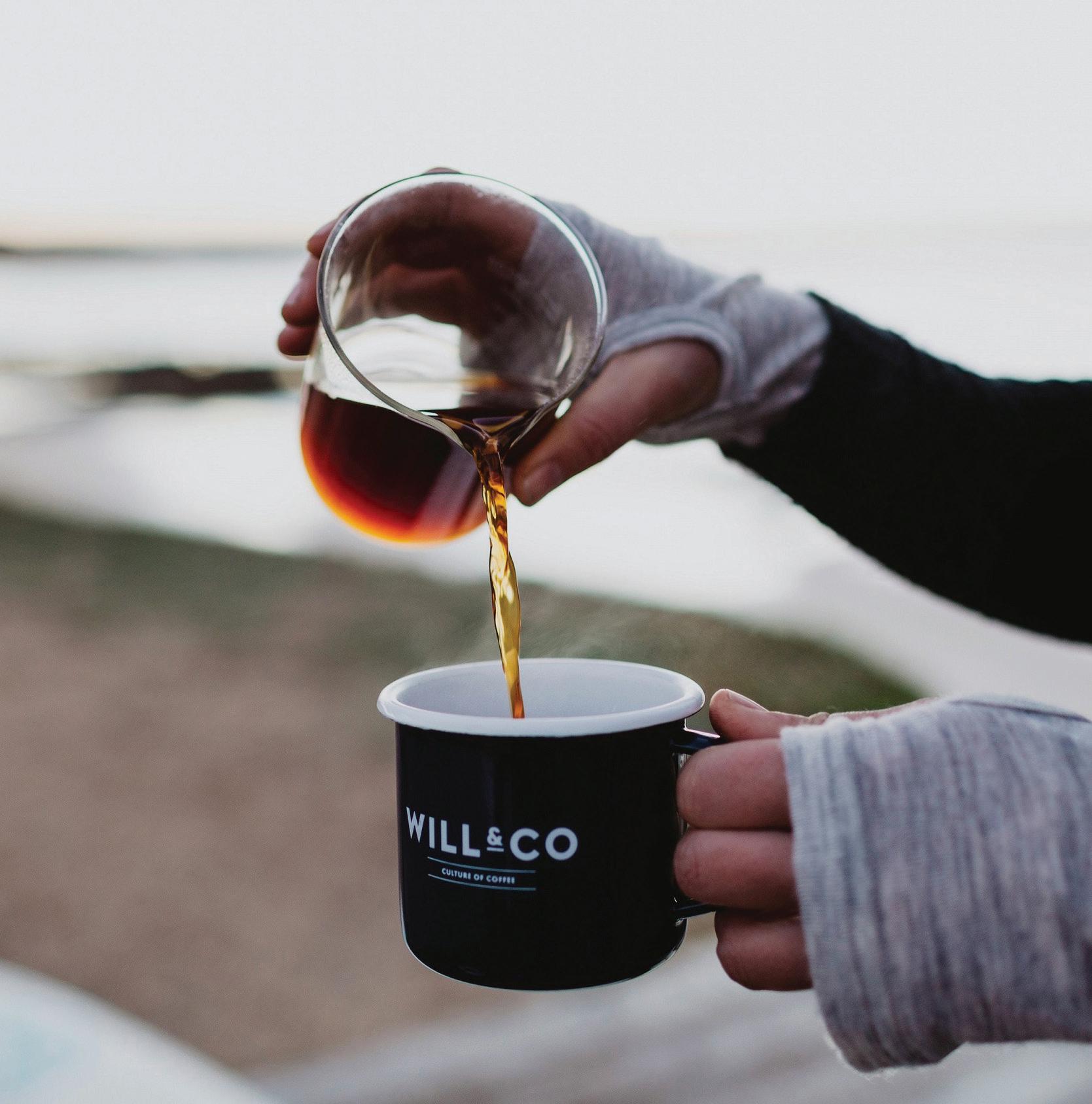

Tetra Pak goes above and beyond for its customers, providing support and guidance from concept to commercialisation.
standard processing and packaging provider has a straightforward task in the beverage market: place the drink in packaging before it hits market shelves.
However, Tetra Pak is not a standard processing and packaging provider, according to its Oceania Marketing Associate Lily Jones. The food processing and packaging solutions company, which has offices across Australia and New Zealand, prides itself on helping customers throughout the product development process.
“We want to be there from start to finish: from ideation to developing a product that reaches the consumer,” she says. “It’s important for us to have a strong partnership with our customers.”
This innovation process begins with market research to locate areas for potential growth, and staying on top of trends is a crucial component. Sustainability and plant-based ingredients are two themes Lily identifies as increasingly important to consumers.
“Our impact on the environment is becoming more tangible as we start to see the effects in real time” she says. “The market is becoming increasingly focused on using ingredients that not only taste good but also have health benefits and are sourced sustainably.
“There is convergence with the health interests of customers and their concern for the planet. That’s why our cartons, which are made mostly from renewable sources, fit so well in this category. Our sustainability commitment stretches to everything we do.”
The alternative-milk market, which has seen huge innovation in recent years, is of particular interest to Tetra Pak. Almond, soy, and oat milks have all cemented their place in the industry, but Lily believes new alternatives such as sunflower seed and walnut are beginning to make waves. One such product about to enter this space is Vitality, a new walnut milk launching in April.
In 2023, Tetra Pak partnered with an international research agency to analyse market trends in this area, which Lily says provided valuable insights for both the company and its customers.
“We looked at different macro trends, such as the ageing population and
international relations, and assessed what the consequences might be for the plantbased milk market,” she says.
On the back of this research, Tetra Pak has started to explore RTD options for both dairy and dairy-alternative companies interested in entering the market. The company is currently looking at new drink preparation concepts including precision
increase the protein level in dairy milk or to add protein to a dairy alternative.
“Being clear on the amount of protein in milk is becoming increasingly important, so we’re looking for a way to bring that bonus nutritional content to our customers,” says Lily.
A global trend of concern highlighted by the research was the inflated cost of alternative milks for café owners, which led Tetra Pak to rethink its approach to packaging RTD products.
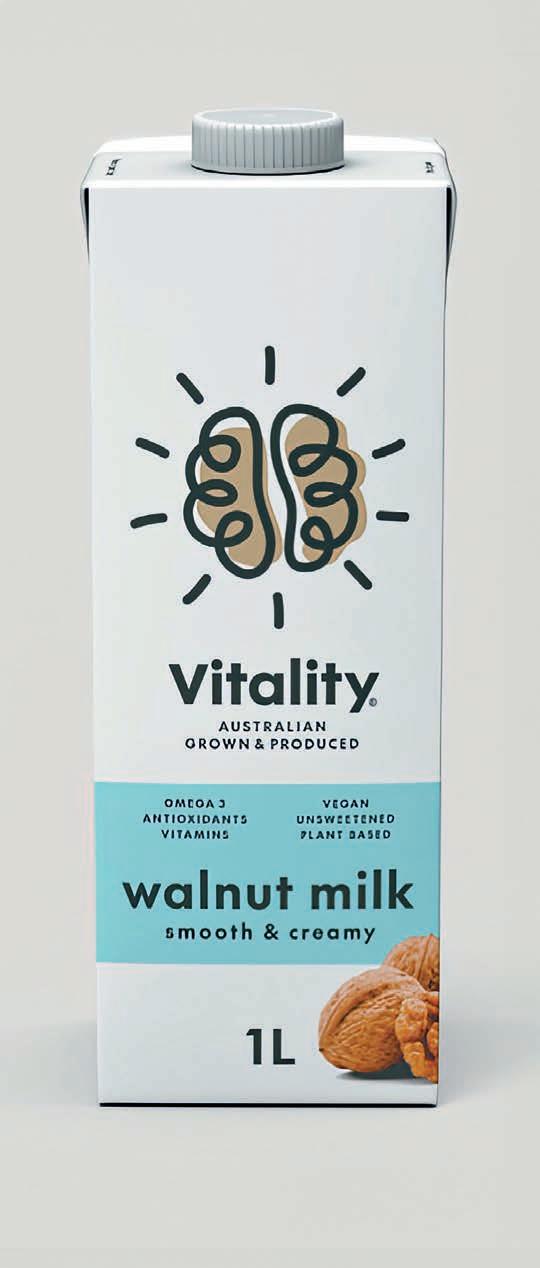
“The price point has become a barrier for some consumers looking to make the switch to dairy alternatives,” Lily says. “We’re starting to see a shift in the market towards a smaller portion pack for alternative milks to give cafés and consumers an opportunity to try different products.”
The company also surveyed baristas from Australia and New Zealand to better understand how they use plant-based milks. Lily says Tetra Pak’s extensive research gives its customers added value, and is what separates the company from competitors.
“We can help our customers decide which ingredients they will need and the best formulation for what they are trying to achieve,” she says.
“Usually, a customer will come to us with a very specific challenge they want to address. For example, it could be they have an oat milk that is under performing in a certain market and want to know why. From here, we’ll research the target market as well as the oat milk itself to get to the bottom of the issue.
Lily believes alternative milk producers looking to establish themselves in the market would benefit greatly from a Tetra Pak partnership. She says Tetra Pak’s customers can trial new formulations and beverages at its Product Development Centre before moving to commercial scale production.
“Our research tells us that 30 to 40 per cent of people drink plant-based milks, while dairy consumption is still prevalent among 90 to 95 per cent of the population. Therefore, a lot of plant-based companies are looking for ways to incentivise people to make the switch,” she says.
“We encourage companies of all sizes to reach out to us with a challenge so we can work together to solve it.”
For more information, visit tetrapak.com/en-anz
Australia will vote on Australia’s Favourite Coffee at
successful workforce is fuelled by good coffee, so when Swiss
office market, it used this idea as its brief.
Initially launched in 2015, the GIGA X3 automatic dual-spout machine was designed to deliver consistent quality and ease of use. Eight years on, the Jura team knew they could improve its productivity and precision to keep up with the fast-paced office environment, and released a new updated version of the original model in April 2024.
The revamped GIGA X3 was developed to showcase Swiss innovation and professionalism, which Jura Australia Managing Director George Liakatos defines as a commitment to fine tuning every detail.
“When we decided to relaunch the GIGA X3, we looked at every element and considered how we could make it even better,” he says.
“The machine has always demonstrated the Swiss precision our products have become known for, and you can see it in the design, workmanship, and the materials used in the GIGA X3.”
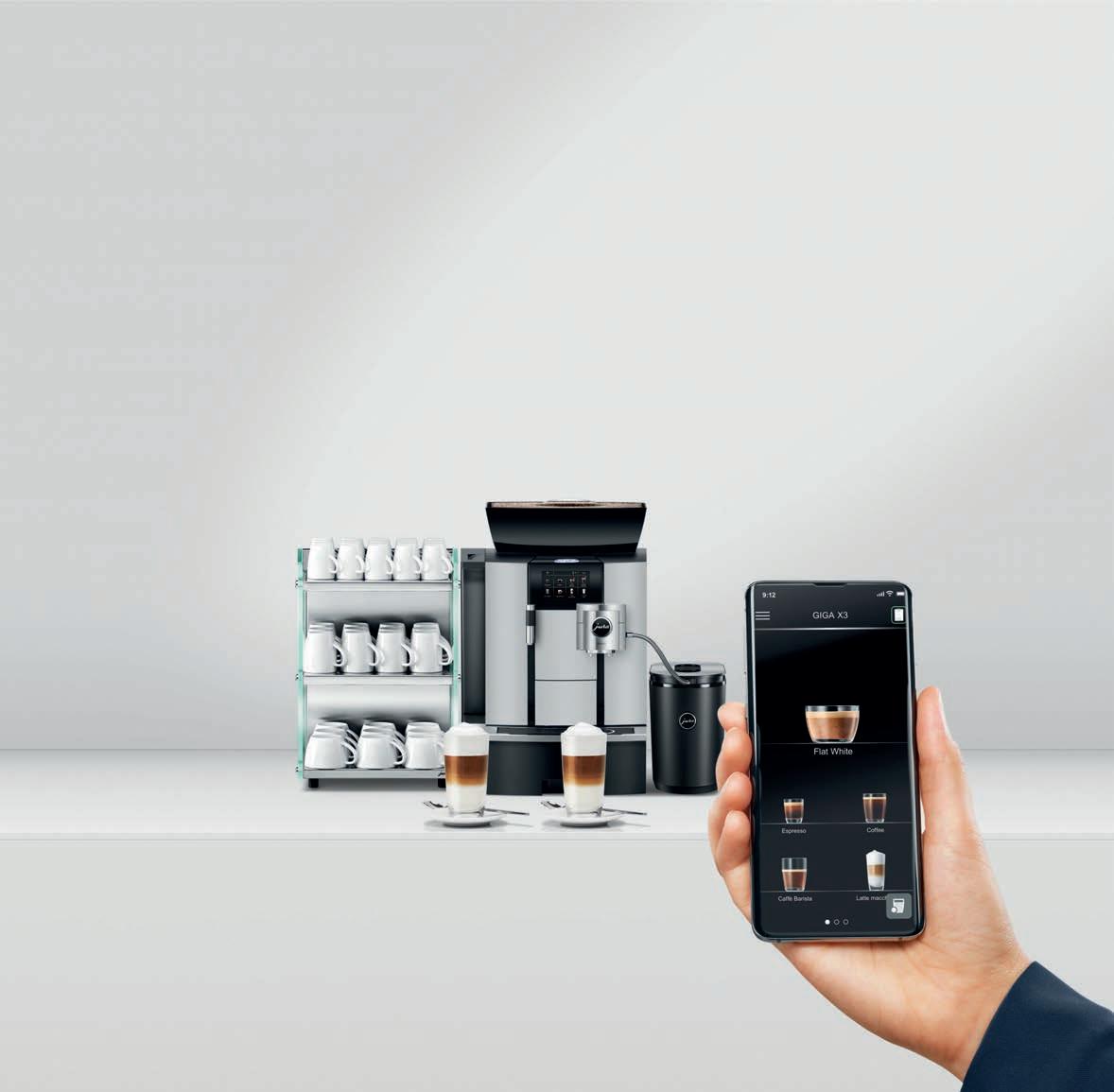
The revised GIGA X3 may look similar from the outside, but it has undergone significant changes, including the addition of ceramic disk grinders.
“When we transitioned to these grinders in our professional portfolio, we found they were incredibly robust, which has allowed them to maintain the same quality over thousands of coffees,” says George. “We’ve also altered the water pumps and the heating system inside the machine.”
It will also include Jura’s new Pocket Pilot, the company’s free telemetry app that allows cashless payments without the requirement of any additional equipment such as card readers. George says it is particularly useful for businesses with multiple Jura machines, giving users the ability to make changes to menus across the entire fleet from the app.
“It enables businesses to monitor usage of the machine remotely, eliminating much of the hardware,” says George.
Pocket Pilot also gives users access to statistical feedback on each GIGA X3 machine, including the popularity of each coffee type and its busiest hours.
George says the Pocket Pilot was an obvious path for Jura to pursue given the
demand for data and analytics within the coffee industry.
“We’ve seen more and more businesses inquire about additional information on their machines,” he says.
George says the GIGA X3 is suited to spaces that require high volumes of coffee and the ability to make recipe adjustments between orders, such as conferences, seminars, and offices.
“Good coffee is becoming a requirement in an increasing number of public spaces and workplaces; people no longer accept
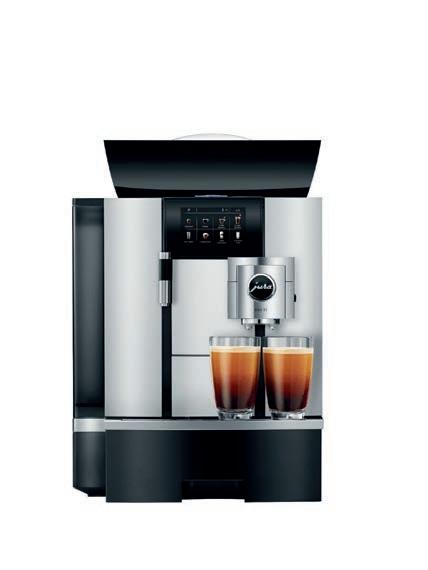
coffee that has been brewing and sitting for a long time,” George says.
He adds that offices in particular need to prioritise making good coffee, which begins with investing in the right equipment.
“Businesses are trying to attract workers into the office, and providing better coffee is one of the more common ways to do so,” George says. “Who doesn’t want a nice coffee when they come into work?”
George believes the Pocket Pilot is an ideal tool for the office, as users can set and rename preferred drink items for the “coffee aficionados” while also having helpful tips on the screen for first-time users.
“There are a lot of smaller notifications within the machine that give instructions to the user, so anyone is able to use it,” he says.
“Everything can be done at the touch of a button, right down to the cleaning system.”
The reimagined GIGA X3 is a prime example of Jura’s continuous efforts to upgrade its machines to further enhance the user experience.
“We have measures in place to really restrict user intervention, because we want to make things as easy as possible,” says George.
For more information, visit au.jura.com


his May, lots of exciting things are happening in Melbourne. You can run the Tan for charity, visit the world’s largest digital art gallery, or be spellbound by Wicked the Musical making its return. But from 12 to 14 May, there’s only one event that matters to café owners, baristas, and coffee lovers.
“The 2024 Melbourne International Coffee Expo (MICE) will mark the 11th instalment of this event, and the beginning of a new decade and era for the largest dedicated coffee tradeshow in the Southern Hemisphere,” says MICE Show Director Lauren Chartres.
“MICE has long been a place to do business between buyers and sellers, and that will always remain, but this year we want to put the focus back on our audience – baristas and café owners – and support them beyond offering free coffee. We want our audience to come to MICE for an educational experience, and leave with valuable insights and knowledge to support their business.”
With the Australian café industry facing economic challenges, increased cost of goods and continuing labour shortages,
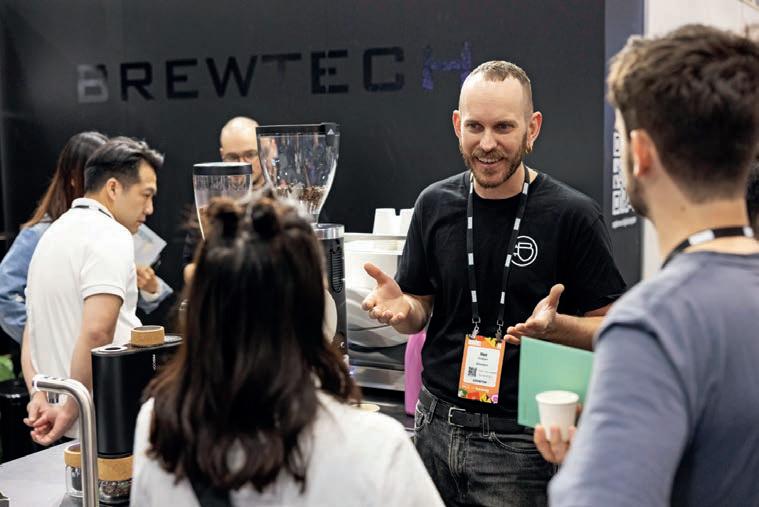
For this reason, MICE is hosting a Café Owners Education Series, covering topics that will help businesses thrive and survive in the competitive landscape.
“We know it’s a tough climate for the café industry. We want to be an event that adds value. Someone’s time at MICE could be the difference to learning key information that can keep their business afloat, versus shutting their doors in a few months’ time,” Lauren says. “This industry
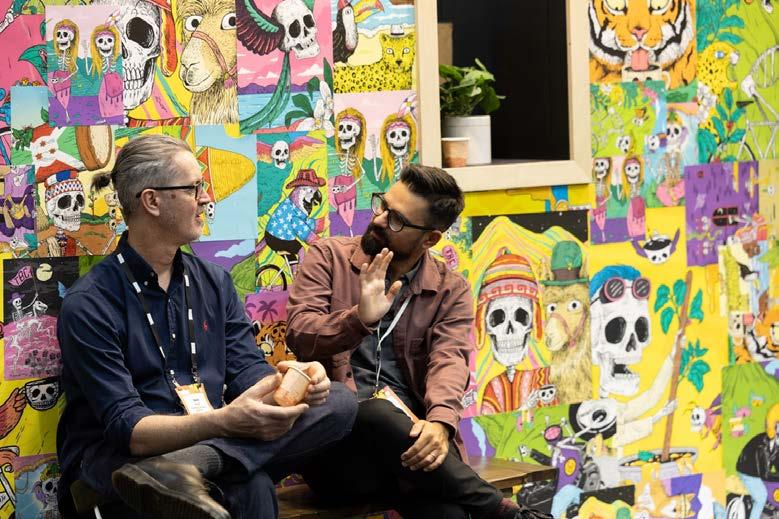
So often the Australian coffee industry is credited for leading innovation and trends that positively influence other market regions and barista talent. This year at MICE, a two-part Global Coffee Report Down Under breakfast series across two mornings of the Expo will explore global issues impacting the Australian coffee industry. This will include panels discussing the growth of Asia, the impact of the European Union’s deforestation regulations, whether overseas recyclable packaging laws will soon become mandated in Australia, and pricing trends and outlooks.
“We may be an island destination, but Australia’s coffee industry is not immune to global challenges. There is an immediate flow-on effect and quite often consequences that filter down to roasters, café operators, and even consumers. It’s important to address the current status of topics that are fuelling industry change, and learn more about how, what, and if they will shape the Australian market,” says Sarah Baker, Global Coffee Report Managing Editor and Symposium Moderator.
When you’ve done your due diligence to
Education will be put in the spotlight at MICE2024 with the launch of new Café Owners Education Series. MICE is an opportunity to make new industry connections and long-term working relationships.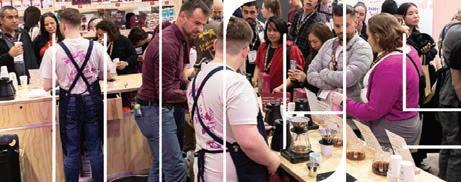
consume as much coffee as one can possibly handle, the question beckons: which is your favourite? To put the power in the hands of visitors, MICE will host an on-site competition to crown Australia’s Favourite Coffee. The inaugural competition will be open to all exhibitors that have a coffee offering as part of their business, with visitors voting for their favourite throughout the event.
“We know coffee is subjective, so the criteria for this new award is simple: what do you like, and don’t like, in a coffee? The choice is yours, and the coffee with the most visitor votes deemed ‘their favourite’ via the MICE app will earn inaugural bragging rights and the honourable title for the next year,” Lauren says.


MICE loves an award, but more than that, it enjoys seeing the next tier of innovation, technology, and products that can make a positive influence on the Australian coffee landscape. The MICE Product Innovation Awards offers exhibitors the chance to showcase their releases over the past year, whether it be ancillary electrical or coffee preparation equipment, coffee accessories, or roaster packaging excellence. An independent panel of industry leaders will award the Judge’s Choice categories.
Want to see some of Australia’s best barista talent thrown into the deep end? The second edition of Australia’s Richest Barista will test baristas’ ability to cup, pour latte art, create signature drinks, and present a competition worthy concept to a panel of judges – and screaming fans. When there’s a prize pool of $40,000 for the taking, the stakes are high. The competition will only heat up with three rounds of knock-out style competition, and the winner of each pairing will advance to the next round. You have to see it to believe it. Let your senses and ears draw you to the main stage.
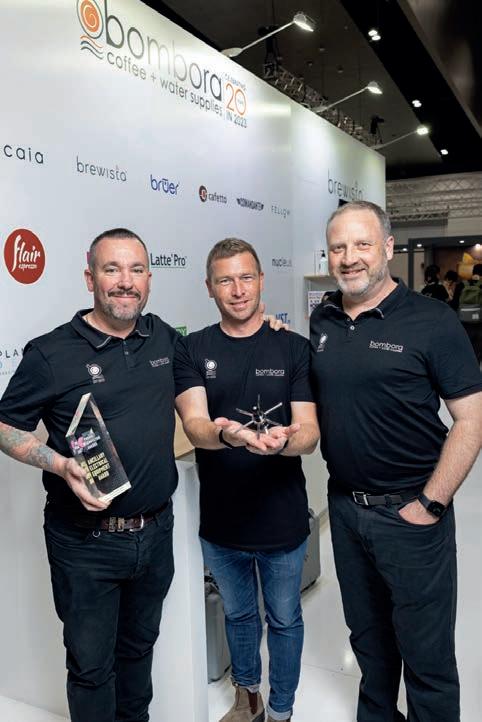
There’s plenty of reasons to be at MICE2024, and just one final thing to do: purchase a ticket. Beat the queues at the Melbourne Convention and Exhibition Centre and
pre-purchase your ticket before you arrive. With this minor administrative task out of the way, it’s time to work out which café series sessions appeal to your business needs, which coffee roasters you would like to connect with, and how you’re going to make enough time to network with all your industry friends, and new connections too.
“We look forward to seeing you at MICE2024. This is the beginning of an exciting new period for MICE and its future in the Australian and international coffee landscape. It’s about adding more value than ever before, and serving up an industry event that meets the needs of café owners and baristas,” Lauren says.
“See you there, for the magic of MICE in Melbourne.”
For more information, visit internationalcoffeeexpo.com
Come to learn:
– How to achieve efficient workflow.
– Tips to achieve high-volume output at minimal effort.
– Staff recruitment and retention; how to attract and retain great people.
– How to start your own café: the key things to know, the right equipment you need.
– How to attract customers and market your business.
– How to manage café waste, especially milk, coffee grinds, and milk cartons.
– How to clean and maintain coffee equipment.
– Profitability tips; accounting for a café.
– Café study ownership: what you wish someone had told you about business.
– Does food matter? Top chef tips on designing your café menu.
beanscenemag.com.au
Last year, Bombora Supplies won the Ancillary Electrical Equipment award for The Rhino Spinjet Spray Assembly and Actuator Starb3-EDP. MICE recognises innovation. Franke Coffee Systems’ Mytico line won an award in the Coffee Preparation Equipment category.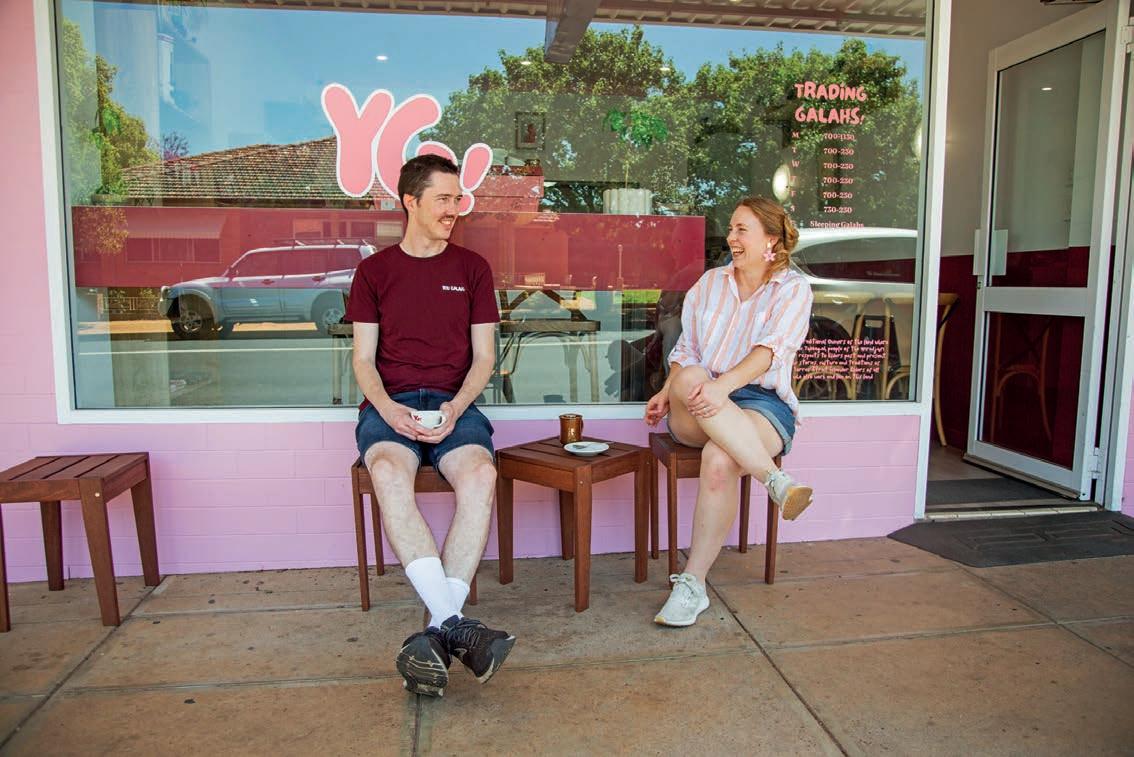
83 Jubilee Street, Dubbo, New South Wales, 2830
Open Monday 6.30am to 11.30am, Tuesday to Friday 6.30am to 2.30pm, and Saturday 7.30am to 2.30pm
There aren’t many inland coffee shops in Australia with a menu of freezer coffees.
Keen to show the people of South Dubbo just how different coffee can be, You Galah Founder Tim McCloud stocks around 10 to 12 different frozen single origins to showcase a wide spectrum of varietals,
processes, and flavours.
“When something special comes along or a coffee surprises us, we’ll reserve some for the frozen menu so we can continue to share it,” says Tim.
All the coffees at You Galah – from the house blend to the rare single origins – are sourced from Toby’s Estate in Sydney. Espresso-based drinks served with milk are crafted from the Rico blend as standard, chosen by Tim for its honey sweetness and berry notes.
“It’s not Toby’s most popular coffee, but it’s the original,” says Tim. “It has a sweetness
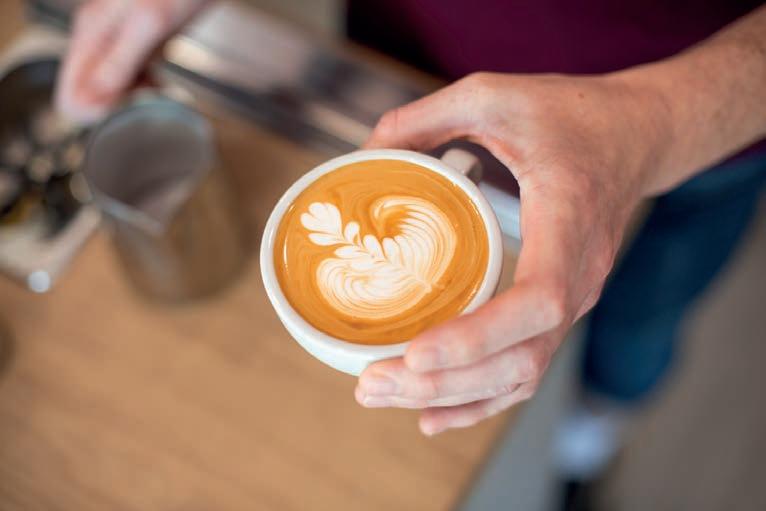
that a lot of blends don’t, and we thought the people of Dubbo would love a nice, sweet coffee.”
Those who order a coffee without milk will receive one of Toby’s seasonal single origins, which Tim showcases “to let the work of the farmers and roasters shine through”.
Tim has worked with the roaster since he established the café in December 2022. Its tongue-in-cheek name is an affectionate reference to his wife’s childhood.
“Meg grew up on a farm in a small town near Dubbo, and ‘You Galah’ was something her grandfather and father would often call her and her siblings,” says Tim.
The vibrant interior of the café takes inspiration from the Australian bird, with a custom pink La Marzocco Linea PB drawing the eye to the bar.
“We wanted the space to feel very country and Australian. The pink ceiling was influenced by the pink chest of the galah, while the earthy red border along the bottom of the walls is a nod to Dubbo’s dark soil,” Tim says.
Dishes continue to reference classic Australian café culture. The brekkie roll is the most popular plate on the menu, and features mortadella, baby spinach, and bush-tomato relish within a glossy milk bun.
“Our regulars often say it’s so good that we’ve ruined all other breakfast rolls for them,” says Tim. “We’re absolutely chuffed whenever we can make a customer’s day.”
Espresso drinks served with milk use Toby’s Estate’s Rico blend. Founder Tim stocks around 10 different frozen coffees.235 Parnell Road
Parnell, Auckland, New Zealand, 1052
Open Wednesday to Sunday 7am to 4pm
When Tushar Grover moved to New Zealand from India in 2016, he had no idea coffee would become such a big part of his life.
“I enrolled at a French cookery school
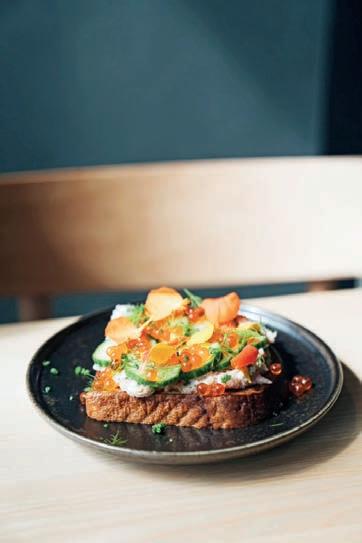
281/311 Anketell Street
Greenway, Australian Capital Teritory, 2900
Open Monday to Friday 7am to 2:30pm, Saturday 7am to 2pm
Hyunjeong (Bella) Yu and husband Wonjin Kong dreamt of opening their own café for years until their dream was finally realised in 2022 when they established Café Beetroot in Greenway, Canberra.
The café’s unique name was the result of an observation Wonjin made at home.
“One day, Wonjin was cooking with beetroot and was annoyed by how its bold colour spread to all the other ingredients,” Bella explains.
“We thought beetroot would make the perfect name for our café as that’s what we want to achieve: we want our customers to feel and absorb our colour and personality, and have it remain with them throughout their day.”
Bella looked to former employer Veneziano Coffee Roasters for help when setting up the café.
“I was really impressed by the Veneziano team’s management skills and professionalism, as well as how generous they were with their time,” she says.
“Once we opened the café, it was clear they really cared as they checked in on us regularly.”
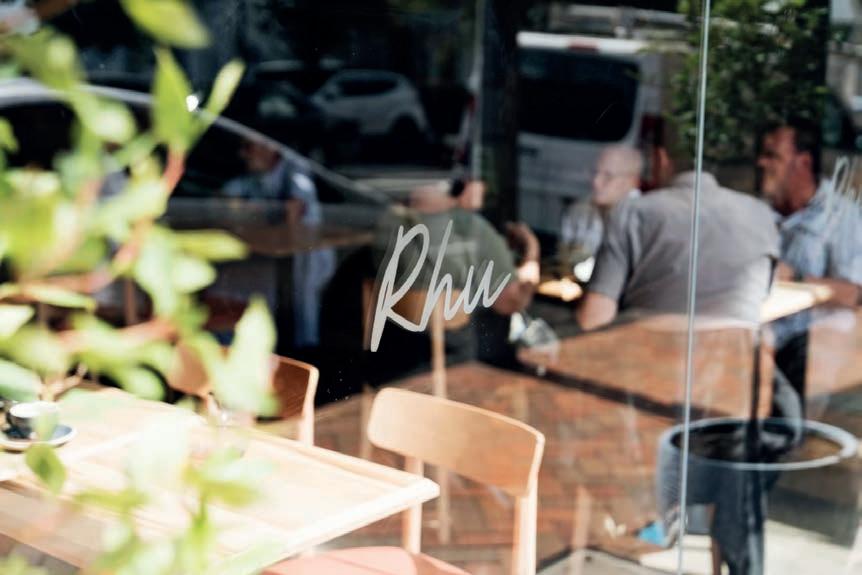
It was at the culinary school that Tushar met representatives from Havana Coffee Roasters; a meeting that convinced him the company would make a great business partner.
“You need to have a passion and obsession to become successful, and I really felt that with Havana,” Tushar says.
This passion for creativity is shared by Rhu’s kitchen and coffee staff. Tushar says he and the Havana team have been curating new concepts to bring to Parnell.
“I like to look at what the local community has to offer, and we felt Parnell was very different to Auckland’s CBD,” he says. “We
After a lengthy selection process, it was the Victorian roaster’s Crave blend that Bella, the café’s barista, and Wonjin chose to serve at the café. Bella says it won them over with its dark chocolate and nutty flavours.
During the first couple of months in business, they were particularly impressed by Veneziano’s attention to detail.
“The team roast consistently high-quality coffee beans, which our customers love,” she says.
The couple are keen to represent both their Korean heritage and current location in Canberra. As a result, the drinks menu blends Asian and Western flavours.
“We have typical menu items such as English breakfast tea and chai latte, but we also offer yuzu tea and matcha latte,” says Bella.
This fusion of cultures also extends to the food menu, which Wonjin oversees as Head Chef and Co-owner of the venue.
“We have classic Aussie dishes such as bacon and egg rolls and smashed avocado on sourdough, but we also have more inventive options such as kimchi scramble and gochujang pork tacos,” Bella says.
At first, Bella and Wonjin were nervous about serving the gochujang pork as it was quite different from the local offering, but it quickly became a hit and is now one of the café’s signature dishes.
Bella says running the café is exhausting
experimented with 18 different blends from Havana, and picked the coffees we thought the locals would be most interested in trying.”
“People in New Zealand, much like those in Australia, are very specific about how they drink their coffee, and we want to stay true to that. At the same time, we believe it’s great to be open-minded in trying novel and weird things.”
Among these new additions is nitro cold brew on tap, with plans for RTD coffees down the line.
“Havana has given us plenty of support,” he says. “They understood right away what we are trying to do.”
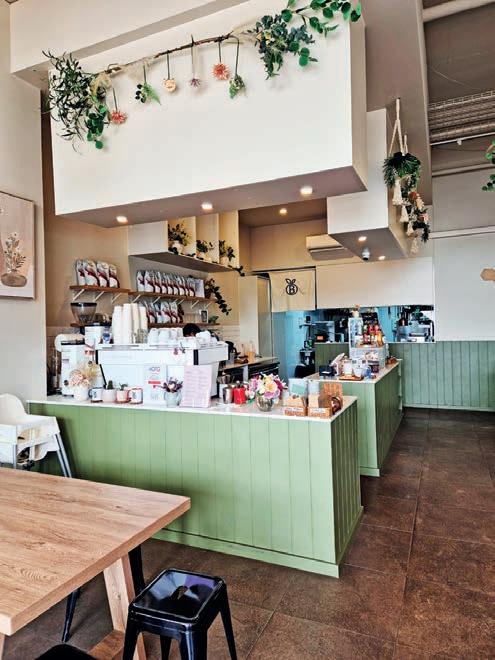
but exciting: “When our customers are happy with the coffee and food, we get a lot of energy from them.
“Meeting new people is one of the best bits about running a café, and our customers often become our friends.”
Rhu hopes to bring new beverage concepts to the Parnell community. Café Beetroot is situated in the residential suburb of Greenway in Canberra. Chef Tushar Grover brings his fine-dining background to the daytime eatery scene. Image: Café Beetroot.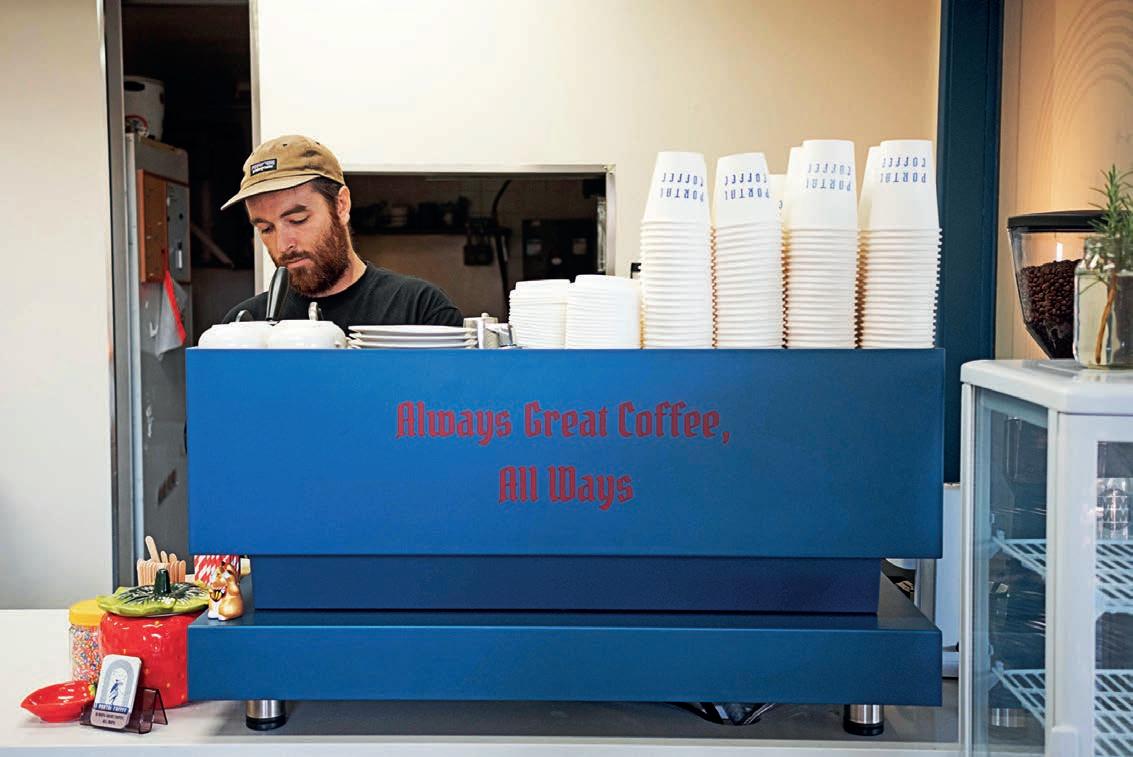
Shop 44, 55 Prince Street, Busselton, Western Australia, 6280
Open Tuesday to Saturday 6.30am to 1pm 0412 094 052
Portal Coffee Founder Aaron McInnes abandoned his PhD to pursue his ambition to introduce a slice of specialty coffee culture to Busselton. After successfully running mobile coffee trailer Crybaby Coffee in Darwin, Aaron and his young family relocated to his home state of Western Australia to launch this grab-andgo coffee spot in February 2024.
“I grew up in these parts so opening a café in Busselton feels like coming full circle,” says Aaron.
With a lengthy barista career spanning venues across Australia, Aaron was keen to take a different approach to the design of his café than those he’d worked in.
“I didn’t want to go the industrial route, so instead I opted for soft tones and used the 60/30/10 rule to add pops of my chosen signature colours,” he says.
His desire to do things differently expands to the café’s name, which Aaron says was a natural evolution from his former mobile coffee shop.
“Crybaby Coffee was based on the idea that we’re all cry-babies until we’ve had our first coffee of the day,” says Aaron. “Portal is more about being a gateway experience. When people visit, I aim to create a safe space for them to take a moment for themselves over the morning coffee ritual:
be nostalgic and reflect on where they have been, look forward and plan out their future, or simply let their minds wander to interesting and quirky places.”
This reflective process is fuelled by Locale Coffee Roasters’ Original Gangsta blend, which is crafted into espresso-based drinks on a custom XLV1 Steamhammer machine. Collaborating with the Melbourne roaster was an obvious choice for Aaron.
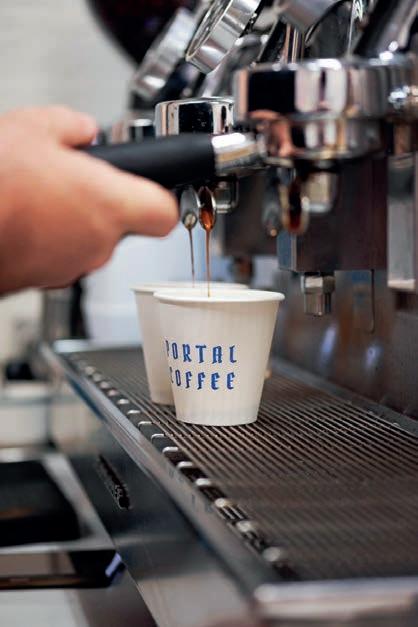
“I was keen to work with Locale when we moved to Western Australia. I wanted to offer something different than other cafés in the area. I instantly vibed with Locale’s people and their philosophy and approach to coffee, and the team has provided fantastic support,” he says.
Aaron chose Original Gangsta as, to him, it is “the most Melbourne in style” of the Locale range, but he also prepares a selection of the roaster’s other coffees as filter options. These are served alongside in-house made snacks such as muffins, loaves, pastries, and biscuits, which Aaron bakes each day, along with toasted bagels from a local baker.
While the grab-and-go café only opened a few months ago, Aaron is already considering his next moves for Portal.
“We’re based in Fig Tree Lane, so I want to start making the most of our beautiful outside space. I have recently introduced some tables and chairs so people can enjoy their coffee under the big Moreton Bay Fig tree,” says Aaron.
Having people gather and spend time at Portal is another step towards his goal of creating an inclusive space where locals and tourists alike can relax, connect, and feel part of a community.
“My main aim is to integrate into the neighbourhood and feel part of the fabric of Busselton,” Aaron explains. “Some cafés can be impersonal, but I want to get to know my customers and build lasting relationships.”
At Portal Coffee, a custom XLV1 Steamhammer espresso machine is used to craft daily coffees. Aaron uses Locale’s Original Gangsta blend.Shop 1a, 1 Ridgeview Drive, Peregian Springs Shopping Centre, Queensland, 4573
Open Monday to Friday 5.30am to 4pm, Saturday to Sunday 6am to 2pm
When Sonya and Tony left their cheesecake shop in Melbourne for a more relaxed life on the Sunshine Coast, they had just three criteria for their next business venture: be profitable, be fun, and serve great coffee.
Taking over a tiny space in the heart of Peregian Springs, the duo decided to keep things simple and serve one hero blend from Campos Coffee.
“We only have space for one grinder, so we decided to do one thing and do it well. We use Campos’ Superior blend because everyone loves its creaminess and caramel notes. We tried other coffees but we just kept coming back to Campos,” says Tony.
A short-but-sweet menu complements the espresso-based coffee. The Coco Cantina Co team make smoothies, cold-press juices, açai bowls, and salads from scratch each morning.
“We wanted to offer something healthy but delicious,” says Sonya. “We’ve always loved açai bowls but couldn’t find any authentic Brazilian açai when we moved here and knew we could create something extra special for the locals. They’re what we’re known for now and people travel 30 to 40 minutes just to get one.”
The menu inspired the café name Coco Cantina Co, which features coconut in around
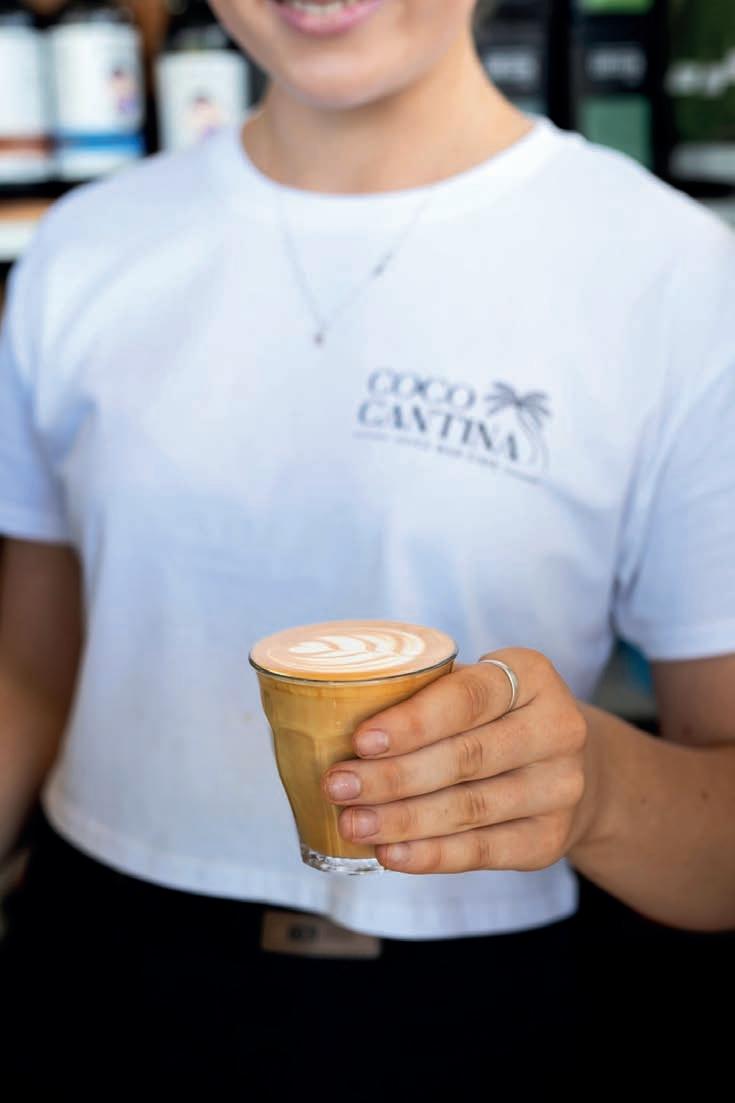
Opening in the height of the pandemic, the café quickly became a community hub for the people of Peregian Springs.
“We’re social butterflies so connecting with
something we’ve always prided ourselves on. By the time we close we’re exhausted from chatting all day, but our number one priority is ensuring every cup of coffee is made with love.”
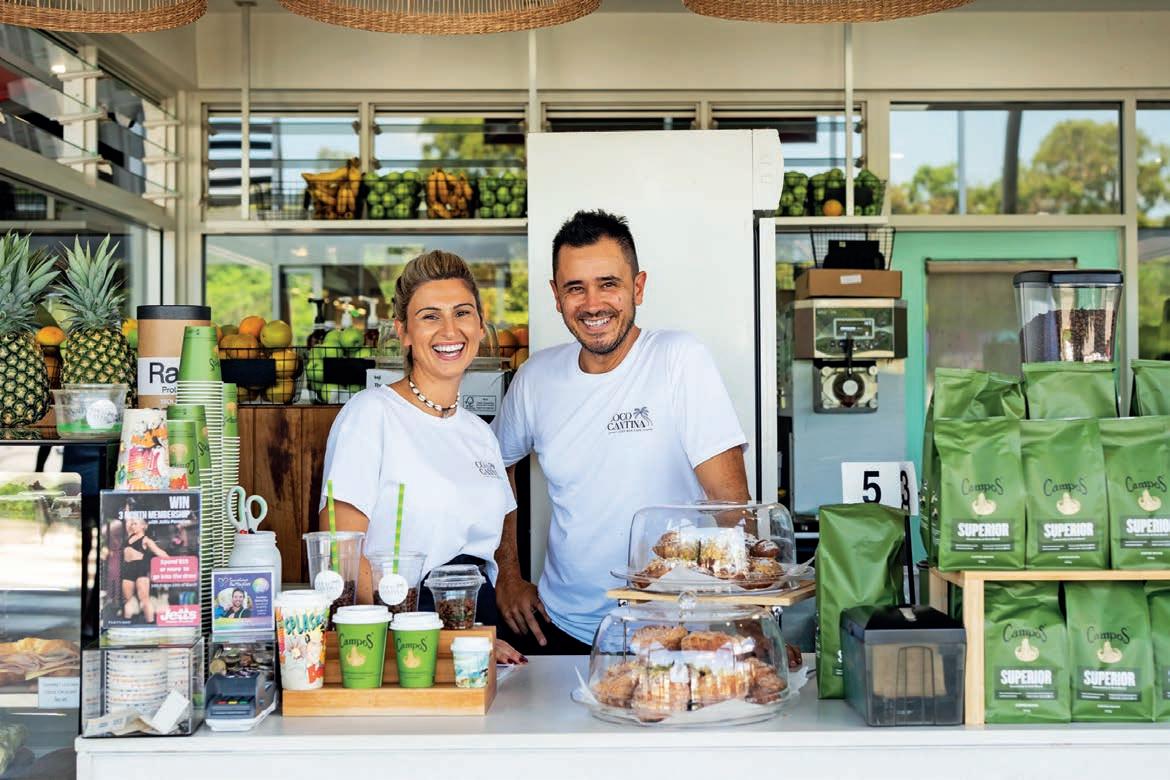 Campos Coffee’s Superior blend is loved by locals.
Sonya and Tony relocated to the Sunshine Coast from Melbourne.
Campos Coffee’s Superior blend is loved by locals.
Sonya and Tony relocated to the Sunshine Coast from Melbourne.


Amy Zhang shares her mischievous Tom Cat cartoon that wowed judges at the 2023 World Latte Art Championship.
he Tom Cat cartoon character is a nostalgic memory from my childhood filled with mischief and joy. For the 2023 World Latte Art Championship, I wanted to convey happy emotions through this playful pattern. Tom Cat’s lively, animated, and comical smile can instantly evoke joy. I want my latte art to be vibrant, spreading happiness and establishing an emotional connection with people. Latte art is not just a skill but a form of expression that touches people’s hearts and spreads joy.
This design looks simple from the outset, but I assure you it’s not so straightforward. It doesn’t require a lot of rosettas but it does take skill and a lot of practice to master Tom Cat’s fluffy beard. The strategy to this realistic feature is pouring
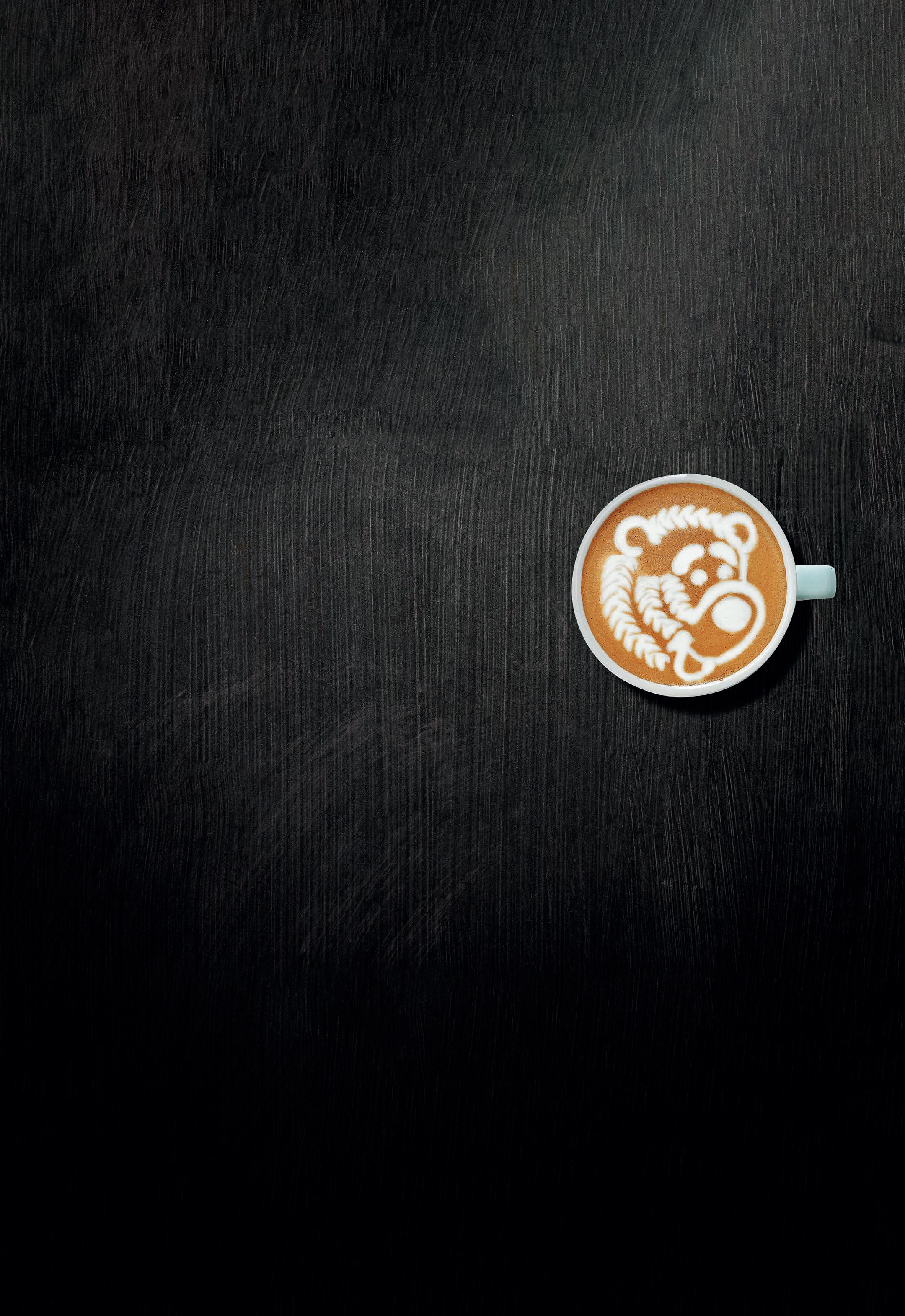
slow rosettas. There are a lot of lines in this pattern and low tolerance for error. How well you replicate the thickness and stroke of the lines will determine the success or failure of this pattern. The slightest mistake between the lines can lead to an obvious change in Tom Cat’s facial expression. The key to the whole pattern is positioning, angle, and size of Tom Cat’s whiskers, which is very easy to look stiff.
With that said, let’s try making Tom Cat together, and bring joy and laughter to everyone who gets to create this latte art.
As this is my last column, I want to thank you for coming on this journey with me. I now pass the torch to our new Australian Latte Art Champion, Victor Vu.

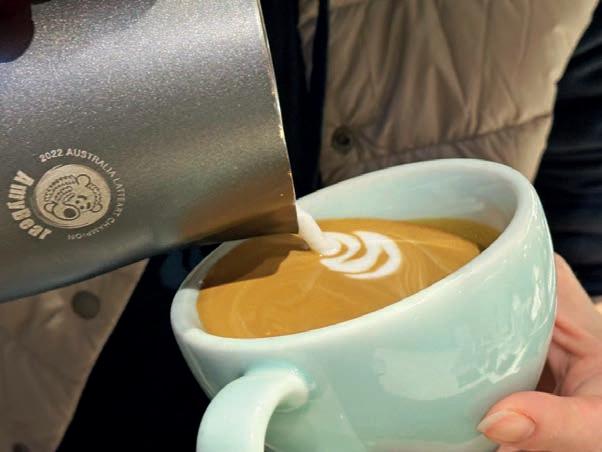
Position the cup handle at 12 o’clock and slightly tilt the cup towards you. Pour a six-leaf rosetta slowly. To create the illusion of fluffy whiskers, the key is to swivel your cup-holding-hand at the same time as you pour.
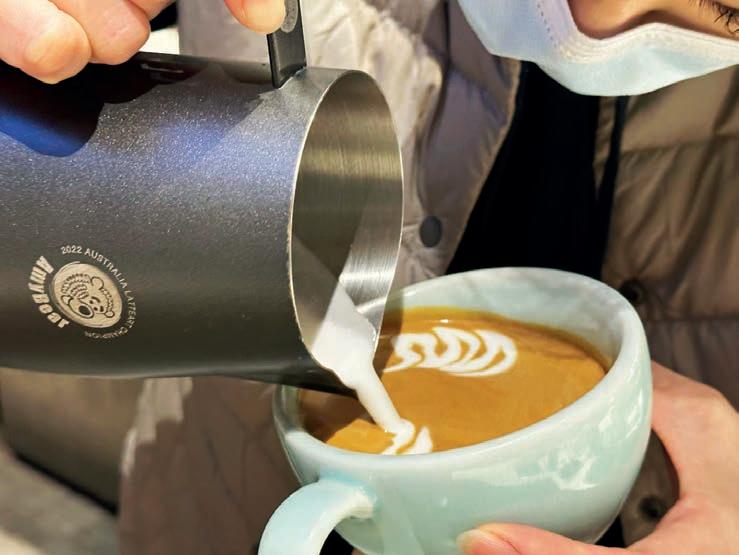
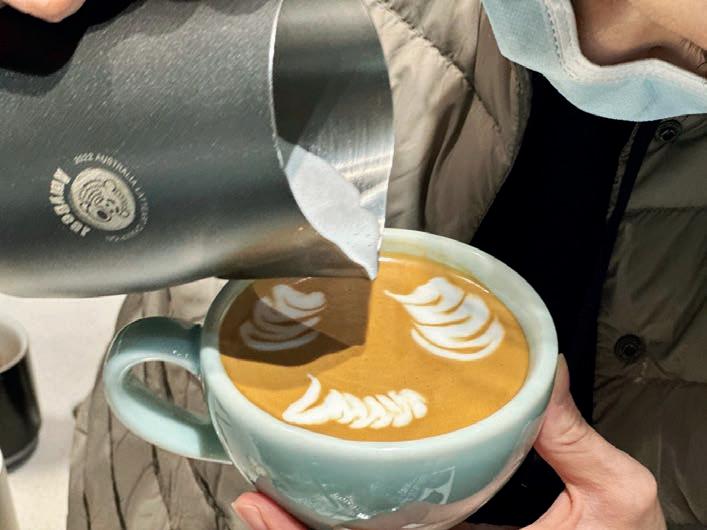
Turn your cup handle to 3 o’clock. Pour a curved five-leaf rosetta. Directly after, draw an ear by dragging your pour to create an ear shape, making sure it has a pointed corner. This is part of the defining characteristics of Tom Cat.
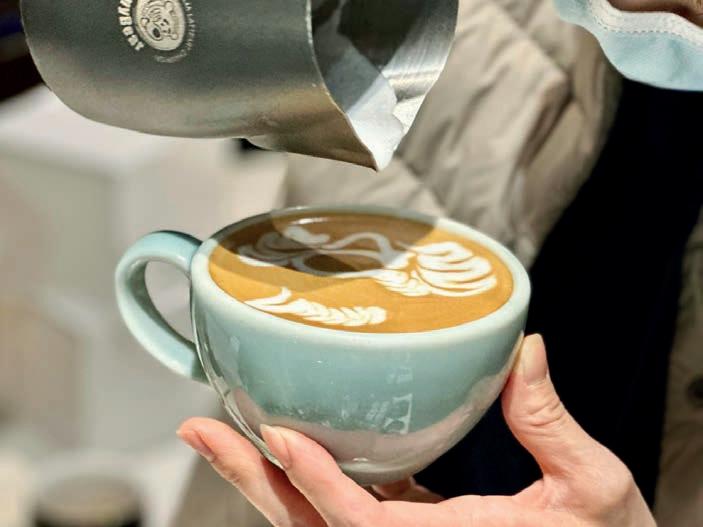
Tilt your cup away from you. Position your pitcher close to the cup handle and pour the second six-leaf rosetta rosetta down the cup. Again, slightly turn the cup to make the whiskers look fluffy.
Pour a second three-leaf rosetta close to the first rosetta. Then, draw a line in the shape of a ‘C’ to create Tom Cat’s nose.
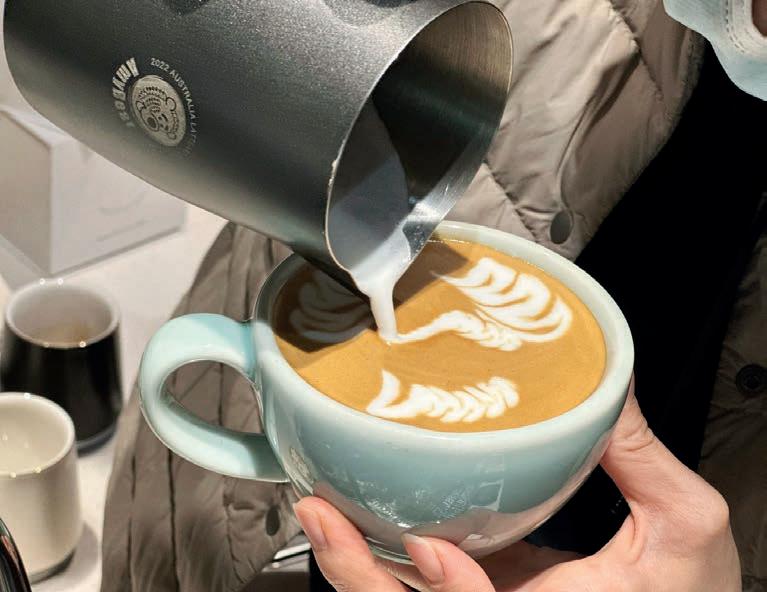
In the same movement, draw his mouth. The proportions of the mouth to nose, especially the shape of the corners of the mouth and chin, will determine his smile. Keep the cup turning throughout the process.
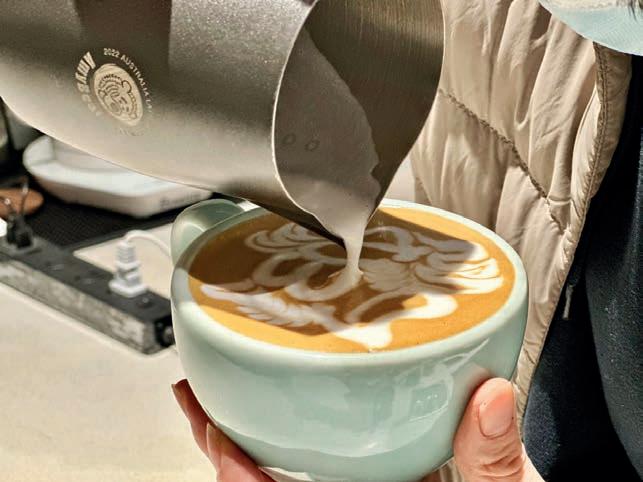
Use semi-dry foam that has been sitting for a while to draw the rim of the eye in the shape of an ‘M’. The technique requires you to drag the milk forward instead of backwards.

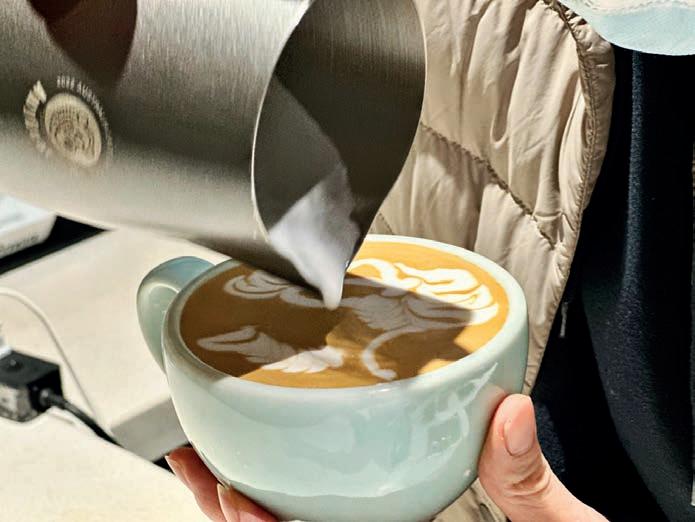
With the handle still at 3 o’clock, draw a curved line from the bottom of the first rosetta to the top, to finish Tom’s other ear. Ensure it has a pointed corner and it’s not too small.
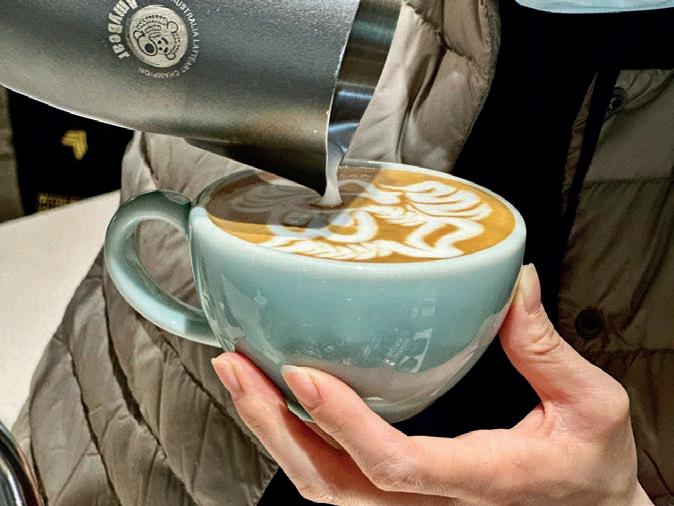
To create Tom Cat’s eyeballs, drop two large dots of milk. Note the oval shape of the eyes rather than round, and be careful of the surrounding orbital lines, which can easily join together. Finish with a small triangular nose.
beanscenemag.com.au
BeanScene magazine is always chock-full of ca einated content, co ee innovation and co ee people. Subscribe today to receive every new issue, delivered straight to your door every two months – and all from just $45!
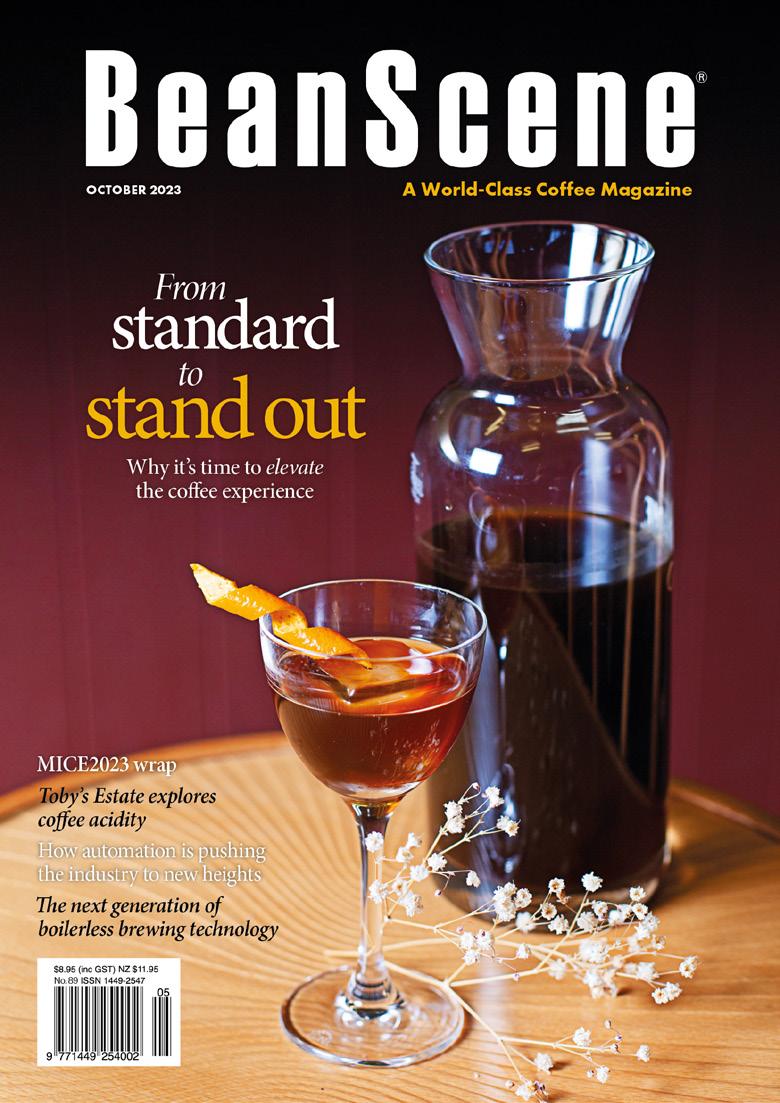
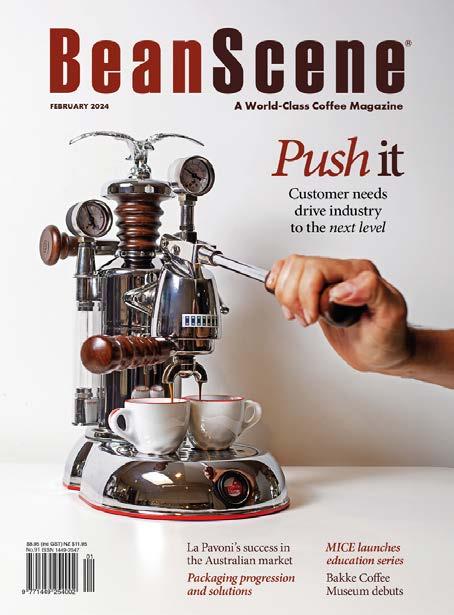
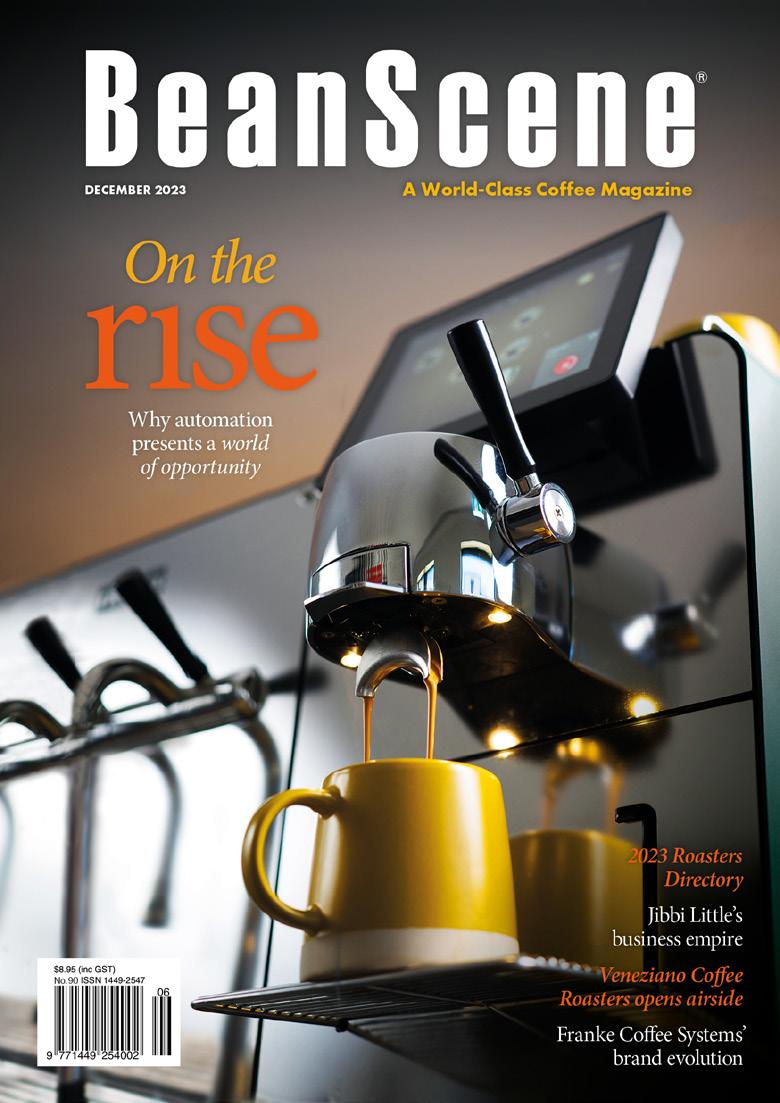
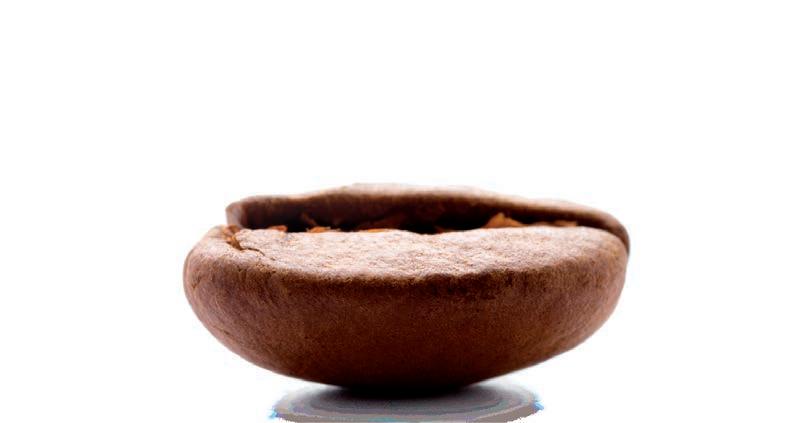

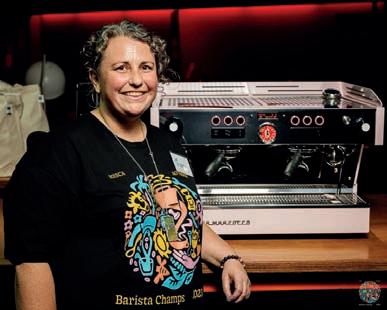
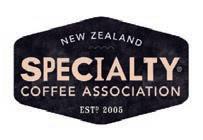
inning a barista championship is a prestigious achievement which can lead to recognition, career opportunities, and a platform to influence and contribute to the coffee community.
But how would you describe the competition? It’s not just making 12 drinks in 15 minutes: it’s showcasing coffee with a dramatic technical performance set to music and judged by sensory and technical experts.
With this in mind, we wanted to break down the barriers for those wishing to compete. The New Zealand Specialty Coffee Association (NZSCA) believes a great barista should shine through their coffee and service, not through elaborate setups. We communicated this to baristas during announcements and ticket buying, explaining what we would bring and what they could bring. This included one electrical item only per routine.
The competition is all about understanding coffee and delivering exceptional customer service. As such, the NZSCA has simplified the rounds to just four espresso pours and four milkbased beverages. These are presented to a calibrated panel of judges consisting of two scoring sensory judges, two guest nonscoring sensory judges, a technical judge, and a head judge. Baristas are encouraged to present menus that describe their coffees, but the real challenge is verbalising this during the competition. This sensory part of the competition requires baristas to describe the tasting notes in the cup to match what the judges taste.
This challenge was addressed during a free NZSCA online workshop on 15 February. The workshop was a rules-based lecture and PowerPoint presentation that gave attendees the opportunity to ask questions, meet others involved, and best prepare competitors for presenting their coffee.
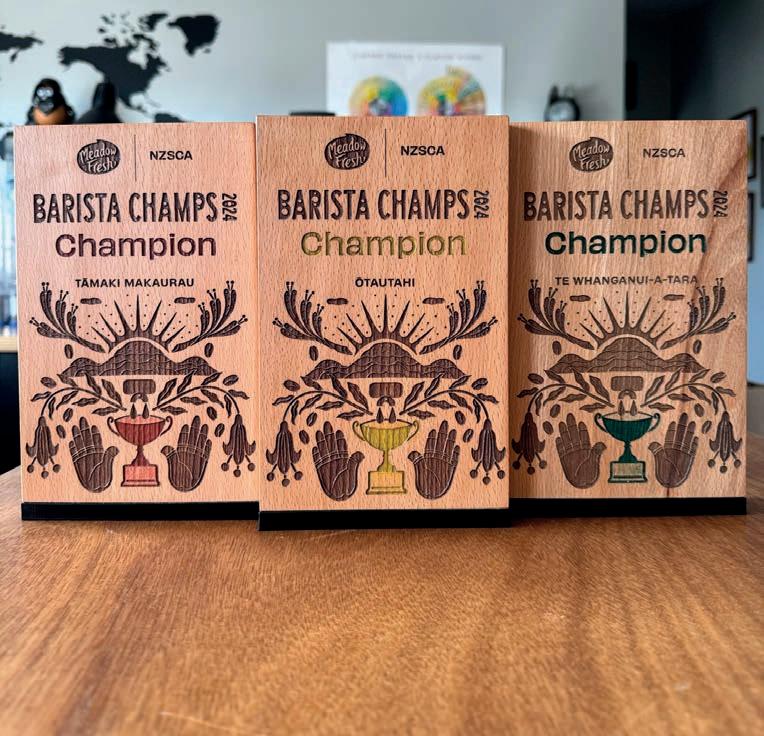
and Wellington on 17 March. It’s been at least 11 years since the organisation has held regionals, but we brought them back due to demand from the New Zealand coffee community. Requests during member surveys, questions at annual general meetings, and pleas online and at national events meant we decided to give regionals a shot.
Regionals gave baristas a taste of competing. Each winner received prizes from principal sponsor Meadow Fresh, including flights, accommodation, and fresh milk for practice sessions, to help them get to the finals in Upper Hutt, North Island, from 5 to 6 October 2024. Winners also received a voucher for Wellington restaurant Kisa from ceramics sponsor Acme Cups, a La Marzocco voucher from the machine
merch packs were also provided thanks to sponsors.
The nationals will give regional winners an opportunity to stretch their creative skills further with the addition of a signature drink round. This round flexes the creativity of the barista and will give them an opportunity to create a delicious drink to complete the competition menu.
Competitors who placed second, third, and fourth are also invited to compete in the national event, and we encourage all placeholders to take this opportunity to progress to the next level.

For more information on the New Zealand Specialty Coffee Association, or to join, visit nzsca.org
Emma McDougall is the Communications and Administration Co-ordinator of the NZSCA.Name: Caleb Cha
Nationality: South Korean
Company: Tone
Instagram: @tonecoffee_melb
When and where was your first job in the coffee industry?
I was struggling and hustling to survive until I learnt about coffee at William Angliss Institute in 2008. Soon after I got a job at a café in Melbourne’s CBD, pumping out 10 kilograms of coffee a day. It was a great opportunity to immerse myself in Melbourne-style coffee.
How did winning the 2015 World Latte Art Championship progress your coffee career?
I always questioned how I could go further after the World Latte Art Championship. As a micro-roaster I was also self-conscious about what else I could do to be like big-name roasters. Then I found peace in knowing my customers always loved and trusted my coffee by telling me it’s the best coffee they’ve ever had.
What have you been up to in the past year?
I set up my café, Tone, in Prahran in September 2023. I had to start from scratch as the space was not previously registered by the council. I’ve learned so much about setting up a café business – from beginning to end.
What’s opening a café been like?
A: It was a total mess when I started. I had to enrol in food business courses, and organise plumbers, electricians, and carpenters for a fit-out. I then had to sort out equipment delivery, wastewater regulation check-ups, documents, invoices, and taxes – the list is endless.
What’s been your favourite part?
A: I designed the shop myself using a 3D program. It looked divine on the display, however, I wasn’t sure how it would be projected in real-life. Once the fit-out was done, it all came together and I realised my dream had become reality.
The most popular menu item?
It would definitely be the Tiger Bomb, an espresso-based iced drink finished with cream and orange zest. Once you taste it you won’t be able to stop drinking it. It’s gone viral online and we’re currently selling over 100 cups every day.
The best bit about being a barista?
Starting someone’s day with a perfectly brewed coffee because I know how important it is. I’m proud to spread happiness to everyone who visits my café.
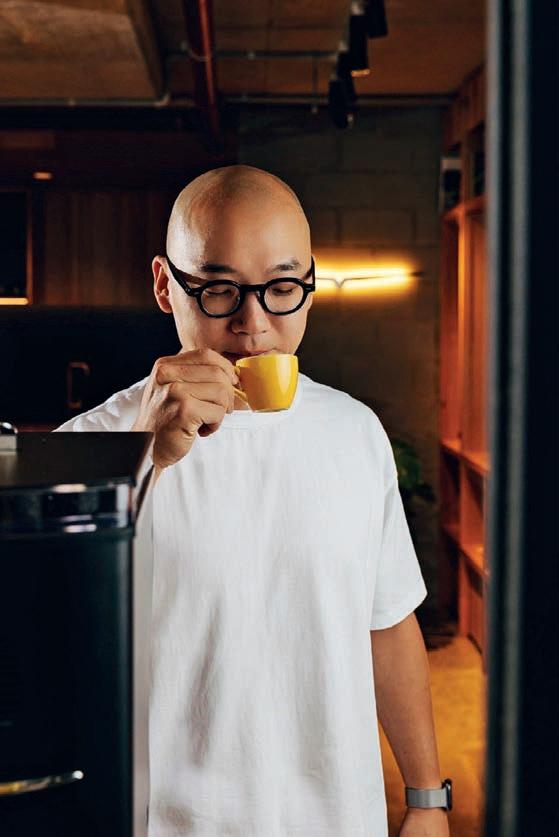
What accomplishment are you most proud of in your career?
Winning the World Latte Art Championship in 2015. I still feel the glow of winning like it was yesterday. It’s something not many people can say they’ve achieved and I’m very proud of Australia for having two world titles that year (Ona Coffee’s Sasa Sestic won the 2015 World Barista Championship).
Your advice for baristas looking to enter coffee competitions?
Give it your best shot and compete like there’s no tomorrow.
What inspires you to continue to grow your skills as a barista?
The more experience I gain the more eager I am to learn. Understanding extraction, milk steaming, and pouring skills have made me a better barista, however, there was a huge gap in my learning from seed to grinder. That’s why I decided to become a coffee roaster, to understand the supply chain – it’s one of the best decisions I’ve ever made.
What’s your main business focus and goal?
This business wouldn’t be successful without my customers, so I will focus on service and providing consistent quality products.
Your go-to coffee order?
An oat magic. I’m currently trying alternative milk, and so far I love it.




